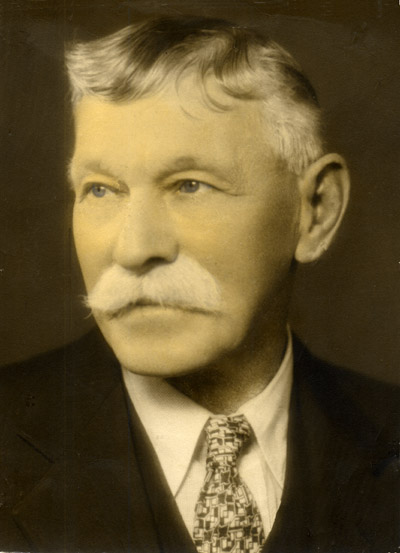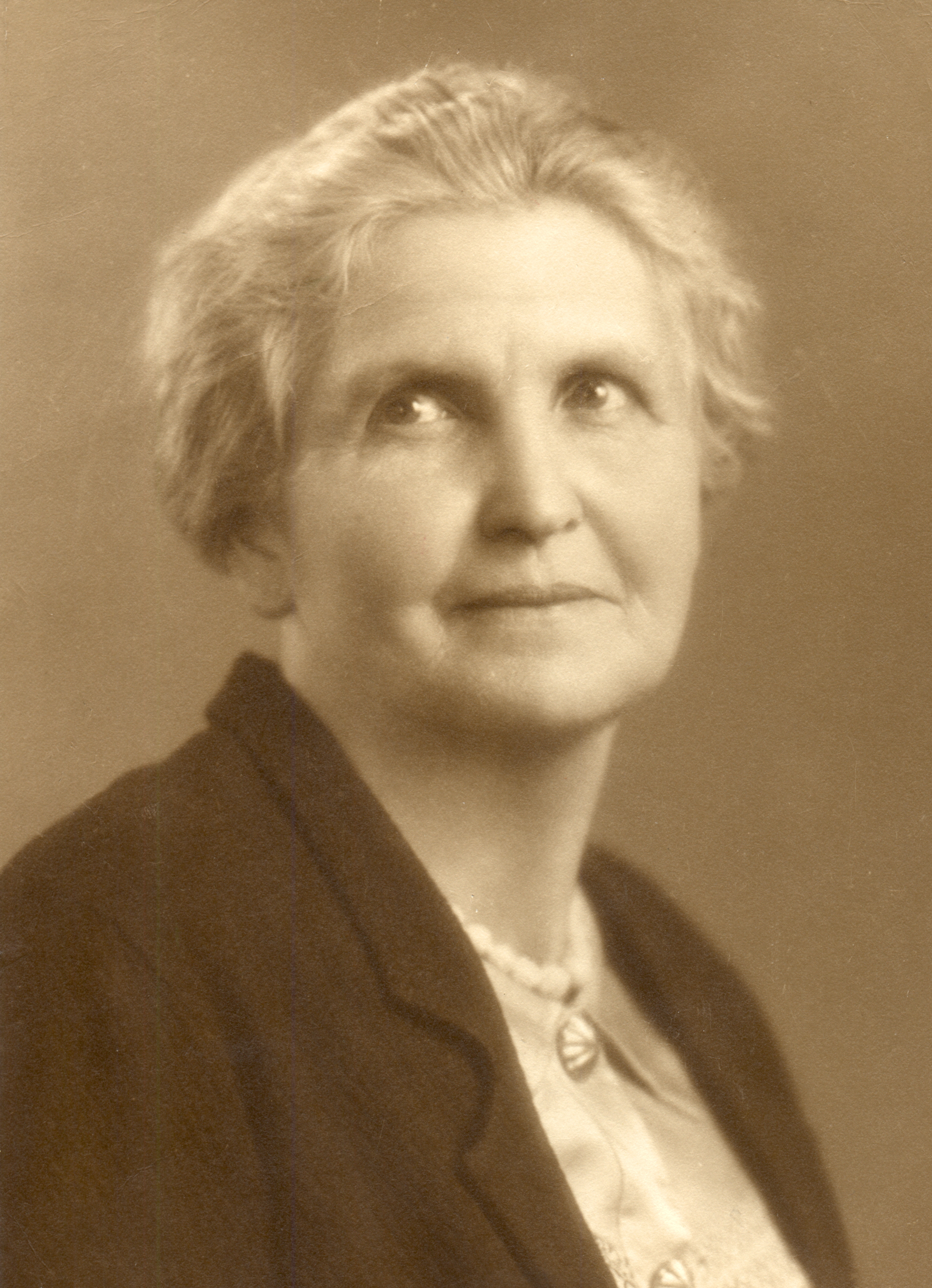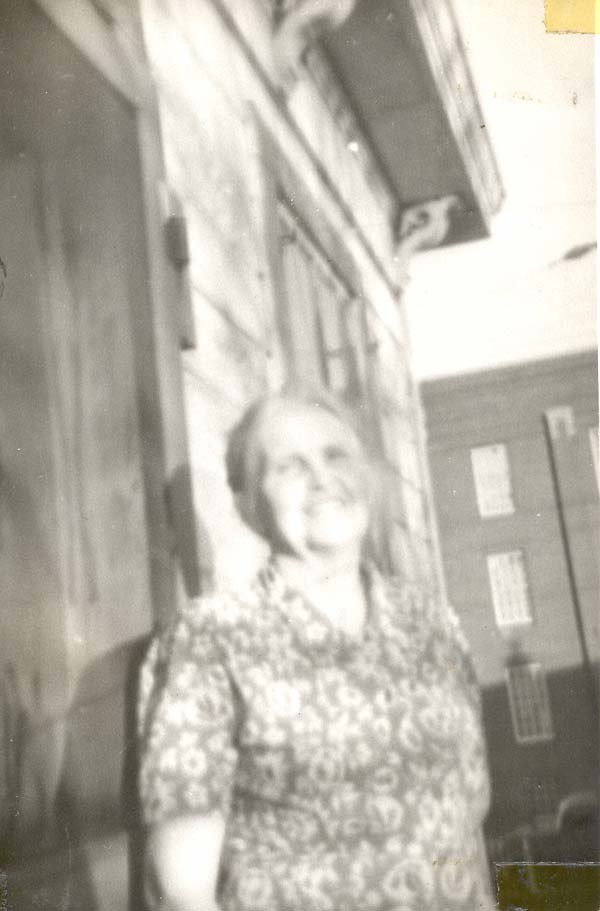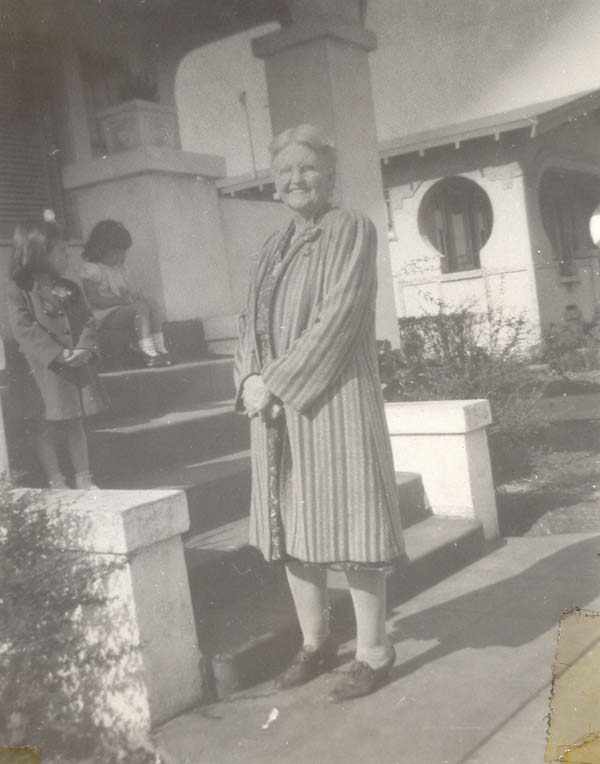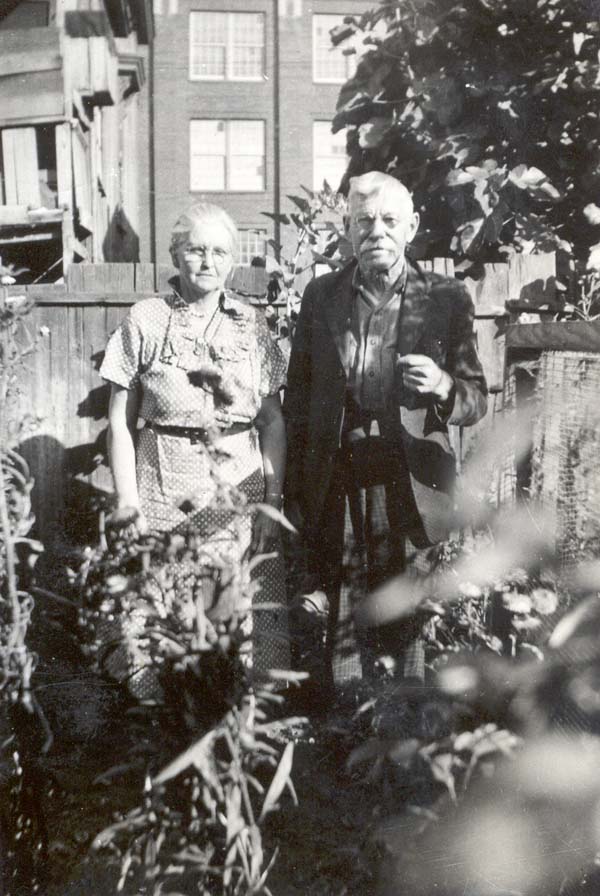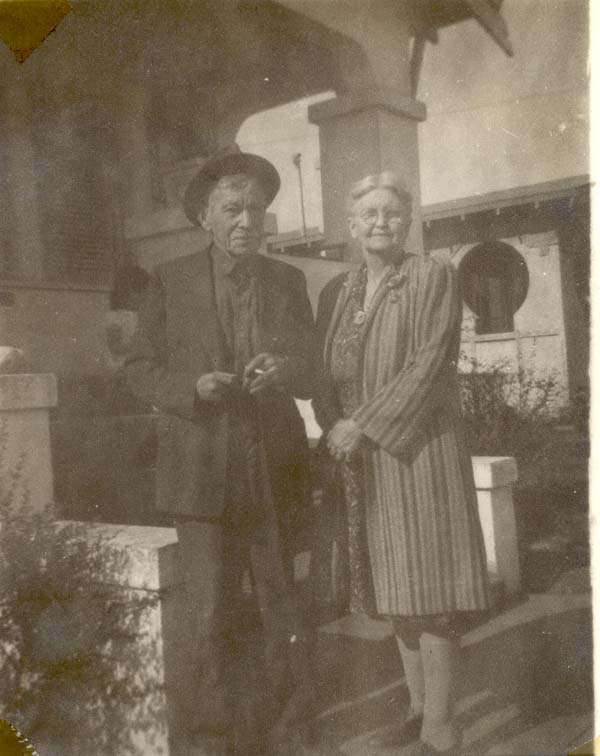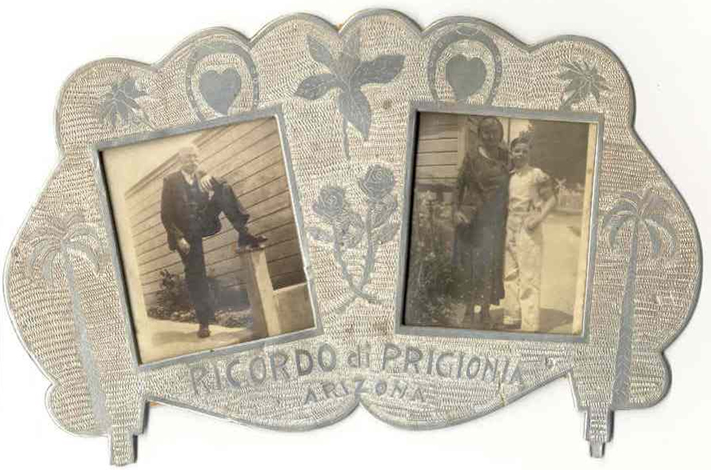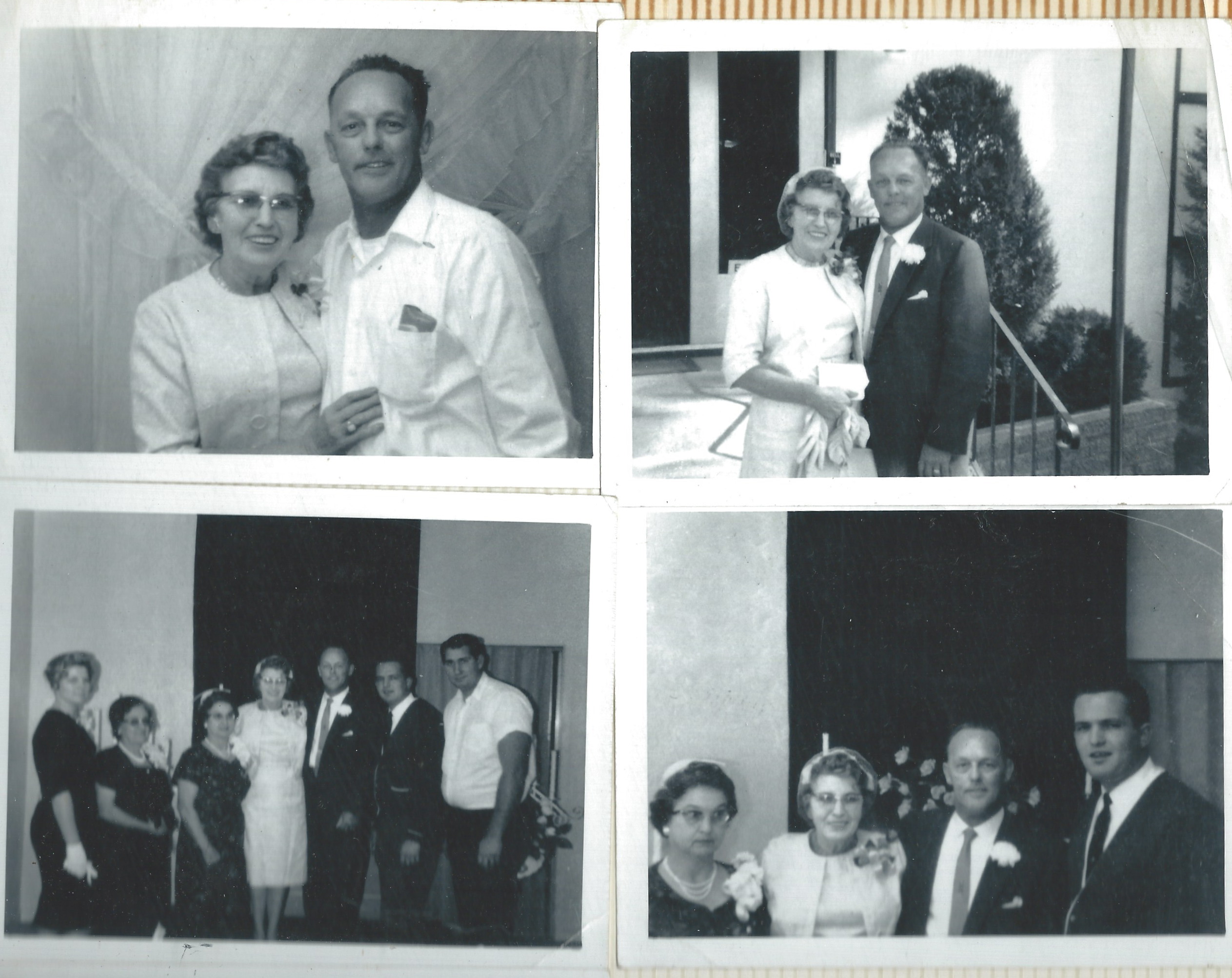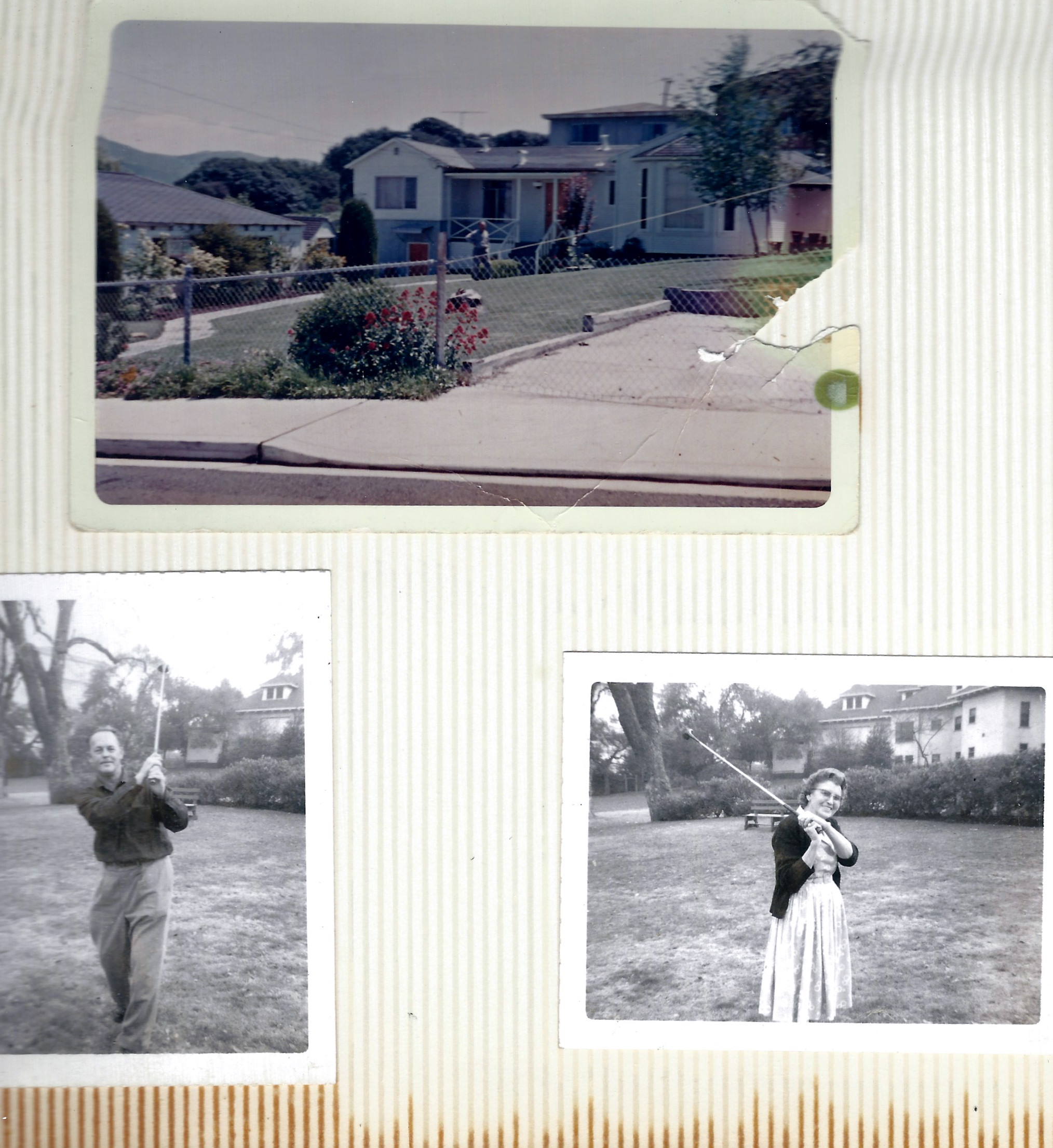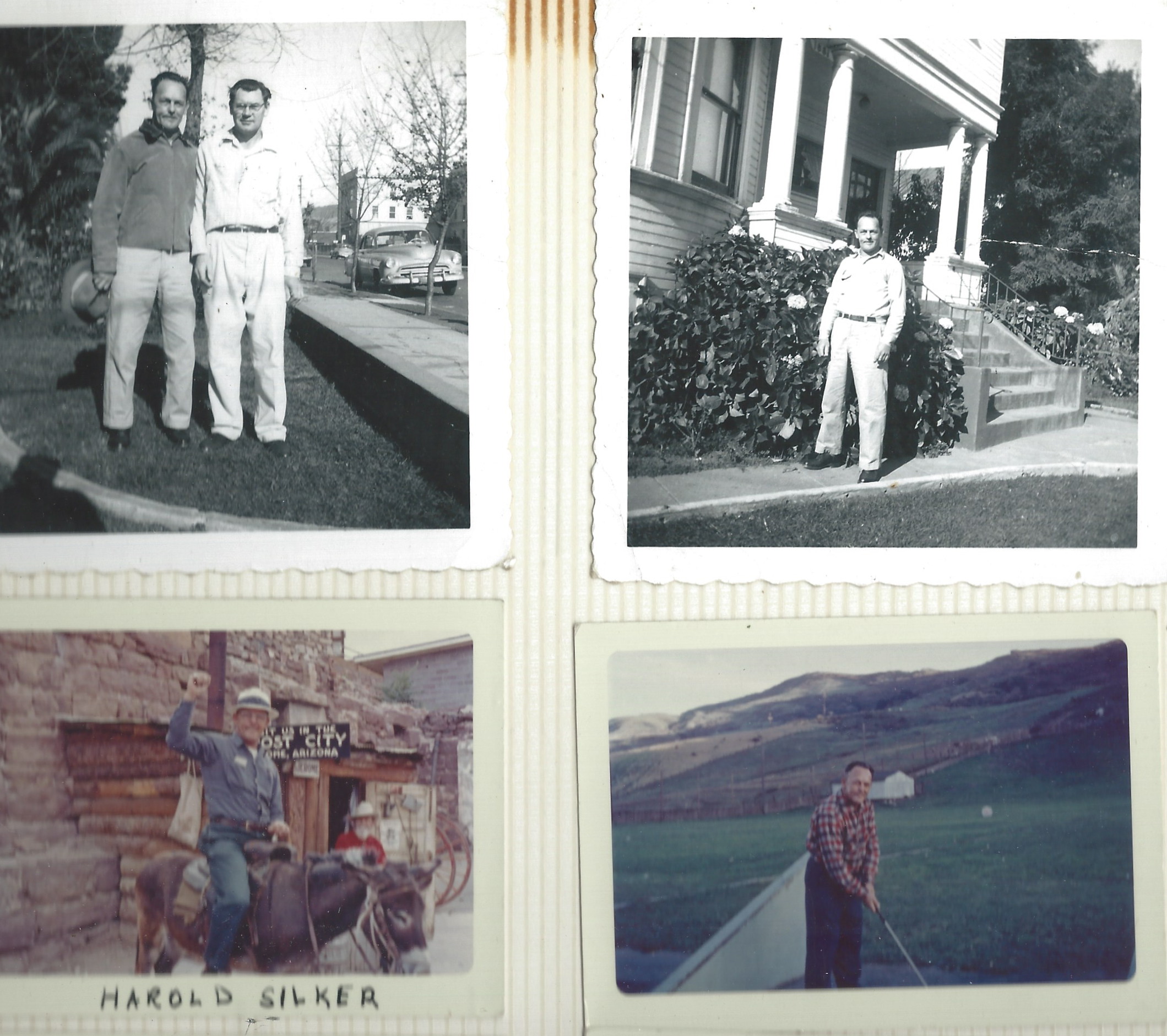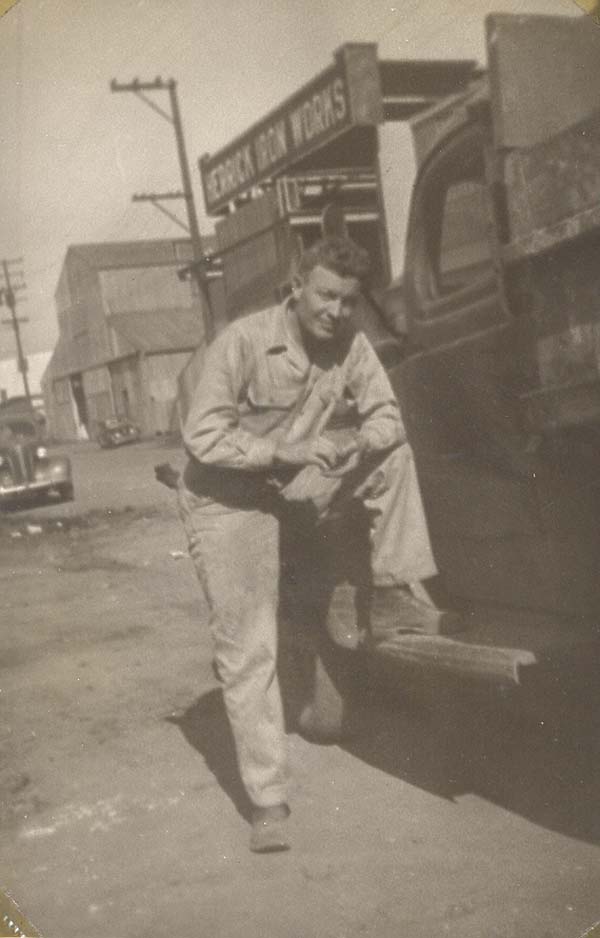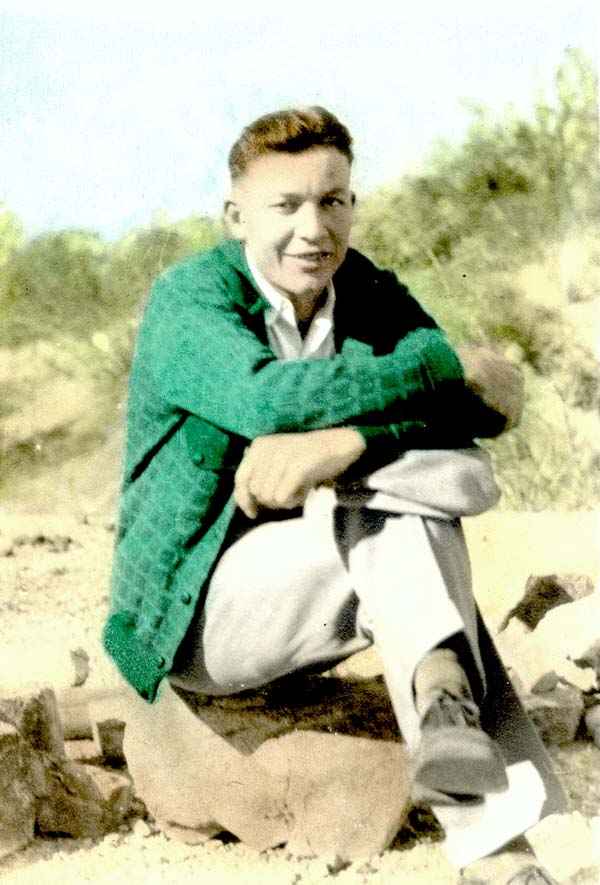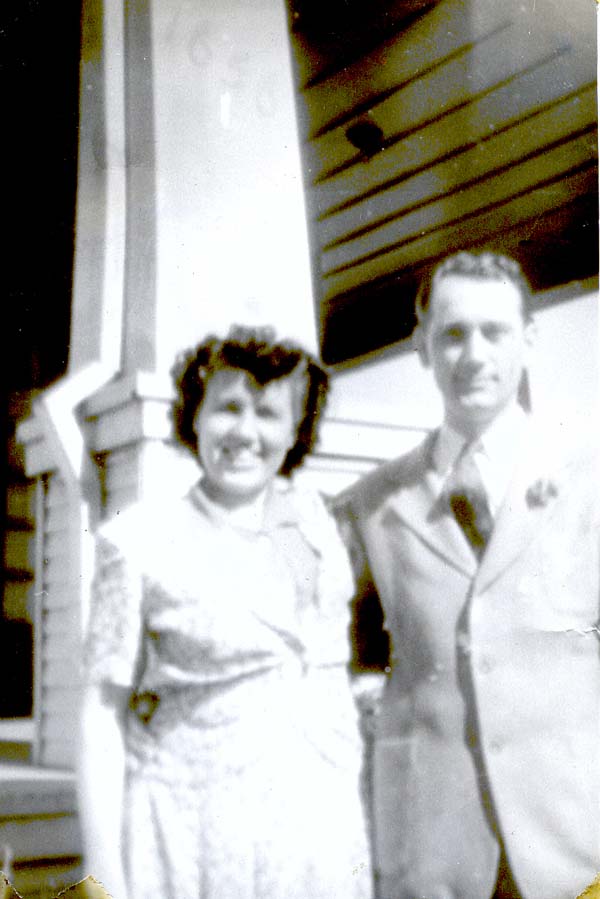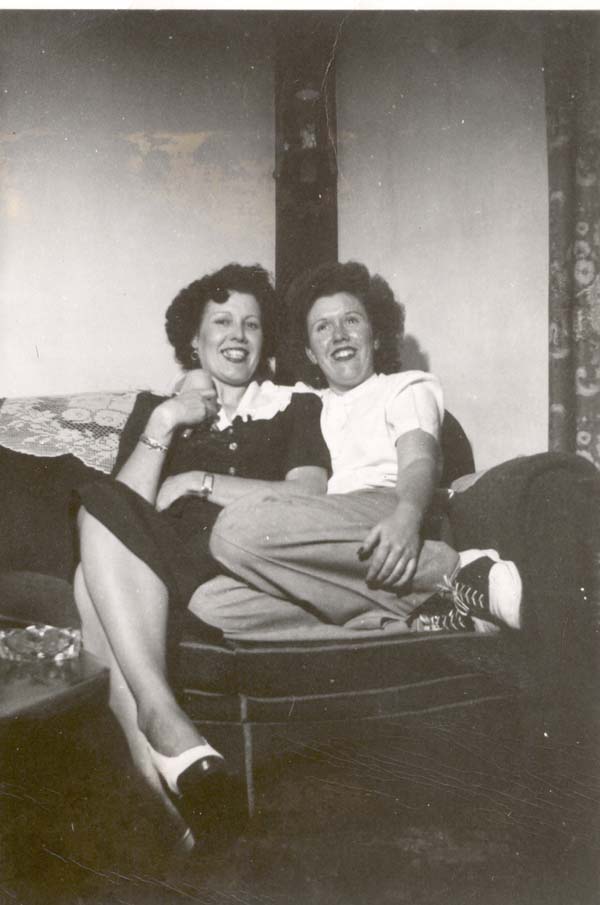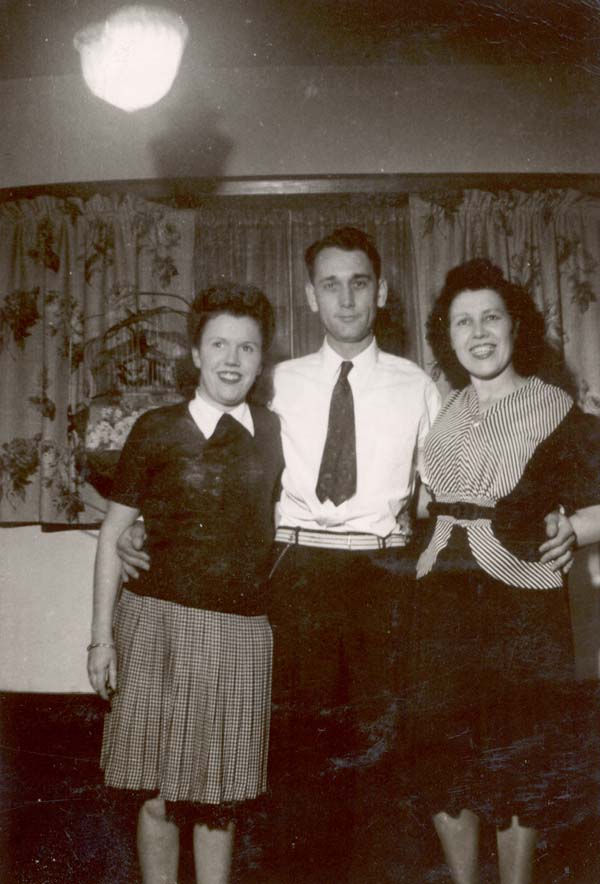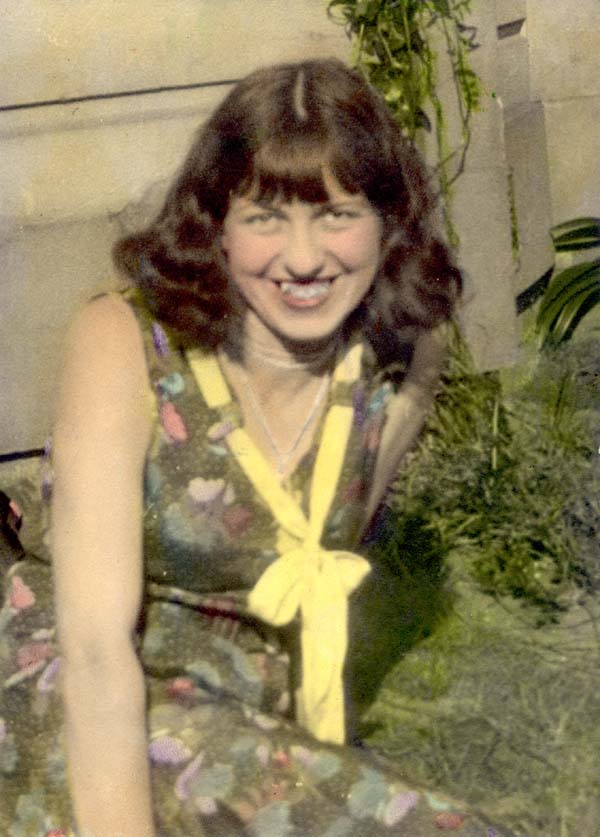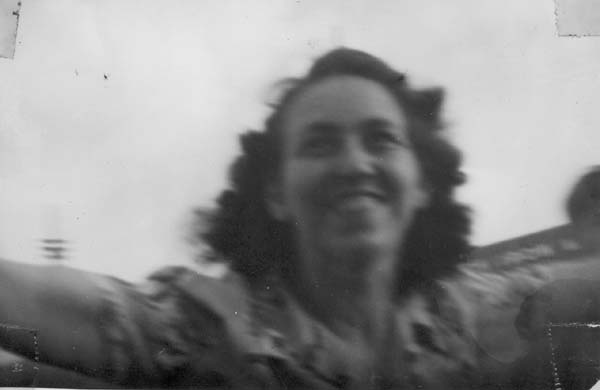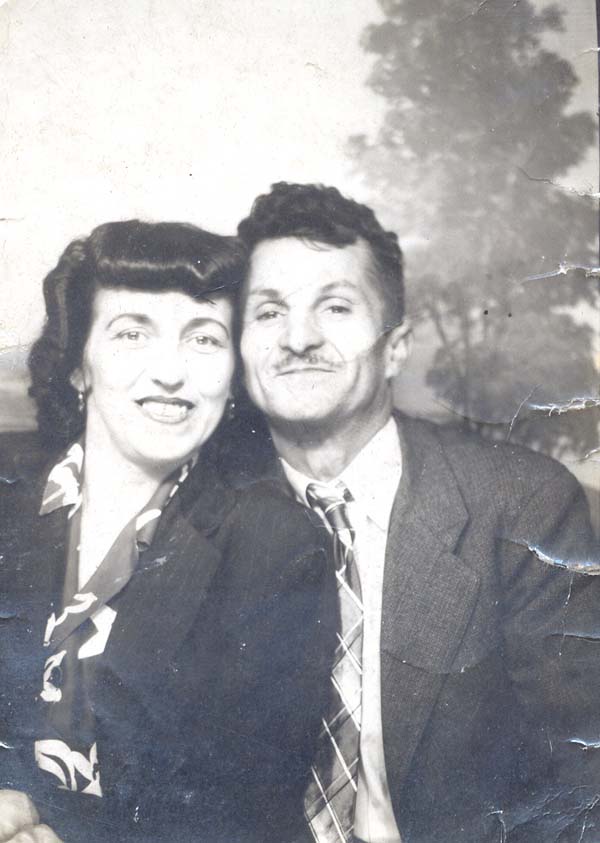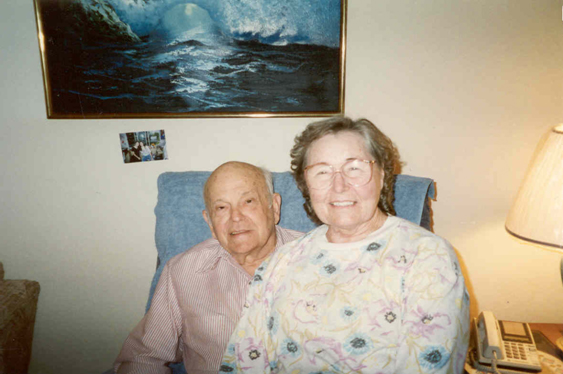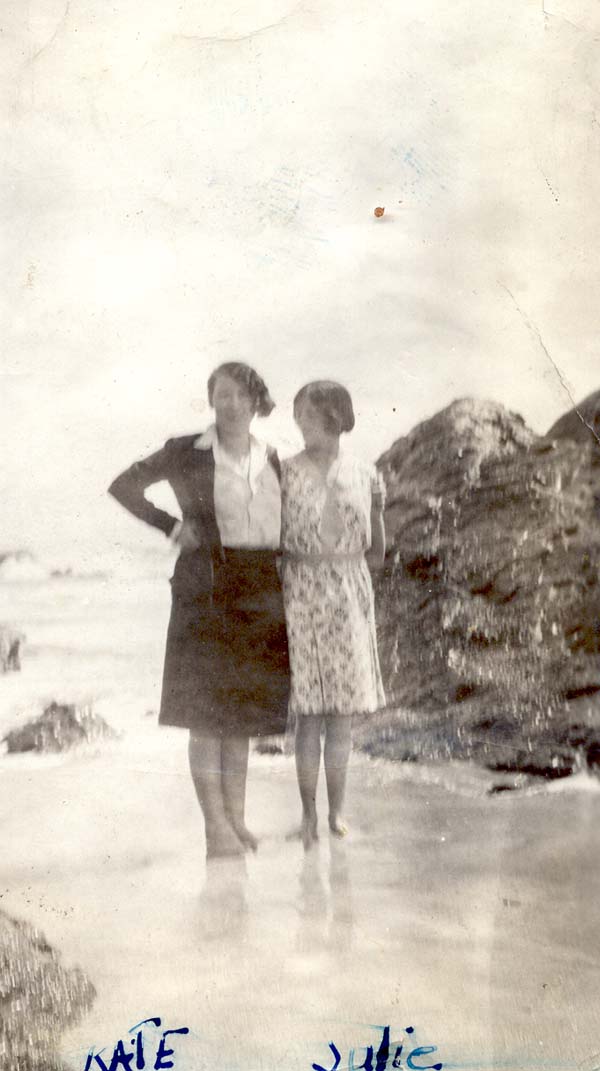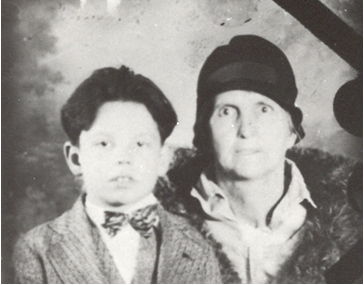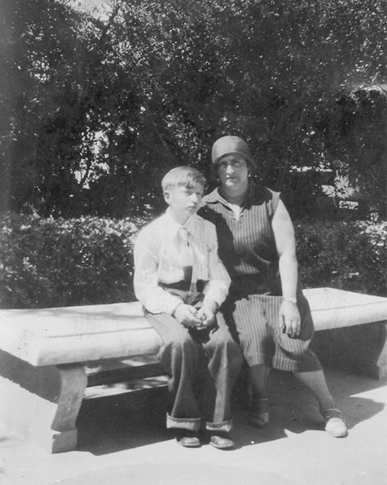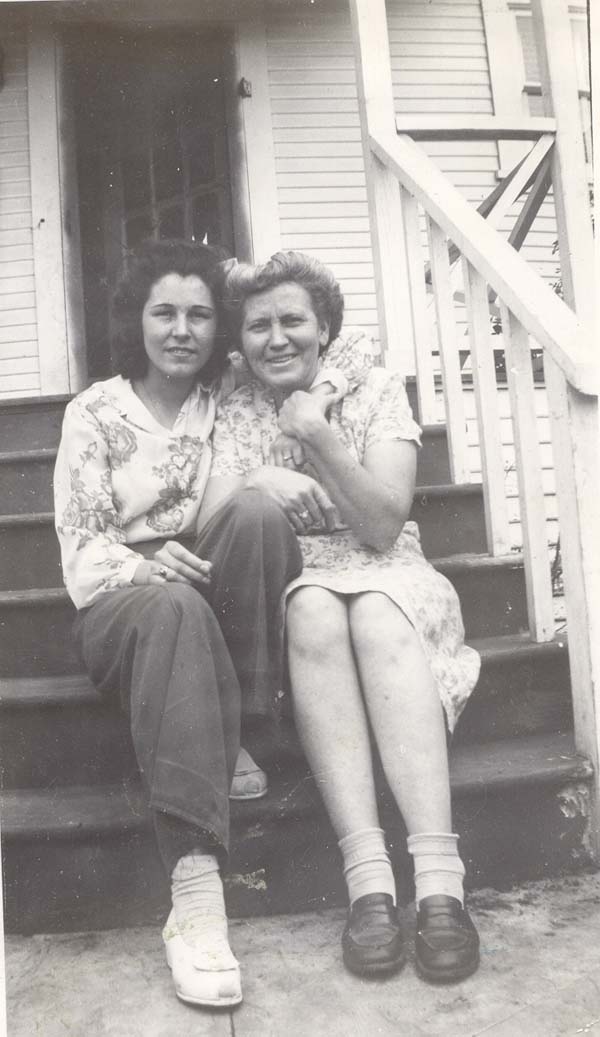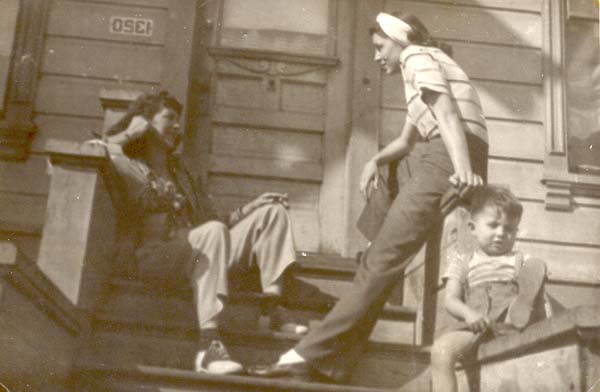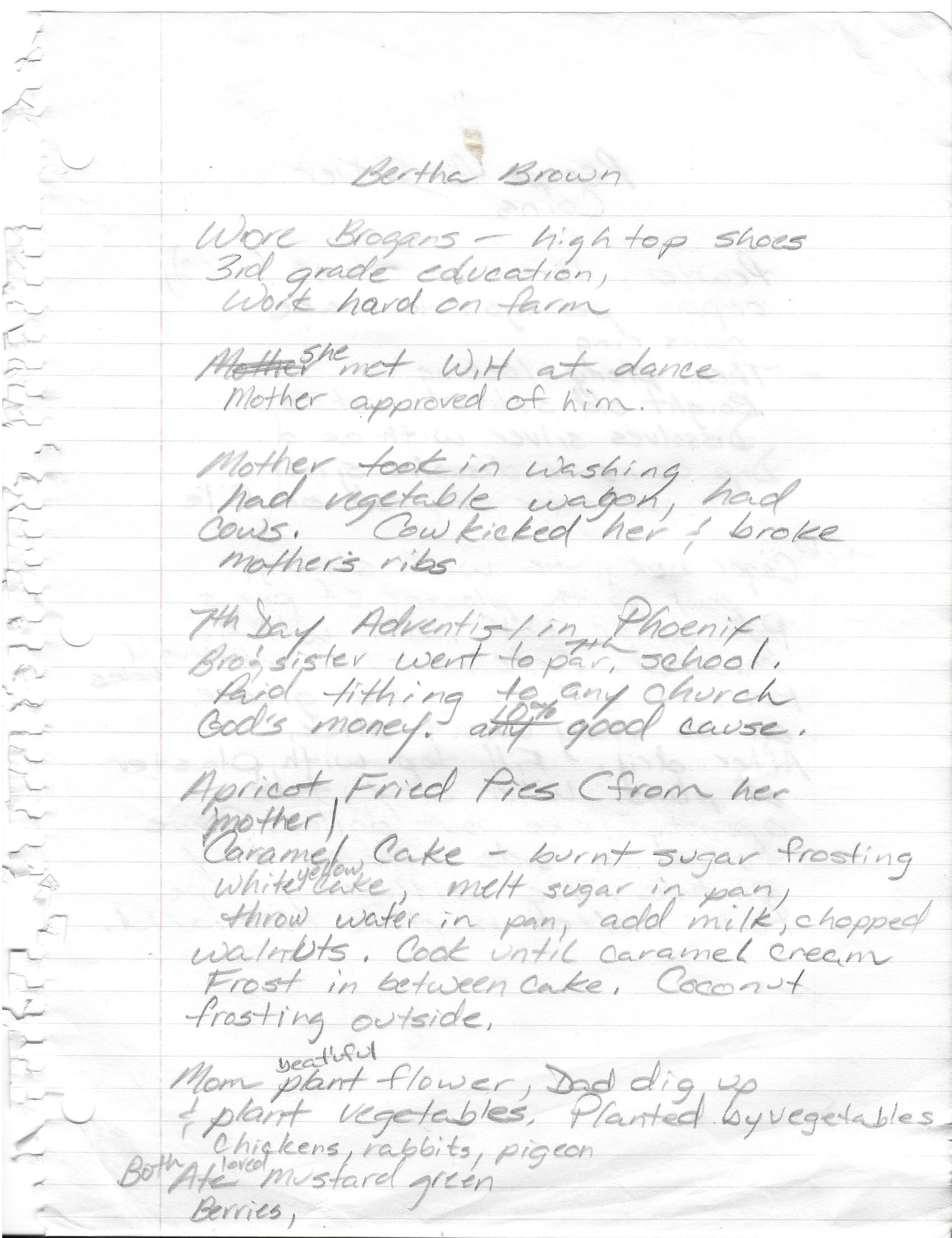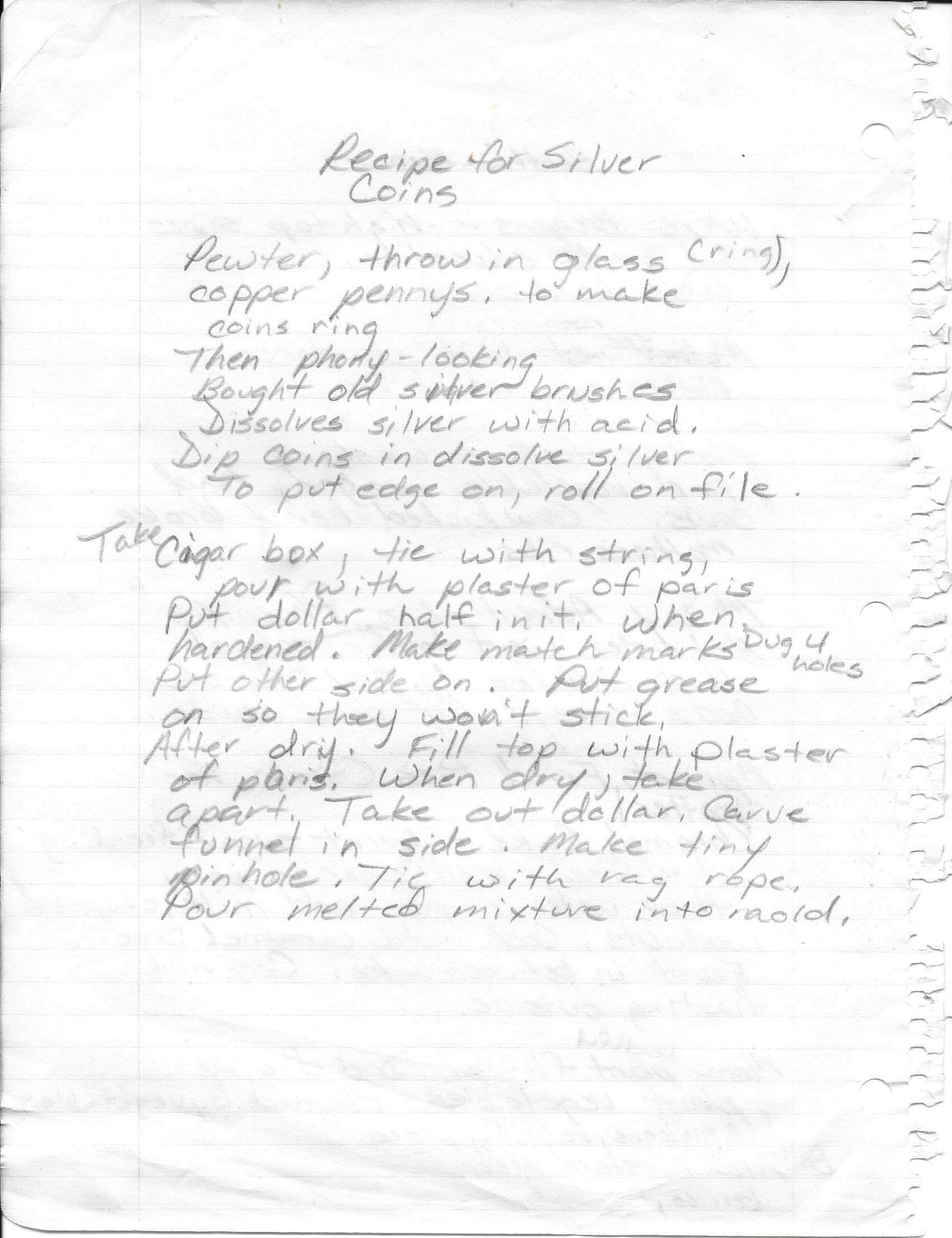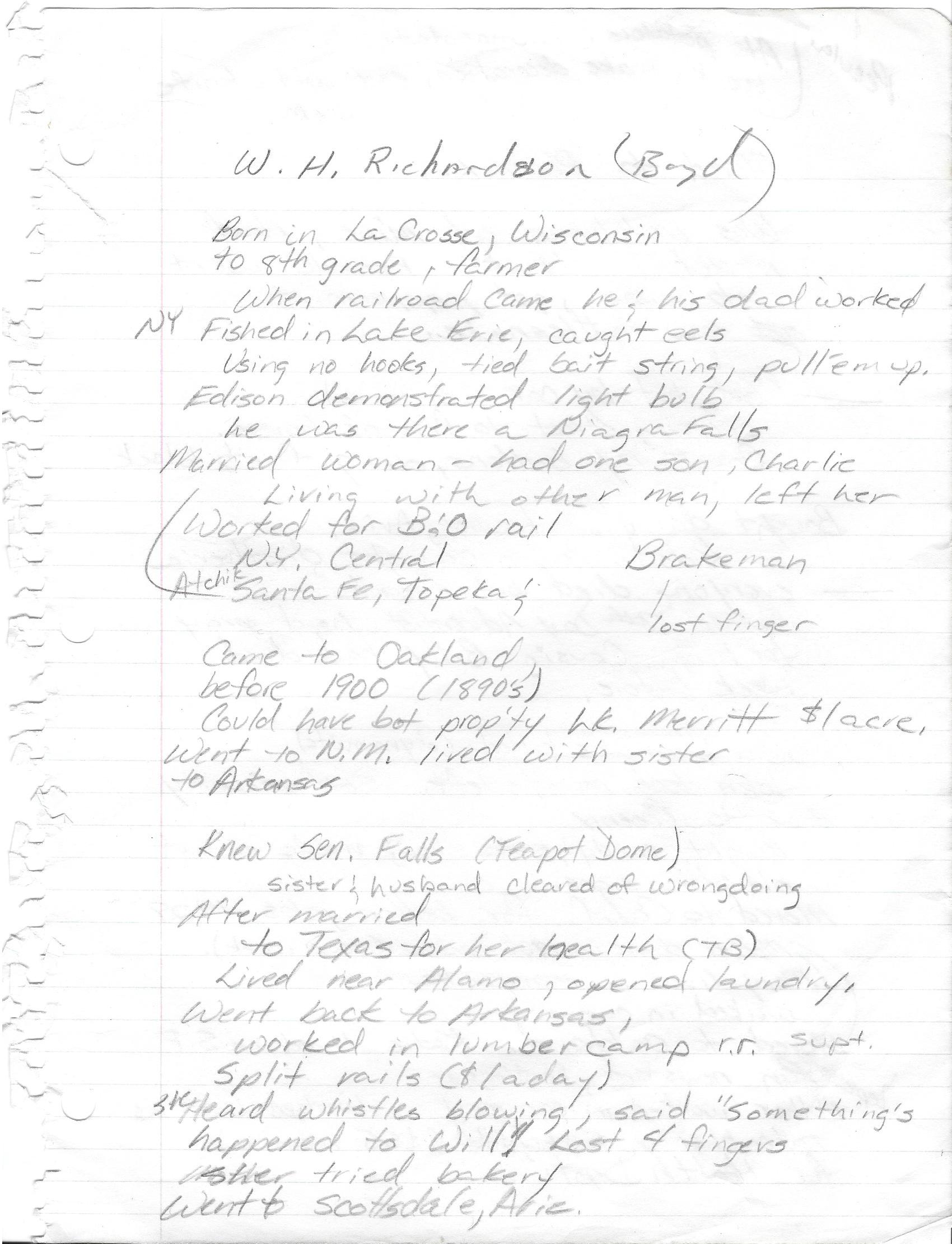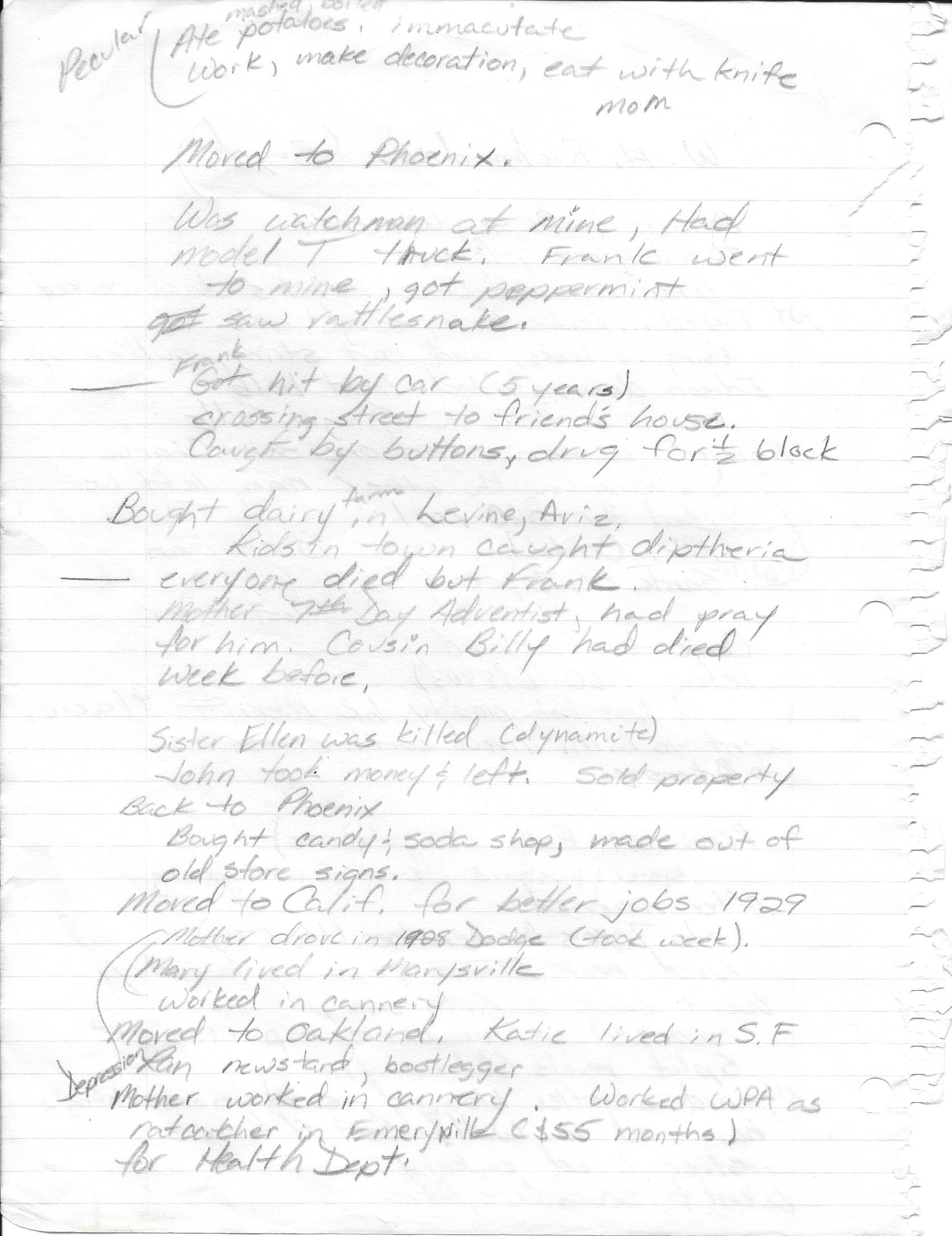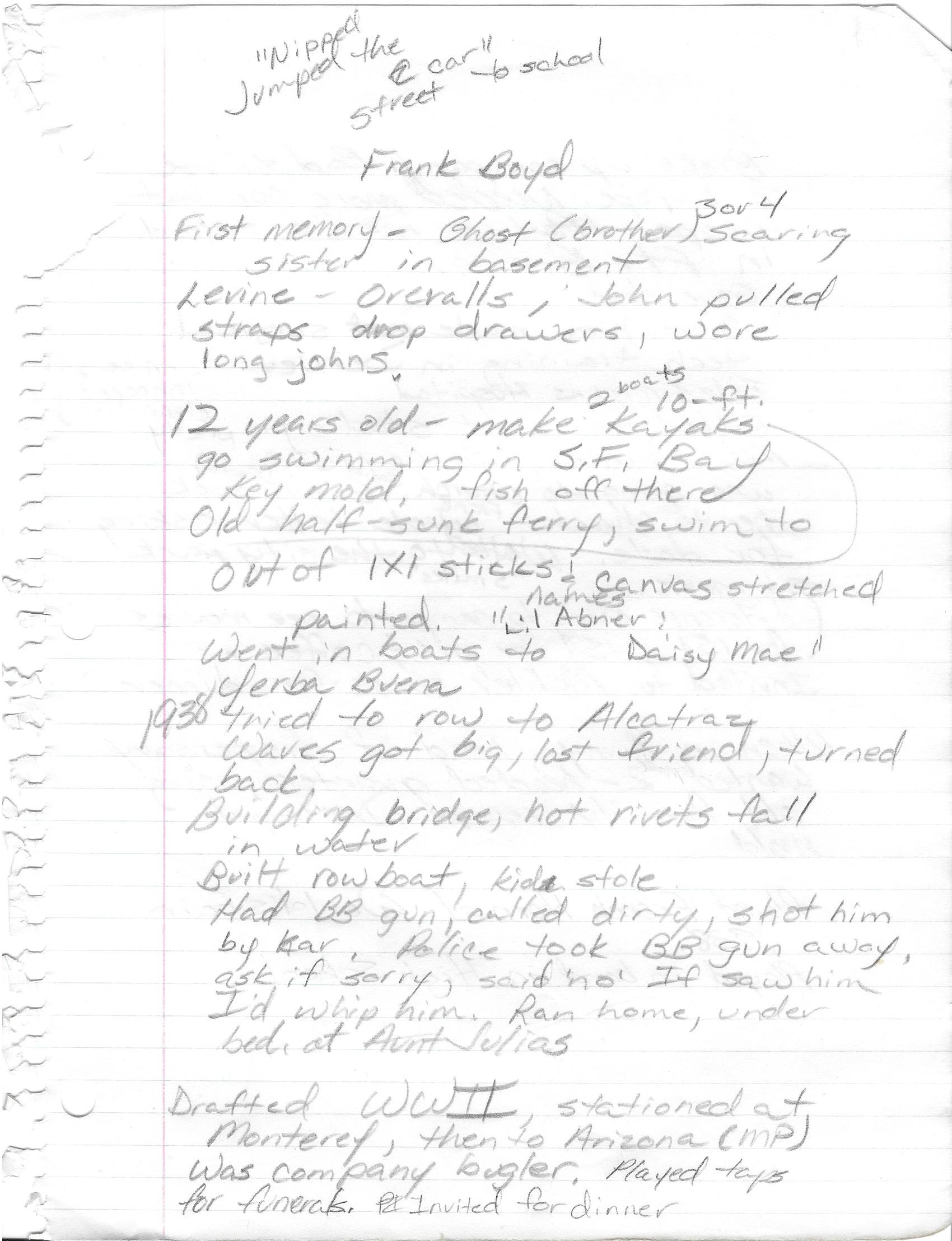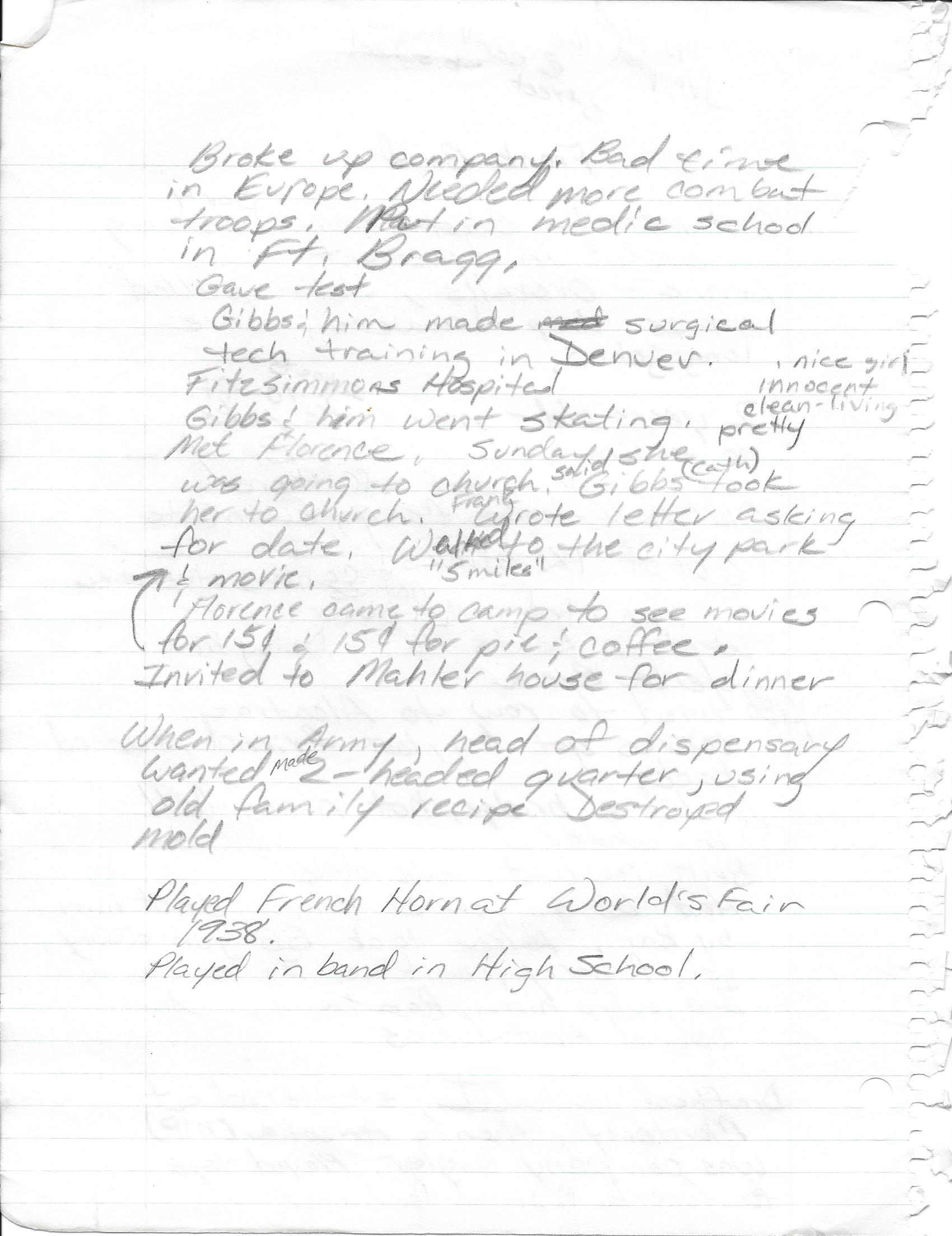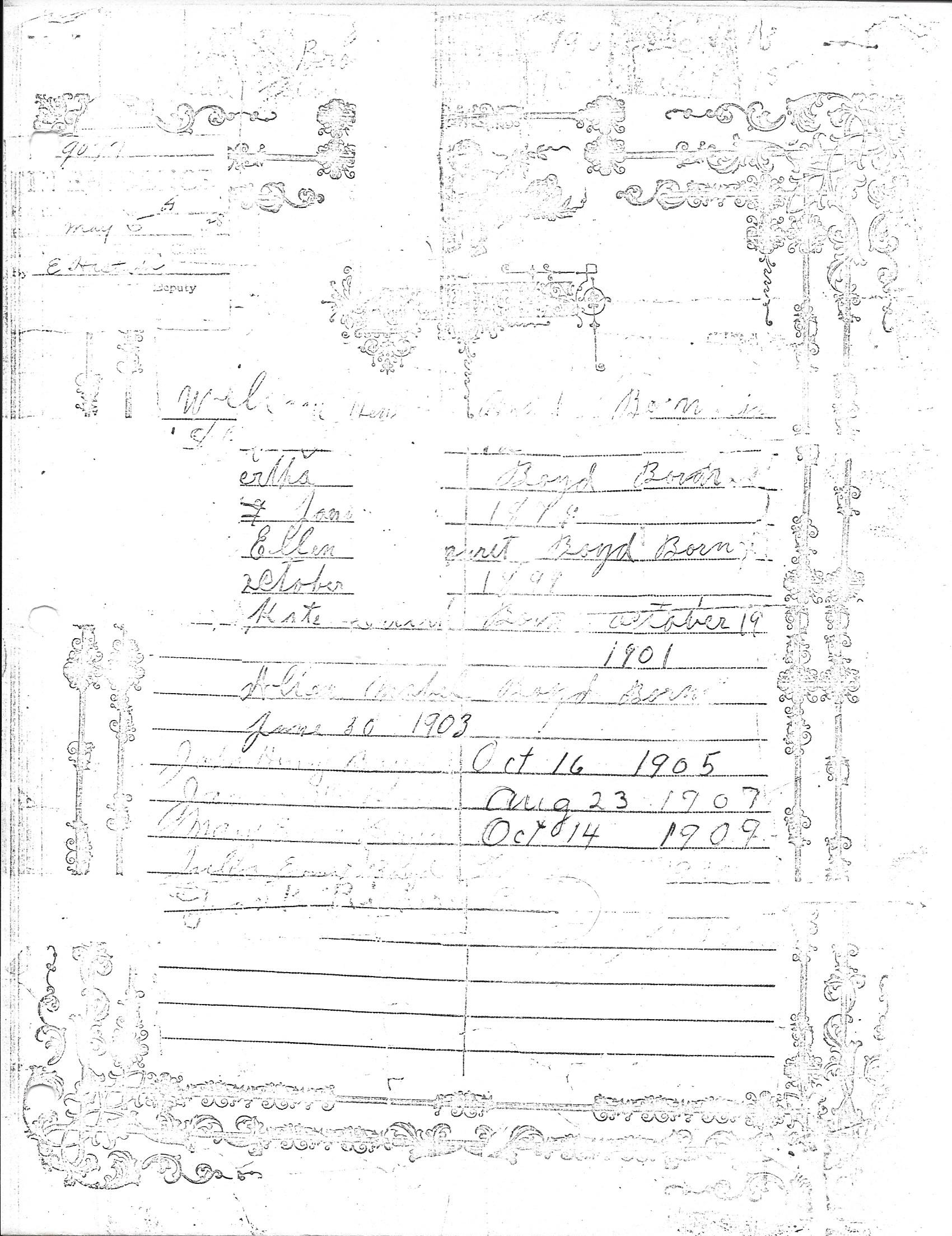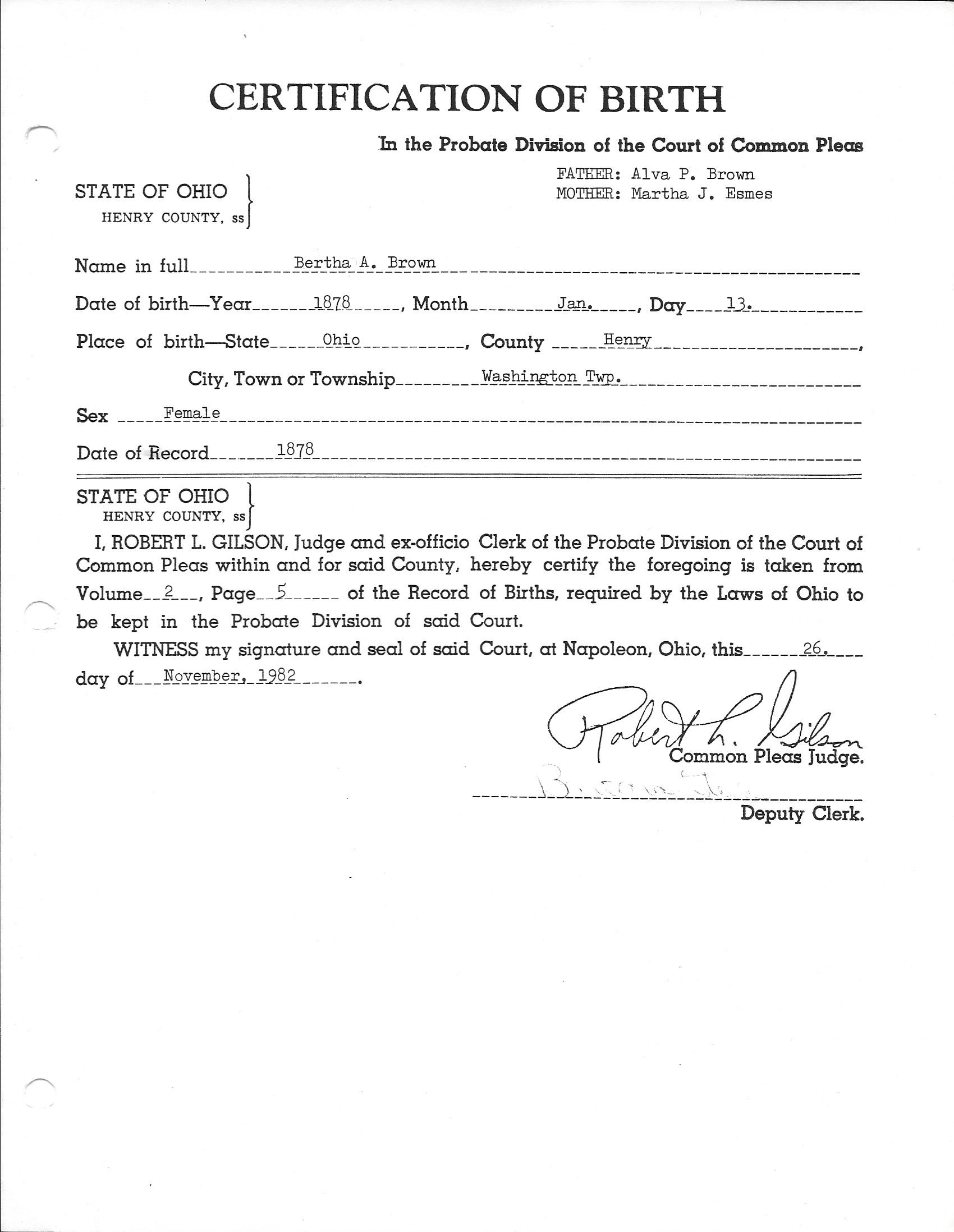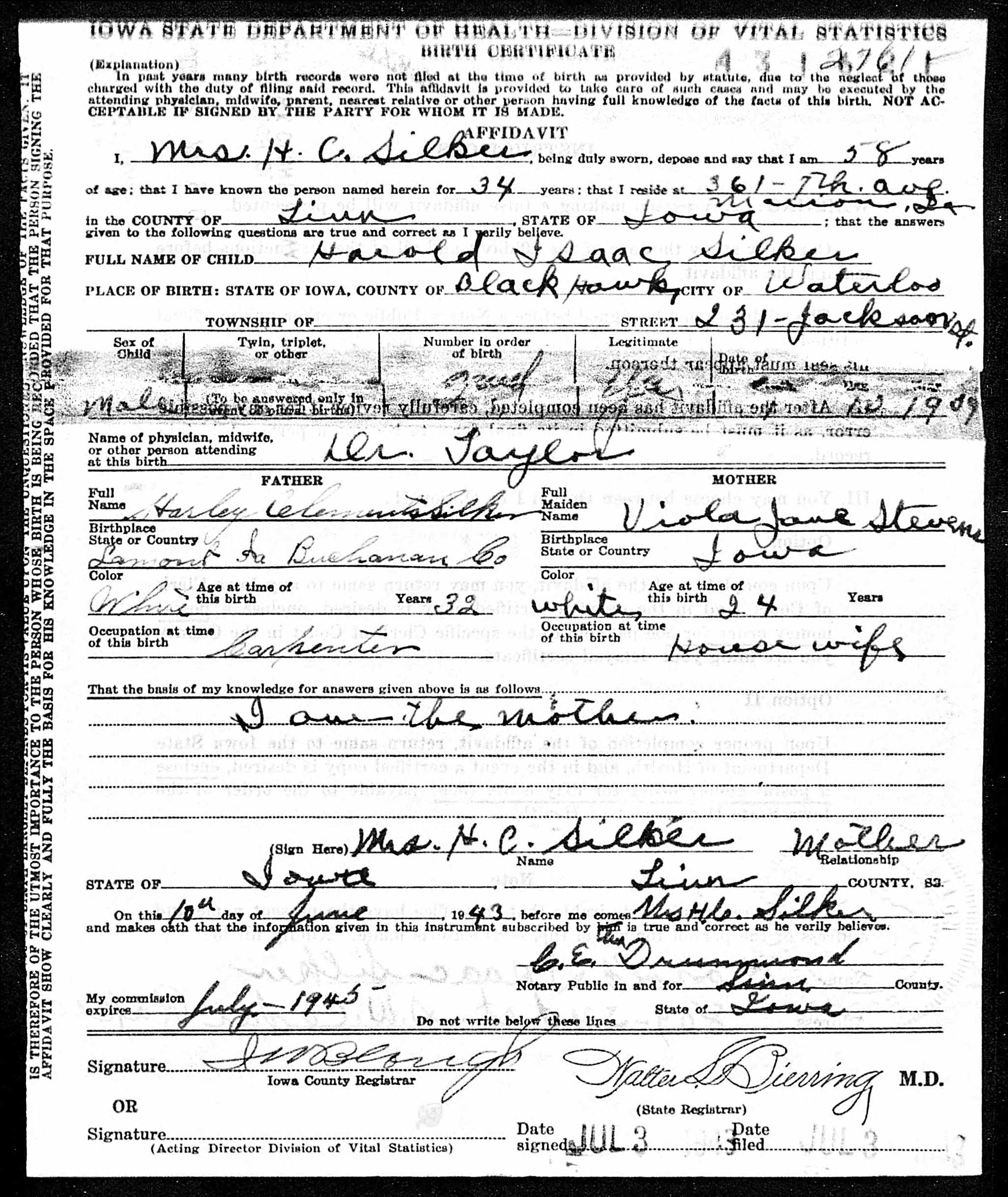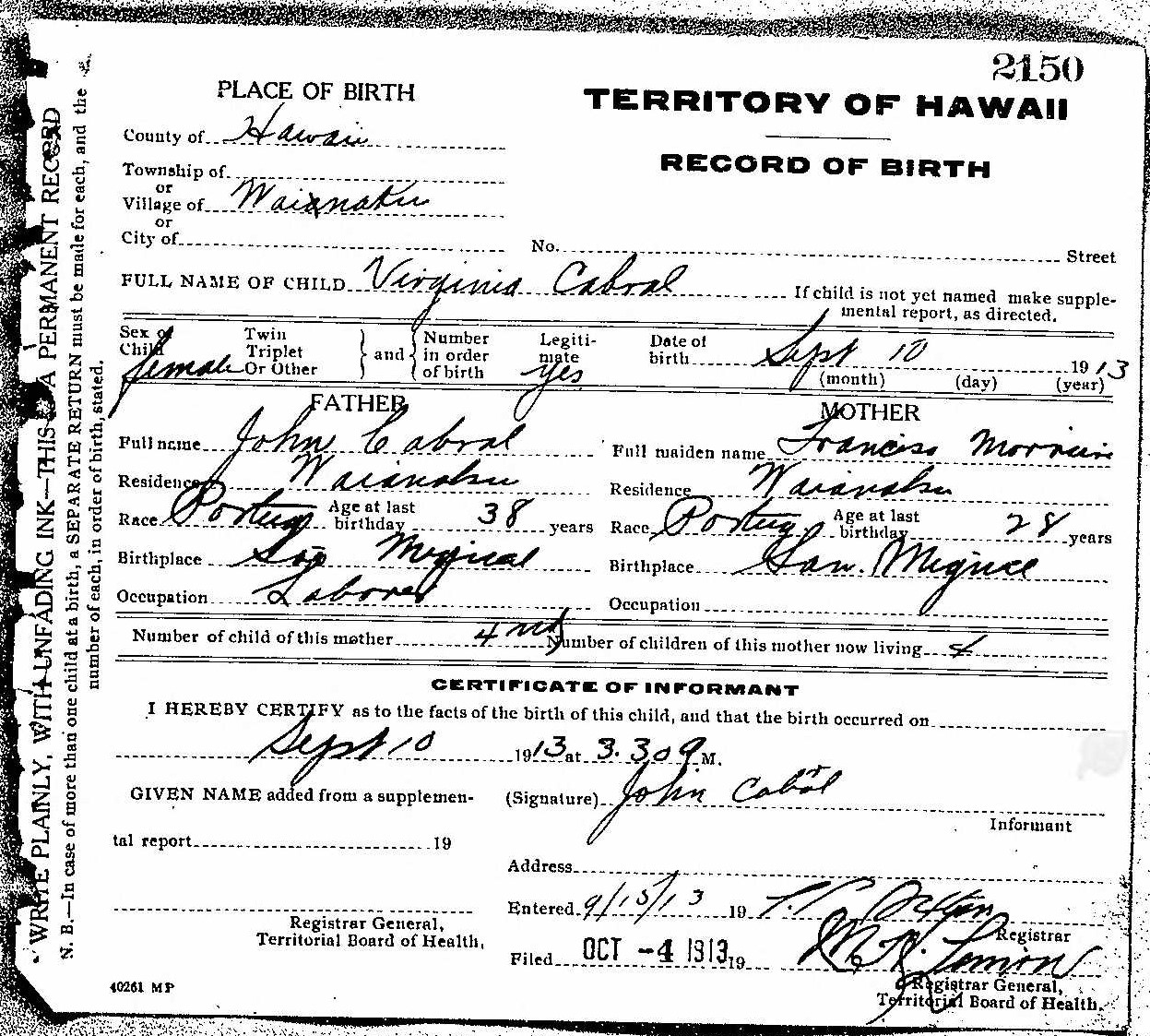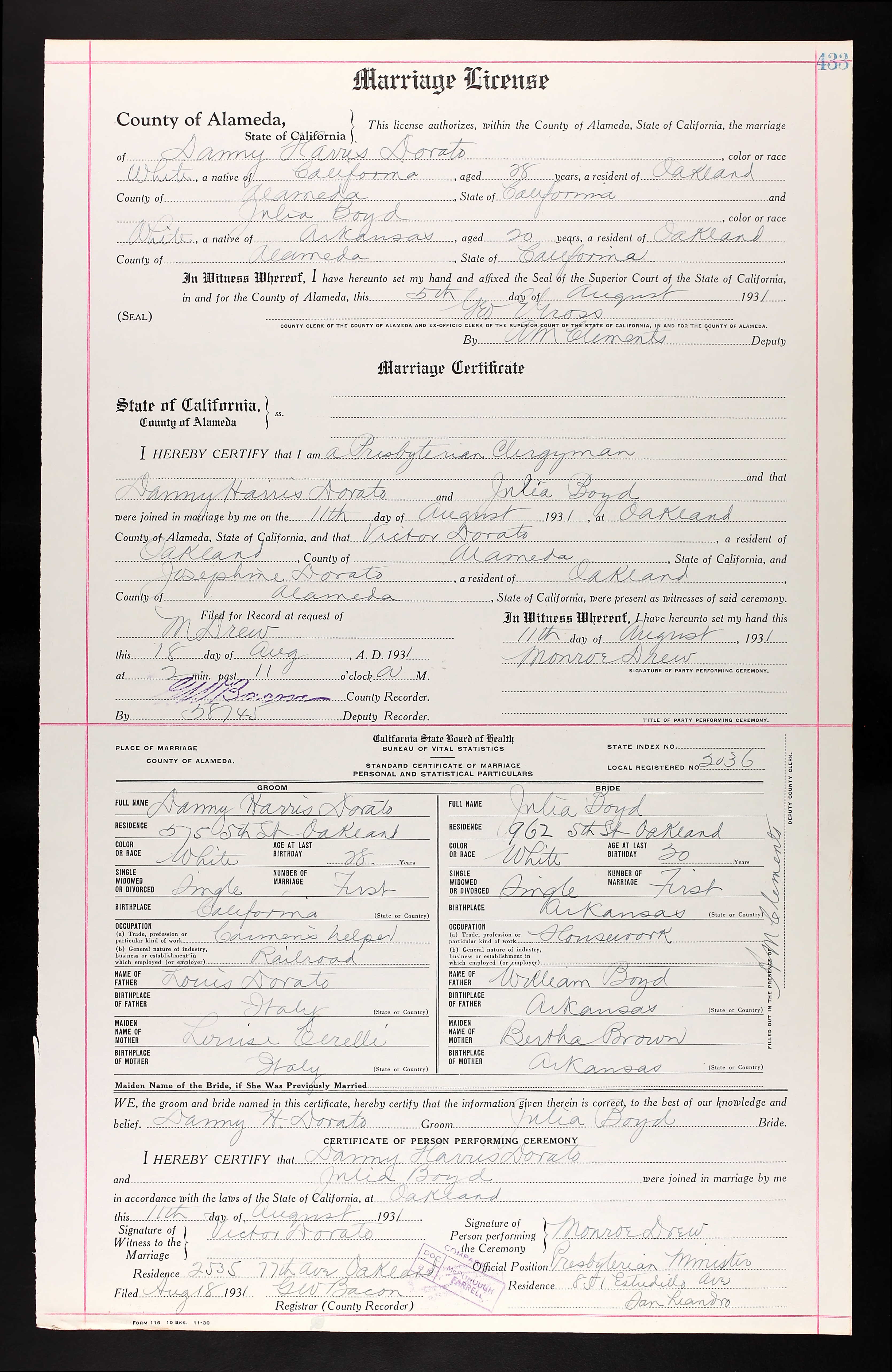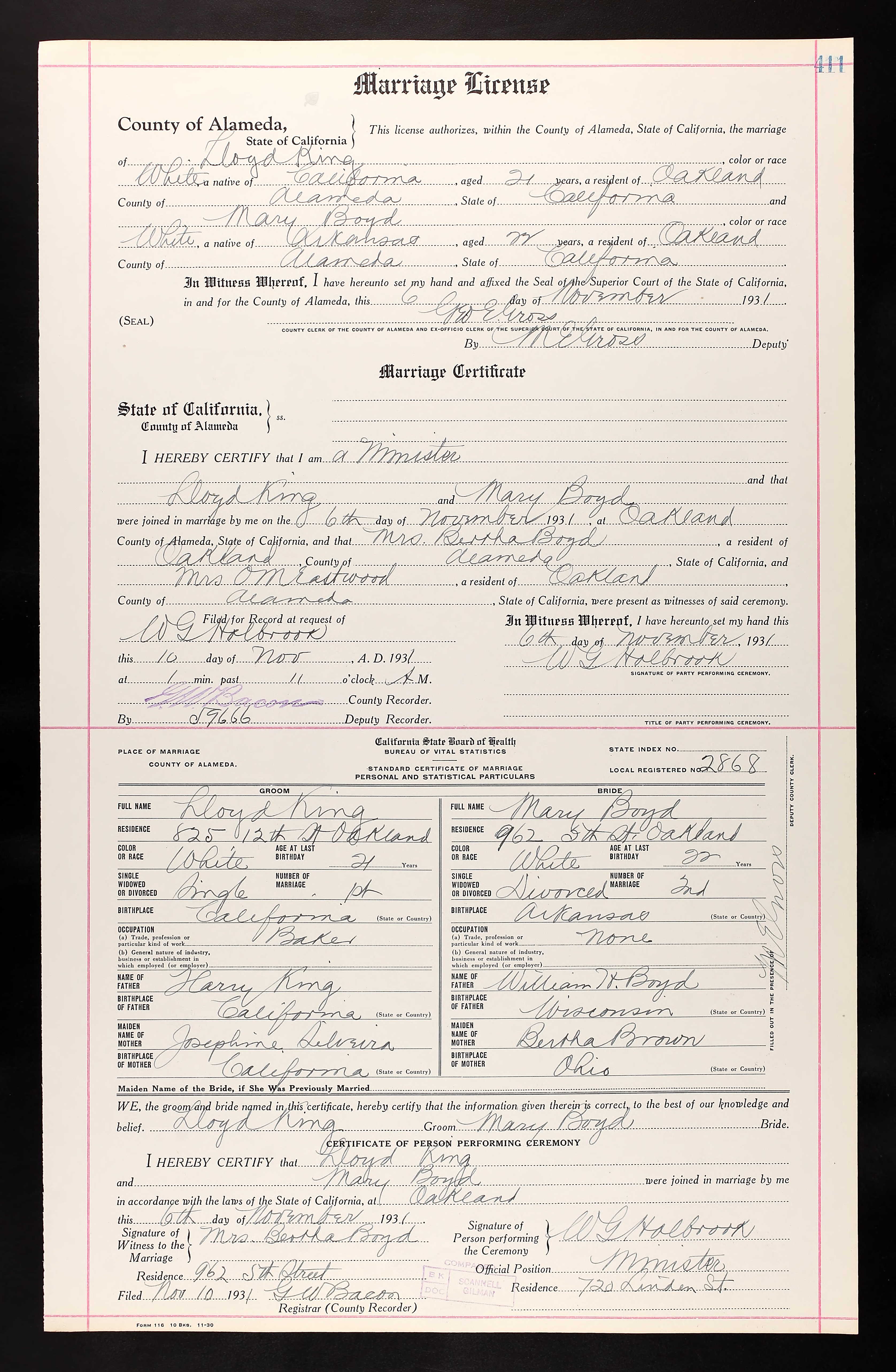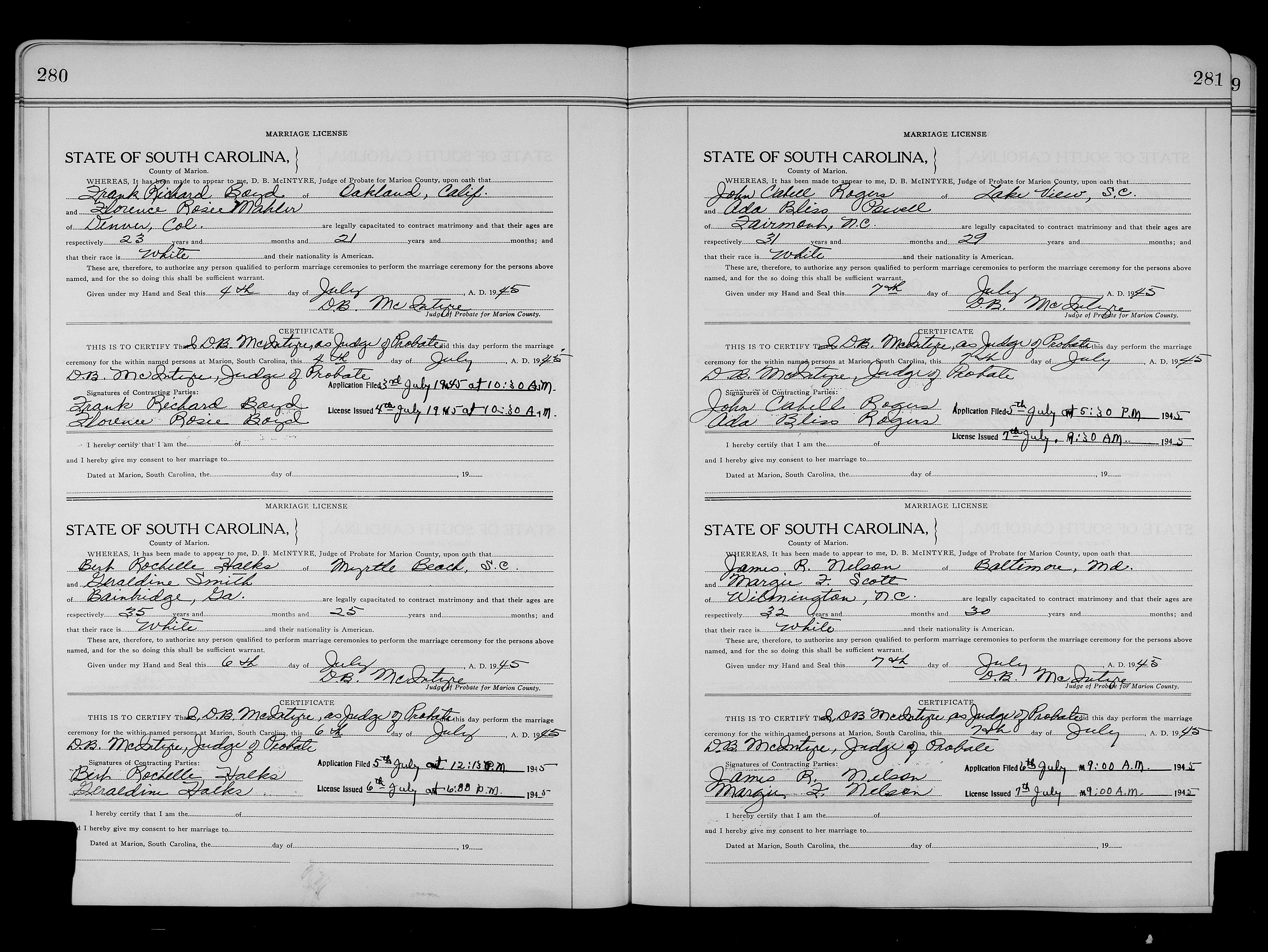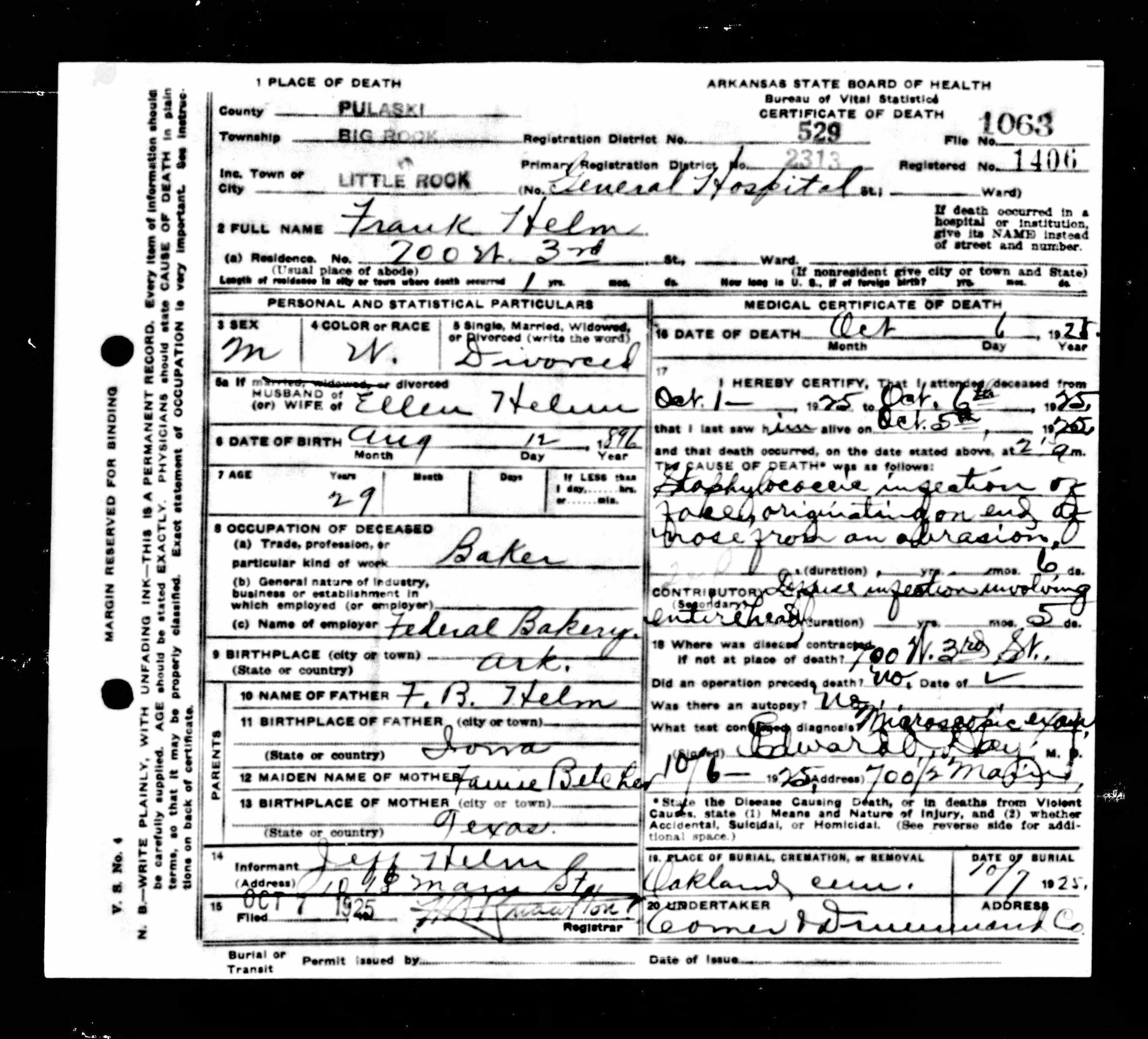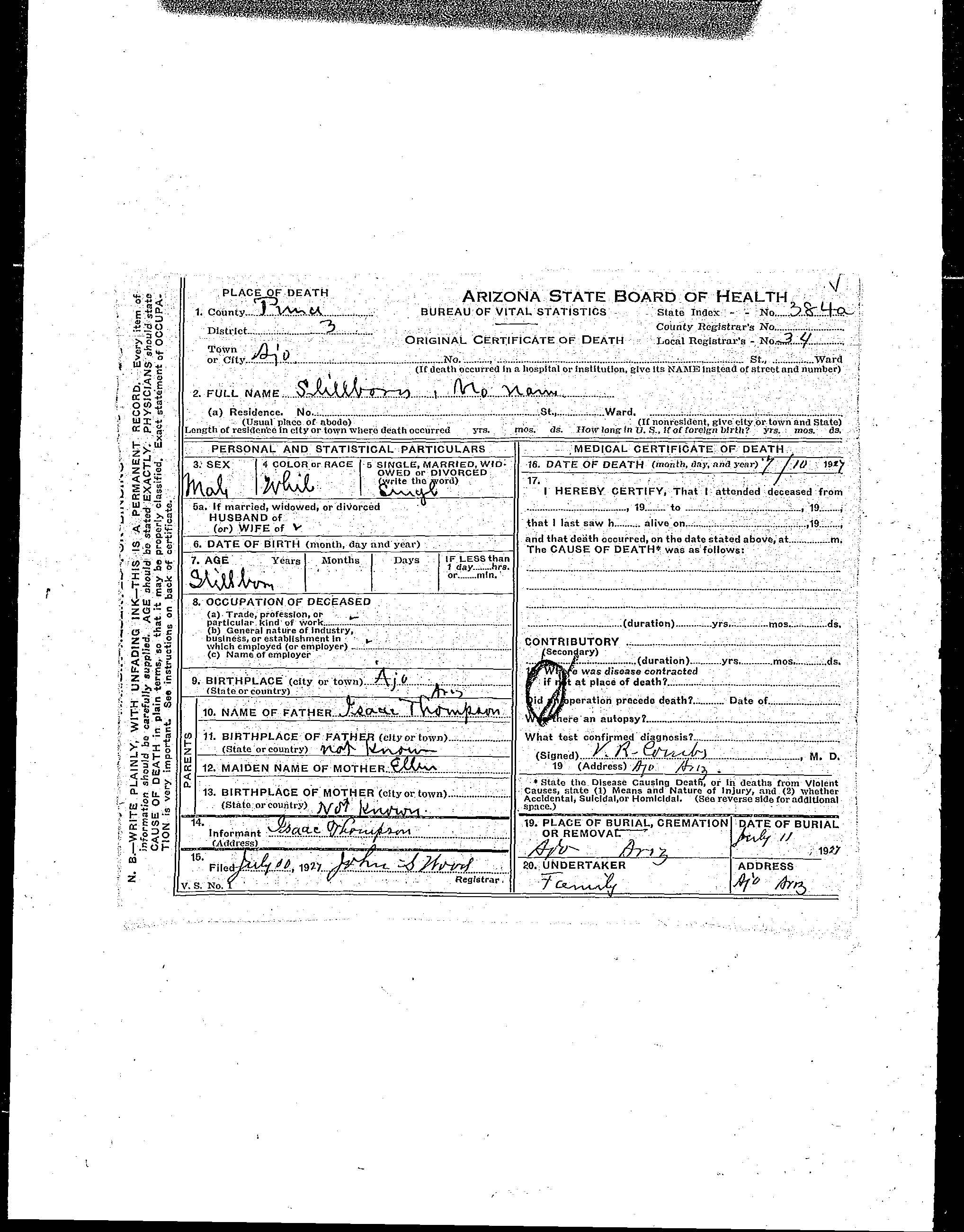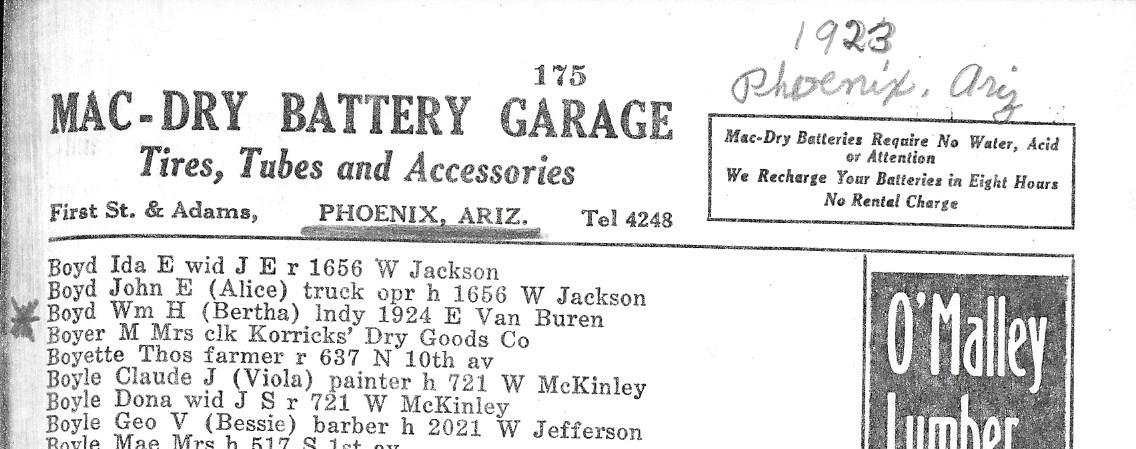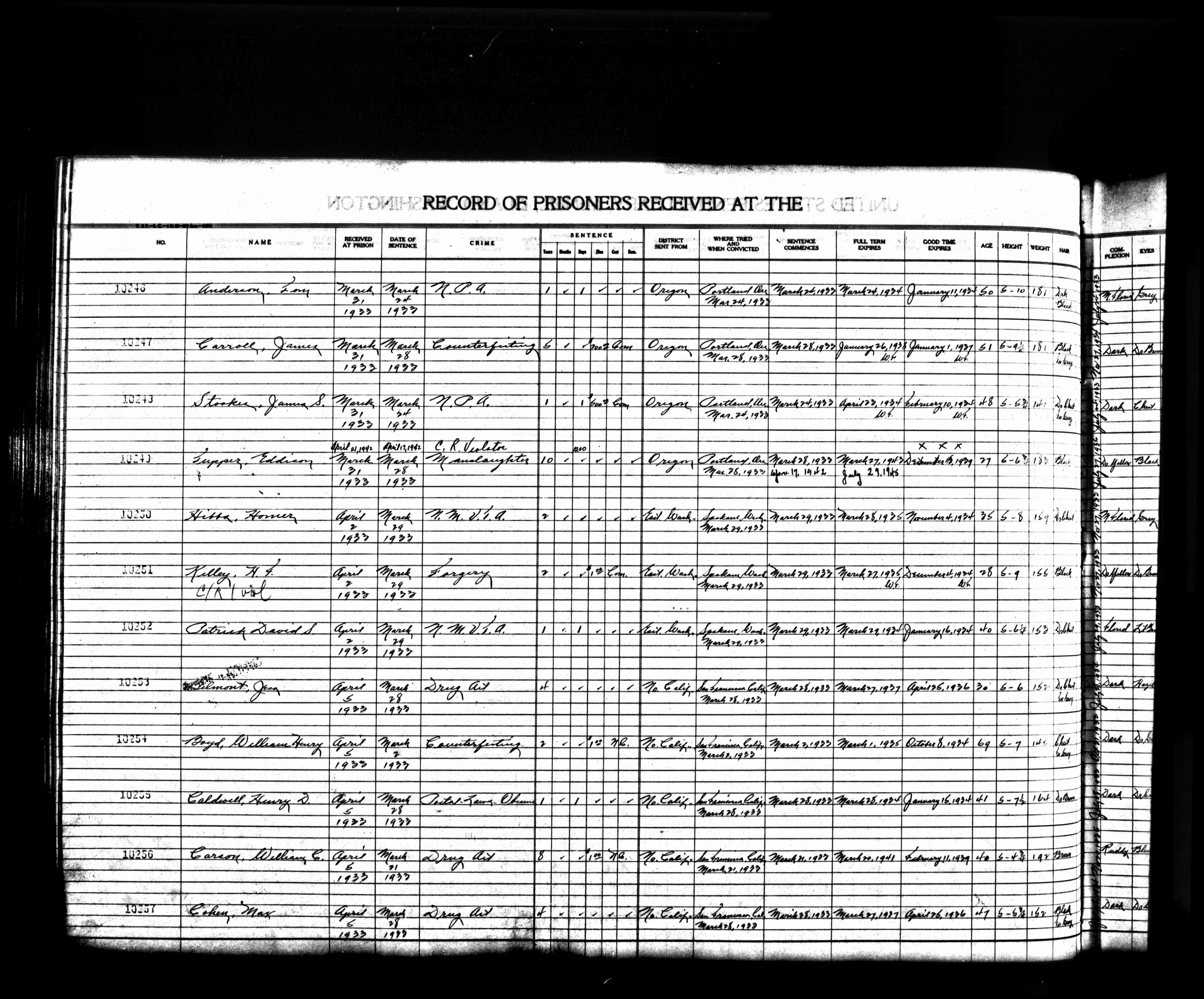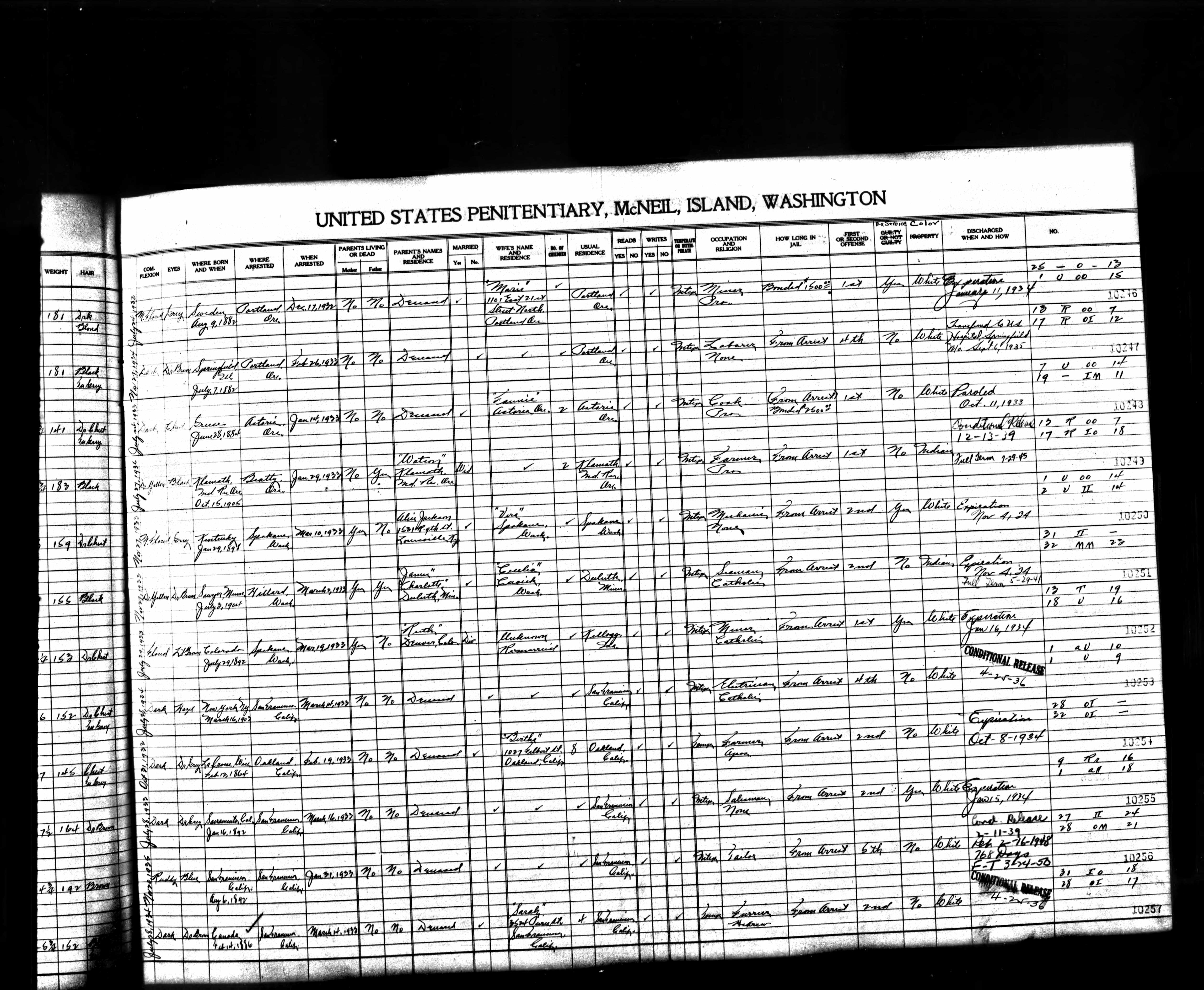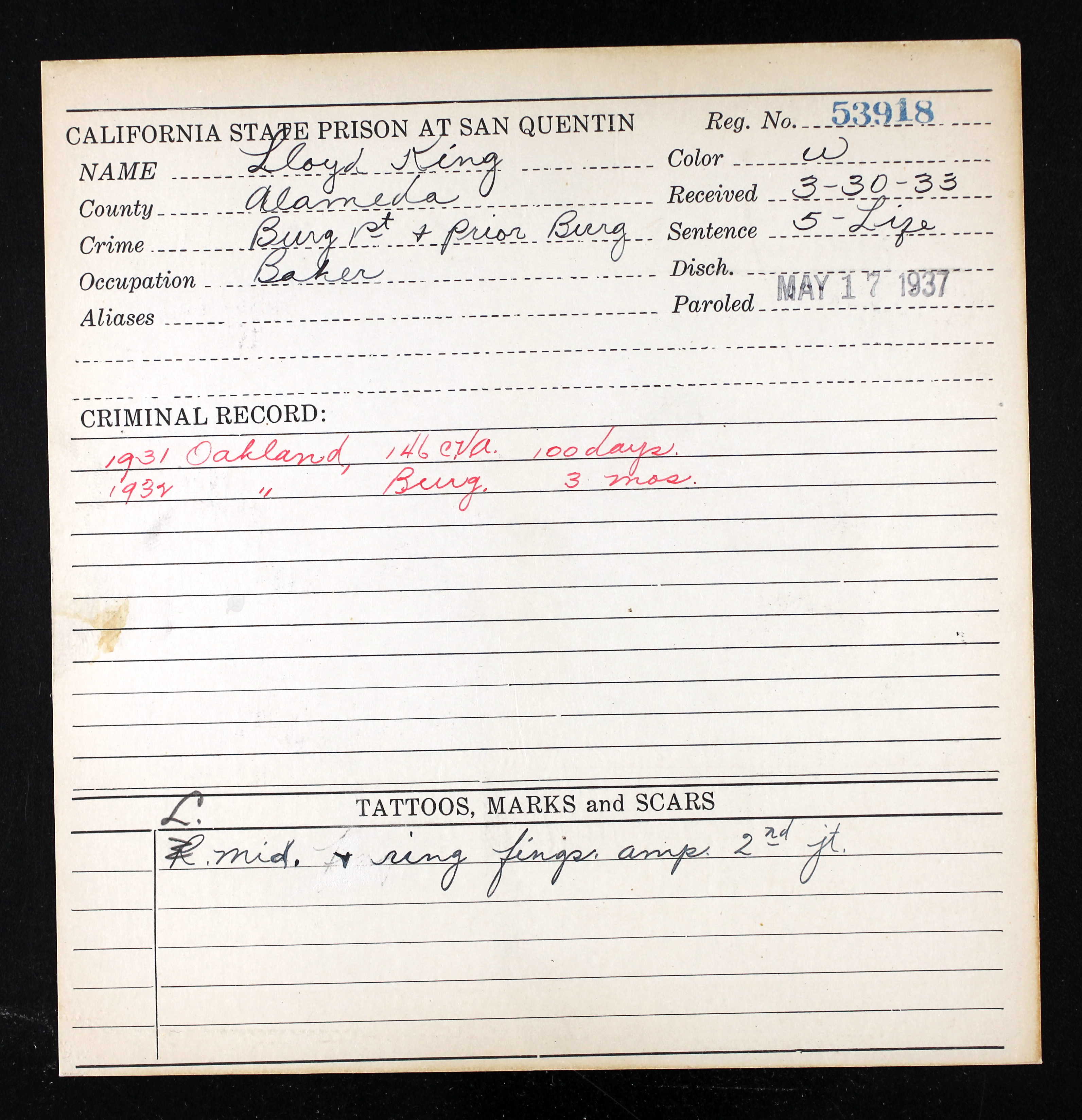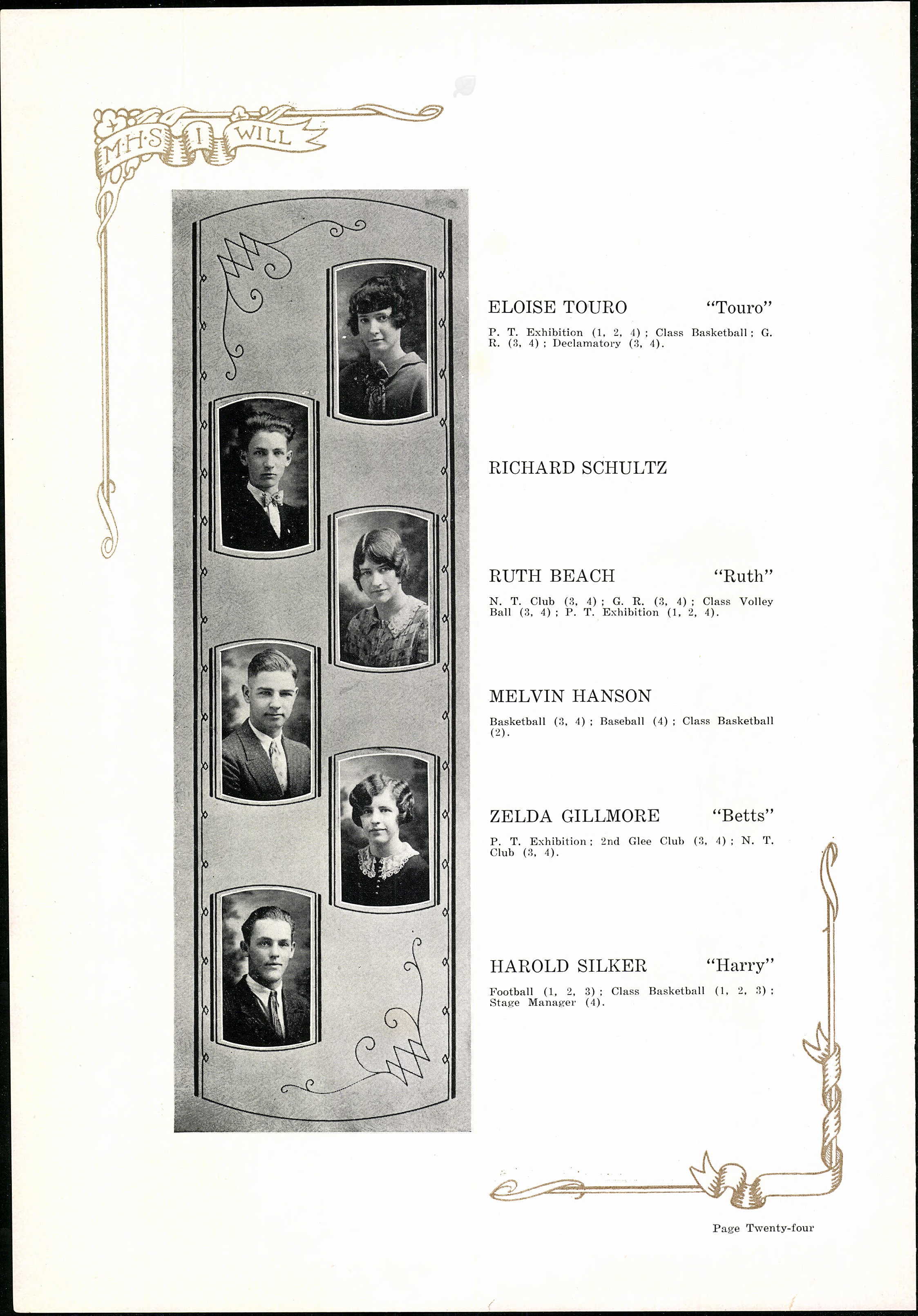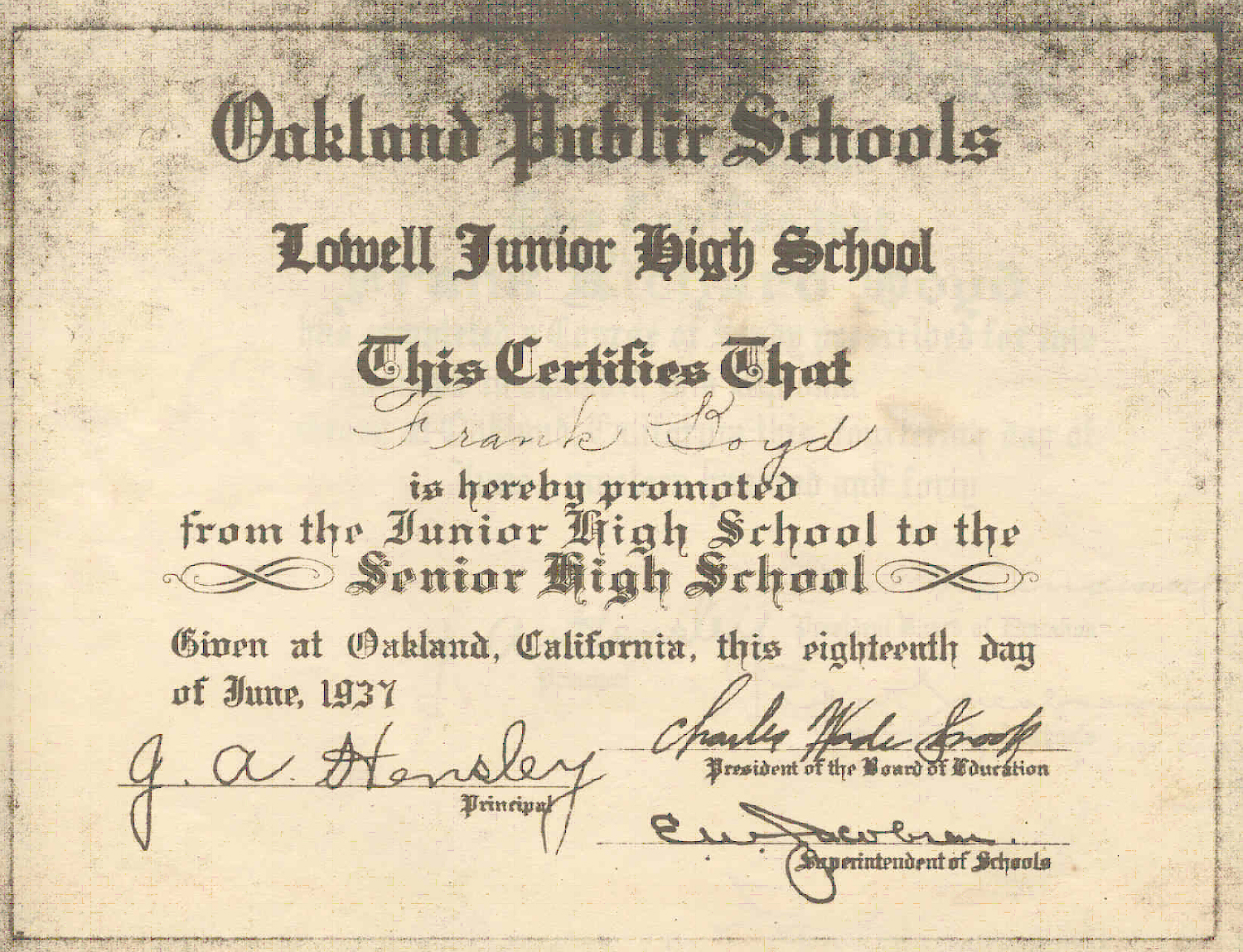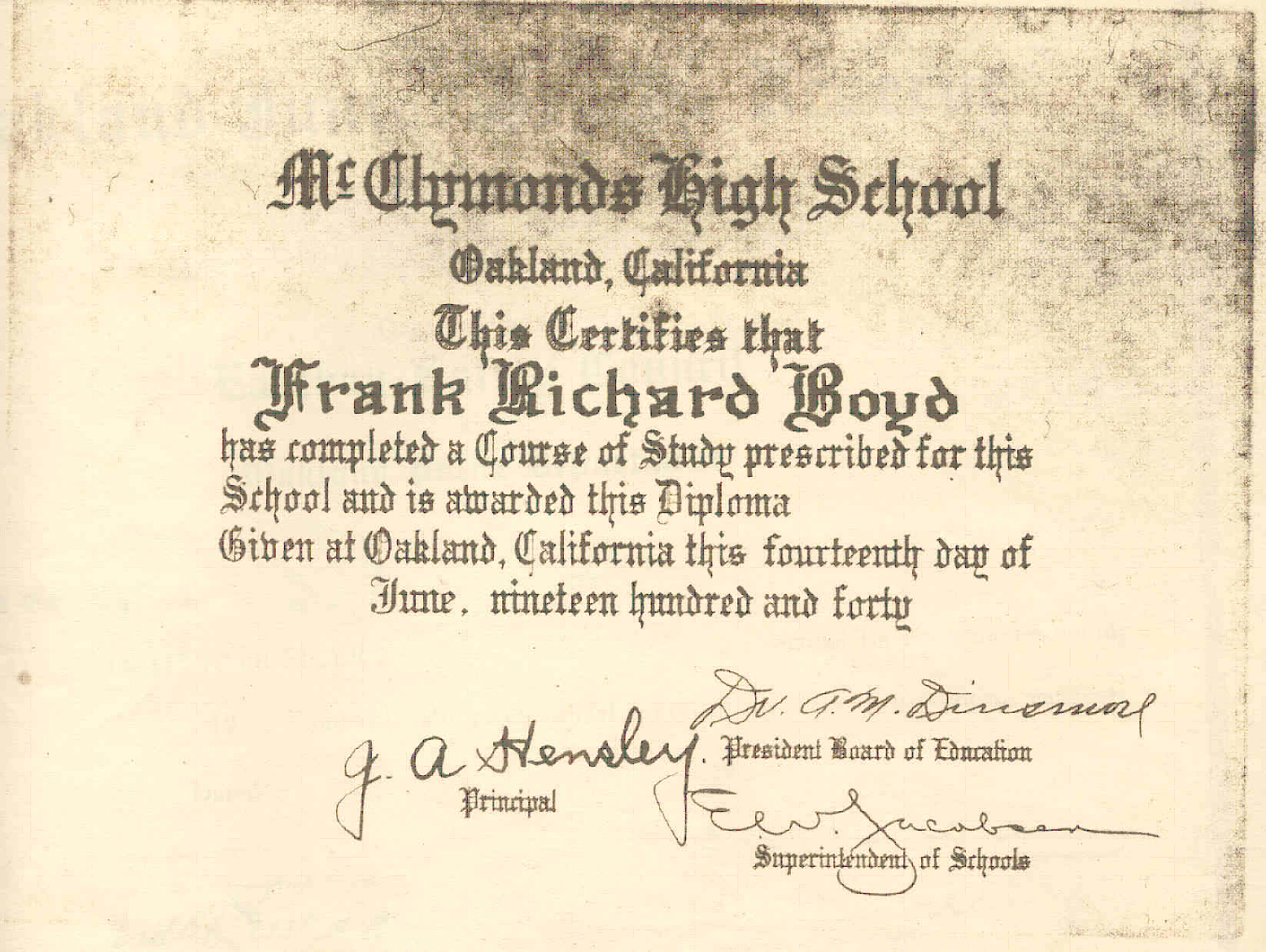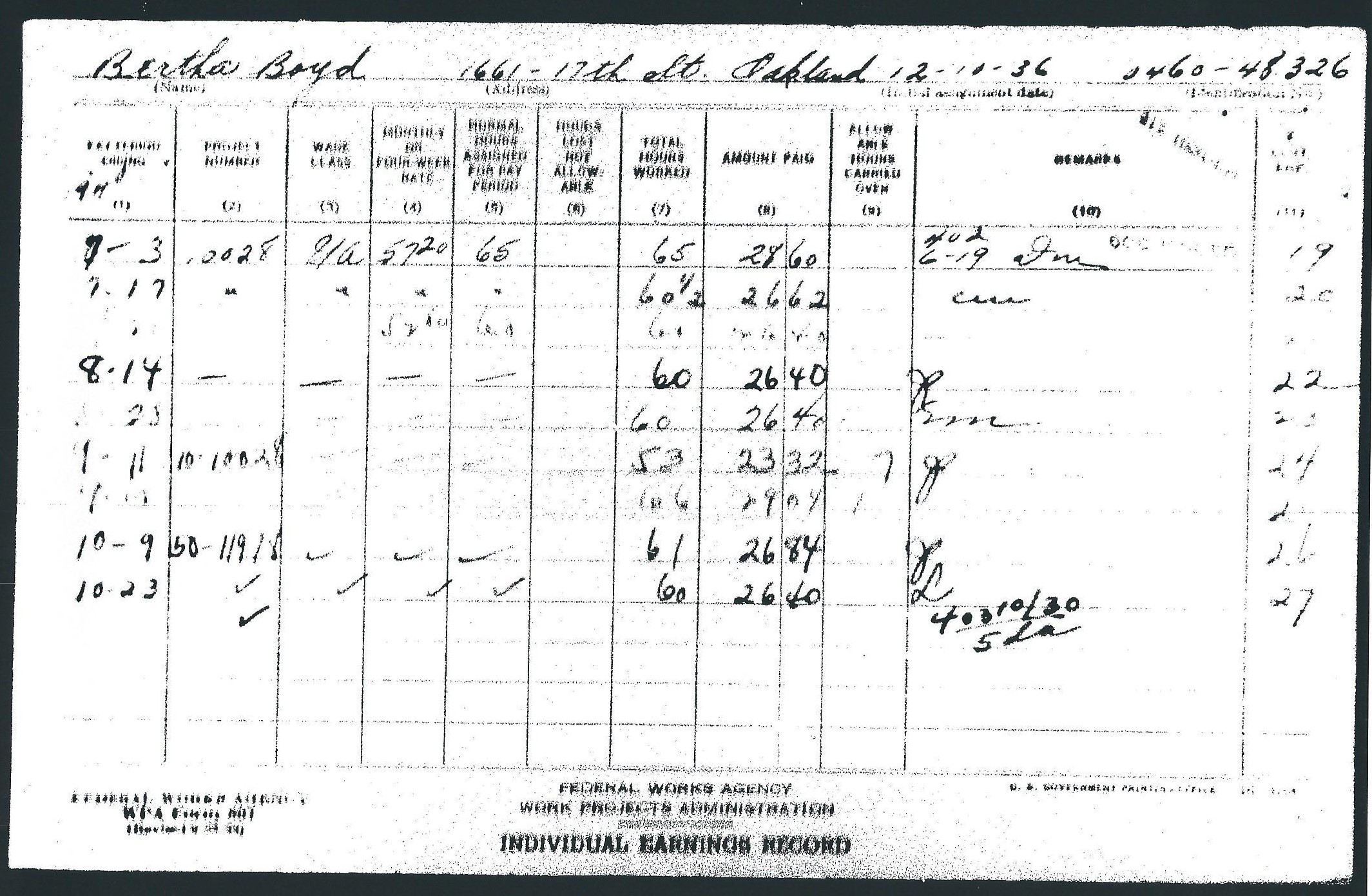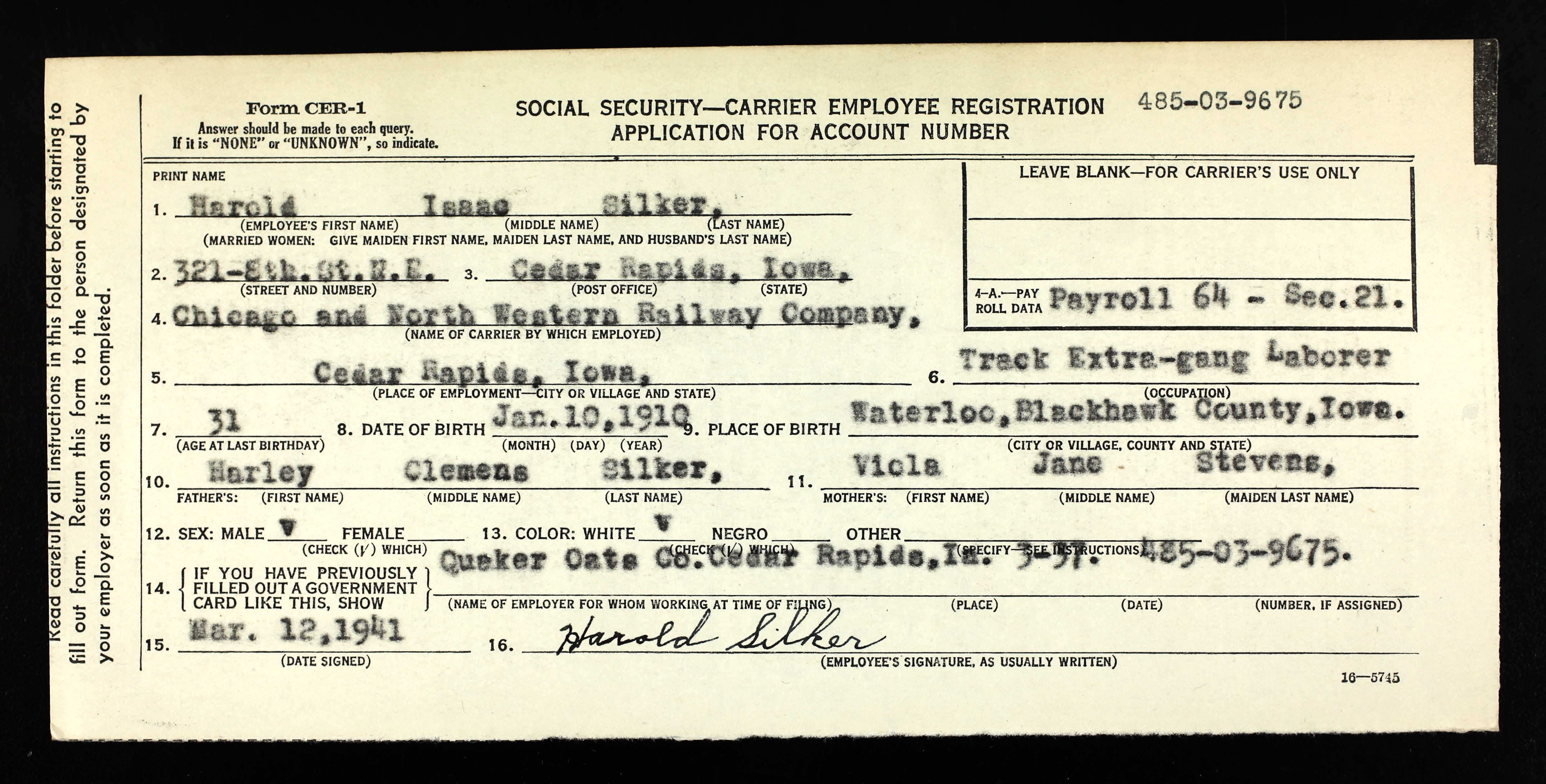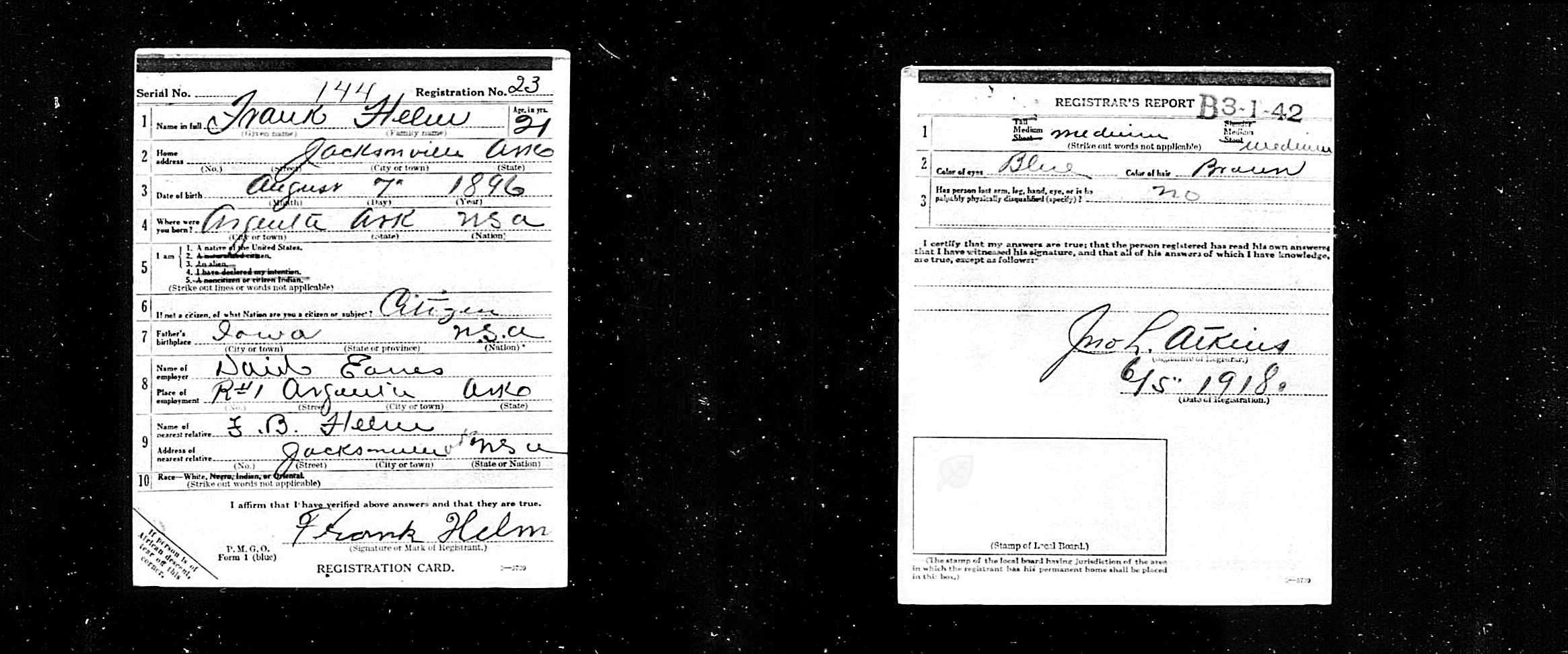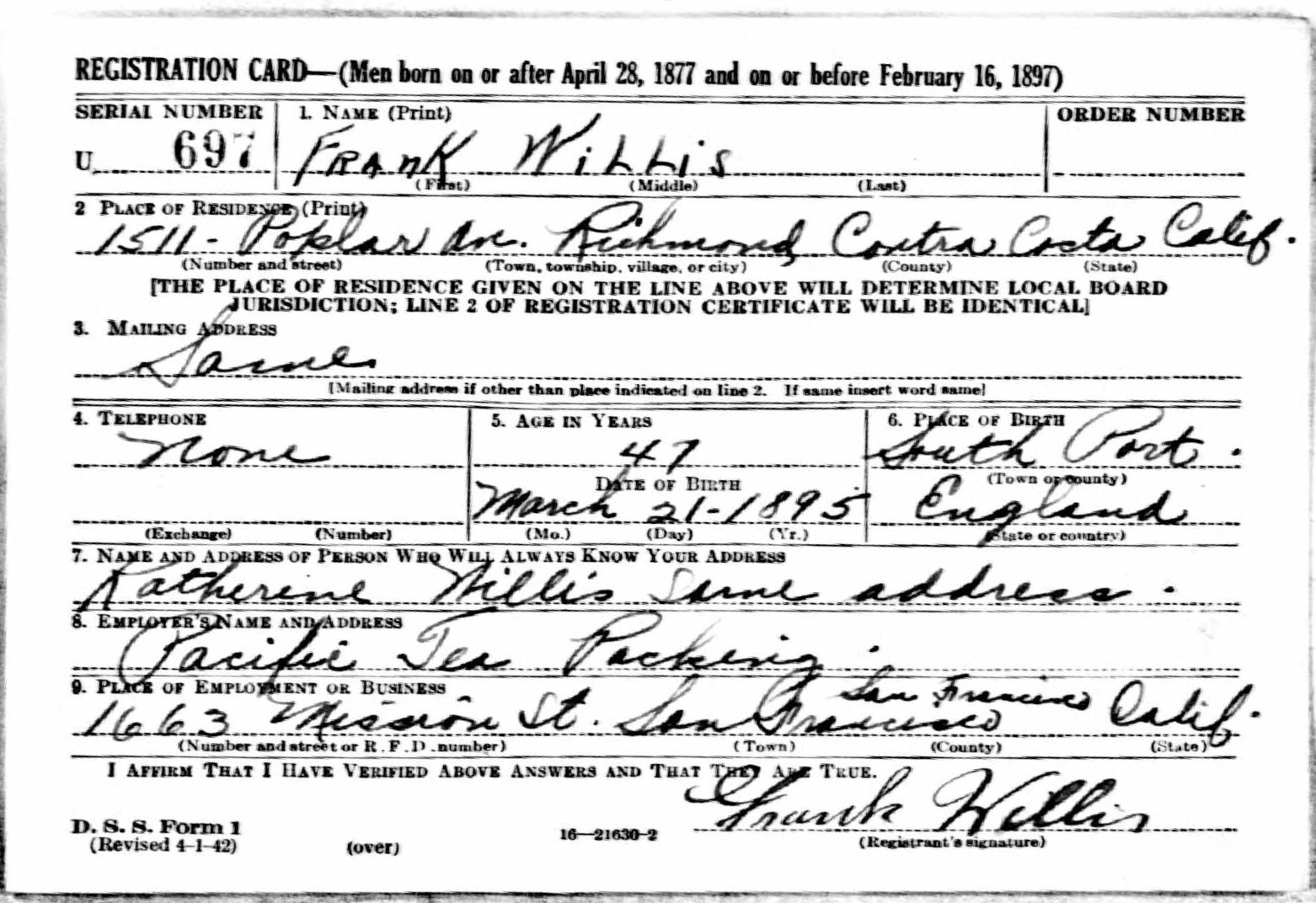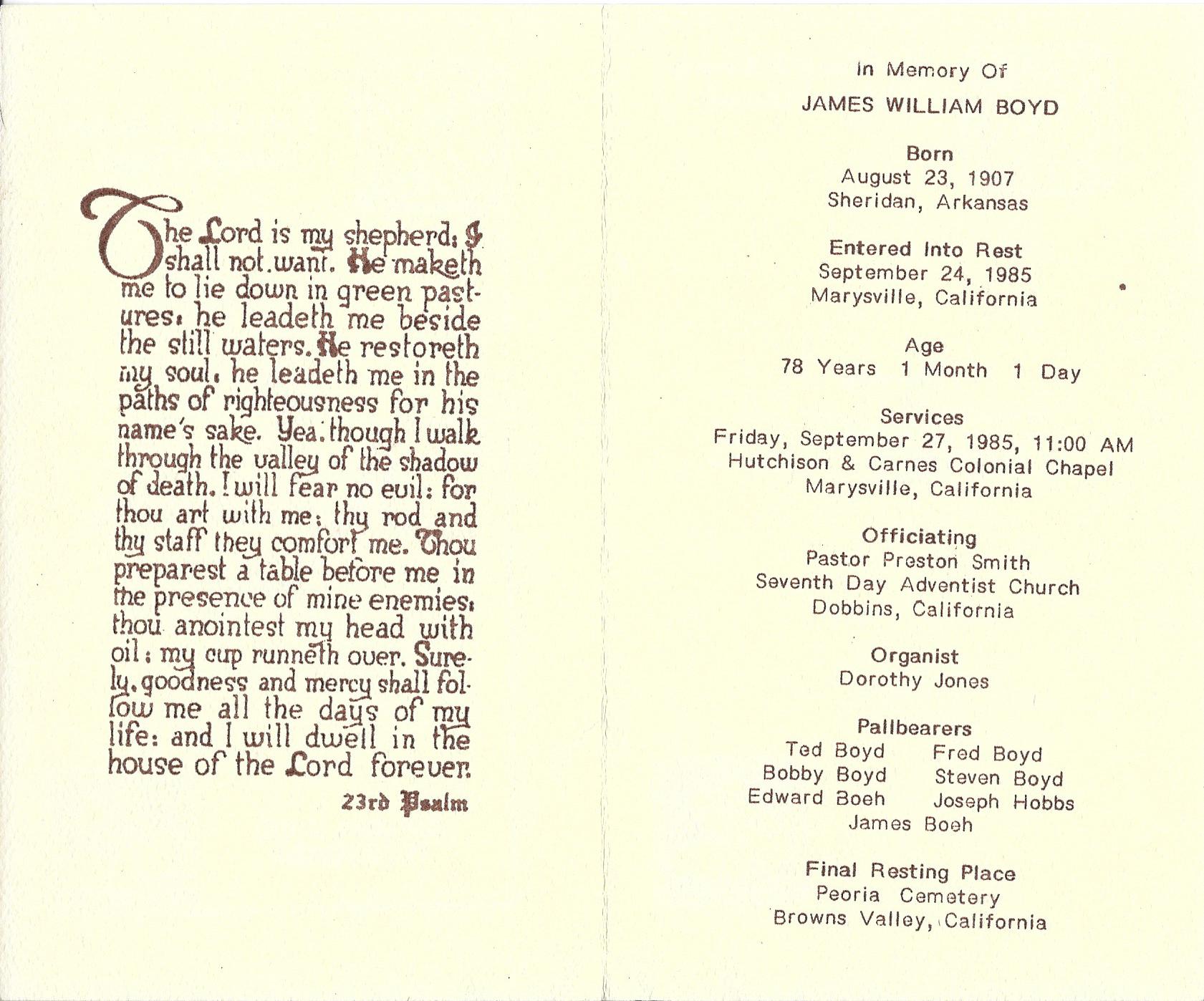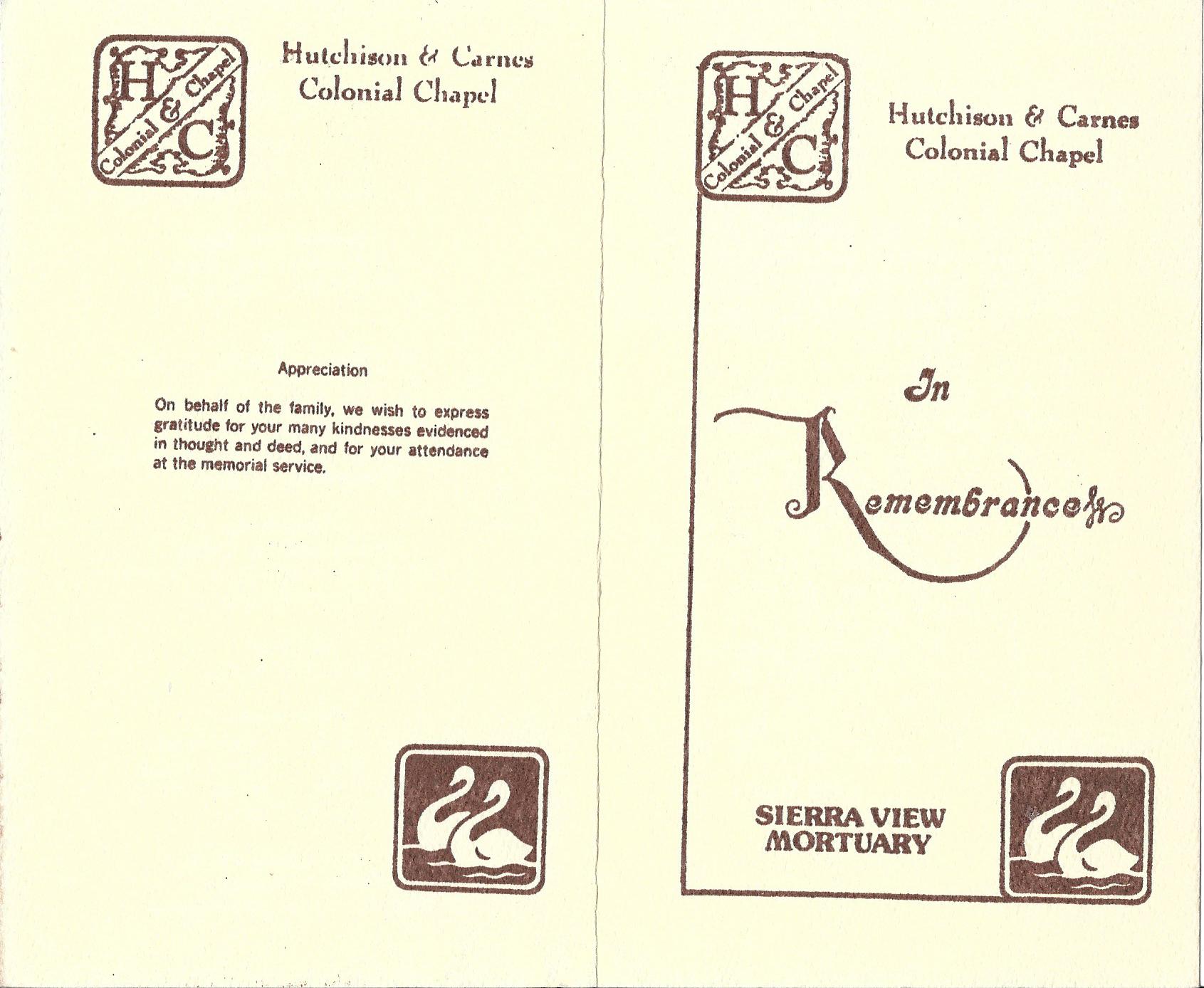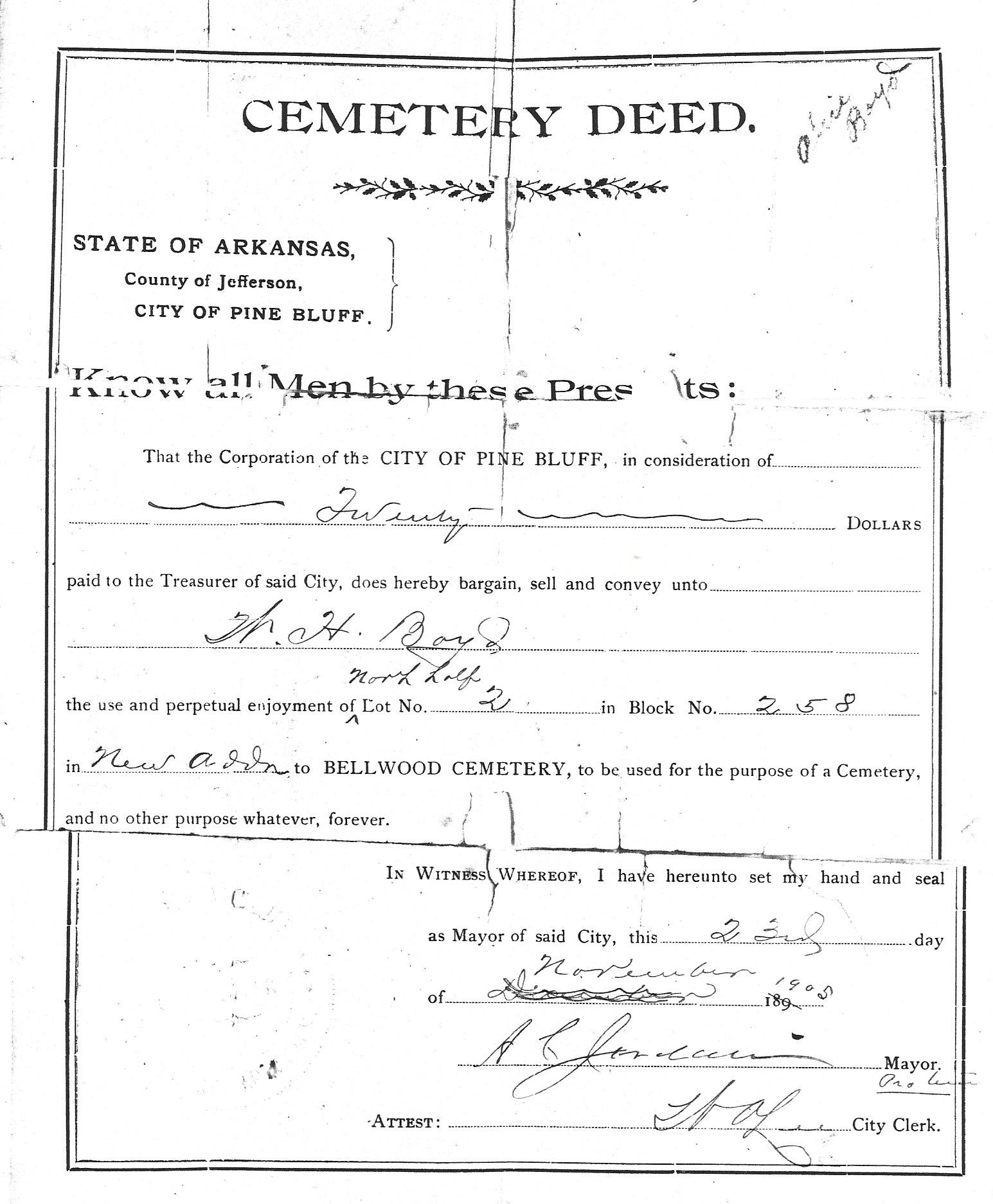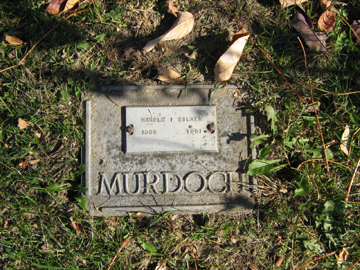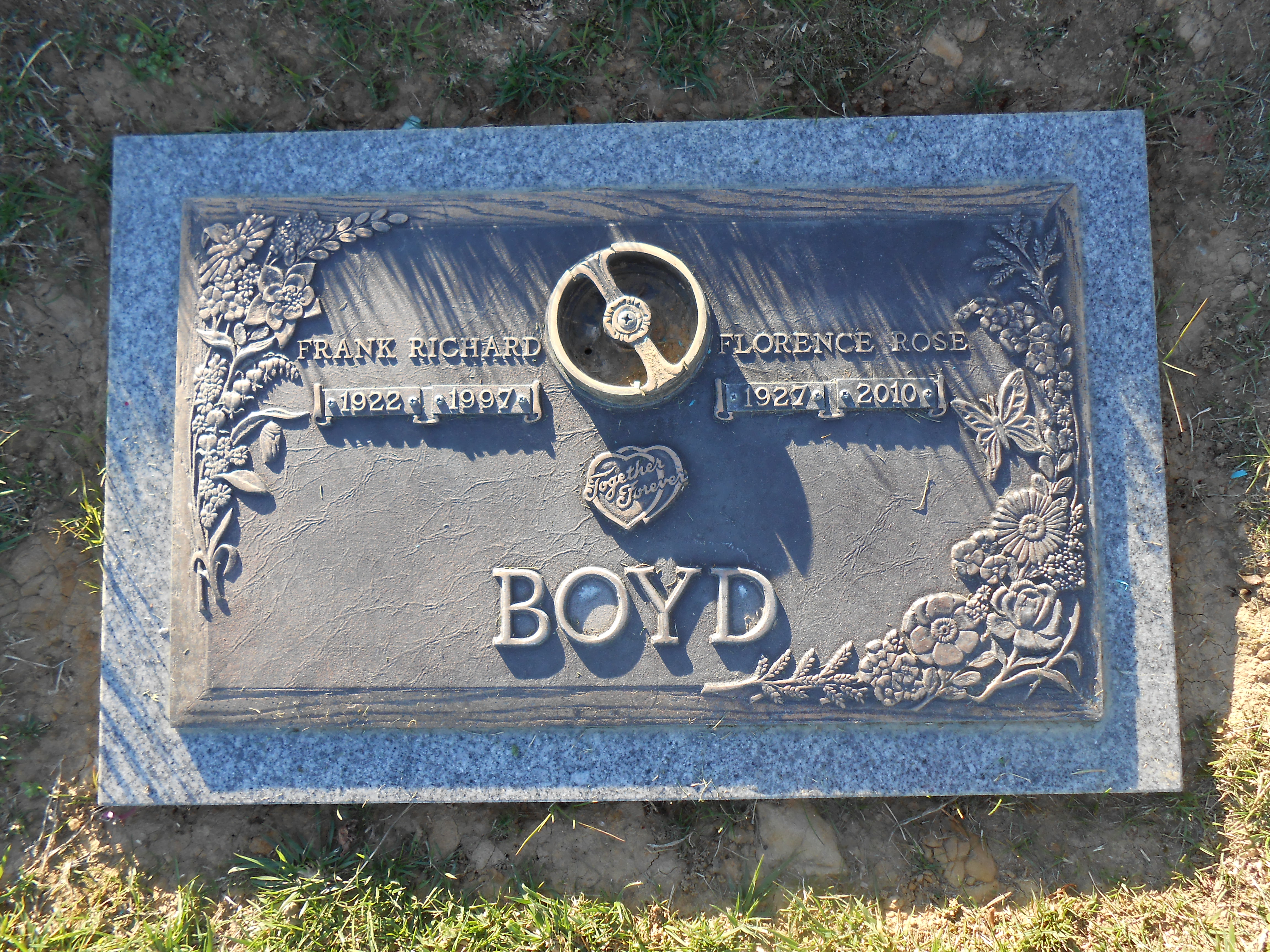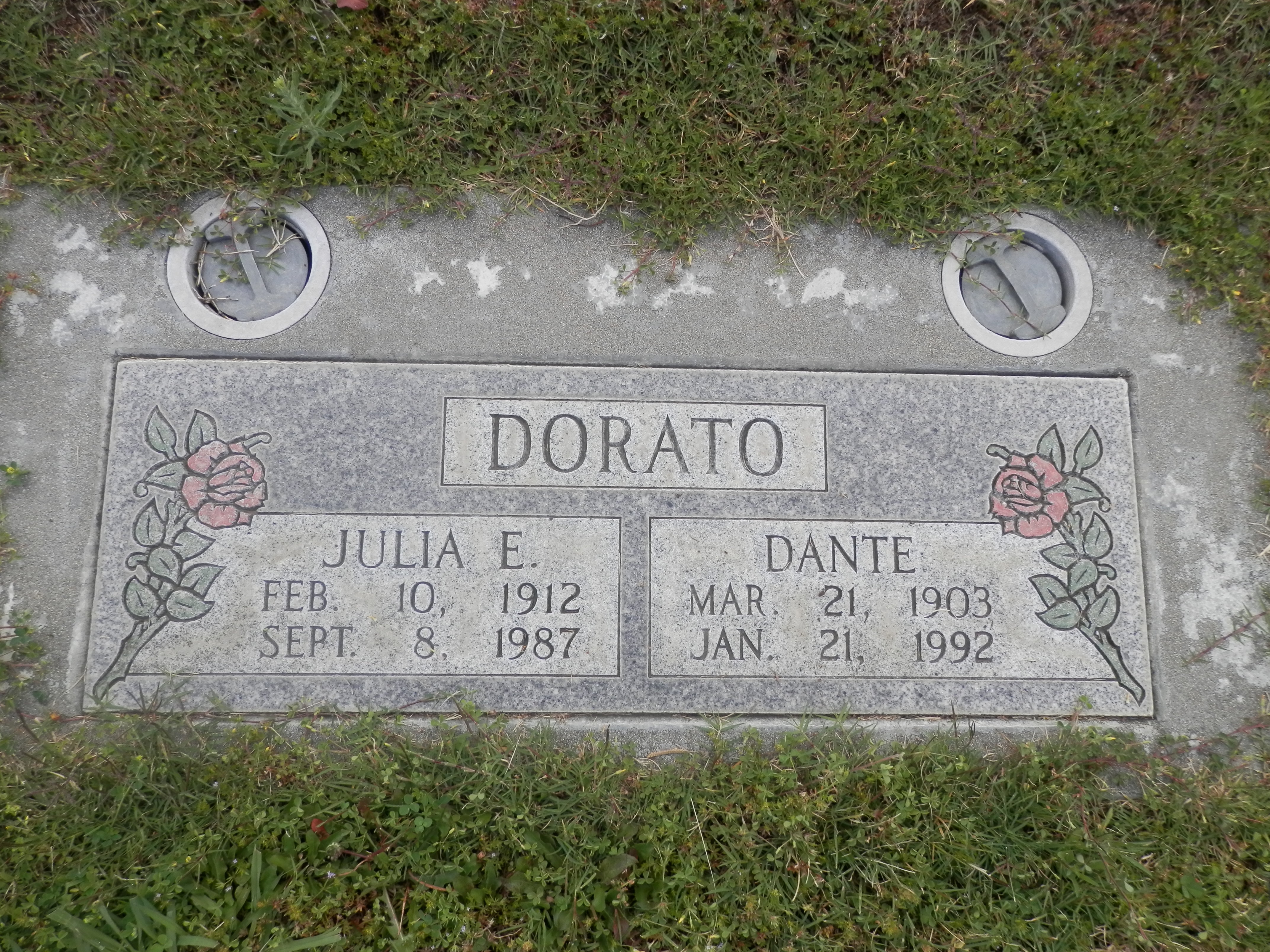Citing this biography: Boyd, Michelle, "William Henry Richardson (alias Boyd) and Bertha Amanda Brown," article, Olive and Eliza, last accessed [current date]."
William Henry Richardson was born 12 February 1864 in Campbell,
La Crosse, Wisconsin to Squire
Freeman Richardson and Caroline E. Devol. His son Frank said
that William Henry would talk about his memories of the apples that were
grown in his native state, which his family would store in the basement.
He also talked about "glass apples," which didn't make sense to Frank
(who grew up in Arizona and California). Photographs of "ghost apples" in Michigan that went viral in
early 2019 may provide a clue as to what William Henry had been
remembering. In the photos, apples that had been encased in ice turned
to mush, leaving empty "apples" made of ice.
William Henry eventually moved with his parents to the area around
Stockton, Chautauqua, New York, the hometown of his father. In
1875, the Richardsons were living in a frame house in Stockton. William
Henry’s family farmed but he and his father also worked on the railroad.
William Henry would fish for eels off of a bridge at Lake Erie, using no
hooks. He and his mother also visited Niagara Falls, where they
witnessed a world-changing new invention. According to son Frank, “Yeah,
he told me he went there to Niagara Falls and seen Edison’s, when Edison
put the light on display, the electric lights on display. Him and his
mama.”
In 1888, William Henry was arrested in Portage, Columbia, Wisconsin,
along with his cousin Herbert Richardson of La Crosse county, Wisconsin
(son of Jasper Richardson), for having counterfeit money in their
possession. On 8 August 1888, they appeared in a newspaper article as
"the two fellows recently arrested," having waived examination and being
held to trial. They were being held in jail at Portage, Columbia,
Wisconsin but were expected to be transferred to La Crosse soon. On 11
August, they were reported as being held for appearance at the September
term of the United States district court. On 7 September, it was
reported that William Henry had been taken to Madison, Dane, Wisconsin
to be arraigned, along with Herbert. Herbert was then out on bail while
William Henry had remained in jail during that time. On 19 September, he
was tried at the United States District Court, where he withdrew his
non-guilty plea and was sentenced to a fine of one dollar and up to a
year in prison in Milwaukee, Milwaukee, Wisconsin. Two months after
William Henry's sentencing, his father Squire was arrested in New York
for counterfeiting.
William Henry married first Maria Agnes Soucier 9 May 1890 in
Dunkirk, Chautauqua, New York (at the parsonage of the German Methodist
Church). She was born about 1870.
In 1893, William Henry and Maria (called Mary in newspaper articles),
his father Squire and his stepmother Kate, and his sister Julia and her
first husband Joseph Souzier were in New Mexico. They had at least one
child with them, William Henry's three-year-old nephew Maurice (it is
not known when William Henry and Mary's child was born). On 18 September
of that year, they appeared in a Santa Fe newspaper. All six adults had
been arrested and "charged with conspiracy to make and utter counterfeit
money." The trial took place at Las Cruces, Doña Ana, New Mexico. The
three men were held in jail while the women were confined in the county
courthouse. According to one reporter, the men "sent a paper to the
women and enclosed in its folds was a letter giving them explicit
instructions as to how they should testify. This letter was intercepted
by the authorities and was the chief instrument used at the trial in
bringing about the conviction of the men." William Henry, Squire, and
Joseph were found guilty and each sentenced to a year in prison. Mary,
Kate, and Julia, all called "very comely and interesting individuals" by
a reporter, were acquitted. The men were delivered to the New Mexico
Territorial Penitentiary at Santa Fe, Santa Fe, New Mexico on 25
September 1893.
On 30 March 1894, a trusty (a prison inmate who was entrusted with
specific tasks) escaped from the Santa Fe penitentiary. His identity is
not entirely clear - he was definitely either William Henry or Squire.
In early articles reporting the escape, the escapee's name was given
twice as Freeman Richardson and once as Truman Richardson. In two later
articles, he is called William Richardson. It is most likely William
Henry as the later reports call him William - perhaps the reporters were
corrected in regards to his name later on. In addition, the nature of
his work was quite physical (better suited for a younger man) and Squire
was committed to an asylum only ten years later and died a few years
after that. However, Squire was still in his early fifties, possibly
still able to perform the trusty's assigned labor despite his early
death, and his middle name was Freeman, so he cannot be ruled out
entirely. That it was either William Henry or Squire is confirmed by
details in one article about the escapee's arrest that clearly identify
him as one of the three counterfeiters from Doña Ana county arrested the
previous fall.
Regardless of his identity, several facts about the escape are known.
The superintendent had entrusted Richardson, who had been reportedly
well-behaved during the first months of his sentence, with tasks such as
taking money to town to pay prison bills and had employed him as a
teamster for the prison. On 30 March, he and another prisoner, Pablo
Vigil, had been sent to haul sand from an arroyo back to the
penitentiary. Along the way, they met with one W. B. Fisher, an
ex-convict who had been discharged just that morning. He joined them on
the wagon, then headed to town while the prisoners returned with their
load. When the pair returned to the arroyo, Fisher was there. Richardson
stated that the sand was better further on but when they got to the top
of the mesa, the wagon sped off, Vigil later claiming that he had been
held at gunpoint by Fisher. Five or six miles later, Fisher and
Richardson got off the wagon. They sent Vigil back, Fisher threatening
to kill him if he did not go slowly. When Vigil returned, he alerted
authorities, who sent officers and bloodhounds after the fugitives. The
superintendent reportedly felt that Richardson would not have left
without Fisher's persuasion.
On 10 April 1894, it was reported that Richardson had been captured and
returned from Las Cruces to the penitentiary. Fisher was also captured
and re-incarcerated.
At some point between 1893 and 1897, William Henry and Maria separated
and presumably divorced. According to grandson Frank, his first wife was
living with another man and he left her. William Henry worked on
railroads, including Baltimore and Ohio (B&O), NY Central, and
Atchison, Topeka, and Santa Fe (AT&SF). He visited Oakland,
California, where he would spend his later years. It was about this time
that he started going by the alias of William Henry Boyd.
Eventually, he arrived in Arkansas, where he met Bertha Brown at a
dance.
William Henry married second Bertha Amanda Brown 16 August 1897
in Grady, Lincoln, Arkansas. Bertha was born 13 January 1878 in
Washington, Henry, Ohio to Alva
Parks Brown and Martha Jane Ennis. Bertha moved with her
mother as a girl to Arkansas after Alva and Martha divorced.
Unfortunately, the farm that Martha had thought she had bought turned
out to be a lease and Bertha and her siblings seem to have grown up in
fairly poor circumstances. She had a third grade education (according to
Frank), wore brogans, and worked hard on the farm.
Martha approved of the match. According to Frank, “Mom told me that her
mama picked him for her. She says, My mama was sweet on him.” Bertha
used her mother’s maiden name as her last name on the marriage
certificate. William Henry was 33 and Bertha was 19.
Throughout her life, Bertha worked hard in a variety of industrious ways
to supplement her family’s income. She took in washing, had a vegetable
wagon, and kept cows, chicken, rabbits, and pigeons. One of the cows
kicked her and broke her ribs. She also planted beautiful flowers.
William Henry however would dig up the flowers so he could plant
vegetables. Both ate and loved mustard greens, as well as berries.
In the 1910 census, the family is listed living in a rented home in Pine
Bluff, Jefferson, Arkansas. William H. Boyd’s occupation is listed as a
railroad conductor. It’s interesting to note that there is some false
information on this census (and other records). Much of this is due to
William Henry wanting to keep his identity quiet. William Henry’s
parents are listed as both having been born in Wisconsin, although his
father was born in New York and his mother in Rhode Island. Also, the
census taker marked “M1” for marital status, indicating that his
marriage to Bertha was his first.
Bertha was a Seventh-day Adventist and sent her children to Adventist
schools. She never cooked on Saturday, which was the Sabbath for members
of her church. Instead, she did all her cooking for the day on Friday
nights.
Bertha became sick with tuberculosis and she was instructed to go to a
warmer climate to recover. The family left Arkansas and went to Texas,
living for a time in El Paso, where her Frank reports that they owned a
business, either a laundry or a bakeshop. They may have returned to
Arkansas for a time.
William Henry was working as a railroad brakeman when he lost all but
one finger on his right hand. Bertha heard whistles blowing and said,
“Something’s happened to Will!”
By 1920, the family had moved to Arizona. They are found on the 1920
census living at 720 3rd Street, Clarkdale, Yavapai, Arizona. "The Town
of Clarkdale is situated in the Verde Valley, located in the North
Central part of Arizona. The Town was founded in 1912 and was the first
planned community in the State of Arizona. Clarkdale was a ‘company
town’ owned by the United Verde Copper Company and provided housing and
services for its employees who worked in the nearby smelter. Mining
operations were discontinued in 1953 and Clarkdale was incorporated in
1957.” (from http://www.clarkdale.az.us/)
William Henry was not there but Bertha B. Boyd, age 40, born in Ohio,
was listed as the head of the family, living along with several of her
children, a son-in-law Frank Helm, granddaughter Marie E. Helm, and
divorced roomer James A. Ennes (probably her brother James Ennes Brown).
The Boyds at one point also lived in Prescott, Yavapai, Arizona,
according to son Frank.
By 1922, when Frank was born, they had moved to 1924 East Van Buren
Street in Phoenix, Arizona. They lived in a two-story house with a palm
tree in the front yard. William Henry was listed on Frank’s birth
certificate as a laundryman and Bertha as a housewife.
The Boyds moved from Phoenix and bought a house and dairy in Laveen,
Maricopa, Arizona. The house was brand new and had no sheetrock inside.
“…They had a bottling machine where they used to bottle all the milk and
we had a dairy truck that’d go deliver. They had a little, small,
regular dairy going. Not just a kind of little farm or anything,” Frank
remembered. It was at this home that Mary’s daughter and Bertha’s
granddaughter, Ruthie, was born.
At one point, a group of children in town caught diphtheria and Frank
was the only child to survive. His cousin Billy had died of the disease
a week before Frank caught it and his anxious mother asked the members
of her church to pray for him.
Everyone except Frank was woken up early each morning to milk the cows.
John delivered the milk for the dairy. Trouble came when John ran away
for a short time. He had not collected money from “all the good-looking
girls” who were customers of the dairy.
The Boyds had to sell the dairy after a short time and return to East
Van Buren Street in Phoenix. There, they owned a store next door to the
house where Frank had been born. It was made of old signboards and the
family lived in a house behind it. Frank remembers that they sold candy
and soda in this store, among other things. The Boyds also had 25 acres
of “oil land” in New Mexico but lost it since William Henry hadn’t paid
the property taxes on it.
William Henry had a hard time finding a job because of his old age and
his crippled hand. He worked as a watchman at an onyx mine far out of
town. He would return home every two weeks in a Model T Ford truck.
Frank remembered visiting the mines, where he was given peppermint and
he spotted a rattlesnake.
In 1928, tragedy struck. On the night of August 7, Bertha’s eldest
child, Ellen and her husband, Ike C. Thompson went to bed in their
one-story frame house in Ajo, Arizona. Shortly after one o’clock, the
house was blasted by a heavy charge of dynamite. Ike and their newborn
baby girl were killed immediately. Ellen died in the ambulance on the
way to the hospital. There were three other occupants of the house,
Ike’s mother, who escaped with minor injuries, Ike’s nephew, Houston
Johnson, who returned only minutes after the explosion, and, according
to Frank, another of Bertha’s daughters, Mary, who was spending the
night with her uncle and aunt, Homer and Julia Brown, also residents of
Ajo. It was believed that someone had pushed a half a case, or fifty
sticks, of dynamite underneath the house directly below the couple’s
bed. Bertha and one her sons left Phoenix and arrived in Ajo early in
the morning about a day later. Triple funeral services were held later
that day. Ellen was buried with her baby and next to Ike in the local
cemetery.
In 1929, just before the Depression, the Boyd family left Phoenix. The
mines had been “all mined out” and began to close down. William Henry
lost his job there and there weren’t any other jobs to be found. The
store did not produce enough income, so the family began moving to
California. Bertha drove to California with seventeen-year-old Julia and
seven-year-old Frank in a soft top 1928 Dodge touring car. It took a
week to make it to Northern California. At that point, both Katie and
Mary were living in California. They went to Marysville, California,
where Bertha worked at the Del Monte cannery in Gridley. As William
Henry was working and living in Oakland with their son John, Bertha took
Frank to Del Monte’s daycare each workday.
There were no Seventh-day Adventist churches in the area at the time,
according to Frank, but Bertha made sure Frank went to church, taking
him to Baptist and other churches. She wanted him to go to church and
become a preacher. She sent tithing to various churches, even though
they were poor. According to Frank, “She tithed herself, ten percent of
everything she got. If we didn’t have nothing, she sent ten percent of
nothing. But she always, always, if we got a dollar, ten cents of it
went to just some church. And they used to ask her, How come you do
that. And she says, Well, it’s God’s money. And they said, Well, how do
you know who to send it to. Mom says, That’s God’s money, she’s not
cheating Him out of it, if the people that she gives it to is cheating
God. She’s not doing it. That’s the way my mother always felt.”
Frank described his father as an especially good and competitive
checkers and cards player: “He played for blood! When he played
checkers, there was no nothing. He played for blood. He wanted to
beat anybody that come play with him. Yeah, I used to play chess with
him, too. And that, the reason why I played chess, because I couldn’t
beat him at checkers. And he never knew chess and he went to chess and
he learned to play chess. But him and me, it was about even-even ‘cause
I had learned it at school and different places. And I could more or
less hold myself at chess but checkers I could never win. Never and
cards neither. Cards, he could whip me all the time. He knew all kinds
of tricks. He could deal himself a blackjack anytime he wanted. I guess
he learned that while he was working on the railroad, you know.”
The Boyds lived in Oakland for a while. William Henry had a newsstand
and Frank helped to sell the newspapers. They first stayed on 80th
Street for two to three months, while they were getting established. The
couple rented a home at 1258 28th Street, Oakland at the time of the
1930 census, along with children John, Julia, Frank, and Katie and
Katie’s husband Frank Willis. Son Jim, wife Ruth, and their niece Ruthie
(Mary’s daughter) lived close by. William Henry is not listed as not
having an occupation. The family afterwards lived at 26th Street, and
finally Fifth Street.
They moved to San Francisco in about 1930 or 31, where Katie was living
at the time. It was there that William Henry made counterfeit silver
coins, according to Frank. Young Frank came home from school one day and
saw what was happening and Bertha became angry that he had had to see
that. “She says, I’m not gonna let Frank see that no more, and she says,
We have no business living there. She says, We’d rather starve,” Frank
reported. So, she took Frank and moved out. She got a job working for a
Mrs. Rothenberg, who gave them a place in which to live on Seventh
Street. Bertha took in laundry for the Rothenbergs and for others in the
neighborhood.
In February of 1933, he was caught. Daughter Mary and her first husband,
Lloyd, were arrested for burglarizing homes in Trestle Glen (a
neighborhood in Oakland). During a raid by Federal prohibition agents on
suspicion of bootlegging, police discovered over $5,000 in jewelry and
other stolen goods (one article stated that there was $10,000 worth of
jewelry, fur coats, lingerie, silks, and silverware), as well as seven
or eight counterfeit coins in a tin box concealed in the stove. Fresh
prints in cement near the burglarized home confirmed that Lloyd and Mary
were the ones that had committed the crime.
Eight counterfeit dollars were subsequently found at William Henry's
home at 1019 Seventh Street in Oakland with plaster of paris molds in a
shed behind the building. William Henry had attempted to melt down
silverware from the loot and turn it into silver dollars. When that
didn't work, he used tin and babbitt metal instead. William Henry, then
in his late sixties, was arrested without resistance and confessed in
jail to having passed counterfeit money for four months prior to his
arrest. He was indicted by a grand jury on 28 February 1933 on five
counts involving counterfeiting and was sentenced 2 March 1933 to two
years’ imprisonment for counterfeiting and received at McNeil Island
Penitentiary in the Puget Sound 5 April 1933.
Bertha and other members of the family lived on 12th Street in a flat
with John and Jim. The arguing between family members became too much
and Bertha and Frank found a place on 22nd and Filbert, near an
icehouse. Frank was given support as an orphan there, as his father was
not able to support him. Bertha was listed in the 1933 San Francisco
city directory as a widow living at 1836 Folsom.
John and Jim started working at Herrick’s Ironworks. The ironworks
rented the family a place to live in on 16th Street, across the street
from the ironworks for ten dollars a month. William Henry was
released from prison in 8 October 1934, about six months before the end
of the two-year sentence.
William Henry and Bertha both worked on Works Progress Administration
(WPA) projects during the Depression. According to son Frank, William
Henry obtained WPA work in Emeryville as a ratcatcher for the health
department, earning $55 per month. This statement is confirmed in part
by WPA records. While his specific work wasn’t mentioned, William Henry
began working for the WPA on 11 Nov 1935 on Project 0803-206-1220 (shown
as just Project 1220 in later records), where he worked as a laborer at
the city hall garage at Emeryville, Alameda, California, reporting to a
Dr. Ashley. He was paid $27.50 per pay period (adding up to $55 per
month). He was listed as living at living at 2137 Filbert St., Oakland,
Alameda, California. On 15 Jul 1936, the project closed. By that time,
he was living at 1661 17th St., Oakland.
On 17 Jul, he was transferred to a new project (1748), where he worked
as a watchman at Montgomery and Ridgeway in Oakland (Curbs and Gutters
project). However, on 23 Jul, it was reported that he was to be removed
from the project effective 30 Jul because he was listed as “Over Age
Limit.” His last WPA paycheck was issued 10 Aug 1936. The note below the
10 Aug entry read, “Bertha substituting for William.” Bertha’s earning
records likewise state “Substituting for William” but her first paycheck
entry was not until Dec of that year. According to son Frank, Bertha and
daughter Mary sewed quilts for the WPA. Records note that she was a
seamstress on a variety of projects.
On 29 Dec 1936, Bertha’s position at Project 4738, working as a
seamstress at the foot of 14th St. and West (city not listed, but likely
Oakland) was cancelled. On 30 Dec, she was transferred to Project 4573,
reporting to 900 19th Ave. on 31 Dec to work as a seamstress on a sewing
project. On 1 Mar 1937, she left that project (she was working at 2087
Franklin St. at that time) and on 5 Mar, she was transferred to Project
2080, reporting to Franklin St., Oakland on 9 Mar to work as a
seamstress on a jean production project. On 24 Mar, she transferred from
Project 2050 TR. to Project 7739-6700, reporting 26 Mar to 2087 Franklin
St. as a seamstress on a sewing project. She continued working on that
project until October. On 22 Oct, she transferred from Project 6700 to
Project 7788 Unit 2, reporting 26 Oct to 2087 Franklin St. as a
seamstress. She worked as a seamstress on Project 7768 from Nov 1937 to
May 1938, Project 8757 from May to Aug 1938, and Project 10028 from Aug
to Jun 1939. In 11 Aug 1939, it was recorded that she was to be
terminated from Project 10028 at 900 19th Ave. as a seamstress on 15 Aug
with the note, “Dismissal effected in accordance with statutory
requirements prohibiting continuous employment for more than 18 months.”
However, on 15 Sep 1939, she was recorded as starting work on Project
10028 once more, reporting 19 Sep to 900 19th Ave. as a seamstress on a
sewing project. She worked on that project until Oct 1940. She then
worked on Project 50-11978 in Oct. On 1 Nov 1940, it was recorded that
she had been terminated from a project [project number illegible] as a
seamstress on Oct [30?] for being “Five days absent.” On 17 Jun 1940,
she had a “Chg. in assign. status” and was to report 19 Jun to 900 19th
Ave. as a seamstress (domestic electric).
William Henry and Bertha were renting at 1660 17th St., Oakland in 1940.
Daniel Dorato was listed as a roomer (possibly a duplicate entry for
Danny Dorato, Julia’s husband). William Henry was listed as having no
occupation. Bertha was listed as working as a seamstress on a sewing
project. Her worker class is GW (government work), indicating that she
was probably working on a WPA project.
Bertha Amanda Brown Boyd died of cervical cancer 6 June 1954 in Oakland,
Alameda, California and was buried 9 June in Oakland. William Henry Boyd
died of cardiac failure due to senility 6 May 1955 at the home of his
son, Frank, at 477 Tudor Drive, San Leandro, Alameda, California. He was
buried May 9 at Evergreen Cemetery, Oakland, Alameda, California.
William Henry and Mary’s child is:
| 1 | Charlie
Richardson, said to have been a taxi driver in Los Angeles,
California. Frank Boyd did not know that Charlie was his
half-brother until much later in life but did remember him. A
Charlie Richardson would come to visit on a few occasions and
Frank would find coins for him taped above the head of his bed on
the mornings Charlie left. Nothing else is known about Charlie at
this time. Note: Some online trees and user-submitted information on Findagrave.com have connected him to a Charley Dale Richardson, born in Arkansas and living in California, whose mother's maiden name was Brown. However, the known facts about Charley Dale Richardson do not match with what little is known about Charlie. Charley Dale was born in Arkansas but Charlie probably wasn't (he was more likely born in New York or New Mexico - William Henry had probably separated from Charlie's mother before he arrived in Arkansas, where he was working on the railroad). Charley Dale's mother's maiden name was Brown but Charlie's mother was Maria Agnes Soucier and Charlie was not raised by his father after his parents separated and his father married Bertha Brown). |
William Henry and Bertha's children are:
Note: The children listed below never went by the last name of Richardson. Of William Henry's children, only Charlie above went by the surname Richardson (to my knowledge, Charlie did not go by the name Boyd but I know so little about him, so I cannot guarantee that he never went by Boyd or another alias). While William Henry's Boyd surname may have been an illegal alias, his children by Bertha were legally known in records and were known in life by the surname Boyd. In the case of my Grandpa and the youngest child of the family, Frank, that the knowledge that his father was born a Richardson was not even known to him until the early 1980s.
| 2 | Ellen Margaret Boyd,
born 20 Oct 1899 in Pine Bluff, Jefferson, Arkansas, married 1) Frank
B. Helm Jr. 26 Dec 1916 in Grant county, Arkansas but they
divorced by May 1925. Ellen was living in Bridal Veil, Multnomah,
Oregon, when she married 2) Isaac Clark Thompson 11 May
1925 in Vancouver, Clark, Washington. Ellen died in an explosion 7
Aug 1928 in Ajo, Pima, Arizona, along with Ike and their newborn
daughter after dynamite was placed under the family’s home. Ellen
and the baby, according to newspaper articles, had just come home
from the hospital that day. Ike and the baby died at the site and
Ellen on the way to the hospital, only Ike's mother escaping
alive. All three were buried in a single grave with the baby in
Ellen's arms on the evening of 9 Aug 1928. Bertha and one of
Ellen's brothers were in attendance. Several suspects were
arrested but released due to insufficient evidence. It was noted
that Ellen's husband Ike had no known enemies and had no
"financial worries." A newspaper article reported on 9 Aug 1928,
"The theory of suicide, tentatively advanced after the blast, is
discounted by the officers. Sheriff McDonald stated yesterday that
in the suicide theory, 'while always possible, is not plausible in
this case.'" However, on 18 Aug, another article stated, "An
investigation ordered by the state into the death of I. C.
Thompson, his wife and their week-old baby...has led officers to
believe that Thompson may have set off the blast himself."
Investigators were unable to determine a motive. Husband 1: Frank B. Helm Jr., b. 7 Aug 1896 in Argenta, Pulaski, Arkansas, son of Frank B. and Fannie L. (Belcher) Helm; lived in Dekalb, Grant, Arkansas in 1910 with parents Frank B and Fannie L Helm, a baker at Federal Baker, died 6 Oct 1925 at the general hospital in Big Rock, Pulaski, Arkansas of a staph infection of the face originating from the end of his nose from an abrasion (the infection apparently started six days before his death), buried 7 Oct 1925 at Oakland Cemetery, Little Rock, Pulaski, Arkansas. His and Ellen's son Arthur appears in the household of his great-grandfather Robert Belcher in 1930 Precinct 1, Smith, Texas, along with grandparents Frank and Fannie Helm. Husband 2: Isaac Clark Thompson, called Ike, b. Dec 1883 in Missouri to Joseph C. and Mary Cassie (Lawyer) Thompson, occupation: rancher at the time of his marriage, had a laundry business in Ajo, Arizona; see 1900 Federal Census (household of Mary C. Thompson, Bayou, Ozark, Missouri), 1910 Federal Census (household of Cassie Thompson, Bayou, Ozark, Missouri) and 1920 Federal Census (household of Isaac C. Thompson, Palo Verde, Maricopa, Arizona, d. in an explosion 7 Aug 1928 in Ajo, Pima, Arizona. A state-ordered investigation concluded that Ike may have set off the blast himself. Children: (by Frank Helm) 1) Arthur Homer Helm (m. Vaciel Irmadean Dalrymple-"HELM, Vaciel Irmadean (DALRYMPLE); 75; Mabelvale AR; Benton C; 2000-2-1; absy" Source: Ancestry.com. Web: Obituary Daily Times Index, 1995-Current [database on-line]. Provo, UT, USA: Ancestry.com Operations, Inc., 2012.), 2) Marie Ellen Helm (m. -- Cate); (by Ike Thompson) 3) stillborn son, and 4) Mary Katherine Thompson (b. 31 Jul 1928 in Ajo, Pima, Arizona, d. 7 Aug 1928 in Ajo, Pima, Arizona, the baby killed in the explosion). |
| 3 | Kathleen
Edith Boyd, (Katie), born 19 Oct 1901 in Pine Bluff,
Jefferson, Arkansas, married 1) Frank S. Willis, 2) John
Richard, and 3) Harold Isaac Silker in Reno, Washoe,
Nevada, died 12 Sep 1976 in Yuba City, Sutter, California (lung
cancer), buried 15 Sep at Evergreen Cemetery, Oakland, Alameda,
California. Occupation: brusher at an enamel factory (1930),
foreman at porcelain enamel shop (death certificate). Husband 1: Frank S. Willis, b. 21 Mar 1895 in Southport, Lancashire, England, immigrated to the US in 1913, served in World War I, d. 15 May 1961, occupation: pressman at job printing (1930), printer (1939 Oakland city directory), worked at printer shop (1940), worked for Pacific Tea Packing in San Francisco and lived in Richmond, Contra Costa, California in 1940. Husband 2: John Richard, no records have been located for him; identified as one of Katie’s husbands by Frank Boyd. Husband 3: Harold Isaac Silker, b. 10 Jan 1909 in Waterloo, Blackhawk, Iowa, son of Harley Clemens and Viola Jane (Stevens) Silker, d. 21 Mar 1991 in Yuba county, California, occupation: track extra-gang laborer on the railroad (1941), m. 1) Rosella C. Michel 31 Jul 1937 in Cedar Rapids, Linn, Iowa. Adopted child: (adopted with Frank Willis): 1) Wally W. Willis, (born Gino L'Eban, son of Luigino de Mania L'Eban and his then wife, Lou Ellen (Lofthus?). |
| 4 | Alice Mabel Boyd, born
30 Jun 1903 in Pine Bluff, Jefferson, Arkansas, died 23 November
1905, buried in Bellwood Cemetery, Pine Bluff, Jefferson,
Arkansas. |
| 5 | John Henry Boyd, born
16 Oct 1905 in Pine Bluff, Jefferson, Arkansas, married 1) Antonette
Garcia in 1930 in Oakland, Alameda, California and 2) Dolores
M. Frates 8 Aug 1952 in Alameda county, California, died 26
Oct 1963 at the Port of Oakland in Oakland, Alameda, California
(suicide by carbon monoxide poisoning from a car exhaust), buried
29 Oct at Evergreen Cemetery, Oakland, Alameda, California.
Occupation: enameler (1939 Richmond city directory), burner at an
enamel/porcelain factory (1930, 1940 census--listed as employed by
Payne and Mahoney in 1940 on WWII draft card), trucker (1956 San
Leandro city directory, death certificate). Wife 1: Antonette Garcia (family information provided by Frank Boyd gives her maiden name as Castelle; however, records show Garcia), b. abt. 1914 in Hawaii, dau. of — Garcia and — Guerrero, d. 23 Aug 1944 in Contra Costa county, California) in 1930 in Oakland, Alameda, California. Wife 2: Dolores M. Frates, may be living. Children: (by Antonette) 1) Ted Henry Boyd, other children now living. |
| 6 | James William Boyd,
(Jim), 23 Aug 1907 in Sheridan, Grant, Arkansas (although WWII
draft card says Pine Bluff, Jefferson, Arkansas), married 1) Ruth
Frances Meyers 10 Aug 1929 in Phoenix, Maricopa, Arizona
(later divorced) and 2) Virginia Deloris Cabral (according
to family information, the marriage took place 9 May 1938 in Reno,
Washoe, Nevada but the Oakland Tribune lists Jim and
Virginia as being granted a marriage license 11 May 1940 in Reno),
died 24 Sep 1985 in Marysville, Yuba, California and was buried 27
Sep in Peoria Cemetery, Browns Valley, Yuba, California.
Occupation: worked in the structural steel industry (1930), truck
driver for Herrick Iron Works (1940 census, WWII draft card), iron
worker at Herricks Iron Works (1956). Wife 1: Ruth Frances Meyers, b. 21 Jul 1913 in Phoenix, Maricopa, Arizona, dau. of Melvin R. and Nellie M. (Strouse) Meyers, m. 2) – Schader, d. 24 Jan 1993 in Orange county, California) 10 Aug 1929 in Phoenix, Maricopa, Arizona (later divorced). Wife 2: Virginia Deloris Cabral, b. 10 Sep 1913 in Wainaku, Hawaii, Hawaii to Joao (John) Cabral Raposo and his wife, Francisca (Francis) Pacheco Muerirra (See Declaration of Intention and Petition for Naturalization for Francisca Pacheco Cabral (No. 67992), National Archives at San Francisco; San Bruno, California; NAI Number: 605504; Record Group Title: RG 21; Record Group Number: Records of District Courts of the United States, 1685-2009. Ancestry.com. California, Federal Naturalization Records, 1843-1999 [database on-line]. Provo, UT, USA: Ancestry.com Operations, Inc., 2014.), left from Hilo, Hawaii 13 Jun 1913 and arrived in San Francisco, California 23 Jun aboard the S.S. Baroke, d. 12 Mar 1998. Children living. |
| 7 | Mary Edna Boyd,
born 14 Oct 1909 in Pine Bluff, Jefferson, Arkansas, married 1) --
--? (listed in marriage record to Lloyd King as
divorced but it is likely she said this because she already had a
child). Her first confirmed marriage was to Lloyd Aloysius
King 6 Nov 1931 in Oakland, Alameda, California)
marriage intention listed in the Oakland Tribune 3 Nov 1931. She
was arrested with Lloyd in Nov 1931 during their honeymoon to San
Jose while driving a car they claimed they had borrowed (Mary was
sentenced to 40 days in jail and Lloyd to 100 days in jail),
arrested with Lloyd in February 1933 for burglarizing homes in the
East Bay (San Francisco Bay Area), married 2) Joseph
Phillip Fettig (marriage license granted 11 May 1940
in Reno, Washoe, Nevada, d. 3 Sep 1983 in Yuba county, California)
9 May 1938 in Reno, Washoe, Nevada, died 23 May 1994 at Desert
Hospital in Palm Springs, Riverside, California (from injuries
sustained in a hit-and-run car accident caused by a drunk driver).
Michelle's memories: Great-aunt Mary was the only member of the
family on this page (except for Frank and Florence, my
grandparents) that I clearly remember meeting. I remember her as a
kind, older lady who gave me candy when I came to visit with my
parents and later that my grandfather was shaken by her death. My
parents also remembered her as a very sweet person. Husband 1: Lloyd Aloysius King, b. 25 Mar 1910 in Alameda county, California, son of Harry J. and Josephine E. (Silveira) King, listed as Aloysius King in 1910 census (age 1 month, living with parents Harry and Josephine King, grandparents John J. and Mary Silvera, and uncle Augustine Silvera in Oakland Ward 2) and listed as Lloyd King or Lloyd A. King in the 1920 and 1930 censuses in Oakland (see 1910, 1920, and 1930 Oakland, Alameda, California), arrested for car theft in 1931 with Mary and served 100 days in prison, served three months for burglary in 1932, arrested for burglary in 1933 with Mary (sentenced to 5 years to life, imprisoned 30 Mar 1933 in San Quentin Prison in Marin county, California, paroled 17 May 1937), a baker, two of his fingers had been partially amputated prior to his 1933 arrest, found in 1940 living alone at 36th Avenue in Oakland and working as a WPA laborer with a marital status of M1 (married once) (see 1940 Oakland, Alameda, California census), working for Moore Shipyard and living in Oakland 16 Oct 1940 (WWII draft card), arrested 1 Aug 1941 and sentenced 2 Aug 1941 to 60 days in jail on charges related to drunk driving, speeding, and evading the police, m. 2) Mae Virginia Rose 13 Feb 1942 in Los Angeles, Los Angeles, California, living in Oakland and working as a shipyard rigger at the time of his second marriage, held for questioning in Mar 1947 for drunk driving, a bartender at the Fairmont (hotel in San Francisco) for 25 years, d. 9 Mar 1992 in San Leandro, Alameda, California of cardiac insufficiency due to congestive heart failure, bur. 13 Mar 1992 at St. Mary's Cemetery, Oakland, Alameda, California. Husband 2: Joseph Phillip Fettig, b. 16 Sep 1912 in Orrin, Pierce, North Dakota, son of Anton Phillip and Dorothea (--) Fettig (see 1915 North Dakota state census for Township 154, McHenry, North Dakota and 1920 Federal census for Smoky Lake, McHenry, North Dakota) marriage license granted 11 May 1940 in Reno, Washoe, Nevada, worked at Herrick Iron Works in 1940, d. 3 Sep 1983 in Yuba county, California. Living child by R. W. Holt (Mary was not married to him). |
| 8 | Julia Ernestine Boyd,
born 10 Feb 1912 in Pine Bluff, Jefferson, Arkansas, married Dante
Dorato 11 Aug 1931 in Oakland, Alameda, California, died 8
Sep 1987 in Redding, Shasta, California. Occupation: worked at a
cannery (1930), machine operator (1937 Oakland city directory). Husband: Dante Dorato, also known as Danny Harris Dorato, b. 21 Mar 1903 in Italy (a resident of Alfiano Natta, Alessandria, Piemonte, Italy), son of Louis and Luigia (Cerelli) Dorato, d. 21 Jan 1992 in Stanislaus county, California, occupation: car man for Southern Pacific (1928 CA voter registration), carmen’s helper on the railroad (at time of marriage), trainman (1936 CA voter registration), bricklayer on the railroad (1940 census), employed by Southern Pacific railroad in 1943 (WWII draft card). Children: 1) Ronald Lewis Dorato, other children now living. |
| 9 |
Frank
Richard Boyd, born 5 May 1922 in Phoenix, Maricopa, Arizona,
married Florence Rose Mahler 4 Jul 1945 in Marion, Marion,
South Carolina, served in World War II (Army), baptized a member
of the Church of Jesus Christ of Latter-day Saints in 1965, died 8
June 1997 at home in Martinez, Contra Costa, California (cancer
(mycosis fungoides)) and was buried 11 Jun in Oakmont Cemetery,
Lafayette, Contra Costa, California. Occupation: structural steel
worker, retired in 1988 from Romak Iron Works in Oakland. Wife: Florence Rose Mahler, b. 14 May 1927 in Ovid, Sedgwick, Colorado, dau. of Jacob John and Rose Catherine (Knoll) Mahler, chr. 29 May 1927 in Julesburg, Sedgwick, Colorado, bapt. in LDS Church in 1965, d. 17 Mar 2010 in Pleasant Hill, Contra Costa, California, bur. 20 Mar in Oakmont Cemetery, Lafayette, Contra Costa, California. Children living. |
Summary of Sources
- Interview of Frank Richard Boyd by Darryl and Alice Boyd, November 1988, Martinez, CA, transcribed by Michelle A. Boyd, August 2000.
- Handwritten notes by Alice Boyd of Frank Boyd’s memories, probably written about 1988.
- Personal knowledge of Frank Boyd, passed down to and recorded by Darryl Boyd.
- Family register page from W.H. Boyd Bible, photocopy in possession of Darryl Boyd.
- Certification of Birth, Bertha A. Brown, Washington, Henry, Ohio, Date of record: 13 Jan 1878.
- Birth certificate of Ruth Edna Boyd, Arizona, state file number 353, registered number 839.
- Ancestry.com. Arizona, Birth Records, 1835-1915 [database on-line]. Provo, UT, USA: Ancestry.com Operations, Inc., 2015. Original data: Arizona Department of Health Services. Arizona Birth Records, 1855-1960 (records for Ruth Frances Meyers and Mary Katherine Thompson).
- Original Certificate of Birth, Frank R. Boyd, Arizona, State Index No. 196, Co. Registration No. 954, Local Registrar’s No. 9513.
- Ancestry.com. Ohio, Births and Christenings Index, 1774-1973
[database on-line]. Provo, UT, USA: Ancestry.com Operations, Inc.,
2011.
Original data: "Ohio Births and Christenings, 1821-1962." Index. FamilySearch, Salt Lake City, Utah, 2009, 2011. Index entries derived from digital copies of original and compiled records. - Ancestry.com. Iowa, Births and Christenings Index, 1800-1999 [database on-line]. Provo, UT, USA: Ancestry.com Operations, Inc., 2011. Original data: "Iowa Births and Christenings, 1830–1950." Index. FamilySearch, Salt Lake City, Utah, 2009, 2010. Index entries derived from digital copies of original and compiled records.
- Ancestry.com. Arizona, Select Births and Christenings, 1909-1917 [database on-line]. Provo, UT, USA: Ancestry.com Operations, Inc, 2014. Original data: Arizona, Births and Christenings, 1909-1917. Salt Lake City, Utah: FamilySearch, 2013.
- Ancestry.com. California Birth Index, 1905-1995 [database on-line]. Provo, UT, USA: Ancestry.com Operations Inc, 2005. Original data: State of California. California Birth Index, 1905-1995. Sacramento, CA, USA: State of California Department of Health Services, Center for Health Statistics.
- Office of Hawaiian Affairs; Honolulu, HI, USA; Birth, Marriage, and Death Records. Ancestry.com. Hawaii, Birth Certificates and Indexes, 1841-1944 [database on-line]. Lehi, UT, USA: Ancestry.com Operations, Inc., 2018.
- "Marriages recorded at German Methodist Church in Dunkirk, NY," Chautauqua Genealogist, Vol. 15, No. 2, May 1992.
- Ancestry.com. Arkansas, County Marriages Index, 1837-1957 [database on-line]. Provo, UT, USA: Ancestry.com Operations, Inc., 2011. Original data: "Arkansas County Marriages, 1838–1957." Index. FamilySearch, Salt Lake City, Utah, 2009, 2011. "Arkansas County Marriages, 1838–1957," database, FamilySearch; from Arkansas Courts of Common Pleas and County Clerks. Digital images of originals housed at various county courthouses in the State of Arkansas. Marriage records.
- Ancestry.com. California, Marriage Index, 1949-1959 [database on-line]. Provo, UT, USA: Ancestry.com Operations, Inc., 2013. Original data: California Department of Health and Welfare. California Vital Records—Vitalsearch (www.vitalsearch-worldwide.com). The Vitalsearch Company Worldwide, Inc., Pleasanton, California.
- Marriage License and Certificate, William H Boyd and Bertha Ennis, Grady, Lincoln, Arkansas, Date of record: 16 Aug 1897.
- Ancestry.com. California, Marriage Records from Select Counties, 1850-1941 [database on-line]. Provo, UT, USA: Ancestry.com Operations, Inc., 2014. Original data: Marriage records, select counties and years. California State Archives, Sacramento, California.
- Marriage License for Frank Richard Boyd and Florence Rosie Mahler, Marriage Register, Dec 1944-Mar 1946, page 280 (image 858), found in South Carolina Probate Court (Marion County), Marion County, South Carolina marriage registers continued by bound marriage licenses, 1911-1952, Salt Lake City, Utah : Filmed by the Genealogical Society of Utah, 2001, FHL Microfilm 2229373, https://www.familysearch.org/search/catalog/1005736?availability=Family%20History%20Library
- Tenth Census of the United States, 1880. (NARA microfilm publication T9, 1,454 rolls). Records of the Bureau of the Census, Record Group 29. National Archives, Washington, D.C.
- United States of America, Bureau of the Census. Twelfth Census of the United States, 1900. Washington, D.C.: National Archives and Records Administration, 1900. T623, 1854 rolls.
- Thirteenth Census of the United States, 1910 (NARA microfilm publication T624, 1,178 rolls). Records of the Bureau of the Census, Record Group 29. National Archives, Washington, D.C.
- Fourteenth Census of the United States, 1920. (NARA microfilm publication T625, 2076 rolls). Records of the Bureau of the Census, Record Group 29. National Archives, Washington, D.C.
- United States of America, Bureau of the Census. Fifteenth Census of the United States, 1930. Washington, D.C.: National Archives and Records Administration, 1930. T626, 2,667 rolls.
- United States of America, Bureau of the Census. Sixteenth Census of the United States, 1940. Washington, D.C.: National Archives and Records Administration, 1940. T627, 4,643 rolls.
- Ancestry.com. New York, State Census, 1875 [database on-line]. Provo, UT, USA: Ancestry.com Operations, Inc., 2013.
- Ancestry.com. North Dakota, Territorial and State Censuses, 1885, 1915, 1925 [database on-line]. Provo, UT, USA: Ancestry.com Operations Inc, 2008. Original data: North Dakota. 1915 North Dakota State Census and 1925 North Dakota State Census. State Archives and Historical Research Library, State Historical Society of North Dakota, Bismarck, North Dakota.
- Ancestry.com. U.S. City Directories, 1822-1995 [database on-line].
Provo, UT, USA: Ancestry.com Operations, Inc., 2011.
1923 Phoenix, Arizona city directory. - NARA; Washington, DC; McNeil Island Penitentiary Records of Prisoners Received, 1887-1951; Microfilm Series: M1619; Microfilm Roll: 3, Source Information. Ancestry.com. McNeil Island, Washington, U.S. Penitentiary, Photos and Records of Prisoners Received, 1887-1939 [database on-line]. Provo, UT, USA: Ancestry.com Operations Inc, 2008.
- Lowell Junior High School promotion certificate of Frank Boyd, Oakland, CA, June 1937.
- McClymonds High School diploma of Frank Richard Boyd, Oakland, CA, June 1940.
- National Archives and Records Administration. U.S. World War II Army Enlistment Records, 1938-1946 [database on-line]. Provo, UT, USA: Ancestry.com Operations Inc, 2005. Original data: Electronic Army Serial Number Merged File, 1938-1946 [Archival Database]; ARC: 1263923. World War II Army Enlistment Records; Records of the National Archives and Records Administration, Record Group 64; National Archives at College Park. College Park, Maryland, U.S.A.
- Honorable Discharge, United States Army, Frank R Boyd (Army Serial No. 39 034 210), 8 Feb 1946.
- Ancestry.com. U.S., World War I Draft Registration Cards, 1917-1918 [database on-line]. Provo, UT, USA: Ancestry.com Operations Inc, 2005. Original data: United States, Selective Service System. World War I Selective Service System Draft Registration Cards, 1917-1918. Washington, D.C.: National Archives and Records Administration. M1509, 4,582 rolls. Imaged from Family History Library microfilm.
- Ancestry.com. U.S. WWII Draft Cards Young Men, 1940-1947 [database on-line]. Lehi, UT, USA: Ancestry.com Operations, Inc., 2011. Original data: The National Archives in St. Louis, Missouri; St. Louis, Missouri; Record Group: Records of the Selective Service System.
- Ancestry.com. California, Passenger and Crew Lists, 1882-1959 [database on-line]. Provo, UT, USA: Ancestry.com Operations Inc, 2008. Original data: Selected Passenger and Crew Lists and Manifests. National Archives, Washington, D.C.
- Ancestry.com. U.S., Chicago and North Western Railroad Employment Records, 1935-1970 [database on-line]. Provo, UT, USA: Ancestry.com Operations, Inc., 2015.
- Ancestry.com. U.S., Social Security Applications and Claims Index, 1936-2007 [database on-line]. Provo, UT, USA: Ancestry.com Operations, Inc., 2015.
- Ancestry.com. U.S., Social Security Death Index, 1935-2014 [database on-line]. Provo, UT, USA: Ancestry.com Operations Inc, 2011.
- Obituary of Frank Richard Boyd, Contra Costa Times, 10 June 1997.
- Obituary Daily Times Index, 1995-Current [database on-line]. Provo, UT, USA: Ancestry.com Operations, Inc., 2012.
- Ancestry.com. California, Death Index, 1940-1997 [database
on-line]. Provo, UT, USA: Ancestry.com Operations Inc, 2000.
Original data: State of California. California Death Index, 1940-1997. Sacramento, CA, USA: State of California Department of Health Services, Center for Health Statistics. - Ancestry.com. Florida Death Index, 1877-1998 [database on-line]. Provo, UT, USA: Ancestry.com Operations Inc, 2004. Original data: State of Florida. Florida Death Index, 1877-1998. Florida: Florida Department of Health, Office of Vital Records, 1998.
- Ancestry.com and Ohio Department of Health. Ohio, Deaths,
1908-1932, 1938-2007 [database on-line]. Provo, UT, USA:
Ancestry.com Operations Inc, 2010.
Arkansas Department of Vital Records; Little Rock, Arkansas; Death Certificates; Year: 1925; Roll: 5. Ancestry.com. Arkansas, Death Certificates, 1914-1969 [database on-line]. Lehi, UT, USA: Ancestry.com Operations, Inc., 2019. - Gravestone of Bertha A. and William H. Boyd and Kathleen E. and Frank S. Willis, Evergreen Cemetery, Oakland, Alameda, California.
- Gravestone of Harold I. Silker, Oak Shade Cemetery, Marion, Linn, Iowa.
- Gravestones of James W. Boyd and Virginia Deloris Boyd, Peoria Memorial Park, Browns Valley, Yuba, California.
- Gravestone of Frank Richard and Florence Rose Boyd, Oakmont Cemetery, Lafayette, Contra Costa, California.
- Gravestone of Dante and Julia Dorato, Oak Hill Cemetery, Red Bluff, Tehama, California.
- Gravestone of Lloyd A. King and second wife, Mae R., St. Mary's Cemetery, Oakland, Alameda, California.
- Larne, Phoebe, Oak Hill Cemetery, Red Bluff, Tehama County, California, D-E burials, http://tcghsoc.org/Tehama_Co/Cemeteries/Oak_Hill_Cemetery/oakhill-d-e.pdf, updated Sep 2015, from the Tehama County Genealogical and Historical Society Cemeteries and Graves page, accessed 18 Apr 2016.
- National Cemetery Administration. U.S. Veterans Gravesites, ca.1775-2006 [database on-line]. Provo, UT, USA: Ancestry.com Operations Inc, 2006.
- Cemetery deed to W.H. Boyd, 23 November 1905, Bellwood Cemetery, Pine Bluff, Arkansas (North Half, Lot No. 2, Block No. 258 in New Addn.)
- Letter to Florence (Mahler) Boyd from J.T. McCarthy (Mc Carthy Funeral Home, Ajo, AZ) about the location of Ike Thompson, Ellen (Boyd) Thompson, and (baby girl) Thompson's burial location, 8 Jul 1968.
- Certificate of Death, William Henry Boyd, California, State File No. 55-035986.
- Affidavit to Amend and Record for Certificate of Death, William Henry Boyd, California, State File No. 55-035986, filed 4 Apr 1983.
- Certificate of Death, Bertha Boyd, California, State File No. 54-039040.
- Certificate of Death, John Henry Boyd, California, State File No. 63-130669.
- Certificate of Death, Kathleen Edith Silker, California, State File No. 76-111469.
- Certificate of Death, stillborn son of Isaac and Ellen Thompson, California, State Index 384a, Local Registrar’s No. 34.
- Certificate of Death, Lloyd A. King, 3-92-01 001734, obtained from the Office of Clerk-Recorder, Alameda County (Oakland, California).
- Funeral program of James William Boyd, copy in possession of Darryl Boyd.
- Works Progress Administration folders for William Henry and Bertha Boyd, held at National Archives (National Personnel Records Center at St. Louis), photocopies obtained from the archives July 2016.
- Ancestry.com. Iowa, Marriage Records, 1880-1937 [database on-line]. Provo, UT, USA: Ancestry.com Operations, Inc., 2014. Original data: Iowa Department of Public Health. Iowa Marriage Records, 1880–1922. Textual Records. State Historical Society of Iowa, Des Moines, Iowa.
- California State Archives; Sacramento, California; San Quentin 17 562394 to 55126; Ancestry.com. California, Prison and Correctional Records, 1851-1950 [database on-line]. Provo, UT, USA: Ancestry.com Operations, Inc., 2014. Original data: Department of Corrections. San Quentin State Prison Records, 1850–1950. ID #R135, California State Archives, Office of the Secretary of State, Sacramento, California.
- California State Archives; Sacramento, California; Secretary of
State California State Archives San Quentin Prison Registers
Source Information; Ancestry.com. California, Prison and Correctional Records, 1851-1950 [database on-line]. Provo, UT, USA: Ancestry.com Operations, Inc., 2014. Original data: Department of Corrections. San Quentin State Prison Records, 1850–1950. ID #R135, California State Archives, Office of the Secretary of State, Sacramento, California. - California State Archives; Sacramento, California; San Quentin State Prison Inmate Identification Photograph Cards/Inmate 53781-55190; Source Information: Ancestry.com. California, Prison and Correctional Records, 1851-1950 [database on-line]. Provo, UT, USA: Ancestry.com Operations, Inc., 2014. Original data: Department of Corrections. San Quentin State Prison Records, 1850–1950. ID #R135, California State Archives, Office of the Secretary of State, Sacramento, California.
- “Dynamiter Kills Entire Ajo Family of Three”, Ajo Copper News, Vol. XII, No. 17, Sat., 11 Aug 1928, Ajo, Pima, AZ.
- Arizona Republic (Phoenix, AZ), articles, 8 Jul 1924-13 Dec 1928.
- Arizona Daily Star (Tucson, AZ), articles, 8 Aug 1928-9 Aug 1928.
- Oakland Tribune (Oakland, CA), articles, 6 Aug 1931-7 Jun 1954.
- The San Francisco Examiner (San Francisco, California), articles, 20 Feb 1933-15 Feb 1934.
- Portage Daily Register (Portage, WI), articles, 8 Aug 1888-7 Sep 1888.
- Article on William and Herbert Richardson being held for a September court appearance, The Weekly Wisconsin (Milwaukee, Wisconsin), 11 Aug 1888 (Saturday), page 4.
- Article on the trials of William and Herbert Richardson, The Wisconsin State Register (Portage, Wisconsin), 22 Sep 1888 (Saturday), page 3.
- San Francisco Chronicle, articles, 21 Apr 1931-18 Feb 1933.
- Santa Fe Daily New Mexican (Santa Fe, NM), articles, 18 Sep 1893-25 Apr 1894.
- Article on deputy marshals delivering the Richardsons and Joseph Souzier to the penitentiary, Southwest Sentinel (Silver City, NM), 10 Oct 1893, p. 5.
- "A Trusty Runs Away," Independent Democrat (Las Cruces, NM), 4 Apr 1894, p. 4.
- Article on the escape of Truman Richardson, Albuquerque Weekly Citizen, 7 Apr 1894.
- The Desert Sun (Palm Springs and Coachella Valley, CA), 24 Mar 1994-27 Mar 1994.
- Obituary of Frank Helm, Arkansas Gazette (Little Rock, AR), Wednesday, 7 Oct 1925, p. 10.
- Washington State Archives; Olympia, Washington; Marriage Certificates; Collection Title: Washington Marriage Records, 1854-2013. Ancestry.com. Washington, Marriage Records, 1854-2013 [database on-line]. Provo, UT, USA: Ancestry.com Operations, Inc., 2012. Original data: Washington State Archives. Olympia, Washington: Washington State Archives.
- National Archives at San Francisco; San Bruno, California; NAI Number: 605504; Record Group Title: RG 21; Record Group Number: Records of District Courts of the United States, 1685-2009. Ancestry.com. California, Federal Naturalization Records, 1843-1999 [database on-line]. Provo, UT, USA: Ancestry.com Operations, Inc., 2014.
- Ancestry.com. Arizona, County Marriage Records, 1865-1972 [database on-line]. Lehi, UT, USA: Ancestry.com Operations, Inc., 2016. Original data: County Marriage Records. Arizona History and Archives Division, Phoenix, Arizona.
- "California, County Marriages, 1850-1952," database with images, FamilySearch (https://familysearch.org/ark:/61903/1:1:K8VG-PXB : 8 December 2017), Mary Garcia in entry for Lloyd Aloyish King and Mae Virginia Owen, 13 Feb 1942; citing Los Angeles, California, United States, county courthouses, California; FHL microfilm 2,114,740.
- Ancestry.com. Arizona, School Census Records, 1910-1917 [database on-line]. Provo, UT, USA: Ancestry.com Operations, Inc., 2016. This collection was indexed by Ancestry World Archives Project contributors. Original data: School Census Records. Arizona History and Archives Division, Phoenix, Arizona.
- Barris, Lois and Norwood, The German Methodist Church of Dunkirk 1855 - 1909, http://www.co.chautauqua.ny.us/DocumentCenter/Home/View/5214, retrieved 1 Oct 2017.
- Ancestry.com. Iowa, Delayed Birth Records, 1856-1940 [database on-line]. Lehi, UT, USA: Ancestry.com Operations, Inc., 2017. Original data: Iowa Delayed Birth Records, 1856-1940. State Historical Society of Iowa, Des Moines, Iowa.
- Ancestry.com. California, Voter Registrations, 1900-1968 [database on-line]. Provo, UT, USA: Ancestry.com Operations Inc, 2017. Original data: State of California, United States. Great Register of Voters. Sacramento, California: California State Library.
- The National Archives at St. Louis; St. Louis, Missouri; Record Group Title: Records of the Selective Service System, 1926-1975; Record Group Number: 147. Ancestry.com. U.S., World War II Draft Registration Cards, 1942 [database on-line]. Lehi, UT, USA: Ancestry.com Operations, Inc., 2010. Original data: United States, Selective Service System. Selective Service Registration Cards, World War II: Fourth Registration. Records of the Selective Service System, Record Group Number 147. National Archives and Records Administration. Full Source Citation.
- "U.S., School Yearbooks, 1880-2012"; School Name: Marion High School; Year: 1928. Ancestry.com. U.S., School Yearbooks, 1900-1999 [database on-line]. Provo, UT, USA: Ancestry.com Operations, Inc., 2010.
Photos
Click on the names of each family member below to expand their section and view photographs of them. Click again to close.
While the categories are open, click each thumbnail to open a full-size version of the image in a new tab.
Note that I do not have photos for all family members (such as Charlie Richardson and Alice Mable Boyd). Others (such as Ellen Boyd and Jim Boyd) appear in group photos but I don't have individual photos of them or their spouses.
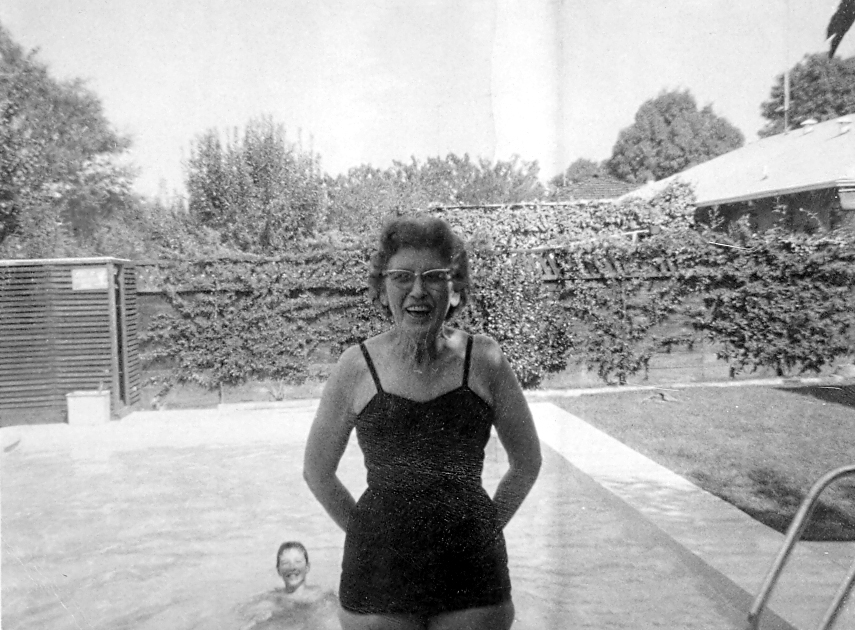
(boy in
background is
probably one of
brother Frank’s sons
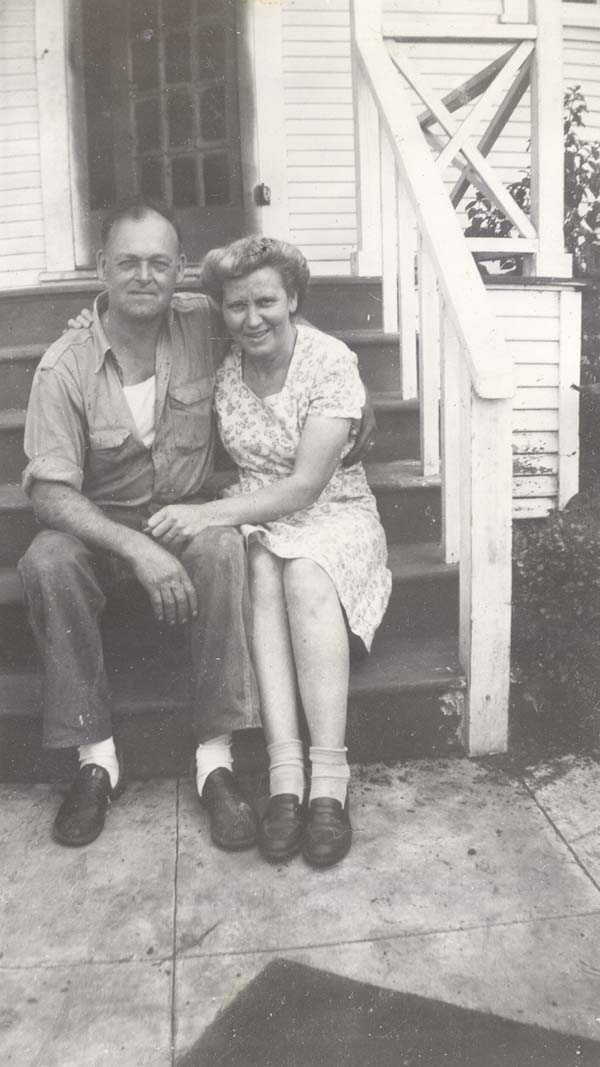
Willis
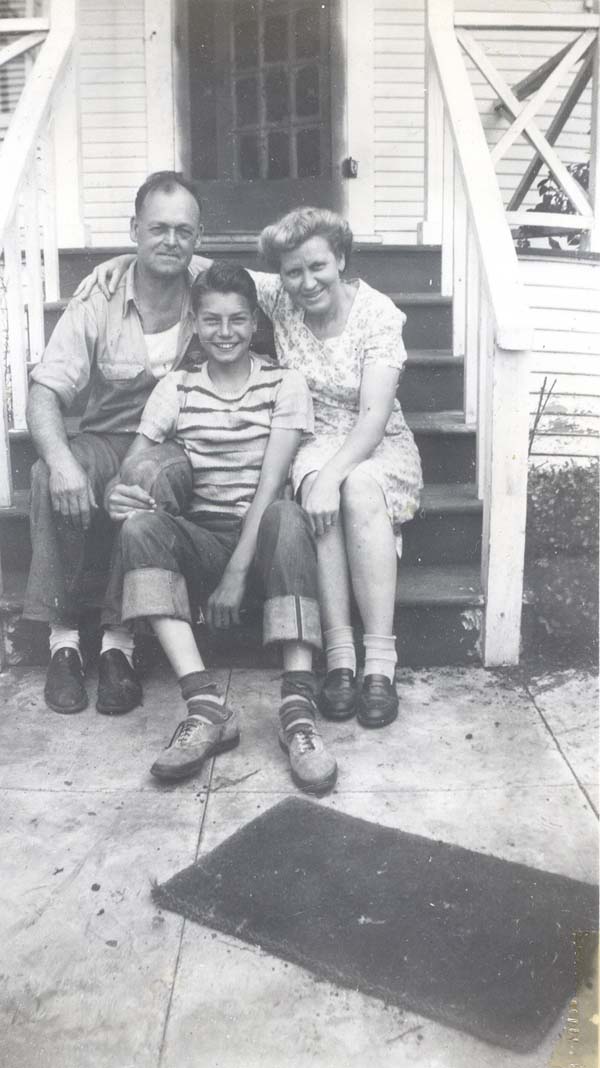
Katie Willis
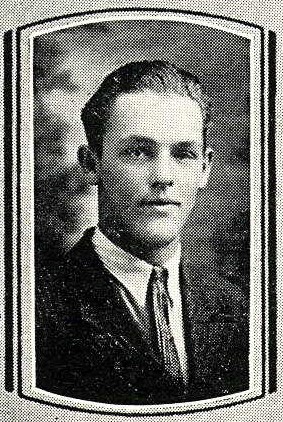
Marion High
School, Marion,
Iowa yearbook
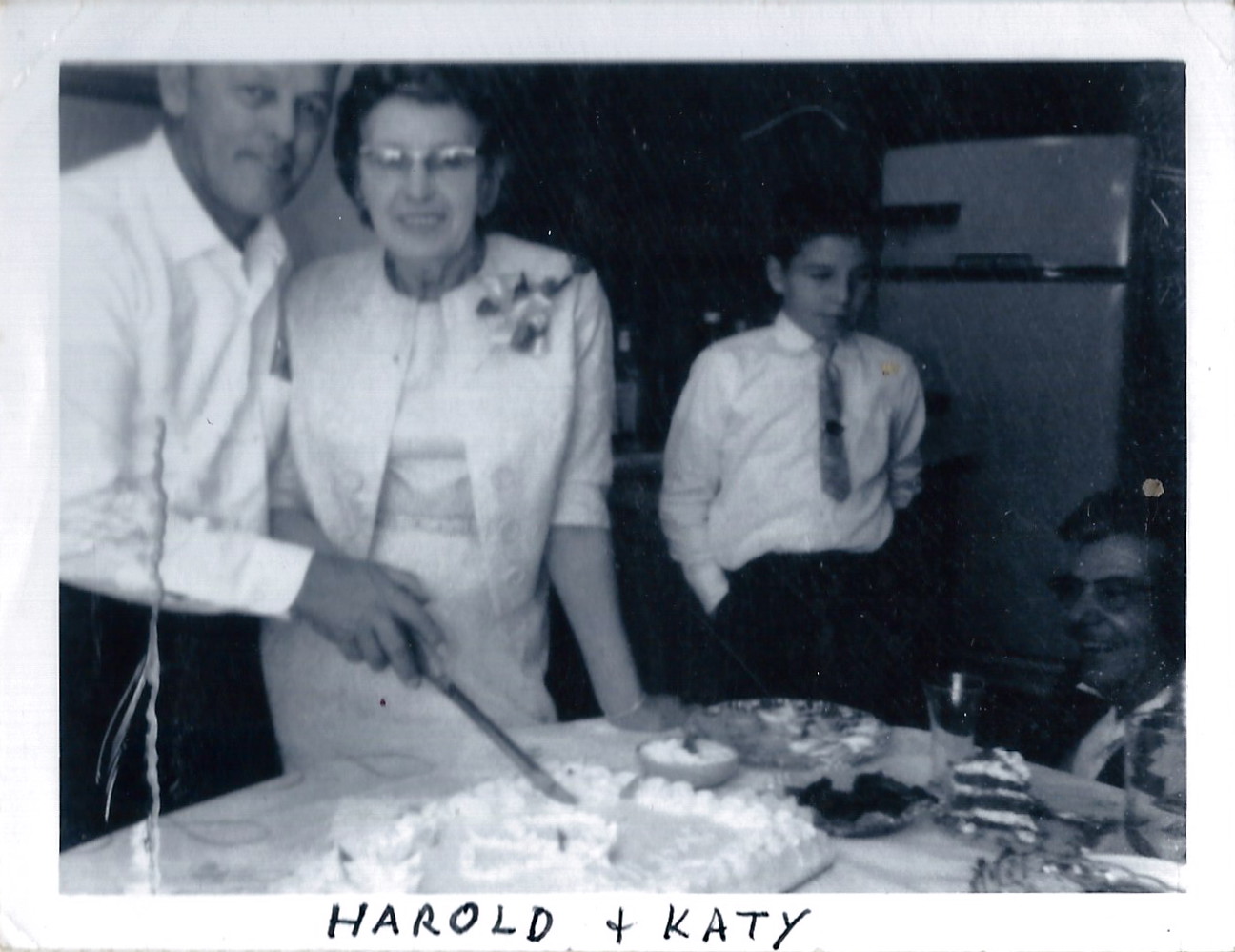
(Boyd) Silker with
their wedding cake
(nephew Darryl and
brother-in-law Dante
Dorato to the right)
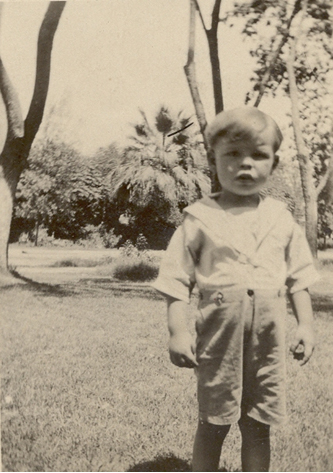
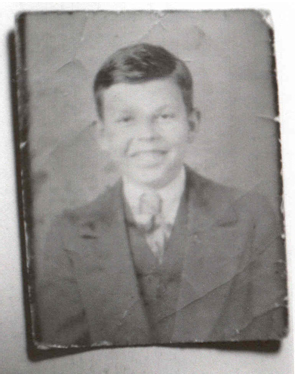
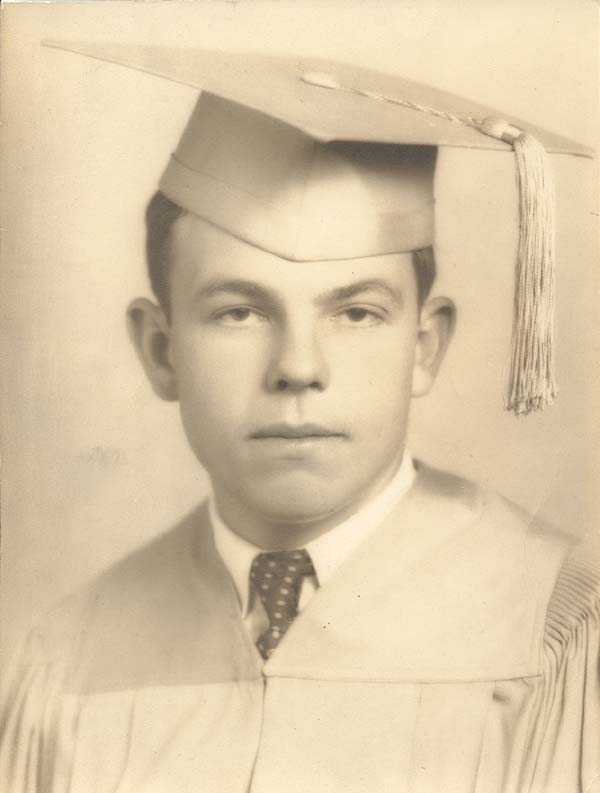
graduation
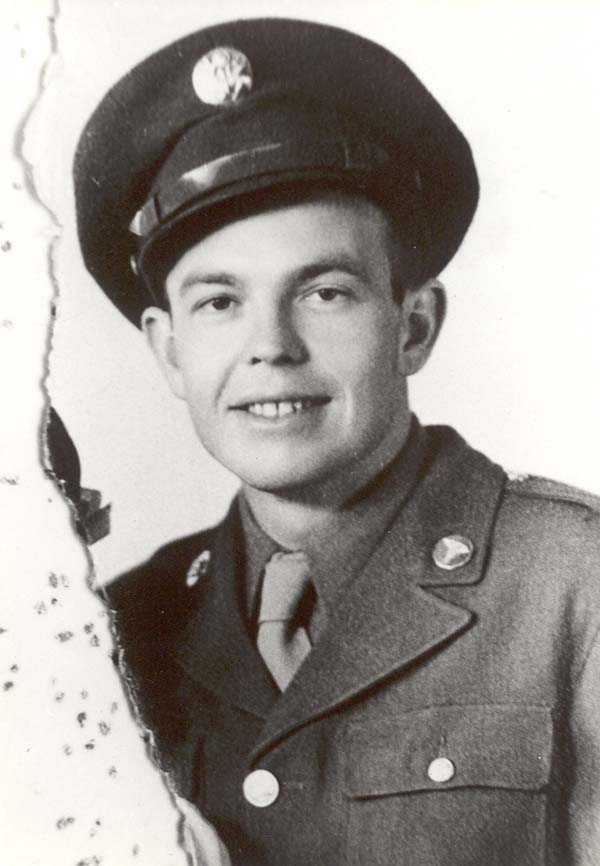
circa 1942/3
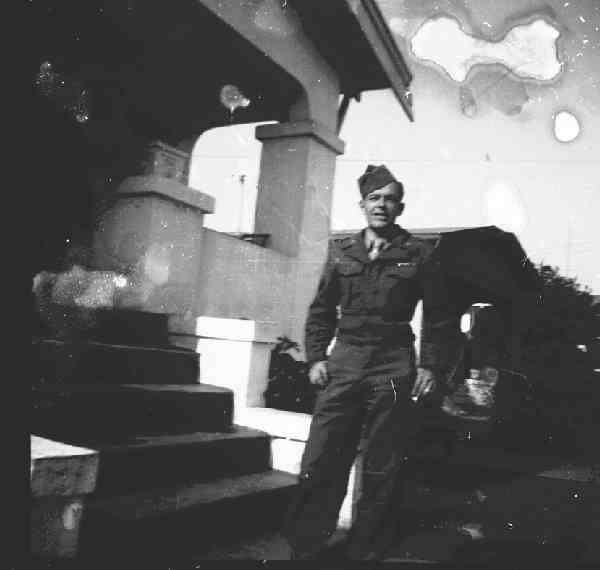
circa 1942/3
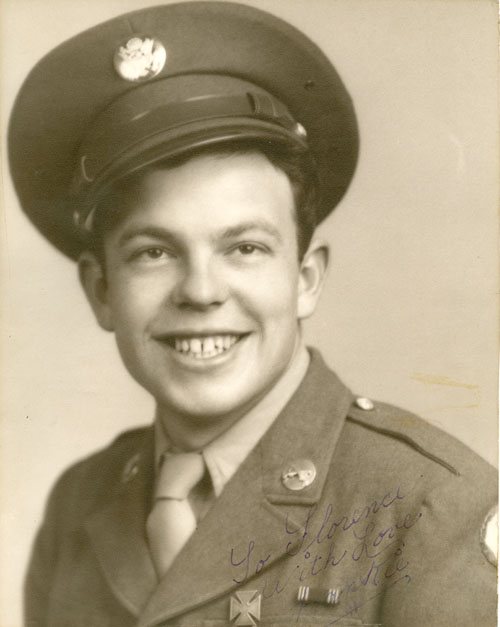
circa 1944/5
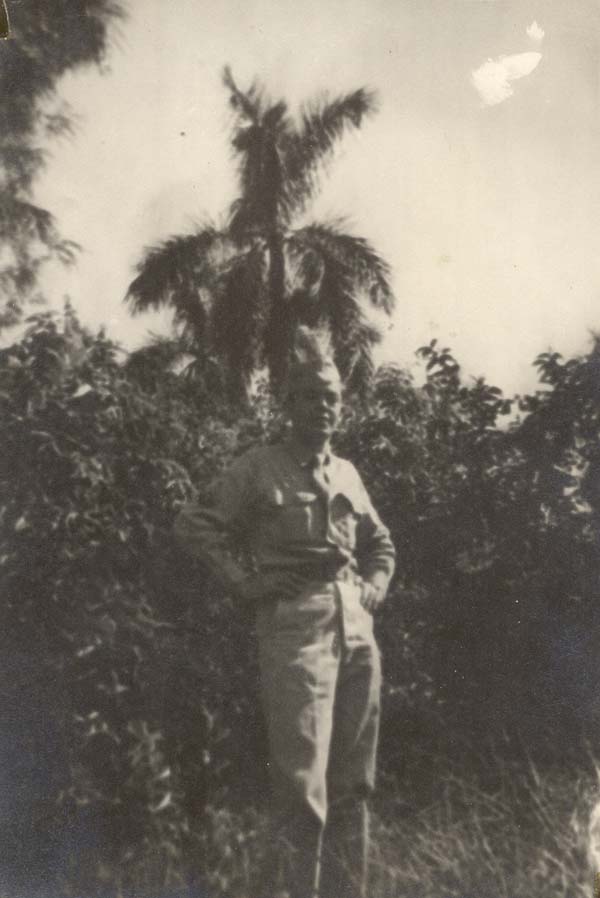
Hawaii, about late
1945 or very early
1946
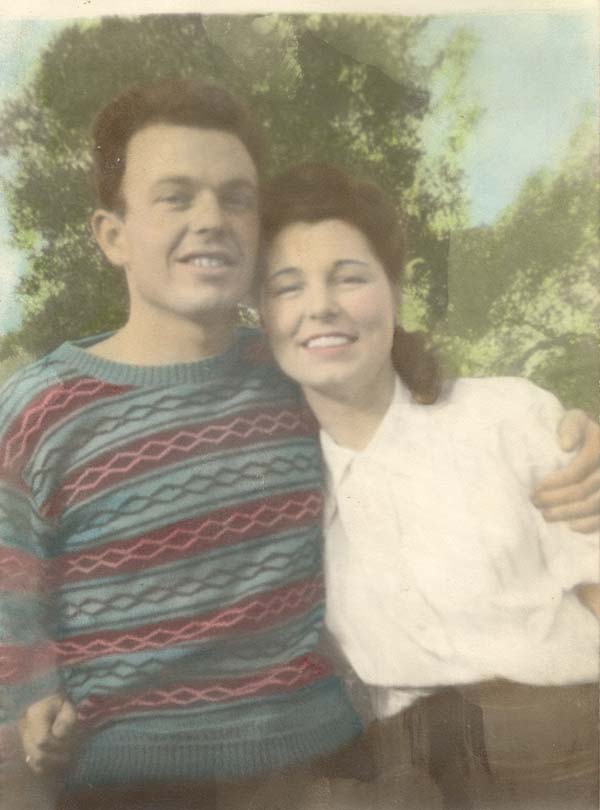
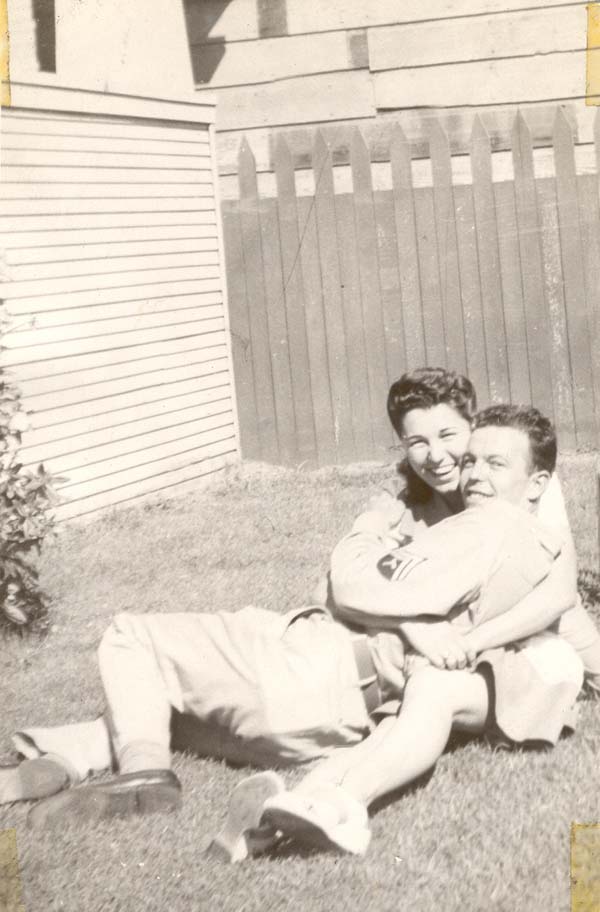
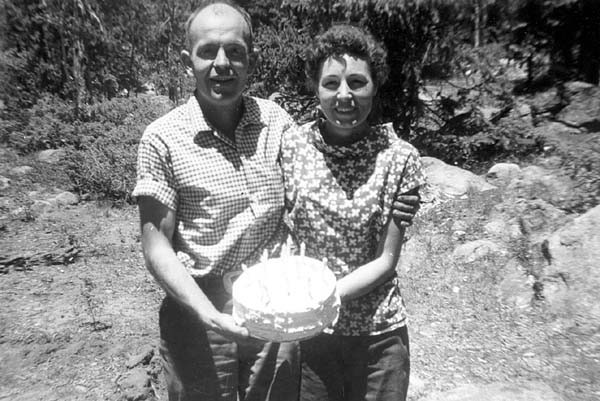
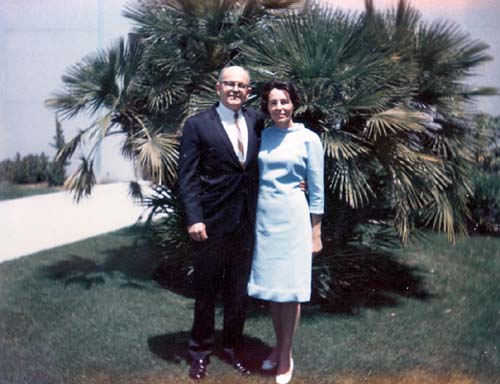
Boyd, standing just
outside the
Oakland Temple
(of The Church of
Jesus Christ of
Latter-day Saints)
in Oakland,
California
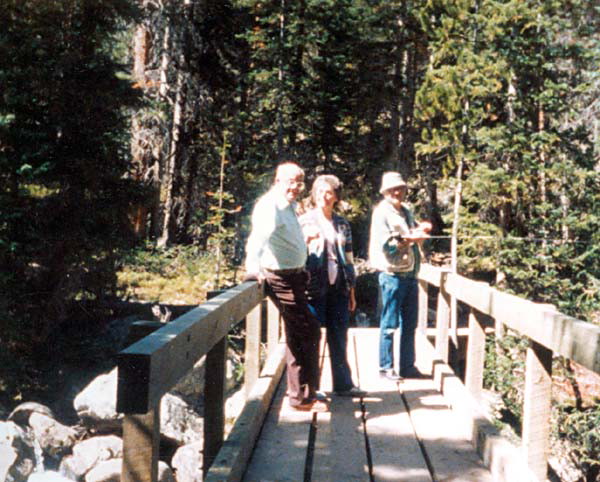
(man on right
unidentified)
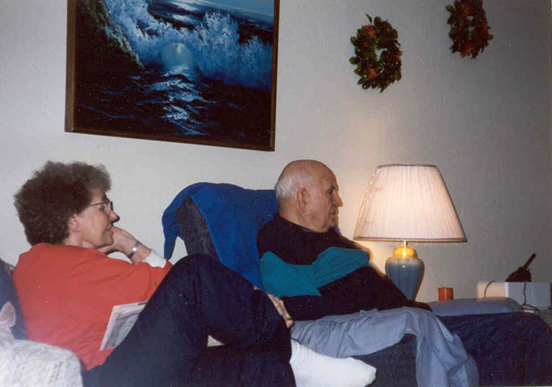
Boyd, at home in
Martinez, California,
Christmas 1995
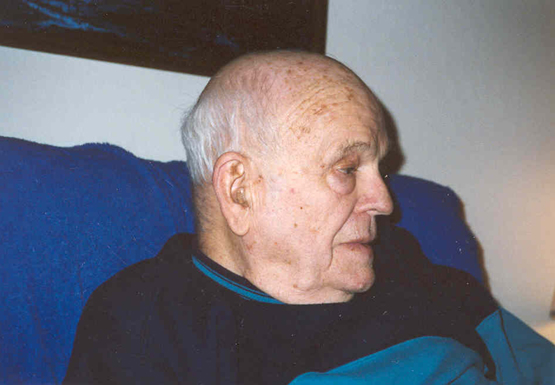
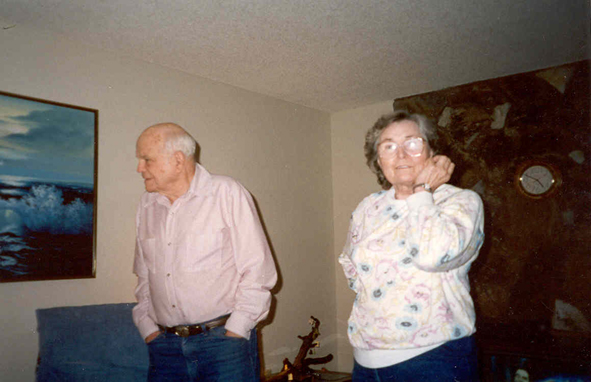
at home, 1995
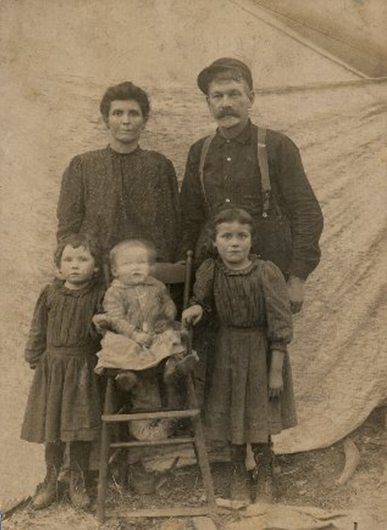
Henry Boyd with
their children
(left to right),
Katie, John, and
Ellen
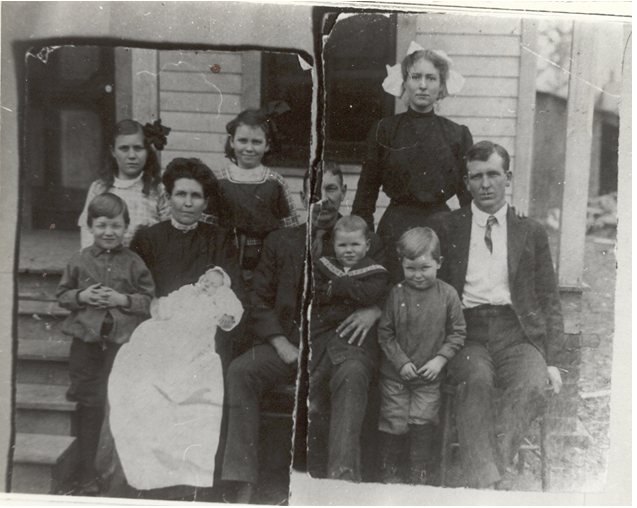
Ellen Boyd, Katie
Boyd, Hattie Brown,
Front row:
John Boyd, Bertha
(Brown) Boyd (with
baby Julia Boyd on
lap), William Henry
Boyd (with Mary
Boyd on lap), Jim
Boyd, Alva
Beacher Brown
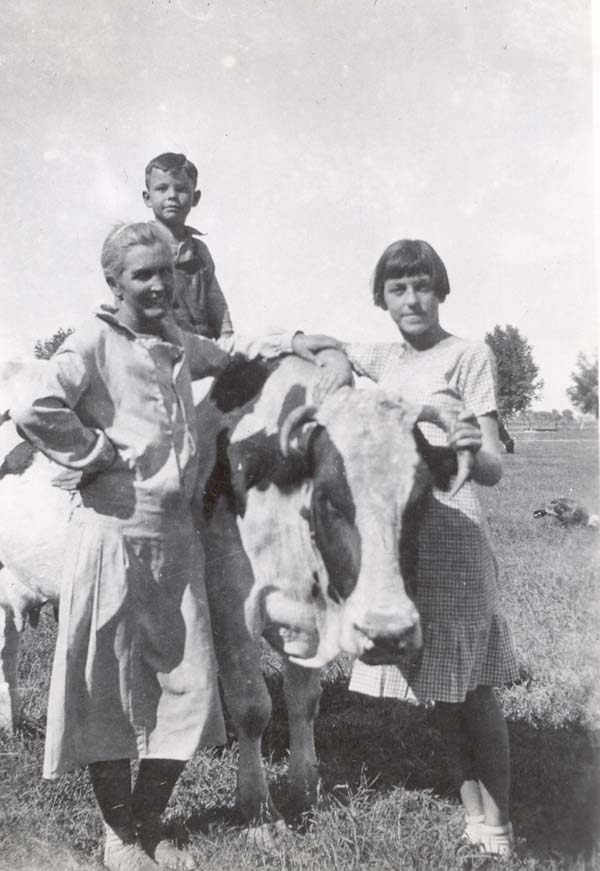
Boyd with son Frank
and daughter Julia
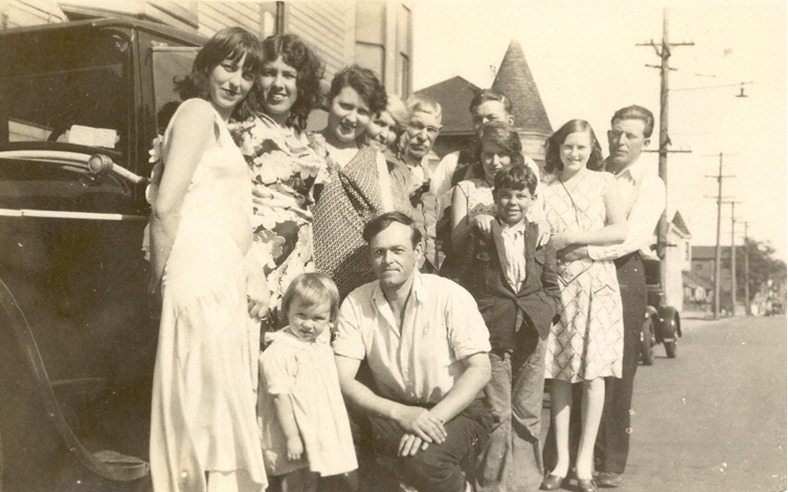
Julia Boyd, Mary
Boyd (with daughter Ruthie Boyd in front of
her), Katie (Boyd)
Willis (with husband
Frank Willis kneeling in front), Bertha
(Brown) Boyd,
William Henry Boyd,
John Boyd (with
wife Antonette
Boyd in front of
him, John's brother
Frank Boyd in front
of her), Ruth
(Meyers) Boyd, Jim
Boyd
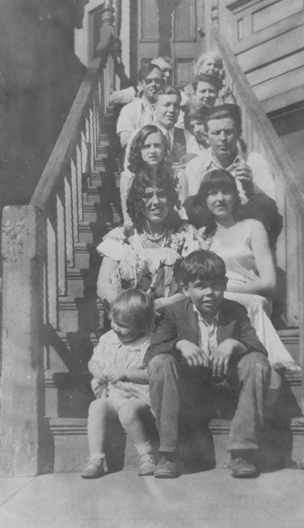
by row:
William Henry Boyd,
Bertha (Brown) Boyd;
Frank Willis, Katie
(Boyd) Willis;
John Boyd,
Antonette (Garcia)
Boyd;
Ruth (Meyers) Boyd,
Jim Boyd;
Mary Boyd, Julia
Boyd;
Ruthie Boyd, Frank
Boyd
Source Materials
Click on each category below to expand and see the copies of sources used to create the biography above (copyrighted and other restricted items are listed in the summary of sources above but not included below). Click again to close.
Recipes of Bertha (Brown) Boyd
Apricot Fried Pies
(This was apparently taught to Bertha by her mother, Martha. Bertha later taught it to her daughter-in-law and my grandmother, Florence Mahler Boyd. It was adapted for modern use.)
Make one batch of biscuit dough, not sticky. Roll out and cut six-inch circles.
For the filling, take a package of dried apricots and place in a pan. Cover with water. Boil until almost tender. Add sugar to taste (about 1 c). Let boil in sugar water until soft. Mash lumps with a spoon. Make a thin paste with 2 T flour and a little water. Add to apricots. Let thicken over low heat. Watch carefully or it may burn.
Place a little filling in the center of each dough circle. Wet edges and fold over. Fry in a pan with a little shortening, over low heat, until brown.
Caramel Cake
Bake a white or yellow cake. For the filling, melt sugar in a pan. When melted, add water. Add milk and chopped walnuts. Cook until creamy. Frost between the layers of the cake with this. Frost outer edges with white frosting and sprinkle with coconut.
These recipes were passed from Bertha to her daughter-in-law Florence (Mahler) Boyd, who passed it to me, Michelle Boyd.
Interview of Frank Richard Boyd, November 1988
Darryl “Bill” Boyd: Interview with Frank R. Boyd, Thanksgiving
Day 1988.
Alice Boyd: All right, when were you born?
Frank R. Boyd: (Laughs.) It says on my birth certificate.
AB: (Laughs.) Where you born?
FRB: Oh, in Phoenix.
AB: What was your family doing in Phoenix?
FRB: I’ll tell ya, my mom had, they thought she had
tuberculosis. She was sick and they told her to go to a warm climate
but that was up in Arkansas and from Arkansas, Mom and Dad, they went
down to Texas. And they lived in El Paso, Texas for a while. Mom had a
bakeshop there, a laundry or a bakeshop, I know, one of the two. And
my dad and my mom worked together. And when my dad got his fingers cut
off is down in there too somewhere but I’m thinking, you know…
DB: What was he doing when he got his fingers cut off?
FRB: He was in railroad. He was in railroad. That’s what they always
did. Well, then they went down there and then they went from there,
they come to live in Arizona and come to Prescott, yeah, they come to
Prescott. And there’s another town right now, I seen it on television,
it’s pretty big now, but at that time, it was just a little ol’ town
---. ‘Cause, I know ‘cause, when there in the war, I seen it. But that
was before I was born and I was born on East Van Buren Street. You
know, that’s the main drag of Phoenix, on East Van Buren, at that
time, it was a, I seen the house because Mom and Dad bought a, when
they sold their, after they sold their dairy, Mom and Dad bought a
smoke shop or, well, I can’t hardly explain what it was, but I know
they sold candy there. And it was made out of, uh…
DB: Some type of store or something?
FRB: It was a store but it was made out of old signboards. The
house, and we lived in the back of it and in the front, they, it was
next door to the house where I was born. And the house that I was born
was right next-door and I can remember it yet. They had stairs up to
the second floor and it had a big old palm tree in the front yard, I
can remember that.
AB: So that’s what they were doing when you were born? They had
a store?
FRB: No, no, that’s after. That’s just before we come to
California.
DB: Back up now, where did they get the dairy and where was that
at?
FRB: That was in Laveen, Arizona.
DB: That was after Texas.
FRB: Yeah, after I was born.
DB: OK.
FRB: And that’s that one where they had a house and I remember
the insides wasn’t finished yet, didn’t have no sheetrock. Their house
was brand new and we lived in it and we had a dairy, too, the dairy
there and they had bottling machine where they used to bottle all the
milk and we had a dairy truck that’d go deliver. They had a, it was a
little, small, regular dairy going. Not just a kind of little farm or
anything.
DB: They delivered this stuff, too, then?
FRB: They delivered, John delivered it. John went off and spent
all the money on girls and stuff and then took off and that’s, you
know that picture you seen on the train, where’s it’s on the track,
the railroad track? And you see that picture of him right here? That’s
where he didn’t tell nothing to Mom ‘cause all the money went and he
lost it all.
DB: Oh, yeah, yeah, yeah, yeah.
AB: And he took off with all the money, huh?
FRB: Yeah, well, he didn’t take off the money, he just
(laughing)…
AB: He just took off.
FRB: …He just took off. And then all the good-looking girls, he
let them have the milk for nothing, you know! You know, just kept
delivering milk, they didn’t pay the bills, and he never did collect
it.
DB: Oh, geez. So, what, they lost the dairy there?
FRB: Yeah, yeah, and that’s down there where I first started the
school, Levine, in Laveen, Arizona. That’s when I, Julia was going to
school, too, at the same school, my sister Julia.
DB: Yeah.
FRB: She’s ten years older than me, see. But she’s about ready
to ---.
DB: Who did all the milking the cows?
FRB: Mary and Julia. My mother and my dad and everybody.
DB: The whole family did, huh?
FRB: Yeah, yeah and I remember I’m the only one who could stay
in bed ‘til daylight come.
DB: Oh, is that right?
FRB: (Laughs.) Yeah. That’s the house my niece Ruthie was born in.
Ruthie was born there.
AB: How long’d you live there?
FRB: Oh, not long.
AB: Not long. Where’d you go after that?
FRB: No, no, we didn’t live there too long.
AB: Where’d you go?
FRB: Go back to Phoenix. And I remember one time we went to down
to, well, I remember when my sister was killed in Ajo, Arizona, when
she was killed.
AB: How was she killed?
FRB: With the dynamite.
AB: Oh.
FRB: Somebody put dynamite under her house and Mary, at that
time, was down with, living with her, was down there in Ajo, staying
with her. And Mary just happened not to go home that night, went over
to my aunt and uncle’s house, my aunt and uncle, see, both of my
uncles was down there homesteading most all the whole town of Ajo. And
that Kenicott mines or something come in and they started mining it
and my uncle had the only well in the whole town. And they was
trucking water in, they sell two of them for a barrel of water. That
was a lot of money at that time.
AB: Good deal.
FRB: And my uncle was the butcher in the town.
DB: And who was this now?
FRB: Uncle Homer.
DB: Homer.
FRB: Yeah, he was the butcher and he was married to an Indian,
named her Julia, the Indian.
DB: OK.
FRB: And they had a vegetable wagon and he took all the --- in
the ---, sold all the entrails and stuff after he killed a cow, go
down to Indian town, Indian reservation, and he’d sell them like
crazy. Had a great big wagon, like a trailer that he pulled behind
there. And it was like a vegetable wagon. And he even made homemade
ice cream and he had ice cream for the kids, he’d give the kids ice
cream, he’d give most everything away. He’d just, you know. But he did
slaughter cows and sell the meat up there.
DB: And you guys were living at, at where at, at that time?
FRB: We were living at Phoenix.
DB: At Phoenix at that time.
FRB: Yeah, and at that time, in Phoenix now, this was when I was
little and this is, we lived right, uh, in that, I got a picture of
the house where my mom and dad is setting on the lawn in front of this
white house.
DB: Uh-huh.
FRB: That’s where we was living at that time and that’s when I
got run over by a car, at the same time. My dad wasn’t at home. He
couldn’t get a job. He was pretty old. Dad was close to sixty and then
he had his right hand all crippled up. You know, he had only one
finger on it. And they got him a job as a watchman at the onyx mine.
Now, how far out of town of Phoenix, I don’t know but I know it was
quite a ways and he would come back about every two weeks and he’d
come back every two weeks in a Model T Ford truck, you know, with the
hard rubber tires on it.
DB: Yeah.
FRB: You know, and one time we went out to see him while he was
working there, you know. He come back and while he was gone, I was hit
by a car, and, uh…
DB: How’d you get hit by a car?
FRB: Oh, I’ll tell you, Mom pulled up and she says we’re gonna
go to town and I had a friend across the street, name was Genie, I
called him Genie Boy. And I asked Mom, I don’t want to go, I don’t
want to go. She says, Okay, she says. I want go back and play with
Genie Boy. We was playing on his swing in the backyard. And she says,
Okay, she says, Now, wait ‘til I go, now wait. I says, I’m going back.
And she says, OK, you go back and play. She says, Now wait here ‘til I
see it’s all clear, okay, it’s all clear. I started out and a guy in a
Model T Ford car hit me in the back and drug me, oh, to the corner of,
I don’t really know, but I know it’s about a half a block. And I wore
those short pants at that time and the buttons hung on the bumper. And
that’s the only thing that kept me alive. The car would’ve run over
me. And it drug my face all off in the front, you know. And I remember
because I couldn’t walk for a month. They took me to the hospital and
---. And I remember Dad come to see me and I could hardly walk to him.
---
AB: How old were you?
FRB: About five, five, six years old, maybe six. That was about
right after that picture was taken, you know that I showed you with
the short pants.
AB: Mm-hmm.
FRB: Yeah, I can remember going there and playing. And we used
to get on the swing and wind up, used to get so sick. (Laughs.) Wind
up there. Couldn’t walk. That is the same, that was the time that, you
know, kids’re always interested in stuff. Like my Dad used to smoke
and he had Bull Durham, you know Bull Durham. And they had Bull Durham
sacks and I know, Mom said, oh, he give me one and then they says I
always wanted the Bull Durham sack to play with, you know, ‘cause we
didn’t have as much toys. And Mom says, yeah, we used to send those,
we used to save those for your grandpa, Dad’s father, and he’d send
them to Dad, he says, he used to think he was saving gold in them.
DB: (Laughs.) Little sacks of gold, huh?
FRB: Little sacks of gold.
AB: Did you ever meet your grandpa?
FRB: No, no, I never did.
DB: What do you know about him?
FRB: Nothing.
DB: Nothing, huh?
FRB: Just what I just told you.
DB: When did he die? Do you know?
FRB: Nope. I don’t know.
DB: You weren’t around.
FRB: I don’t know. I have no idea.
DB: No idea, huh?
FRB: No. That’d be Squire.
DB: Squire.
FRB: While we were there, while we were there, my aunt Julia
came to see us. You know, that was when that picture was taken. You
know, I just --- how old I was because I was in that little old coat,
looked like about three, four years old, I don’t know. But that’s when
she come and I can remember her, ‘cause my sisters always talked about
her. Oh, she said she had rabbits, jackrabbits; they kicked the side
out of a barn. And I can imagine a rabbit big as a horse! (Laughs.) At
that time, see, she lived in El Paso and not very far from El Paso,
just over the border, was her ranch, is where they first started in
New Mexico and that’s the Pecos. You’ve heard of the Pecos. That’s
where Billy the Kid and all that rough stuff all gone on down in
there. And my aunt, too. But everybody, if you read the book at that
time, read all the history books, everybody, what they do, go out and
brand cows that didn’t have no brands. And that wasn’t really stealing
cows but that’s the way they did things. And they just go out. You
want something? You want some money? You go out in the desert and
round you up some calves and cows and brand them and sell them. And,
you know, that’s what they used to kid about my aunt, rustling cows
all the time. And, by the way, my sister Katie told us, now this is
Katie’s word, and my mother never did say a whole lot, never did want
to tell me anything about my aunt. But Katie says that that ---, that
Senator, that Senator, uh, what’s his name? The Teastone…
DB: Teapot…
AB: Oh, Teapot Dome Scandal?
FRB: Yeah, scandal, lived right next door, his ranch was next
door and they were good friends. And he was a real good friend of the
senator. And my Dad was down there at one time. Now, this is Katie’s
story, that when Dad was down there, they start, I do know that they
had problems about rustling and one thing or another and my uncle was
in problems and my dad run away. And Katie said that’s why he changed
his name to Boyd because there were problems down there. But my uncle
cleared it up and they turned around and sued the government and won
the case against the government for, oh, thousands of dollars. Of
course, thousands of dollar at that time was kind of like a fortune,
you know. And that was the little bit that I heard about it.
DB: You had fever down there, too, or something. Scarlet fever
or diphtheria?
FRB: Diphtheria in Ajo.
DB: In Ajo, huh?
FRB: Yeah, this was before my sister was killed.
DB: This is before, huh?
FRB: Yeah, it was ten…
DB: What were you doing in Ajo then? Is this after Phoenix?
FRB: We were visiting.
DB: Oh, you were living in Phoenix?
FRB: Yeah, and my mother was visiting, we just visiting down
there to my uncle. Uncle Homer lived there and Jim, Uncle Jim lived
there for a while ‘til he got where he thought they were catching up
with him. He was always feeling like he was chased by the law.
DB: Well, why, why is that?
FRB: Because he went and killed that guy when he was sixteen
years old. See, what happened was my grandmother in Ohio, she had the
money, she sold property there in Ohio, she got mad at her husband and
everybody looked down on a divorced woman. She was pregnant at this
time, she had a whole bunch of kids, and all by herself, she took off
with a wagon, with the kids, and my mother was probably one of the
oldest ones ‘cause she told about it all the time. And they left Ohio
and went to Arkansas. Well, in Ohio, this guy sold her the land, sold
my grandmother the land, or somehow got her money for it. Then she
thought she was buying the land out right. It was hers ‘cause the down
payment, she gave the guy the money that she had. And then she went
down there and found out that after she’d paid the balance off, they
worked and cleared it, my mother cleared it with the kids and the
orphans and all that. And after they cleared it, he says no. My
grandma was gonna sell it and get another place and just rent it out.
But he says, Nope, you can’t rent it because, in the contract, it was
a lifelong lease.
AB: Oh.
FRB: And he says, You can’t move off and you have to stay there.
If you let anybody else move on, you lose the property. Well, this
irritated my uncle and he went there, and he went up there and the guy
was in this little house and my uncle was sixteen. He had a .22 rifle
and he says, and he told the guy, What’re you doing cheating widow
women and orphans? You know, and the guy started to reach in his
pocket for a derringer. And my uncle let him have it. And he took off
and they had, what my mother said they had whitecaps. It’s like
vigilantes. And he was scared to get caught, so he took off on the
run, he went to Kansas. And that’s when my uncle said he seen the
Dalton boys. He thinks they were Dalton boys ‘cause he was working in
the field for somebody in Kansas and these four guys come up and asked
him where Coffeeville was, at least, you know, that’s the story, you
know. It could have been, could not have been.
AB: Maybe.
FRB: But my uncle Jim, from that day on, he always carried a gun,
always, ---. And he homesteaded that place down here, on the border of
California, he’d swear up and down that they used to smuggle dope
across there. And he said they’d like to get him out of the road. He
says he sleeps with his gun. One time, he bought him a Model T Ford,
drove a Model T Ford ---, and he had a 12-gauge shotgun by him all the
time, it fell over and put great big holes in the back of the car and
the back of the car looked really funny! We went there when I showed
you that 1937, 1938, that one where I, the picture, you know, that one
of me, this one.
AB: Uh-huh.
FRB: This one here.
AB: Yeah.
FRB: That was on that trip we all took. My mother, myself and
Katie and Wally went on that trip. And the reason we had the money to
go on that trip, Frank got his World War I pension. They give pension
--- at that time. And Katie bought a ’36, a 19-, uh, a Chevrolet at
about one years old at that time, and she had that car at one year
old, so we went on a trip and we went down to Mexico, we went to Ajo,
and then we went to the beaches and all that kind of stuff.
AB: All right.
FRB: So that’s what happened then.
AB: Okay, what about your dad? What do you remember most about
your dad? What was he like?
FRB: Eh, I don’t know. Remember now, he, I’ll say one thing for
him, I never had a beating from him. Never ever, ever, ever, ever beat
me. Never hit me ever. But he’s beat all my other brothers and
sisters. They told me that I was lucky because he mellowed out. He got
old and mellowed out! ‘Cause they said he used to take a big stick or
strap, a razor strap and used to strap the h— out of them, that’s what
my brothers and sisters said! I don’t know. ‘Cause you know, kids
imagine that kind of stuff.
AB: Yeah.
FRB: And Mom told me that her mama picked him for her. She says,
My mama was sweet on him. And she said my grandma was kind of sweet on
him and she picked him, thought he was real, I guess, my dad, when he
come to town, courting girls and stuff, he dressed up pretty good. And
I suppose he had a pretty, he had a job with the railroad, he had some
money and bought himself a, you know, and then too, he had an
education, he was eighth grade. That’s equivalent of a couple of years
of college now. In the eighth grade, at that time. And all his folks
were all educated. Him too. And Squire, you know. I don’t know, he
never did tell me too much about his own folks. Just Aunt Julia is all
we know of anything at all.
AB: He never talked much about his parents.
FRB: No, no. Just he used tell me about apples and having, down
in the basement, having apples, always had their apples down there and
they had apples they could see through, you know. Yeah, like glass.
AB: Yeah?
FRB: Then, he said in Wisconsin, they had all kinds of apples
---, that’s what he said.
DB: He’s the one that seen Edison?
FRB: Yeah.
DB: Thomas Edison?
FRB: That was when he was nineteen years old. Yeah, he told me
he went there to Niagara Falls and seen Edison’s, when Edison put the
light on display, the electric lights on display. Him and his mama. I
just think it was about the time that that picture was taken, I just
think. If you could check when Edison put the lights on display, you
could more or less tell. I think that was taken, like I told you, I
estimate that was taken in 1882, see, because he’s nineteen and he was
born in ’64. Oh, he told, he told you too, course you were too little
at the time.
DB: Oh, I never knew him really.
FRB: Huh?
DB: I never really knew him.
FRB: No.
DB: Now he used to fish too. Where?
FRB: Oh, in Lake Erie? Yeah, he told me about fishing off the
Lake Erie. He fished Lake Erie and catch eels off the bridge. He never
used no hooks. No, he said that they would swallow the hook and he’d
just pull them up and could get the whole d— eel off that way.
DB: So, somewhere in his teenage years he must have been around
Lake Erie somewhere, huh?
FRB: Yeah. Well, you know, that ain’t far from, Lake Erie, that
ain’t far from Niagara Falls.
DB: Right.
AB: That’s true.
FRB: Yeah.
AB: Now, you said he never let you win a game?
FRB: Huh?
AB: He never let you win any games.
FRB: Oh, no, no, he was a h— of a checker player. He played for
blood! When he played checkers, there was no nothing. He played for
blood. He wanted to beat anybody that come play with him. Yeah,
I used to play chess with him, too. And that, the reason why I played
chess, because I couldn’t beat him at checkers. And he never knew
chess and he went to chess and he learned to play chess. But him and
me, it was about even-even ‘cause I had learned it at school and
different places. And I could more or less hold myself at chess but
checkers I could never win. Never and cards neither. Cards, he could
whip me all the time. He knew all kinds of tricks. He could deal
himself a blackjack anytime he wanted. I guess he learned that while
he was working on the railroad, you know.
DB: So, then you lived in Phoenix, right?
FRB: Mm-hmm.
DB: When you lived in Phoenix, then where’d you go from Phoenix?
FRB: Well, from Phoenix, that’s when we left there when I was
seven and me and Mama, Mama drove, we had a touring car, a Dodge
touring car, maybe a 1924, ’26 touring car Dodge and, you know soft
top. And Mom drove. Mom, Julia, and myself. We left there, that little
store I was telling you about in Phoenix, that little store where they
sold candy bars. That’s near that other house because Ruth Myers lived
around the corner and then that house, the one of Mom and Dad setting
on the lawn is right across the street, or a block away. Actually, you
walk to an empty block to get to their house, then you come over here
and then down here you come and this is the Van Buren Street, East Van
Buren. And this is where the little store was. Now, that’s all
business, you got big old skyscrapers here now. And then the other
thing, my folks owned, when they come here to California, they bought
some land in New Mexico and they bought maybe 25 acres or something of
oil land. And it’s right in the town of, oh, right in the center town.
I’d go there now; it’s all town, if I’d owned that. It’s all went back
for back taxes, though. Dad didn’t pay no taxes on his property.
DB: You come in a Dodge touring car? Is that how you come to
California?
FRB: Yeah, yeah, and Mom drove.
DB: Sounds like the Grapes of Wrath!
FRB: Well, it kind of, it would be, you would guess it would be
like the Grapes of Wrath truck the one I could remember to, you know.
Now, you think about it, yeah.
DB: Why did they leave?
FRB: Why did we leave? Because they gonna get a job, see, in
Arizona there, that was in that little old store and we wasn’t really
making a living there. And Dad couldn’t get no work. There was no work
and he’d already thought they’d worked in the mines all out and we
lost the dairy. And Katie was out here. Mary had already come out here
to California. So, they wrote and they said that they were doing, I
don’t know, they come out here, Marysville, and Mary lived that place.
That’s taken of me; did I show you the one of me carrying Ruthie?
That’s where that was taken and we lived there for a while.
DB: So, they came to Marysville, California first?
FRB: Yeah, yeah.
DB: When was this? Do you know what year that was?
FRB: I was…
DB: How old were you?
FRB: Seven years old.
DB: You were seven?
FRB: Yeah, so, 1929, ’29, about 1929. I was seven… ’22… ’29,
1929, yeah. Just before Depression hit. And we got to Marysville and
then Katie was living in San Francisco. I’d never seen Katie before in
my life.
DB: Your own sister?
FRB: Yeah, I’d never seen her before in my life and she come to
there and I was always expecting something good because Julia had been
with her for ---. And she kind of, Julia always really thought that
she was real neat and all that. So I was expecting the Queen to come
out. I was disappointed! (Laughs.) You know how kids are! Well,
anyway, I come back with her to Frisco and she had a place for her and
Frank and had that Peggy living with them. That was over there in ---.
I didn’t like Katie much at all. No, I stayed a couple of days in
Frisco and I was sure glad when my mama come. And we moved down here,
boy, on 80 Street. That was the first house they had, down on 80
Street and then, we moved from 80 Street and let me think now, we
moved from 80 Street, we moved up to 28, where whatchanoodle had the
house, he had the shootout, what’s his…
DB: Cleaver.
FRB: Cleaver. Edward Cleaver. We lived in that house.
DB: How long where you at the one at 80 Street? Do you remember?
FRB: Oh, not long, Bill. I don’t think we was there much over
two, three months.
DB: Oh, is that right?
FRB: To get established is all, when we first come to
California. And then we was in Marysville, Mom worked in Gridley in
the cannery, went to work in the cannery at Gridley and she put me,
Dad wasn’t there, but she put me in like a daycare center. And they,
Del Monte, would have a place with toys and all that and you go stay
there all day. To me, it was like going to prison.
AB: You didn’t like that.
FRB: Oh, I didn’t like that!
AB: Where was your dad?
FRB: Well, he was in, right here in Oakland. He had the address
here and John, John come, too.
DB: Why did he leave and come out here?
FRB: Trying to get work.
DB: Trying to get a job?
FRB: Yeah, trying to get work, Bill.
AB: Now he’s the one who got in trouble for making silver coins,
right?
FRB: My dad? Yeah.
AB: Yeah, when was that?
FRB: Well, now, we lived in, I’m just going to tell you, we
lived in Oakland quite a while. And I sold newspapers with him and one
thing and another. He sold newspapers down, he had a newsstand down in
Oakland. Course he couldn’t get a job because of his hand, you know
what I mean. And then course you could see how old he was, over sixty
years old. And then Katie was in San Francisco when we got the big
---, so she wanted us to come over there to live. So we went over to
Frisco to live and this was around, I guess I was about eight or nine
years old when we went over there to live. That’s when the Depression
was really struck pretty hard at that time. And my Dad, I come home
from school from Frisco, and they had all kinds of boxes of money,
cigar boxes, you know. (Laughs.) There was fifty cents and, oh, that
really, he hid them all. Don’t let him see them going! Don’t let him
see them, don’t let him see them! I can remember that. They were
trying to hide me from seeing them, you know. And, --- finally says,
What the heck. He says ---. I seen them rolling it on the edge of a
file, you know. They’re rolling, putting the --- on it.
DB: Putting the serrated edges on the edges.
FRB: Yeah, and Dad plated them. And then I even seen them
melting, they melt, what they do is go down to the secondhand store
and at that time, you could buy silver brushes, pure silver brushes
with backings of silver, you could them buy for two bits. And they
made the money almost out of the silver. They had almost solid silver
in them!
AB: You were telling me how they made them.
FRB: Yeah, made them out of plaster of Paris. What they’d do is
take two boxes and they’d tie them up square and, oh, I’d say about
that height, and then they’d pour about that high and they pour it
with plaster of Paris. And then they’d take and shove the fifty-cent
on top down like this and on top and in the middle. And then when that
dry, they take another square that matched that other square, you know
what I’m talking about. But first, what they did was take and dig like
little funnels in the corners, the four corners.
DB: Match holes.
FRB: Match holes, see. And then they’d put this other square of
wood on top and then they would pour the plaster on top of that, see.
And then they, after it dried…
(End of Side 1)
FRB: --- up there on that end and then you’d tie it together
with rags, you see, and a little tiny dent hole and then you would
pour the, well, they had stuff cooking all the time on the stove, on a
gas stove and they’d throw pennies in it…I think it was pewter, I
don’t know what the…
DB: Alum?
FRB: Yeah, I guess there was some of that. But they threw a lot
of stuff into that pot to melt for the metal, see. And then they would
throw the silver brushes and what, then they melted and coated it with
alimony or something. My brother John told me one time and it was a
chemical process. And this, Squire taught my dad that, you know, years
ago, and Squire…
DB: It’s handed down!
AB: A family tradition!
FRB: Yeah, well, no, it was a thing that when they first come
here, a lot of people made counterfeit dimes and quarters and nickels.
They never did no --- money ---.
DB: How’d he get caught?
FRB: Well, he didn’t get caught spending it. He decided to quit,
no more. He just used, was during Depression, to get something to eat
with for the family, I’ll just tell you the truth. And he quit and he
broke up the molds already and towed them away. And he had some of the
money up into the stove and they had a wooden stove. Mom moved away,
Mom got mad. She says, I’m not gonna let Frank see that no more, and
she says, We have no business living there. She says, We’d rather
starve. So that was the --- and me and my mom come back and that’s
when she started working for Mrs. Rothenberg, you know, the Jewish
lady. And she give us a house to live in. My dad never moved in. And
then, he went from there, he went to Mary’s house. Katie had went on a
trip and he went over to Mary’s house and her husband was a king, he
was a burglar. This is during Depression and what he did was to get
her, she worked before she married him, she worked as a cook in the
big houses up in Piedmont and Berkeley at that time for rich people.
And he got her to show her how to get in those houses where she worked
and he went and he robbed them and he got caught. And my dad was doing
also a little bootlegging. What I mean is he didn’t make the whiskey,
he’d buy the five gallons of alcohol in a five gallon can, bring it
home, put it in the bath tub, and burn some sugar and some different
stuff, I seen him do that, and then give me a penny for every bottle I
could find, little whiskey bottle, and we’d pour it in and they would
go sell the whiskey to make some money to go live on. This is during
Depression. And, well anyway, my dad wasn’t doing anything. And he got
caught robbing, my brother-in-law, he got caught robbing and he told,
Well, why are you getting me for. He says, Get my father-in-law. He
says, He’s been counterfeiting, bootlegging, and everything. So, they
come up there and got my dad. But, you know, they only give him one
year. That’s all. My dad went up there and that’s when we learned. My
mama come home crying and she says, You know, your name’s not even,
well, my name’s not even Boyd, she says, My name isn’t even Boyd, she
says, But they told me down there. She says, Legally, we are Boyds.
She says, Mrs. Boyd, don’t you worry. You are Boyd and your boy’s name
is Boyd. And don’t you worry, his name is Boyd, he was born a Boyd,
it’s on his birth certificate, and legally now you are Boyds, she
says. That what the detective told my mother ‘cause that worried my
mother. That’s when they found out, but Mom should’ve known before
since she had Richardson. --- His name was Richardson, see.
DB: Where’d go to jail? What prison?
FRB: He went to…Well, you know, I wrote to them and asked what
my dad, what his father and mother’s name was. And that’s up in, oh,
Florence’ll tell you.
DB: Yeah, we have the thing. It says Squire Boyd on it.
FRB: Yeah, yeah, all right, and they says Squire Boyd, didn’t
it.
DB: No, Esquire Boyd.
FRB: Esquire Boyd and, Richardson, uh.
DB: Caroline Richardson.
FRB: Caroline Richardson. That’s right.
DB: Right, so, they didn’t even really know, I don’t think.
FRB: No, I don’t think so. That’s all they give us.
DB: But where he go to jail? Which jail did he spend a year in?
FRB: That’s what I’m telling you, right? The one we sent to for his…
DB: I know, but where is that?
AB: In California?
FRB: No, in Oregon, in the Puget Sound.
DB: Oh, in the Puget Sound? OK.
FRB: Yeah. And Dad was a gardener there.
DB: He’s was a what?
FRB: Gardener.
DB: Gardener at the…
FRB: Yeah, that’s what he did. They even didn’t lock him up.
They keep him on gardening.
DB: Oh, minimum security, then?
FRB: Yeah, it was minimum security.
DB: How old was he? He was pretty old.
FRB: Yeah, well, I guess so. Uh, hmm, let me try to think now. I
was twelve at the time, I think, and Dad was about seventy-two.
DB: Oh, geez.
AB: What was your mom like?
FRB: My mama?
AB: Yeah, sounds like a good lady.
FRB: Yeah, she tried to be. She always wanted me to go to church
and wanted me to be a preacher, wanted me to always…(Laughs.) Push me
for religion all the time. You seen that book that Mom, uh, Grandma
had there, I told you I started. You look in it. Them were given to
me. Every Sunday, I would get a card for going to Sunday School and
she had me having a scrapbook and one thing or another of the
Christian cards and all.
DB: What church did she belong to?
FRB: Well, originally she raised all my brothers and sisters as
Seventh-Day Adventists. And they all went to the Seventh-day Adventist
school, how long, some of them that’s all they ever went to, was
Seventh-day Adventist school, I don’t think…
DB: Arkansas, right?
FRB: Yeah, in Arkansas and in Texas and even in Arizona. I
remember going to Seventh-day Adventist church when I was a little
baby ‘cause they said every time that lady would sing, I would cry out
and they would have to go out. And I remember Mom would cook
everything Friday night. No cooking on Saturday at all. No nothing but
going to church. That’s all we ever went to, early church or late
church. Well, Mormons do the same thing or used to. And that was a lot
of teachings were a lot like Mormonism.
DB: You were raised Seventh-day Adventist?
FRB: Yeah, until we come to California. Now, when we come to
California, I don’t think Mom found a Seventh-day Adventist church, so
she sent me to a Baptist church and then she would send money to the
Jewish synagogues. She tithed herself, ten percent of everything she
got. If we didn’t have nothing, she sent ten percent of nothing. But
she always, always, if we got a dollar, ten cents of it went to just
some church. And they used to ask her, How come you do that. And she
says, Well, it’s God’s money. And said, Well, how do you know who to
send it to. Mom says, That’s God’s money, she’s not cheating Him out
of it, if the people that she gives it to is cheating God. She’s not
doing it. That’s the way my mother always felt.
DB: She give it to all the churches?
FRB: Any church, any church she thought was doing some good,
that was doing good for, you know, for Christianity, work.
DB: So you were raised as a Baptist?
FRB: Eh, kinda like, I went to Baptist most of the time and then
even one time, we went to Holy Roller church, you know, for a while.
DB: Pentecostal?
FRB: Yeah, Pentecostal, yeah.
AB: Did you like that?
FRB: Comme ci, comme ca. The only thing I really liked about it was
the good singing. (Laughs.) Did a lot of singing.
AB: Did she ever talk about her parents?
FRB: Oh, yeah, she talk about her mama all the time, her mama.
And that’s the one that I told you that was redheaded and that’s the
one that I told you that come from, that bragged about the blue blood
in her veins and that the one I told you that jumped the boat in
Florida. That’s my mother’s mother. And that’s one I told you had the
relations, they supposed to be some high mucky-muck in England. And
after he’d, already after he died or something, some like lawyers or
something come here from England, hunting him down. And they says,
Well, if he didn’t want no part of it, we don’t either. So they says,
Let’s deny that he would anything to do with them. So when they come
question, asking if any of their relations, if they know, they’re from
their father, I don’t know, I don’t really know what it was. This is
the story I got from my mother when I was a little boy. And she says
that they denied it and I always says, Gee whiz, they could’ve had a
castle over there, Mom, we got nothing but a d— dump around here!
(Laughs.) So used to I couldn’t see that. And couldn’t see her giving
ten percent away when meals, we didn’t where the next meal was coming
from.
DB: She didn’t like her red hair, huh? She used to comb her hair
with what, with a lead comb?
FRB: That’s the same bunch on there. And that might be some of
those pictures you got of the ladies, of them old pictures you got
there and you know those, that one you got. And that something Boyd,
her name was Boyd. It’s in the album there.
DB: Right.
FRB: That’s some of those and that’s through her, uh, that’s
that one there, Martha Ennis.
DB: Tell me the story about Homer. Tell me about Homer with the
guy that…
FRB: …he killed?
DB: Yeah, yeah, tell me about that.
FRB: He killed a guy, too.
DB: Yeah, tell me about that.
FRB: Yeah, both of my uncles did! Yeah, well, he married an
Indian, --- Luz, she’s the one that…
DB: She lives down in Southern California.
FRB: Yeah, she lives in Arizona now. This one’s on the
reservation. And she’s the one that, Junior is the one that graduated
from Brigham Young University and he’s also the one, the first Indian
they say, the first Indian, I read it in there, the first Indian to
get a federal grant for, educational grant or for something, I forgot,
but he was the first Indian. But it didn’t say that he was just half
Indian because my uncle was his father, see. So that makes him a
half-breed.
DB: That’s Homer’s son.
FRB: Yeah, that’s Homer’s son. But Homer had, I’ll tell you
what, he lost about six kids all in one day, that wagon I told he
carried vegetables on?
DB: Yeah.
FRB: That thing got a fire, gasoline, and they were all on that
wagon and burnt them kids up and what he did, he went and made a great
big room like this one, and they tried to, the town…
DB: Underground?
FRB: Yeah, he dug it and my, uh, I think John helped, no, John
helped him with his other boy, the one that died with diphtheria. He
lost a lot of kids, he did. Well, anyway, they built a whole room and
made cement walls into there and all. And he went into there and laid
all the bodies in there and then he cemented the whole room in, in
Arizona, early in the day, in Ajo, right in the town. And they were
trying to make him stop and they couldn’t stop him. The law wasn’t
strong enough there to stop him! And it’s another thing is, they come
there and they was going to make him go to the, he was the same guy
that had a kidney infection and this was before they had anesthesia.
And they held him down and jabbed a knife and drained his kidney out
the side. Well, this last one he died in the hospital. You seen that
paper said he had the strength of three or four men?
DB: Yeah.
FRB: Well, he’s the guy and he would break right out of, they’d put
him in a straightjacket, when he’d passed out, he woke up, he was in a
straightjacket, they’d take him to the hospital because he didn’t want
nothing to do with the hospital since they done that, and he’d just
straightens out and just straighten that jacket right out.
DB: Ripped the sleeves out of it?
FRB: Ripped it right out of there! Well, him and my brother Jim,
I’ll tell you something funny. Him and Jim, Jim went down there and
they’d get a few drinks in them and they go out to butcher cows. And
they’d go wrassle the d— cows!
DB: Pick them up?
FRB: Oh, yeah, they’d pick them up and then haul them up and
then cut their throats. And then my uncle would grab a cup and drink
the hot blood as it was coming out of the cow when they were
butchering them. Jim would tell you that. He had a good time with
Uncle Homer.
DB: How did he kill the guy?
FRB: Well, anyway, he married Julia, her name was Julia and he
had this place were he butchered and sold, actually where he did all
the butchering, like a store, actually. And then in the back he had a
place. I went back there and helped him freeze ice cream and one thing
and another. And one time when I come from the Army, when I was in the
Army, I stopped there for a couple of days and he had me, he said,
Here, Frank, work these out. You know, I didn’t know what they were, I
washing them all, hanging them all on the line. It was the guts. And I
said, What are you going to do with these? He says, Well, he says,
Never mind. He says, I’ll take care of them. So the next morning, I
get up in there, I smelled a tripe. This is tripe, he says. And the
next morning, he was cooking. And he says, Ready for breakfast?
Smelled a real good smell, smelled like sausage and I went in there
and it was the tripe had cut up! And it smelled real good but I
couldn’t eat nothing, I couldn’t eat nothing, nothing! But my uncle
could eat like an Indian. He didn’t think nothing of it.
DB: Now how did he kill that guy? You still haven’t told us the
story yet.
FRB: Oh, okay, now in that same house, he took, now I’ll tell
you another story about him, too. But well, anyway, the guy come
knocking at the door, the Indian from the reservation, he’d been
staying with Julia before, now Indians don’t get married, you know,
they don’t have no marriage ceremony or anything. They’re there
together for a while and they have kids. He might take off, the buck
might take off and he might come back in a week or two and he might
not never come back. That’s Indian life, you know. Navajos included.
Well, anyway, somehow my uncle had met Julia and he married her. And
he brought her to his house, they had family, and he had all those
kids. Well, anyway, before they had all the kids, he had just a
couple, this Indian come drinking and he was looking for Julia ‘cause
he had lived with her before. And he come knocking at the door. My
uncle says, Go away, go away. He says, You have no business here. He
says, She’s my wife; I’m married to her. And he tell that to a drunken
Indian, see. And so he come around. He kept circling the house and,
all of a sudden, he broke in the back door. And he come in the house
and there was a club in my uncle’s closet, right in the house. And
they was going to do is, Hey Mr., his name was Mr. Brown. Mr. Brown,
he says, you’re going to have to come down to police headquarters.
And, No, he says, I ain’t going to do that. So, they brought the court
right to my uncle’s house cause they said he was too strong, they was
afraid of him, they was afraid of him! He wouldn’t take no nothing not
from nobody. But there wasn’t anything he wouldn’t help people and
I’ll tell you, one guy, one bum come through there and he was hungry
and everything. So my uncle took him in and he give him a job, let him
make some money and all that. And one time my uncle had a cash box and
the money was gone! And so he figured this guy had all the stuff
packed. He used to sleep right in the same house with my uncle, see.
And the guy had all the stuff packed and my uncle seen it. And so he
says, I’m going to get my money back.
DB: What did he think he was going to sneak away or something?
FRB: Yeah, he was going to sneak away when everybody went to bed
that night. So my uncle didn’t say nothing to him and he figured
that’s where my money is, my uncle said, you know. So that night,
before the old guy ---, he barred all the doors, put great big bars on
all the doors and all the windows. And the guy was laying there in a
little cot there and there was a great big stove inside. My uncle
started a big fire in the stove, getting red as heck. And then he
pulled out his --- and he had a meat cleaver and a chopper and
different stuff and he sharpened the knives. And the guy was lying
there, see, wondering what the matter with my uncle, what the matter
with, you know…
DB: Yeah, what’s he doing?
FRB: …Homer, what’s the matter with Homer? Whatcha doing? He
says, Well, I got a cheat; I’m going to chop him up and burn him up in
this fire. And he kept sharpening. And the guy got to thinking about
and he got so scared, he jumped up. I’ll give you the money back! I’ll
give you the money back! And he started giving the money back. And my
uncle set him on the road and told him to never come back again. But
that guy was so scared! (Laughs.) I’ll tell you another little thing;
my uncle had a little sense of humor, though. You know, his wife, I
told you was an Indian, Julia was an Indian.
DB: Yeah.
FRB: And he says, Man, he used to say, My mama used to cook ---
than you and you’re a good cook, the fact is, what she says to cook
best was baked watermelon. She says, You’d like a baked watermelon? He
says, yeah, oh, that’s the best thing, my mother used to know how to
bake watermelon better than anybody. She went and baked him a
watermelon. And he come home, and he says he come home and he says it
dried up but he says he ate it! (Laughs.) He says, ‘cause he ate it,
he says, after he told her that and she went and did it, he went and
ate the darn big watermelon.
DB: So, when you came here to Oakland, after you stayed on what
street over there, by Romak?
FRB: 80 Street, yeah.
DB: Then you moved to where?
FRB: Well, we lived up there on 28th Street for a while, you
know and then we moved up on 26th Street, it was right across the
street. I could show you better. You remember that forging place that
was over there, near the park?
DB: Near Romak. Yeah.
FRB: Yeah, yeah, you know the park is over there, on that side?
Hmm…
DB: Near Hollis Street, anyway.
FRB: Yeah, near Hollis, up there by Peralta and one thing or another.
26, 28, 29…
DB: ---
FRB: Yeah, and then we moved from there down to Fifth Street and
from Fifth Street, that’s when I think they went to San Francisco,
just about the time Dad was over in Frisco, we moved to Frisco with
Katie. And from there we come back and everything. And they got, me
and my mom to Seventh Street, in this house where, worked for Mrs.
Rothenberg and my dad was, I don’t know, with Katie and with Mary. And
then he got caught and put in jail. And then we went and got, we moved
several places, we moved one place on 12th Street and then finally on
22nd Street, by 22nd and Filbert. And then at that house, uh, John had
already gotten married while we lived down on Seventh Street and Julia
got married down there and Jim was already married before he come
here. What happened to Jim and John when they were young, well, you
can figure they were about nineteen, about nineteen, I guess, nineteen
or twenty, they used go out there in Phoenix, this was before they
come to there, and they would hook onto the guys that would buy the
cotton and they had big wagonloads of cotton. And they’d hook on the
cotton and sneak off at night and take it to the gin the next morning
and sell it. And Jim got caught. And they put him in jail. And that’s
when we left. Jim was still in jail when we left and we come to
California. And when Jim got out of jail, he married Ruth there in
Phoenix and he come here.
DB: That’s his first wife?
FRB: Yeah, and then they come here. Well, anyway, that was down
on Fifth Street and if you look on that picture you got of us sitting
on the stairs.
DB: Yeah.
FRB: That was about that time. At the same time, my dad had a
shotgun at that time and I remember playing with Ruthie when I was
about seven years old, pulled the trigger and d— near killed her!
DB: ---
FRB: 12-gauge shotgun. Thing shot a big hole, I remember shot a
big hole in the floor. Oh gosh, it was a big old hole in the floor!
Kicked me, I pulled the trigger and they didn’t even have it, just
like this and I was about seven years old. Boom! I didn’t remember
nothing else.
DB: (Laughs.) Is that right? Did it knock you out or just kick
you back?
FRB: Kicked me back. I was aiming it at Ruthie, pointing it at
Ruthie! But it didn’t get her because it kicked away, see. Then, from
there, I moved --- the icehouse. And then my dad come back and my
brothers were working at Herrick’s Ironworks.
DB: How old were you there? When they were working at Herrick’s.
FRB: I just went into the sixth grade.
DB: You were about eleven years old then.
FRB: Yeah, I was just in the sixth grade and going into junior
high school, I just started into junior high school at Lowell Junior
High School, which was down on Market and 14th. And that was a junior
high, and they, from Lafayette and there. But the first school I went
to in California is right across the street from Romak, you know that
old school?
DB: The old school right over there on Peralta.
FRB: Yeah, I did know the name of that. But that’s the first
school, that’s where I learned to read in that school.
DB: Oh, I’ll be darned. That’s across the street from where I
work.
FRB: Yeah, that’s where I learned to read. And also that’s where
I used to help the janitor there and he used to give me brushes and
all that. I’d stay after work and work and help clean up the
blackboards and stuff, just as a volunteer, you know.
AB: Is that when you took the canoe under the bridge? I remember
you telling me a story about that.
FRB: No, this was a lot later. Now then we moved to, when we was
down by the icehouse on 22nd Street, then we moved to 16th Street
because Jim was working at Herrick’s. Herrick’s owned the house and
they rented the house to us for ten dollars a month. And we moved in
that house and Dad come back, living with us, see. Mom was on WPA at
that time, working on WPA.
DB: What was she doing?
FRB: Sewing quilts for WPA, sewing quilts. Mary was, too. And we
lived right across the street from Herrick’s and that’s where I built
the boats when I was living there. Maybe twelve or fourteen years old
and I used to go swimming every day, either down at the bay or up to
Temescal, Lake Temescal. But every day, I’d go swimming, every day on
summer, this is summertime. And I rode two kayaks down there, I
remember taking them both down there. And I’d float them around
Treasure Island and halfway to, one time, we got too close to Alcatraz
and the Coast Guard picked us up and brought us home. And oh, my dad
never beat me but you know.
DB: Well, you’d float the kayaks underneath that bridge when
they were building the bridge.
FRB: Oh, yeah, yeah, yeah.
DB: Which bridge? The Bay Bridge?
FRB: The Bay Bridge. On this side where they, not the San
Francisco side.
DB: The Oakland side.
FRB: On this side. And they were building, by the way, they were
building Treasure Island at that time. That used to not be just a,
that used to be a --- and all that flat back there was nothing. They
filled that up.
DB: That was made, manmade.
FRB: That’s all manmade and they put the World’s Fair there. The
1938 World’s Fair was there, see.
DB: I remember you were telling me about them guys when they
were riveting up there when you were going underneath that bridge.
FRB: Yeah, and they dropped those on there. And I think the d—
guys up were fooling around, throwing them at us, they hit the water
and --- they’d go, you know.
DB: They were hot rivets, huh?
FRB: Yeah, yeah. They were putting tracks in, at that time they
put a train down on the bottom deck. The train went there and the
trucks went on the side of the train on the bottom, both ways, this
way and this way. And that’s where my brother John went out of
control, steering broke.
DB: Yeah.
FRB: And glanced off. And he come home as white as a sheet. He
was on the San Francisco side.
DB: The upper deck, what’d they do? They have the upper deck.
They have the cars on it?
FRB: That’s for cars. Both…
DB: Both directions?
FRB: Both directions. And down below was for trucks and trains
both directions. That’s when they first made it. I remember when they
first opened the bridge, you know, and the first guy on it over the
bridge was President Hoover, I don’t know what the president at the
time, he was the first guy over the bridge, in a car, on the Oakland.
DB: You used to go swimming there; you used to jump off those
pile drivers.
FRB: Yeah, they had big pile drivers. You, they higher than
telephone poles, higher than telephone poles and you climb up those
things and you swing your arms around like this, so keep straight down
so you --- and hit it sideways ‘cause if it you hit it sideways,
sometimes knock the wind right out of you and you could kill yourself.
Then too, it had to be high tide because down below at the low tide
the piles would come out of the water. So we was diving down between
the piles when we jumped, we jumped between the piles! But we never
did go that deep on high tide, you know.
DB: You’re lucky you’re alive.
FRB: Aw, I don’t know, we had a little fun as kids. And we’d go
and we’d take a big lifeboat, oh, my friend had a, oh, I suppose it
was twenty-eight foot long. And about four, five, six of us kids would
get on the oars and row it out on the flats over there in the low
tide. In the low tide, we wouldn’t dive no more, we’d take that boat
over there and swim off like an island out there, like an island out
there in the middle. And every once while, you’d step on a ray or
something. But then they never did bother us. Catch crabs and
different stuff. Yeah. And that’s before the bridge; I used go out
there a lot before the bridge was built. And that was the end for the
key system, the end where the ferries would come and they’d take the
train out at the end. Right where the bridge takes off, they used to
have a pier there and ferries would come in there and the key system
would come. And people would get off the trains and get onto the ferry
and go to San Francisco. And then they had another ferry at the end of
Broadway. They called it the Nickel. It cost you five cents to go to
San Francisco. They called it the Nickel Ferry. And one time, they had
the San Francisco medical college is still there, you know, and this
guy was bringing a human head home and he had it wrapped in the paper
and the alcohol stuck to the face. This was in the newspaper, too. And
he was riding the ferry and he had the head setting next to him on the
bench, he was reading. And a lady come up there and seen that and she
screamed! And they thought they had a ghoulish murder, you know. But
they didn’t, this guy was a medical student studying eyes, ears, and
nose.
(End of Side 2)
(Transcribed by Michelle A. Boyd, August 2000. Interview took place at the home of Frank and Florence Boyd in Martinez, CA.)
Images of the notes are shown below as a thumbnail. Click on the thumbnail to view a larger version of the notes in another tab.
Notes taken by Alice C. Boyd of Frank Boyd's memories and knowledge of his family:
Image of the family Bible page is shown below as a thumbnail. Click on the thumbnail to view a larger version of the page in another tab.
Source: Photocopies of Boyd Family Bible page from the files of Darryl W. Boyd.
Images of the birth registers are shown below as thumbnails. Click on each of the thumbnails to view a larger version of the register in another tab.
Ohio
Arizona
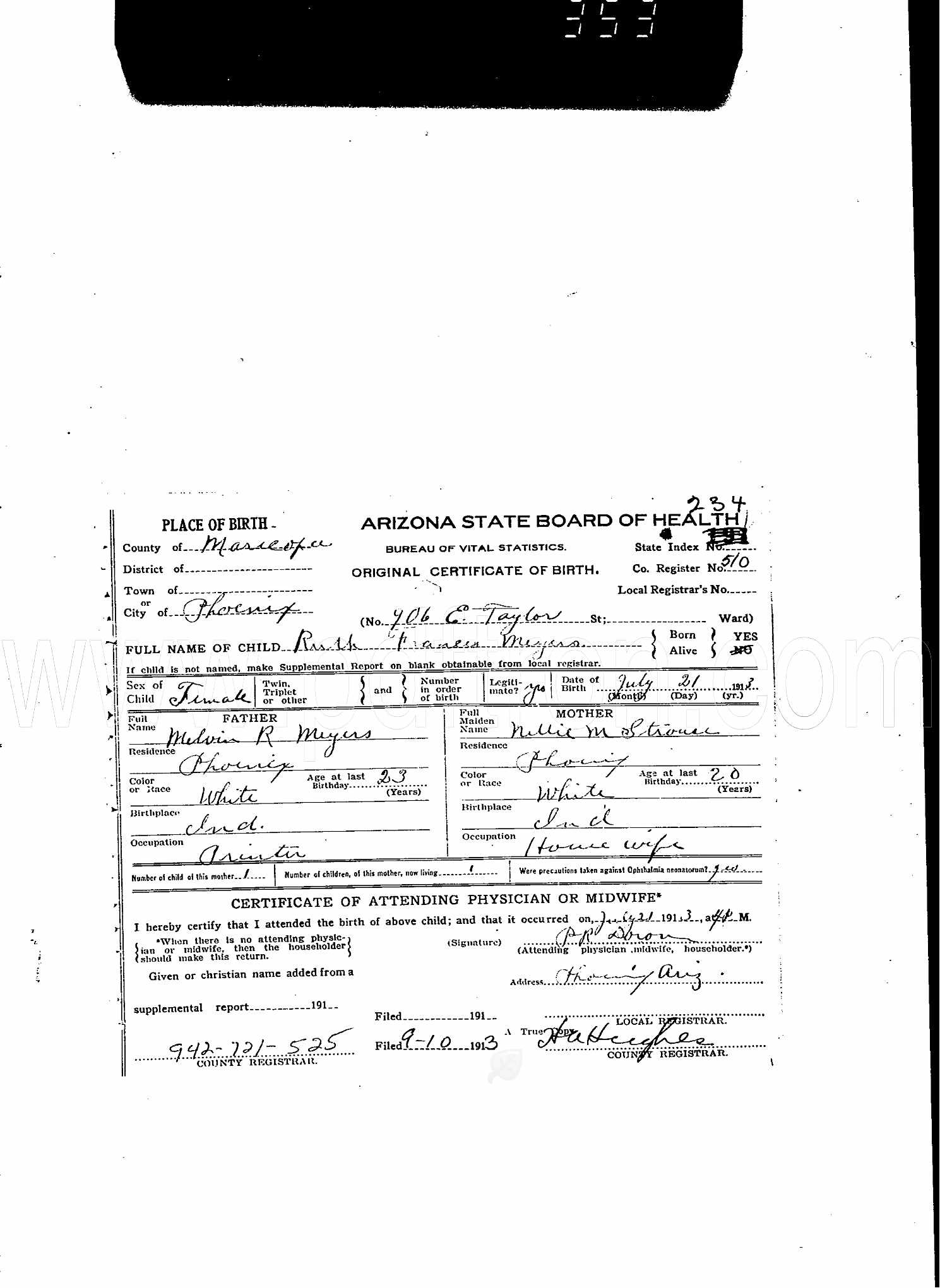
(Ancestry.com.
Arizona, Birth Records,
1835-1915 [database
on-line]. Provo, UT,
USA: Ancestry.com
Operations, Inc.,
2015. Original data:
Arizona Department
of Health Services.
Arizona Birth Records,
1855-1960)
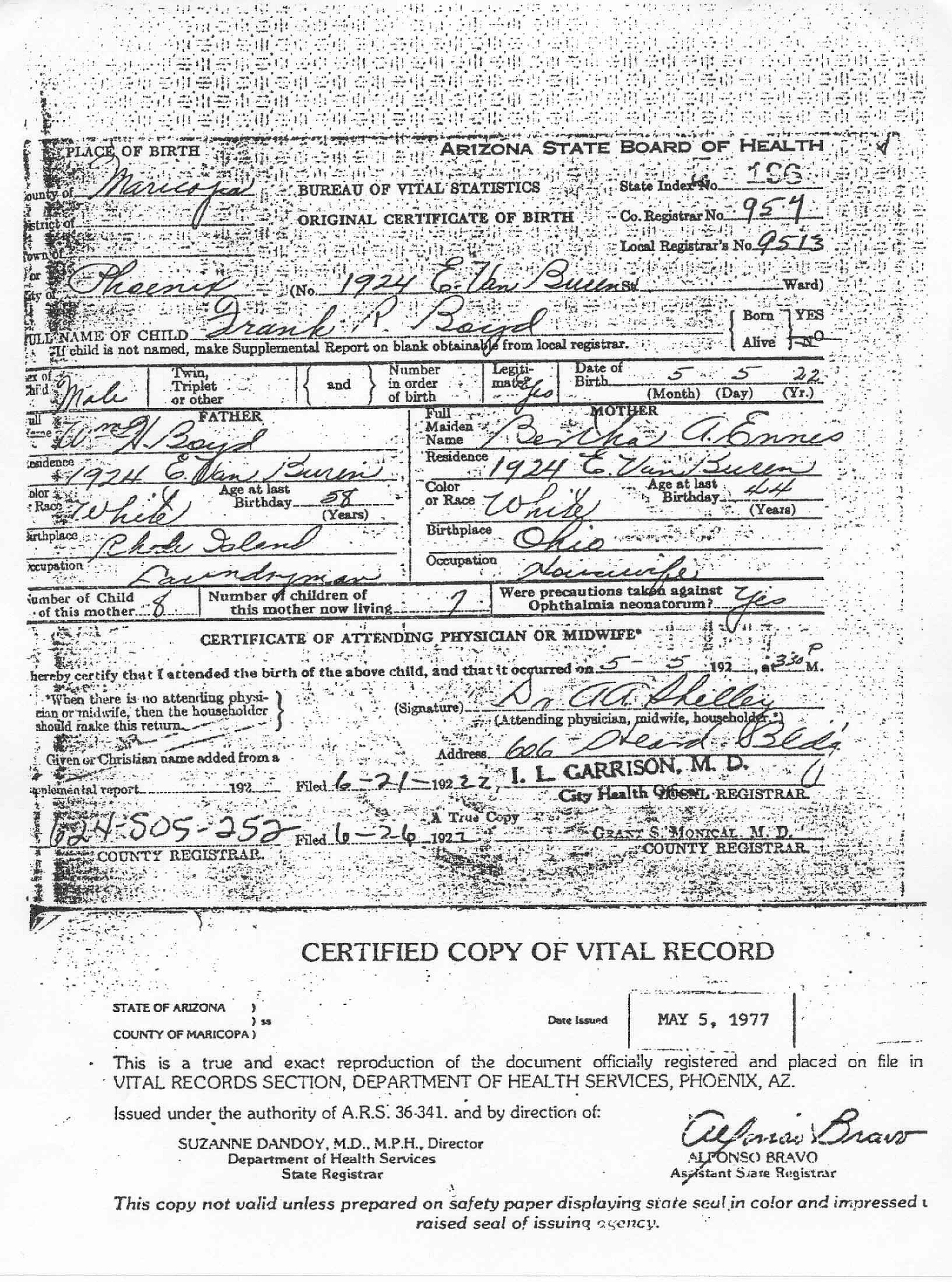
(copy found in the
files of Darryl W.
Boyd)
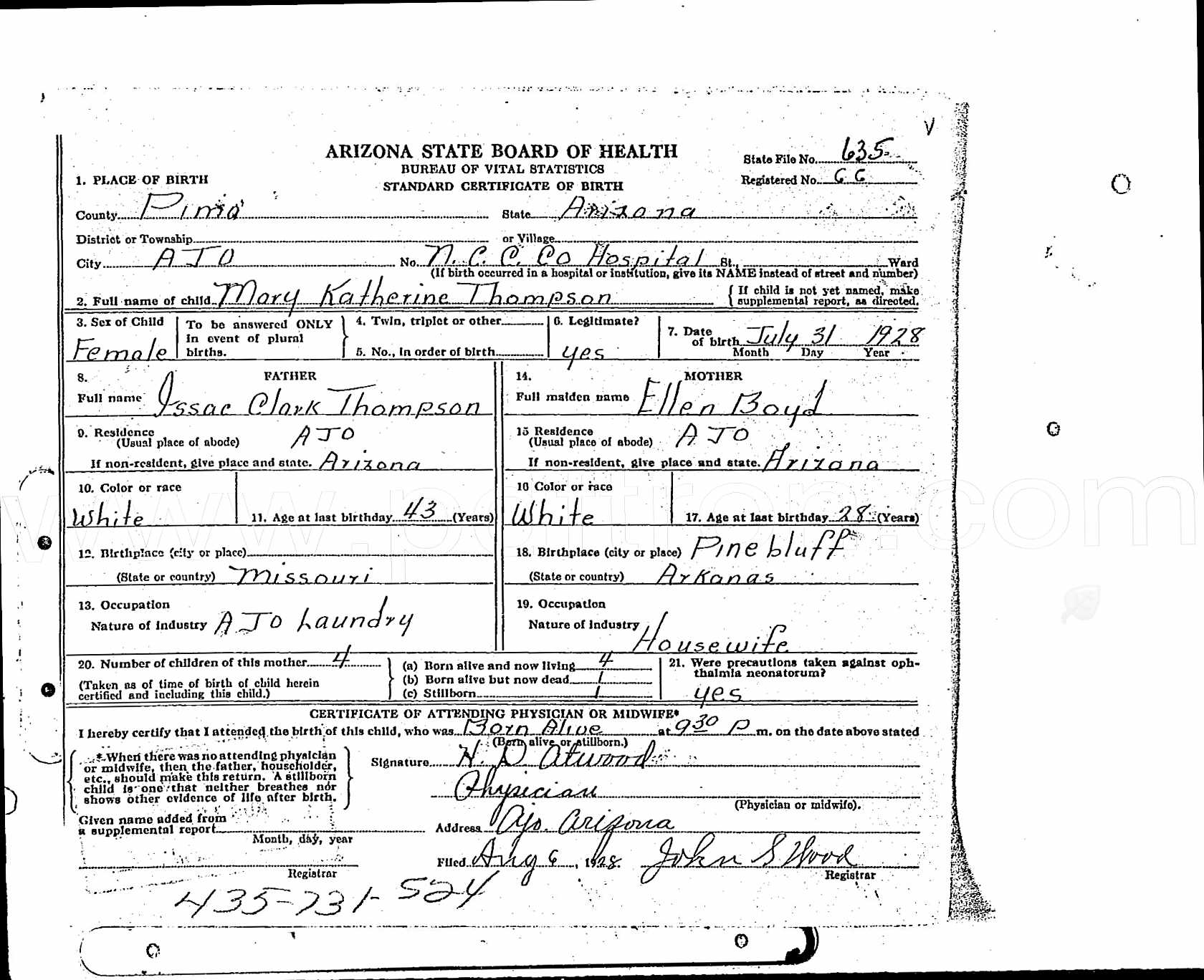
Thompson
(Ancestry.com.
Arizona, Birth Records,
1880-1935 [database
on-line]. Provo, UT,
USA: Ancestry.com
Operations, Inc., 2015.
Original data:
Arizona Department
of Health Services.
Arizona Birth Records.)
Iowa
Source: Ancestry.com. Iowa, Delayed Birth Records, 1856-1940 [database on-line]. Lehi, UT, USA: Ancestry.com Operations, Inc., 2017. Original data: Iowa Delayed Birth Records, 1856-1940. State Historical Society of Iowa, Des Moines, Iowa.
Hawaii
Source: Office of Hawaiian Affairs; Honolulu, HI, USA; Birth, Marriage, and Death Records. Ancestry.com. Hawaii, Birth Certificates and Indexes, 1841-1944 [database on-line]. Lehi, UT, USA: Ancestry.com Operations, Inc., 2018.
Ohio Births and Christenings Index
Name:
Bertha A. Brown
Gender: Female
Race:
White
Birth Date: 13 Jan 1878
Birth Place: Washington, Henry, Ohio
Father:
Alva P. Brown
Mother: Martha J.
Ennes
FHL Film Number: 423626
Source: Ancestry.com. Ohio, Births and Christenings Index, 1774-1973
[database on-line]. Provo, UT, USA: Ancestry.com Operations, Inc.,
2011.
Original data: "Ohio Births and Christenings, 1821-1962." Index.
FamilySearch, Salt Lake City, Utah, 2009, 2011. Index entries derived
from digital copies of original and compiled records.
Iowa Births and Christenings Index
Name:
Harold Silker
Birth Date: 10 Jan 1909
Birth Place: Waterloo, Blackhawk, Iowa
Father:
Harley Silker
Mother: Viola Stevens
FHL Film Number: 1034314
Source: Ancestry.com. Iowa, Births and Christenings Index, 1800-1999
[database on-line]. Provo, UT, USA: Ancestry.com Operations, Inc.,
2011.
Original data: "Iowa Births and Christenings, 1830–1950." Index.
FamilySearch, Salt Lake City, Utah, 2009, 2010. Index entries derived
from digital copies of original and compiled records.
Arizona Select Births and Christenings
Name:
Ruth Frances Meyers
Gender: Female
Birth Date: 21 Jul 1913
Birth Place: Phoenix, Maricopa, Arizona
Father: Melvin
R. Meyers
Mother: Nellie M. Strouse
FHL Film Number: 2135128
Source: Ancestry.com. Arizona, Select Births and Christenings,
1909-1917 [database on-line]. Provo, UT, USA: Ancestry.com Operations,
Inc, 2014. Original data: Arizona, Births and Christenings, 1909-1917.
Salt Lake City, Utah: FamilySearch, 2013.
California Birth Index
Name: Lloyd A King
Birth Date: 25 Mar 1910
Gender: Male
Mother's Maiden Name: Schuera
Birth County: Alameda
Name: Ronald Lewis Dorato
Birth Date: 11 Jun 1932
Gender: Male
Mother's Maiden Name: Boyd
Birth County: Alameda
Source: Ancestry.com. California Birth Index, 1905-1995 [database
on-line]. Provo, UT, USA: Ancestry.com Operations Inc, 2005. Original
data: State of California. California Birth Index, 1905-1995.
Sacramento, CA, USA: State of California Department of Health
Services, Center for Health Statistics.
Images of the marriage certificates are shown below as thumbnails. Click on each of the thumbnails to view a larger version of the certificates in another tab.
Arizona
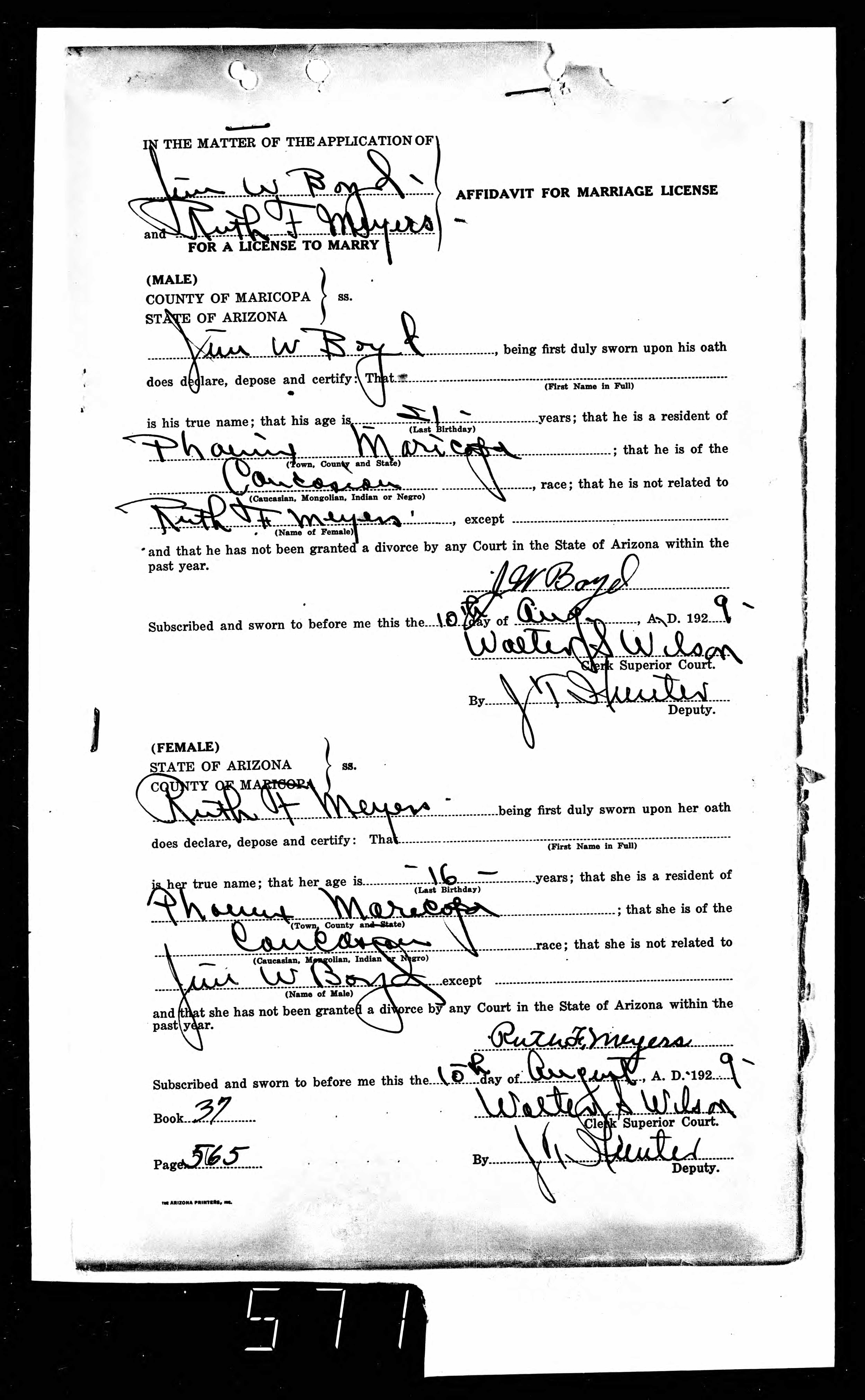
Jim W. Boyd and
Ruth F. Meyers,
10 August 1929
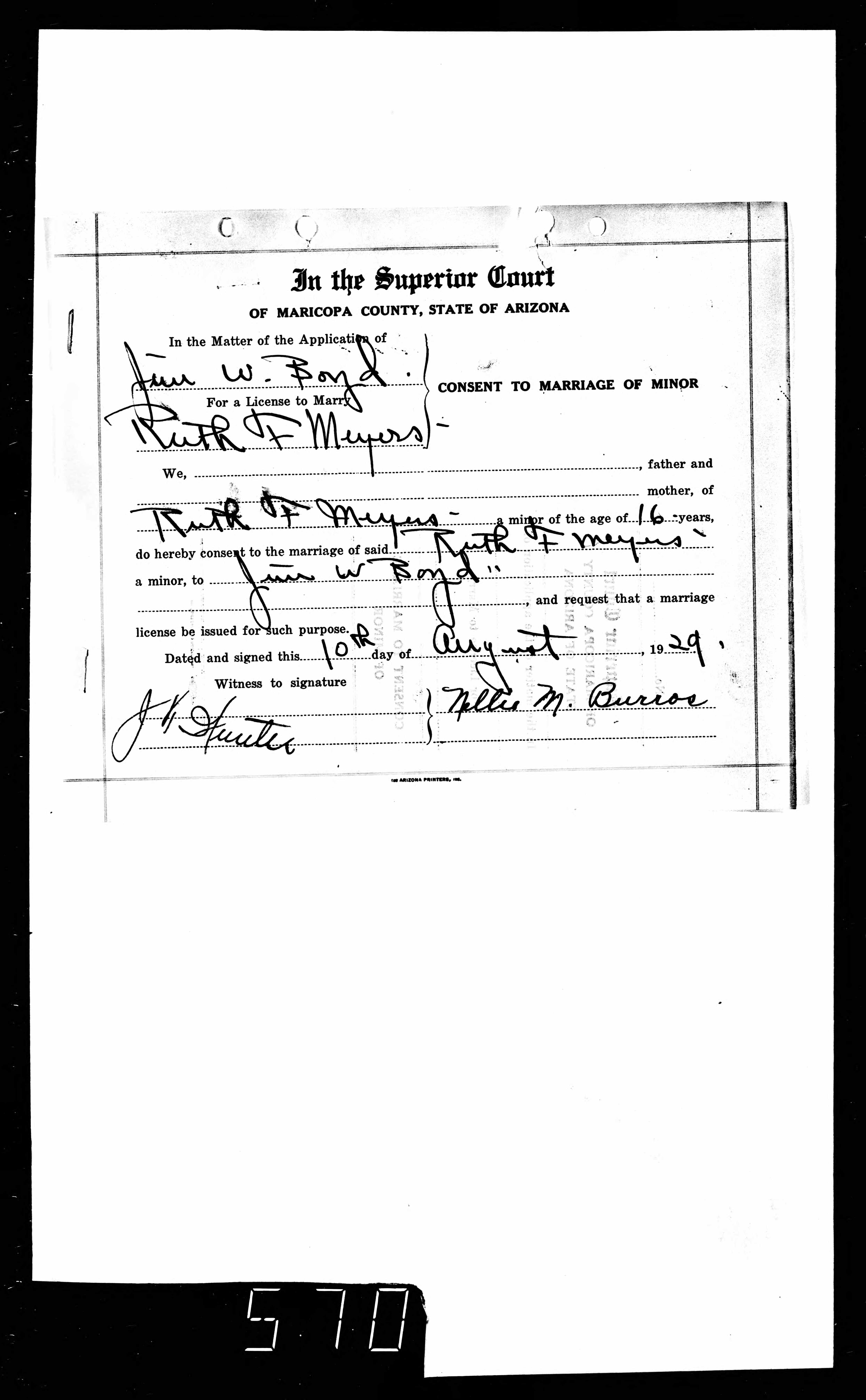
marriage to minor,
Jim W. Boyd and
Ruth F. Meyers,
10 August 1929
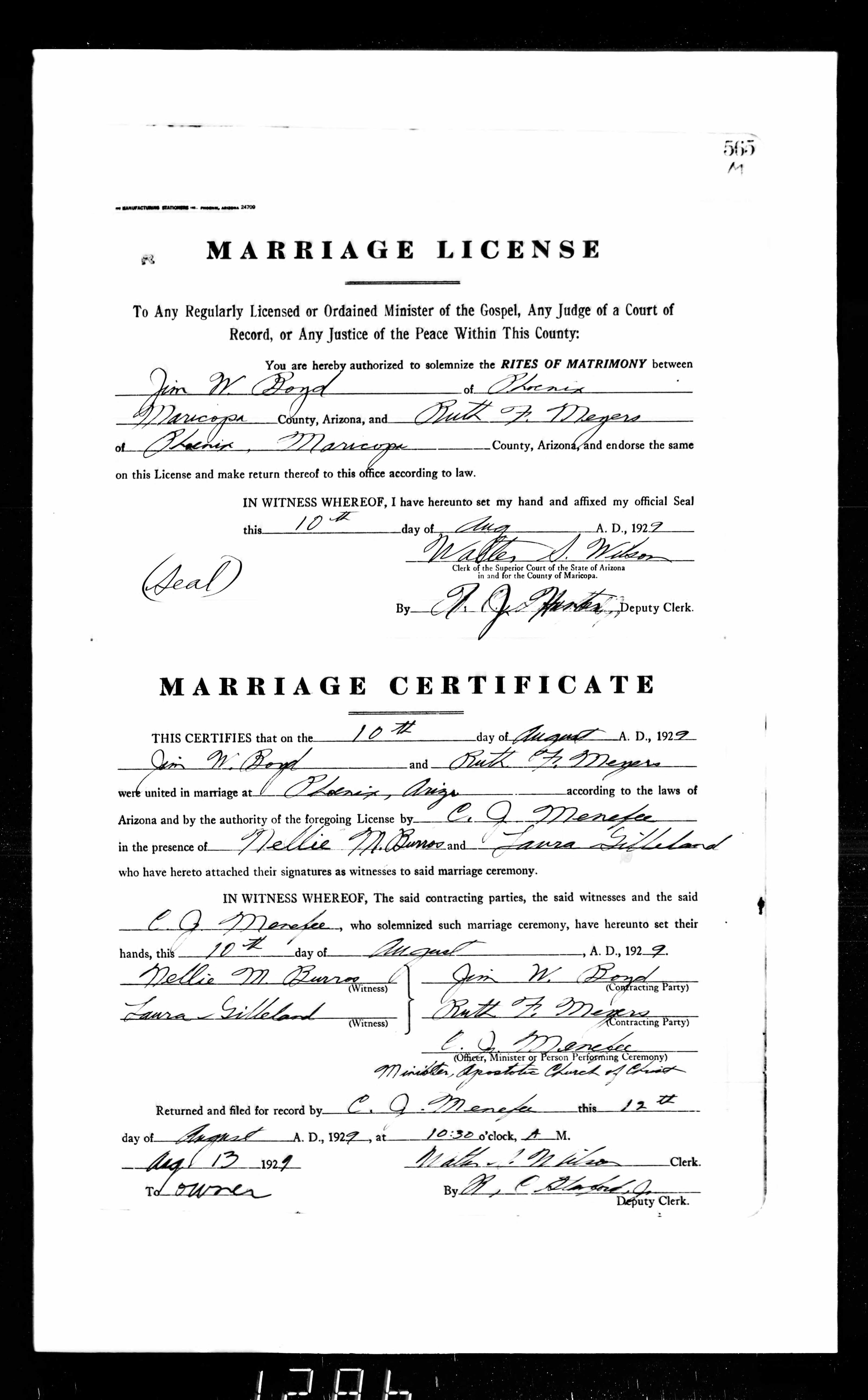
certificate,
Jim W. Boyd and
Ruth F. Meyers,
12 August 1929
Source: Ancestry.com. Arizona, County Marriage Records, 1865-1972 [database on-line]. Lehi, UT, USA: Ancestry.com Operations, Inc., 2016. Original data: County Marriage Records. Arizona History and Archives Division, Phoenix, Arizona.
California
Source: Ancestry.com. California, Marriage Records from Select Counties, 1850-1941 [database on-line]. Provo, UT, USA: Ancestry.com Operations, Inc., 2014. Original data: Marriage records, select counties and years. California State Archives, Sacramento, California.
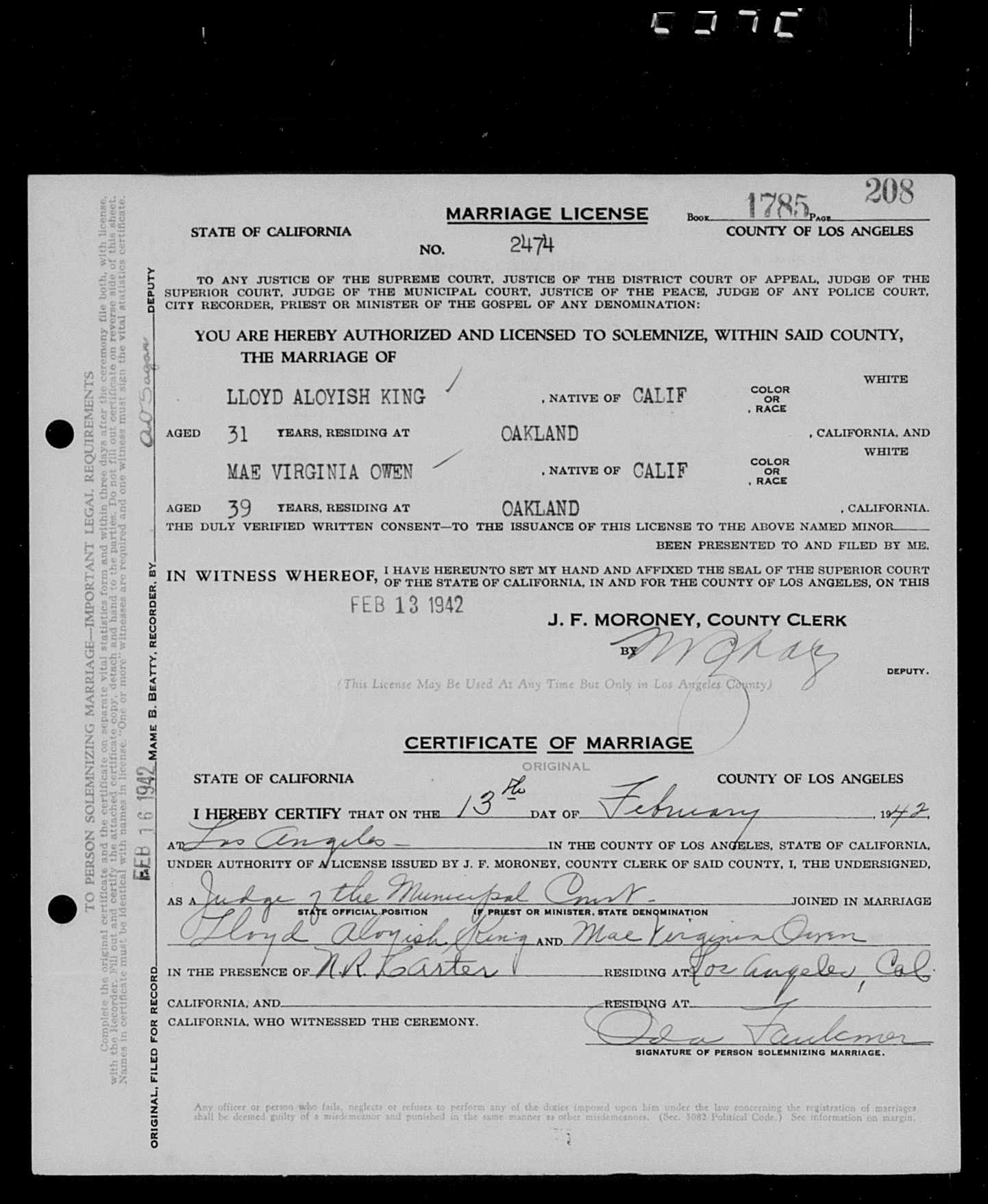
certificate,
Lloyd Aloyish King
and Mae V. Owen,
13 February 1942
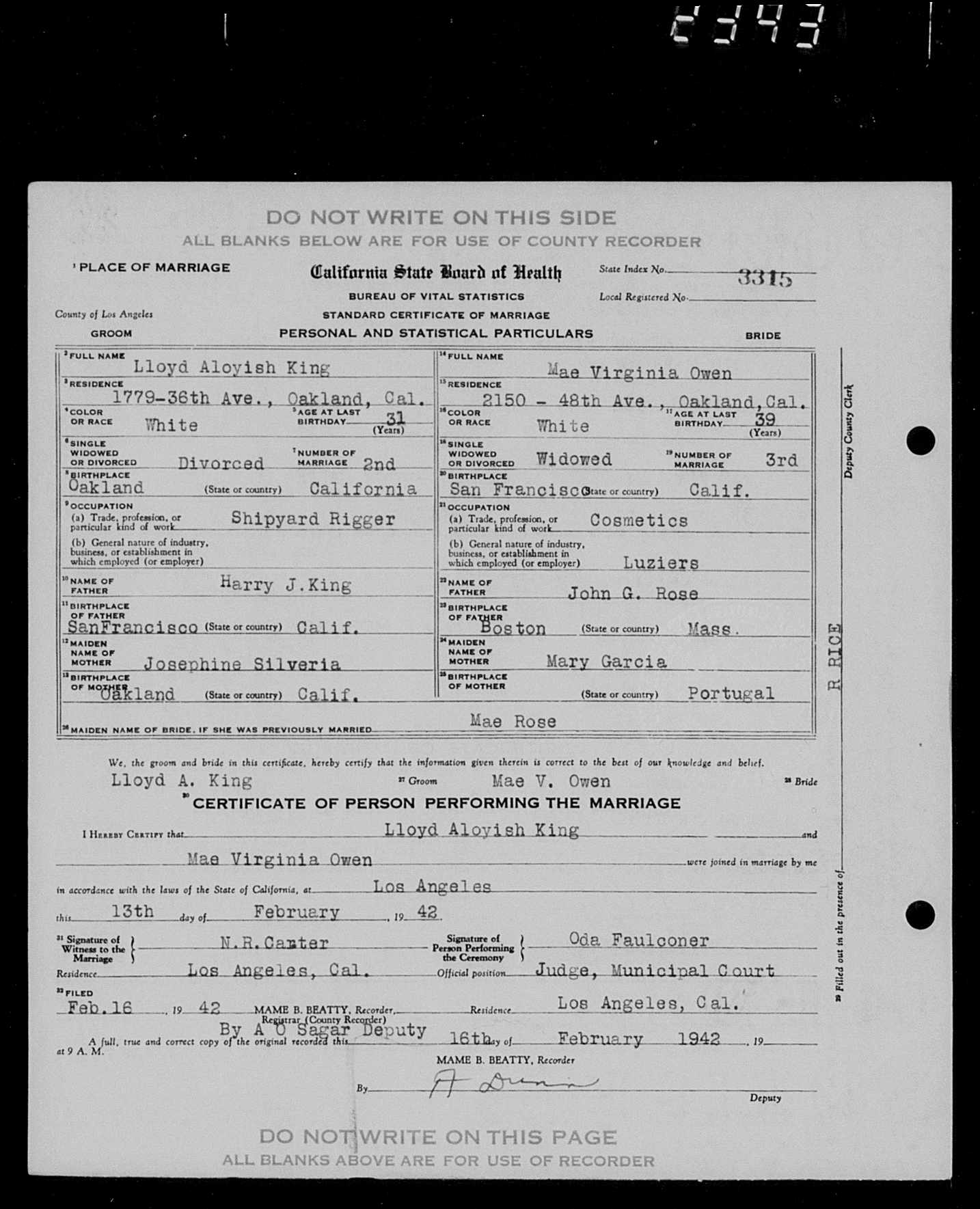
Lloyd Aloyish King
and Mae Virginia
Owen,
13 February 1942
Source: "California, County Marriages, 1850-1952," database with images, FamilySearch (https://familysearch.org/ark:/61903/1:1:K8VG-PXB : 8 December 2017), Mary Garcia in entry for Lloyd Aloyish King and Mae Virginia Owen, 13 Feb 1942; citing Los Angeles, California, United States, county courthouses, California; FHL microfilm 2,114,740.
Washington
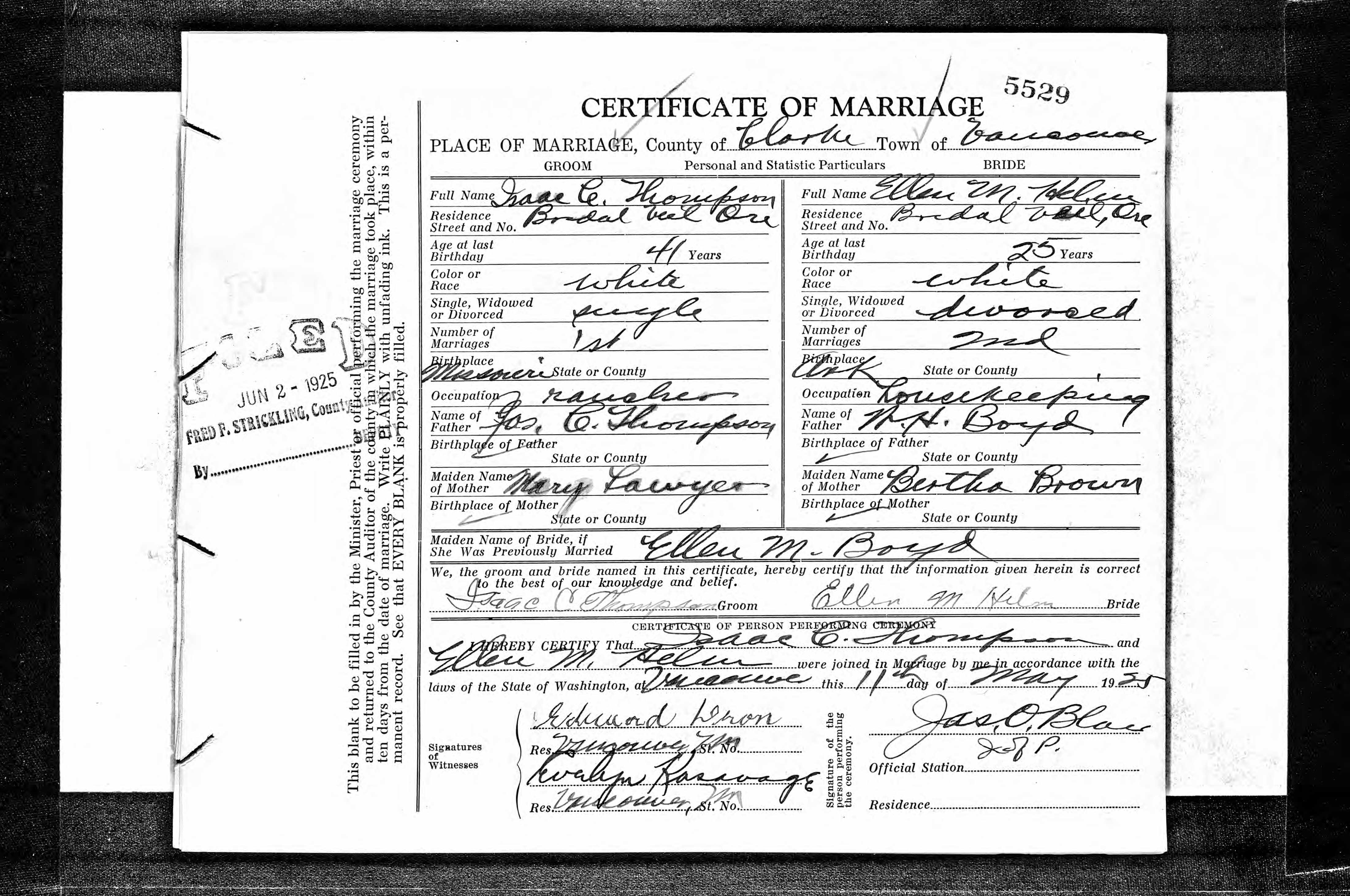
and Ellen M. Helm,
11 May 1925,
Page 1,
Washington State
Archives;
Olympia, Washington;
Marriage Certificates;
Collection Title:
Washington Marriage
Records, 1854-2013.
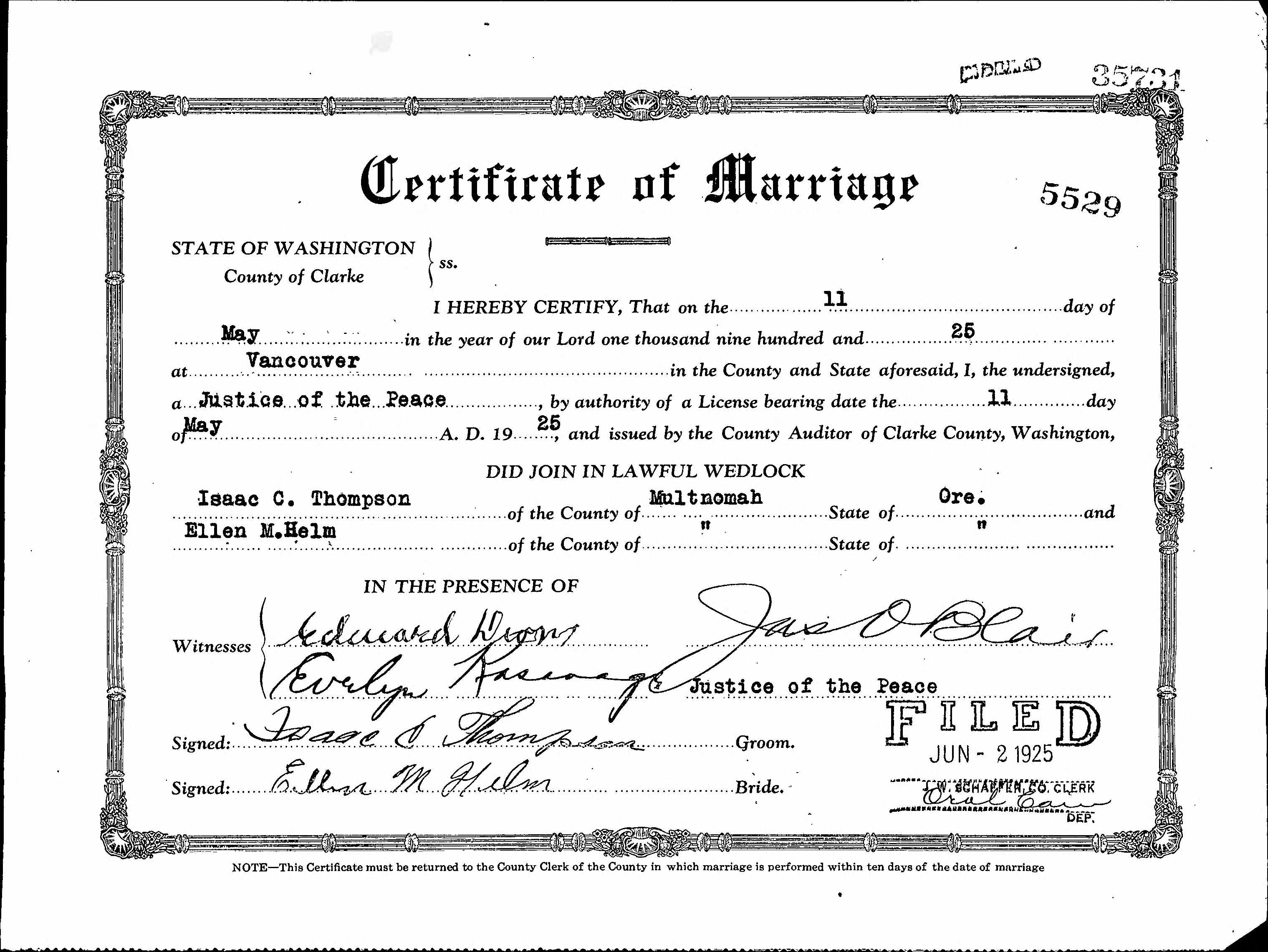
and Ellen M. Helm,
11 May 1925,
Page 2,
Washington State
Archives;
Olympia, Washington;
Collection Title:
Washington Marriage
Records, 1854-2013;
Reference Number:
swclkmc35731.
Source: Ancestry.com. Washington, Marriage Records, 1854-2013 [database on-line]. Provo, UT, USA: Ancestry.com Operations, Inc., 2012. Original data: Washington State Archives. Olympia, Washington: Washington State Archives.
South Carolina
Source for above: Marriage Register, Dec 1944-Mar 1946, page 280 (image 858), found in South Carolina Probate Court (Marion County), Marion County, South Carolina marriage registers continued by bound marriage licenses, 1911-1952, Salt Lake City, Utah : Filmed by the Genealogical Society of Utah, 2001, FHL Microfilm 2229373, https://www.familysearch.org/search/catalog/1005736?availability=Family%20History%20Library
Misc.
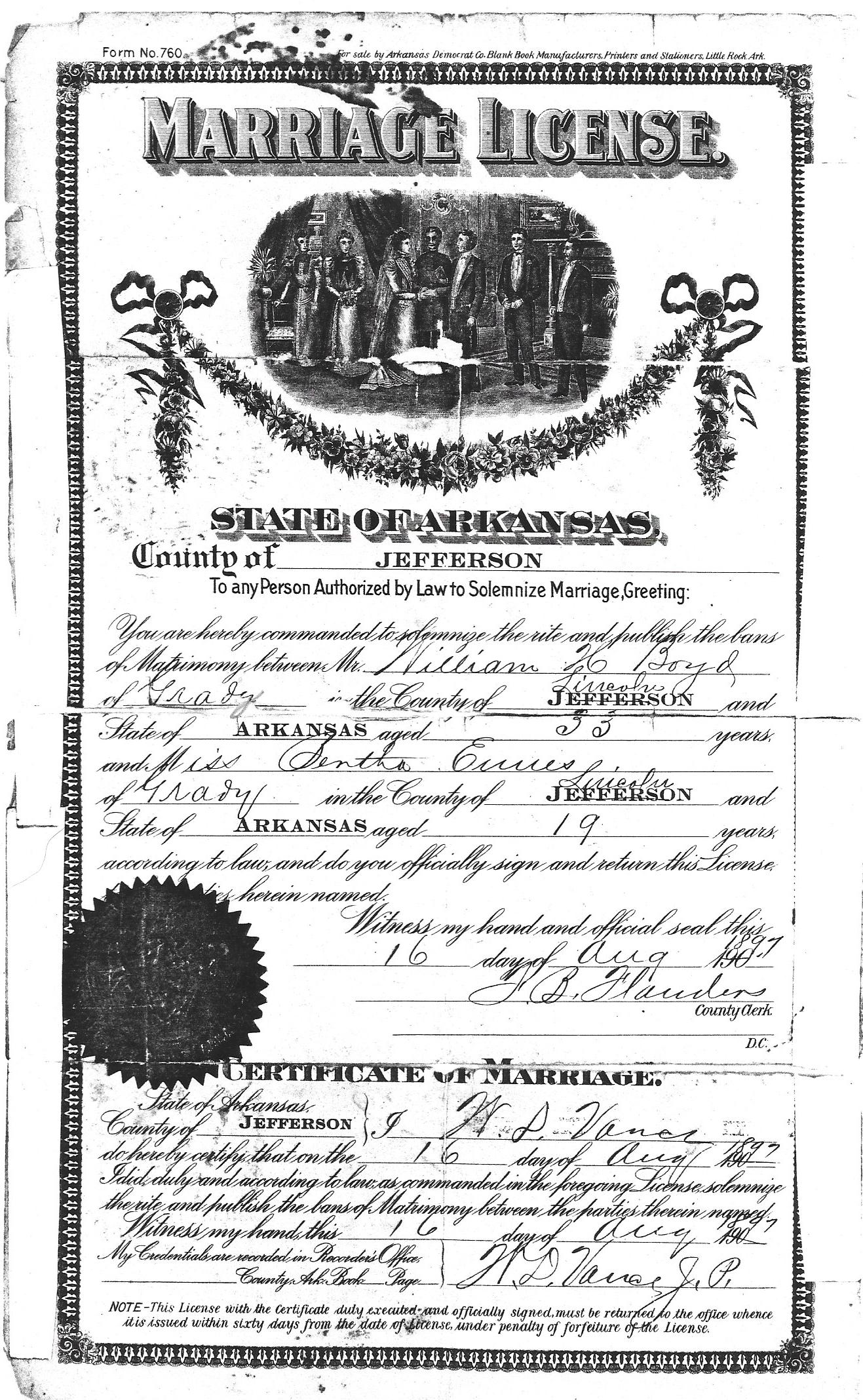
William H. Boyd
and Bertha Ennes,
16 Aug 1897,
Arkansas
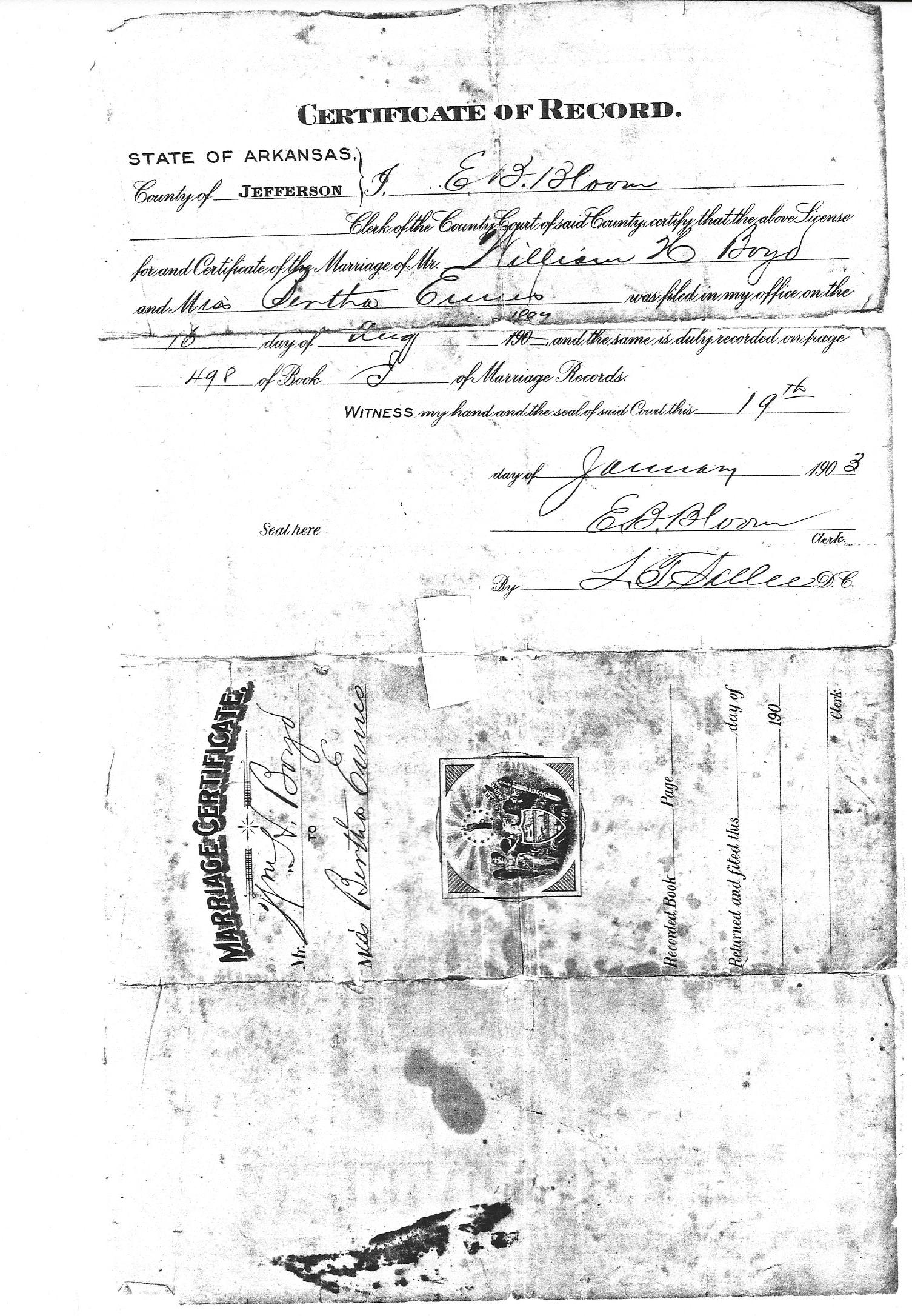
William H. Boyd
and Bertha Ennes,
16 Aug 1897,
Arkansas
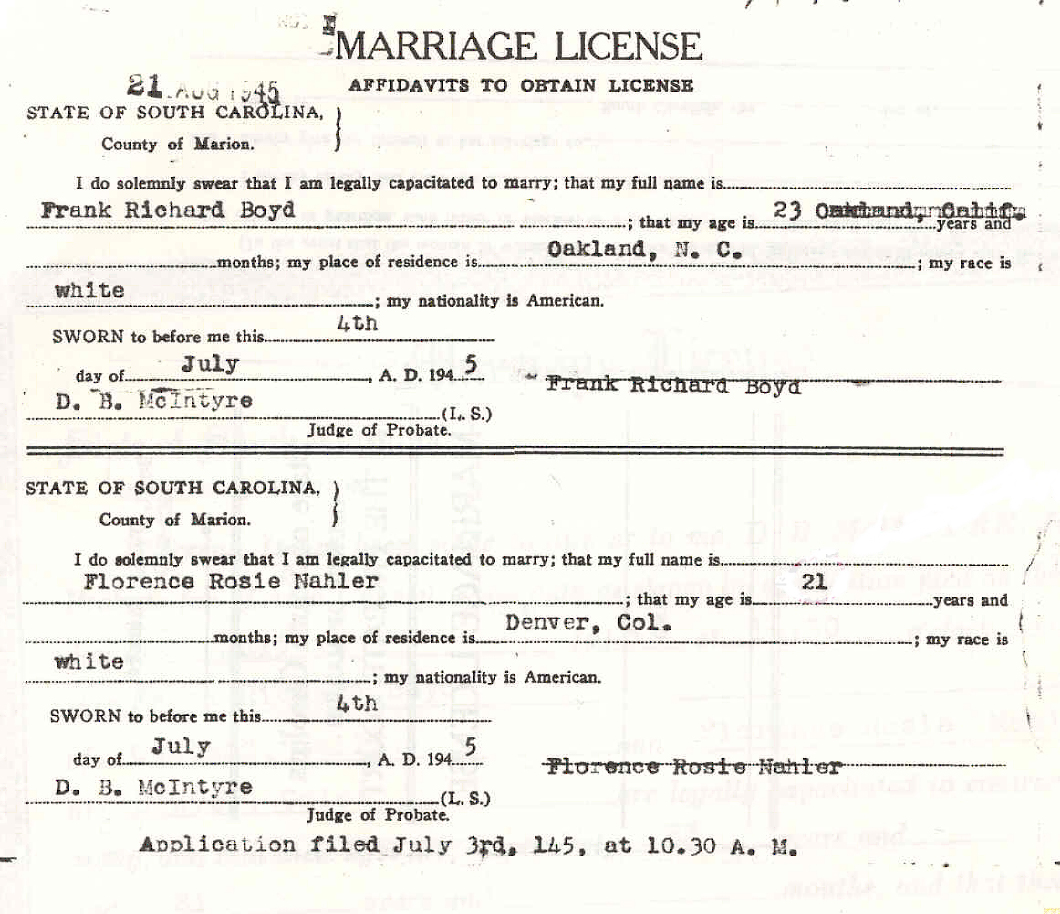
license,
Frank Richard Boyd
and Florence Rosie
Boyd,
4 July 1945,
South Carolina
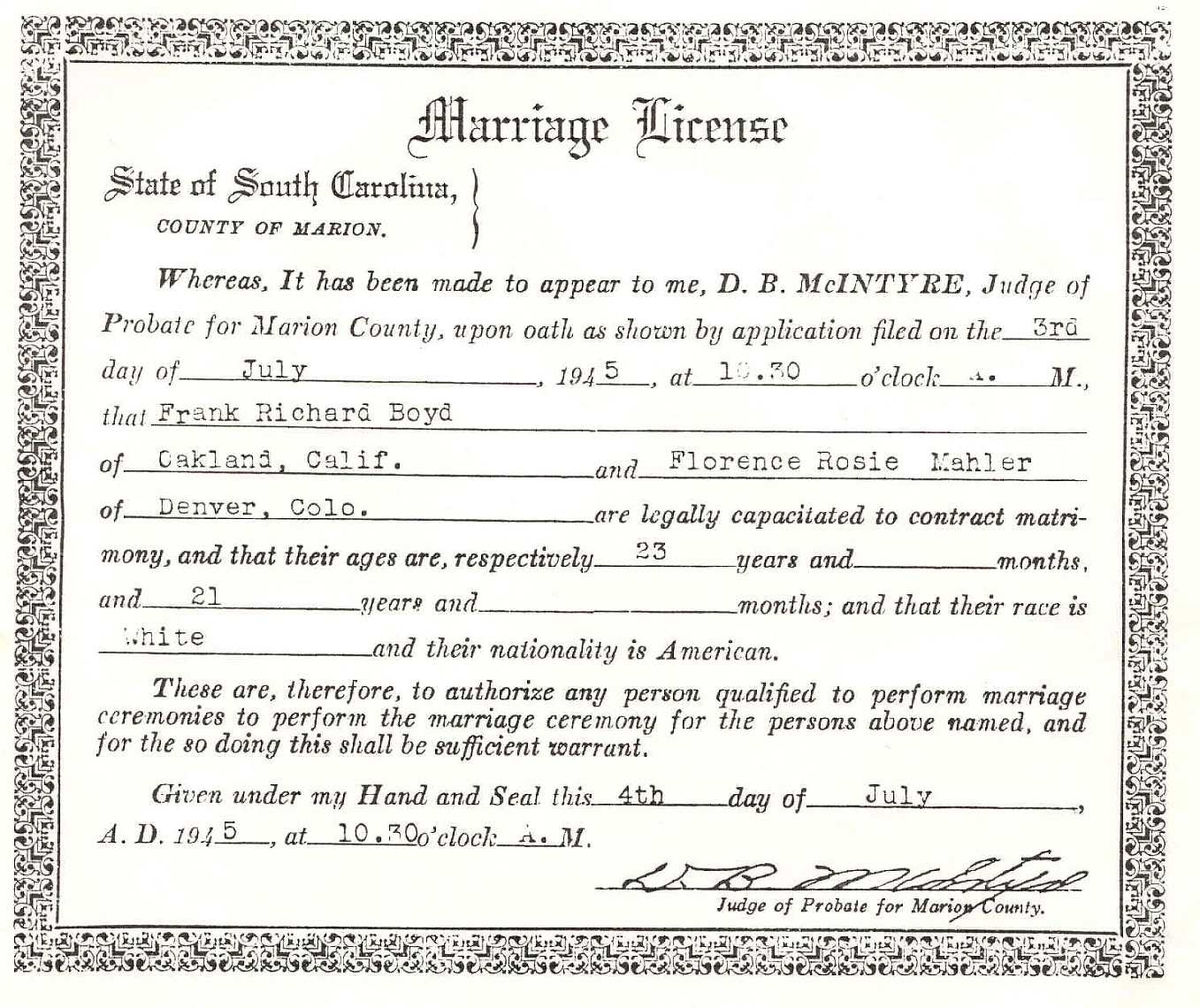
Frank Richard Boyd
and Florence Rosie
Boyd,
4 July 1945,
South Carolina
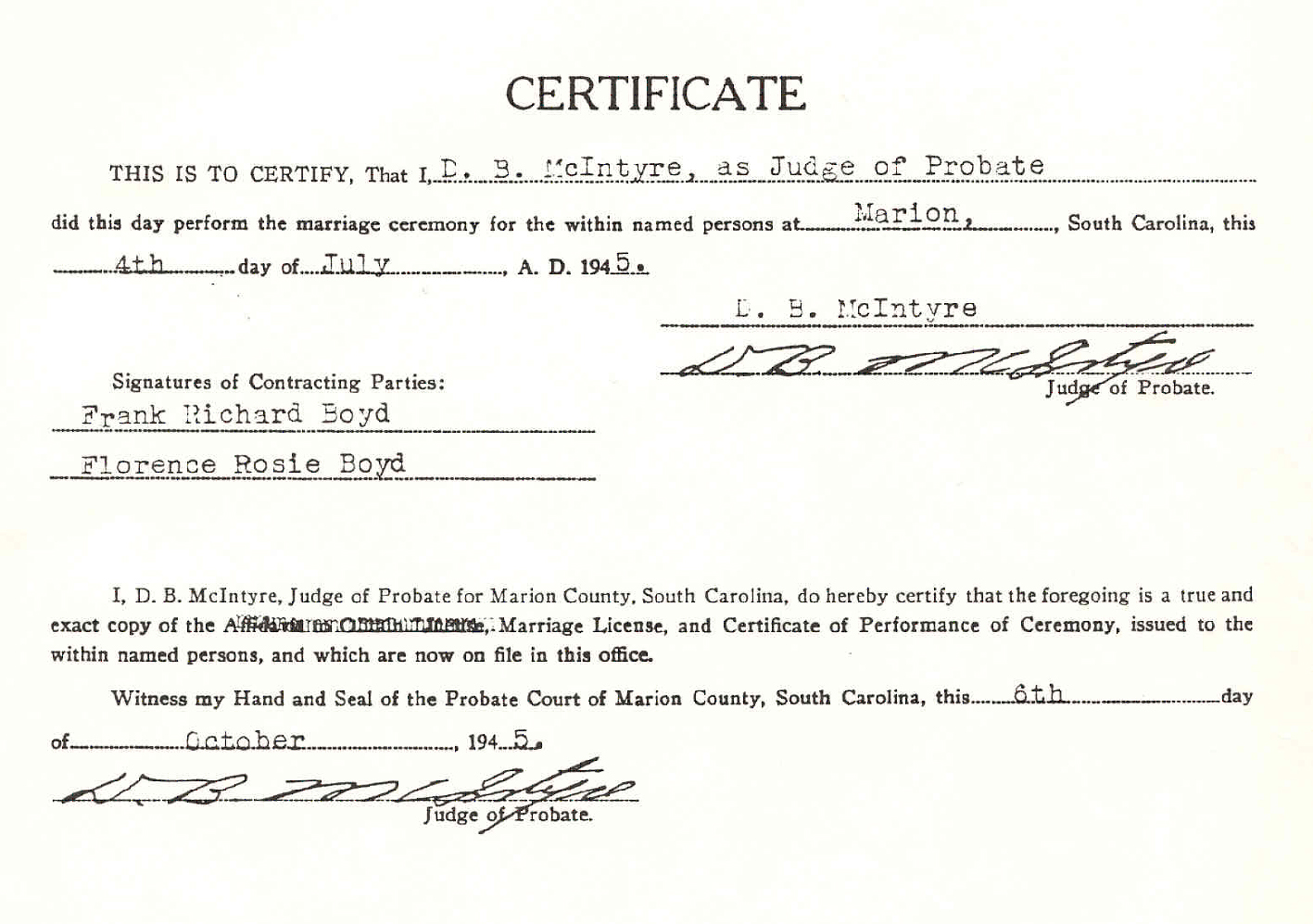
Frank Richard Boyd
and Florence Rosie
Boyd,
4 July 1945,
South Carolina
Source: Copy of marriage licenses and certificates, in possession of Darryl W. Boyd.
German Methodist Church, Dunkirk, New York
| Name | Date | Residence | Spouse | |
| Richardson, Wm Henry | 05/09/90 | Dunkirk, NY | Maria Soucier | At the Parsonage |
| Soucier, Maria Agnes | 05/09/90 | Dunkirk, NY | William H Richardson |
Source: "Marriages recorded at German Methodist Church in Dunkirk,
NY," Chautauqua Genealogist, Vol. 15, No. 2, May 1992.
Name:
RICHARDSON, WILLIAM HENRY [26]
Event:
M
Date:
05/09/90
Residence:
DUNKIRK, NY
Church/Clergy: G BOBILIN
Other Information: TO MARIA SOUCIER 20 AT THE PARSONAGE
Witnesses:
JOSEPH SOUCIER, JULIA SOUCIER
Barris, Lois and Norwood, The German Methodist Church of Dunkirk 1855
- 1909, http://www.co.chautauqua.ny.us/DocumentCenter/Home/View/5214,
retrieved 1 Oct 2017.
Arkansas County Marriages Index
Name:
Ellen Boyd
Gender:
Female
Age:
17
Birth
Year:
abt 1899
Residence:
Camp Fifteen, Grant, Arkansas
Spouse's Name: F B Helm
Spouse's Gender: Male
Spouse's
Age: 21
Spouse's Residence: Carlisle, Lonoke, Arkansas
Marriage Date: 26 Dec 1916
Marriage License Date: 26 Dec 1916
Marriage County: Grant
Event
Type:
Marriage
FHL Film Number: 980150
Source: Ancestry.com. Arkansas, County Marriages Index, 1837-1957
[database on-line]. Provo, UT, USA: Ancestry.com Operations, Inc.,
2011.
Original data: "Arkansas County Marriages, 1838–1957." Index.
FamilySearch, Salt Lake City, Utah, 2009, 2011. "Arkansas County
Marriages, 1838–1957," database, FamilySearch; from Arkansas Courts of
Common Pleas and County Clerks. Digital images of originals housed at
various county courthouses in the State of Arkansas. Marriage records.
California Marriage Index
Name:
John H Boyd
Gender:
Male
Estimated birth year: abt 1906
Age:
46
Marriage
Date:
8 Aug 1952
Marriage
Place:
Alameda, California, USA
Spouse:
Dolores M Deltessandr
Spouse
Age:
24
Name:
John H Boyd
Gender:
Male
Estimated birth year: abt 1906
Age:
46
Marriage
Date:
8 Aug 1952
Marriage
Place:
Alameda, California, USA
Spouse:
Dolores M Frates
Spouse
Age:
24
Source: Ancestry.com. California, Marriage Index, 1949-1959 [database
on-line]. Provo, UT, USA: Ancestry.com Operations, Inc., 2013.
Original data: California Department of Health and Welfare. California
Vital Records—Vitalsearch (www.vitalsearch-worldwide.com). The
Vitalsearch Company Worldwide, Inc., Pleasanton, California.
Iowa Marriage Records
Name Harold Silker
Gender Male
Race White
Age 29
Birth Year abt 1908
Birth Place Waterloo, Iowa
Residence Place Marion, Iowa
Marriage Date 31 Jul 1937
Marriage Place Cedar Rapids, Linn, Iowa, USA
Father H C Silker
Mother Viola Stephens
Spouse Rosella Michel
Gender Female
Race White
Age 23
Birth Year abt 1914
Birth Place Springbrook. Iowa
Residence Place Cedar Rapids, Iowa
Marriage Date 31 Jul 1937
Marriage Place Cedar Rapids, Linn, Iowa, USA
Father Joseph Michel
Mother Mary Brown
Spouse Harold Silker
Source: Ancestry.com. Iowa, Marriage Records, 1880-1937 [database
on-line]. Provo, UT, USA: Ancestry.com Operations, Inc., 2014.
Original data: Iowa Department of Public Health. Iowa Marriage
Records, 1880–1922. Textual Records. State Historical Society of Iowa,
Des Moines, Iowa.
Images of the death certificates are shown below as thumbnails. Click on each of the thumbnails to view a larger version of the certificates in another tab.
California
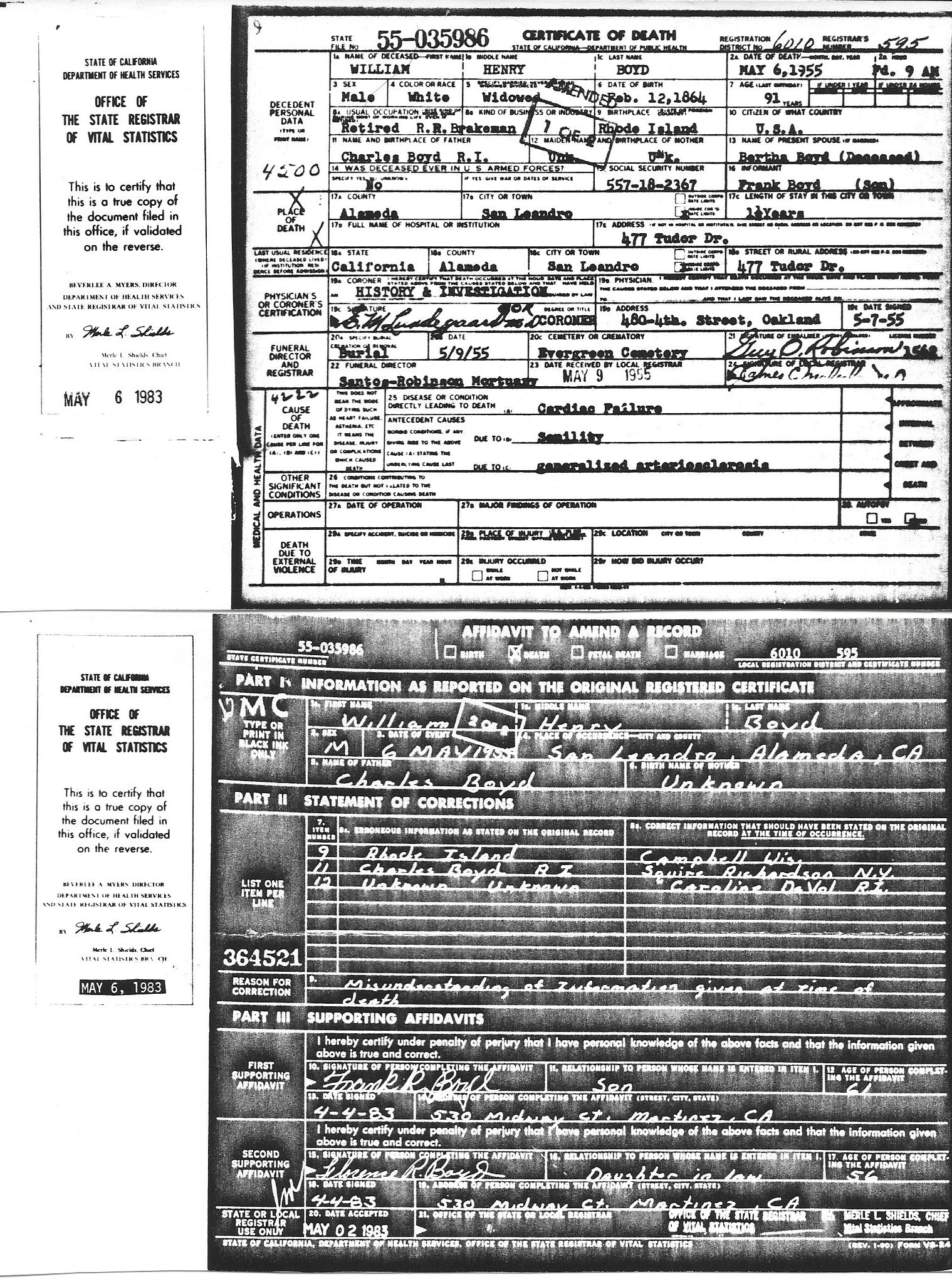
(certificate with
amendment),
6 May 1955
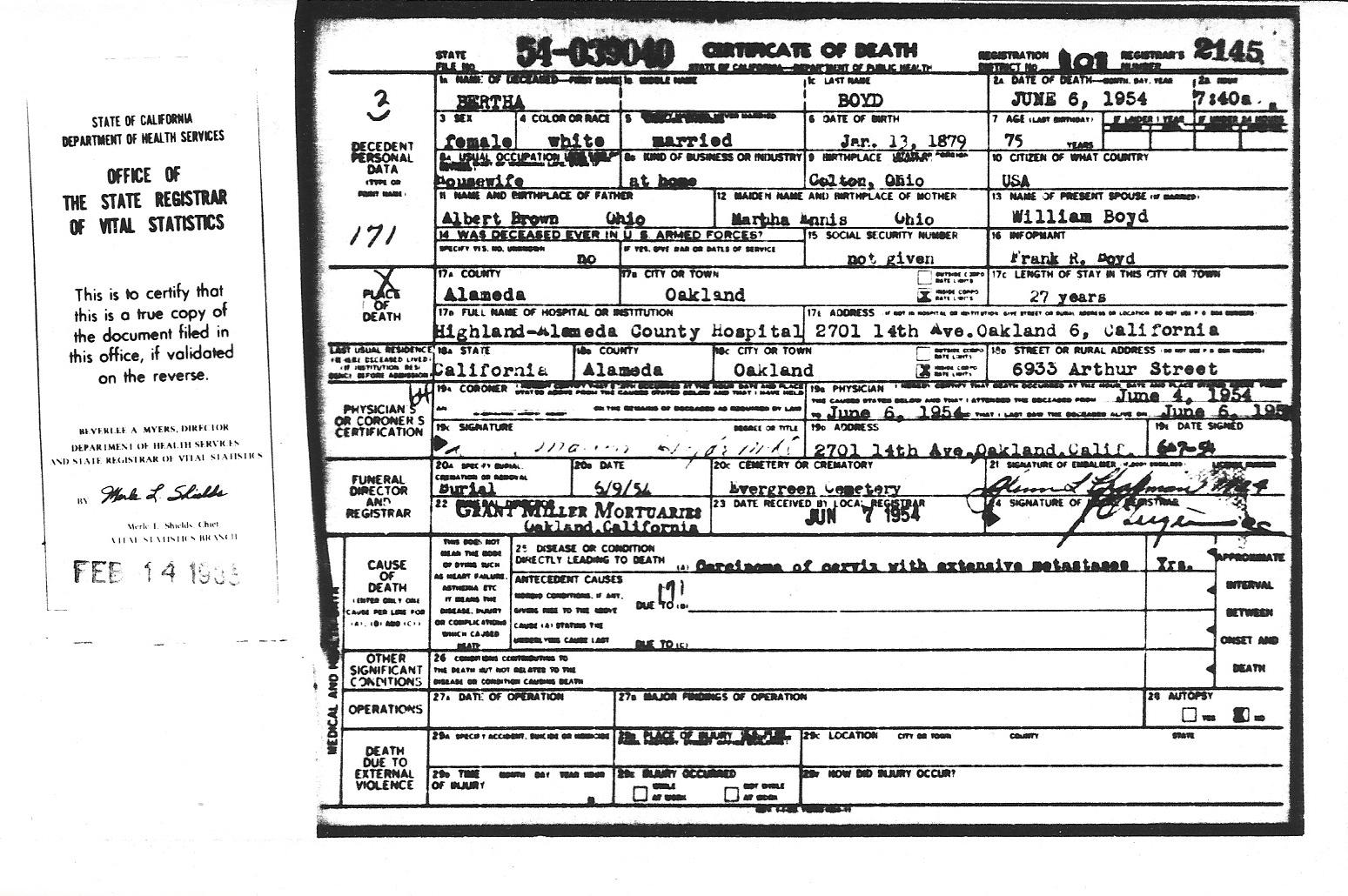
6 June 1954
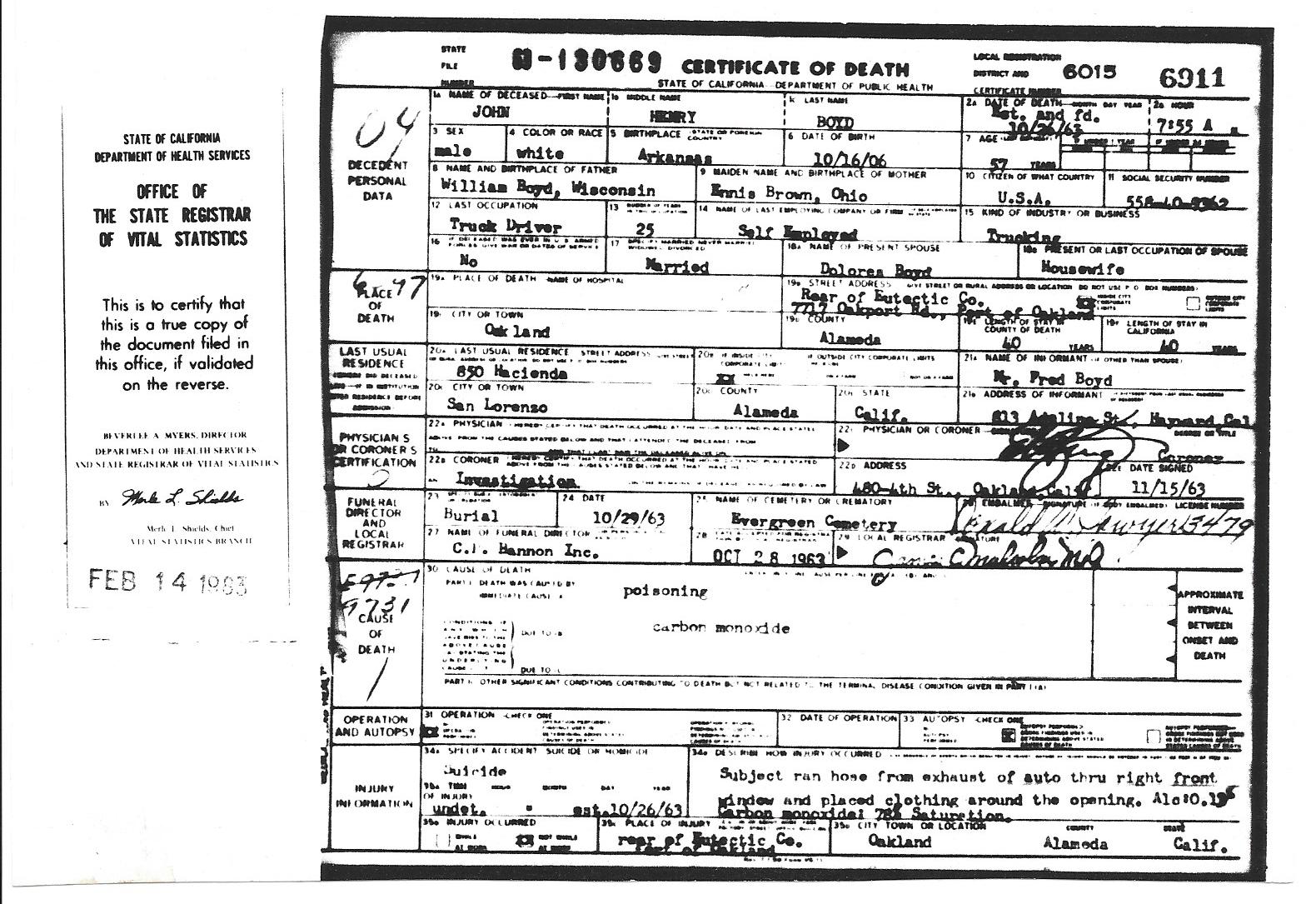
estimated 26
October 1963
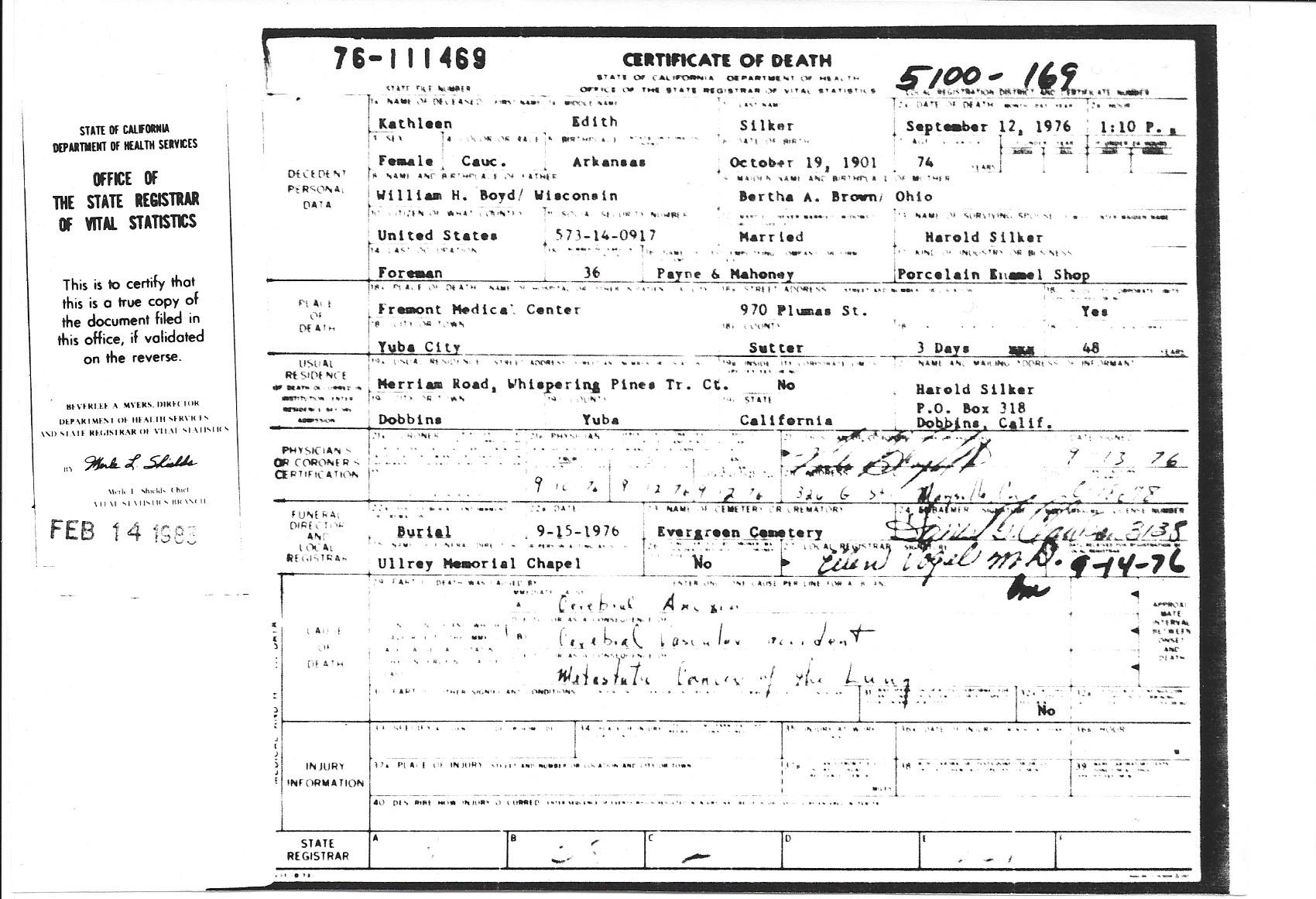
Silker,
12 September 1976
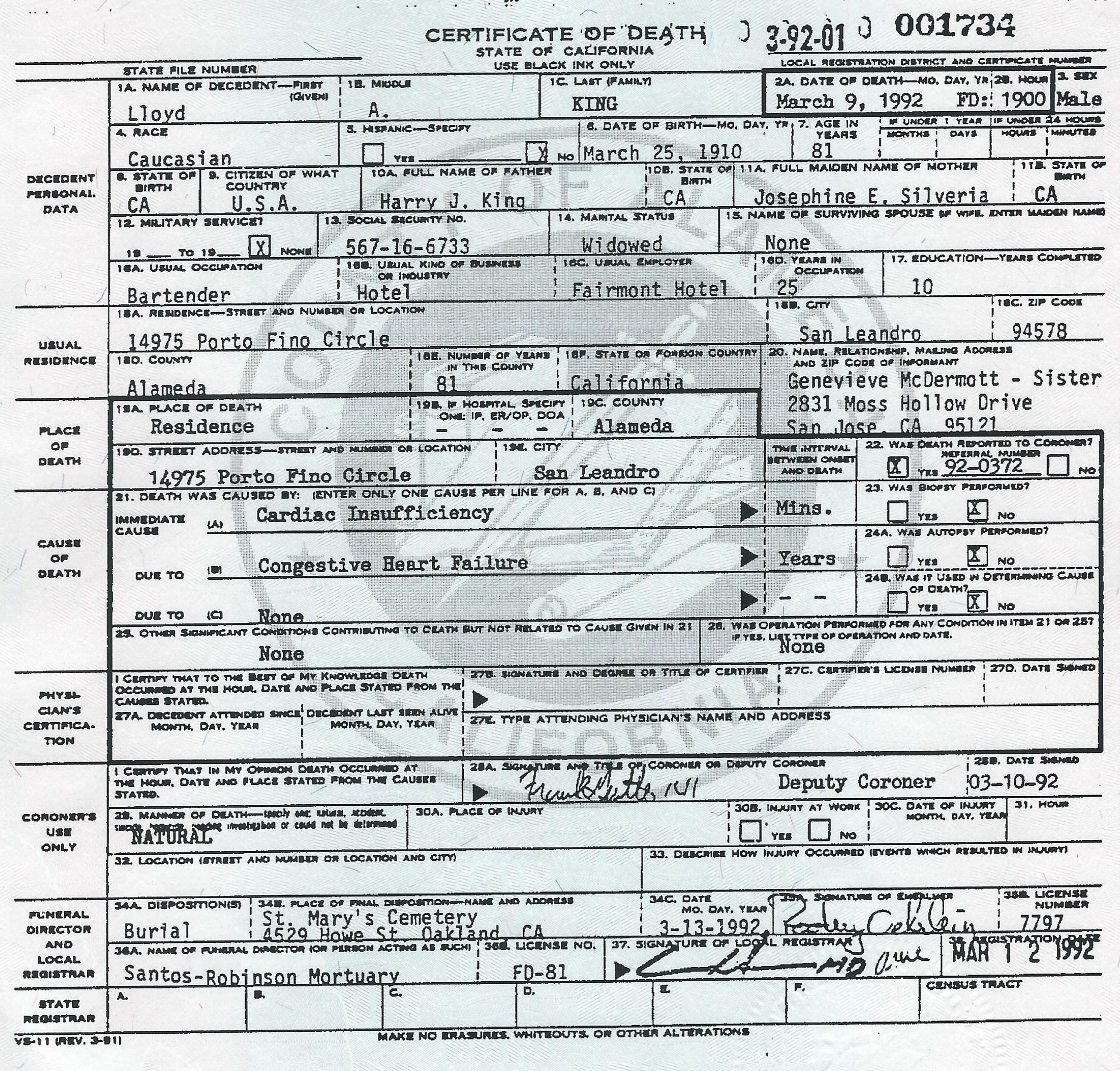
9 March 1992
Arkansas
Source: Arkansas Department of Vital Records; Little Rock, Arkansas; Death Certificates; Year: 1925; Roll: 5. Ancestry.com. Arkansas, Death Certificates, 1914-1969 [database on-line]. Lehi, UT, USA: Ancestry.com Operations, Inc., 2019.
Arizona
California Death Index
Name:
William Henry Boyd
Social Security #: 557182367
Gender:
Male
Birth
Date:
12 Feb 1864
Birth
Place:
Rhode Island
Death
Date:
6 May 1955
Death
Place:
Alameda
Father's Surname: Boyd
Name:
Bertha Boyd
[Bertha Brown]
Gender:
Female
Birth
Date:
13 Jan 1879
Birth
Place:
Ohio
Death
Date: 6
Jun 1954
Death Place:
Alameda
Mother's Maiden Name: Ennis
Father's Surname: Brown
Name:
Harold Isaac Silker
Social Security #: 485039675
Gender:
Male
Birth
Date:
10 Jan 1909
Birth
Place:
Iowa
Death Date: 21
Mar 1991
Death Place: Yuba
Mother's Maiden Name: Stevens
Name:
John H Boyd
Social Security #: 558409362
Gender:
Male
Birth
Date:
16 Oct 1906
Birth
Place:
Arkansas
Death Date: 26
Oct 1963
Death Place: Alameda
Mother's Maiden Name: Brown
Name
Antonette Boyd
Social Security # 545344217
Gender
Female
Birth
Date
28 Feb 1913
Birth
Place
Other Country
Death
Date
23 Aug 1944
Death
Place
Contra Costa
Mother's Maiden Name Guerrero
Father's Surname Garcia
Name:
James William Boyd
Social Security #: 573160468
Gender:
Male
Birth
Date:
23 Aug 1907
Birth
Place:
Arkansas
Death
Date: 24
Sep 1985
Death Place:
Yuba
Mother's Maiden Name: Ennes
Name:
Ruth Francis Schader
[Ruth Francis Meyers]
Social Security #: 565056434
Gender:
Female
Birth
Date:
21 Jul 1913
Birth
Place:
Arkansas
Death Date: 24
Jan 1993
Death Place: Orange
Mother's Maiden Name: Strouse
Father's Surname: Meyers
Name:
Marie Fettig
[Marie Boyd]
Social Security #: 565078449
Gender:
Female
Birth
Date:
14 Oct 1909
Birth
Place:
Arkansas
Death Date: 22
May 1994
Death Place: Riverside
Mother's Maiden Name: Brown
Father's Surname: Boyd
Name:
Joseph Phillip Fettig
Social Security #: 556180527
Gender:
Male
Birth
Date:
16 Sep 1912
Birth
Place:
North Dakota
Death
Date: 3
Sep 1983
Death Place:
Yuba
Name: Lloyd A King
Social Security #: 567166733
Gender: Male
Birth Date: 25 Mar 1910
Birth Place: California
Death Date: 9 Mar 1992
Death Place: Alameda
Mother's Maiden Name: Silveria
Name:
Julia Earnestine Dorato
[Julia Earnestine Boyd]
Social Security #: 553303443
Gender:
Female
Birth
Date:
10 Feb 1912
Birth
Place:
Arkansas
Death Date: 8
Sep 1987
Death Place: Shasta
Father's Surname: Boyd
Name:
Dante Dorato
Social Security #: 700129860
Gender:
Male
Birth
Date:
28 Mar 1901
Birth
Place:
Other Country
Death Date: 21 Jan
1992
Death Place: Stanislaus
Name:
Ronald Louis Dorato
Social Security #: 561361304
Gender:
Male
Birth
Date:
11 Jun 1932
Birth
Place:
California
Death Date: 30 Apr 1985
Death Place: Alameda
Mother's Maiden Name: Boyd
Name:
Frank Richard Boyd
Social Security #: 547284392
Gender:
Male
Birth
Date:
5 May 1922
Birth
Place:
Arizona
Death Date: 8
Jun 1997
Death Place: Contra
Costa
Mother's Maiden Name: Brown
Source: Ancestry.com. California, Death Index, 1940-1997 [database
on-line]. Provo, UT, USA: Ancestry.com Operations Inc, 2000. Original
data: State of California. California Death Index, 1940-1997.
Sacramento, CA, USA: State of California Department of Health
Services, Center for Health Statistics.
Florida Death Index
Name:
Marie Ellen Cate
Race:
White
Age at Death: 80
Birth
Date:
14 Jan 1918
Death Date: 20
Apr 1998
Death Place: Duval,
Florida, United States
Source: Ancestry.com. Florida Death Index, 1877-1998 [database
on-line]. Provo, UT, USA: Ancestry.com Operations Inc, 2004. Original
data: State of Florida. Florida Death Index, 1877-1998. Florida:
Florida Department of Health, Office of Vital Records, 1998.
Ohio Deaths
Name:
Wally W Willis
Birth
Date:
1930
Gender:
Male
Race:
White
Residence Place: Piqua, Miami, Ohio, United States
Death Date: 2 Nov 1971
Hospital of Death: Piqua Mem Med Center - Closed
Death Place: Piqua, Miami, Ohio,
USA
Certificate:
086374
Age at Death: 41
Certifier:
Physician
Autopsy:
No Autopsy performed
Marital Status: Divorced
Source: Ancestry.com and Ohio Department of Health. Ohio, Deaths,
1908-1932, 1938-2007 [database on-line]. Provo, UT, USA: Ancestry.com
Operations Inc, 2010.
Images of newspaper articles are shown below as thumbnails. Click on each thumbnail to view a larger version of the article in another tab.
William Henry's 1888 Wisconsin Conviction
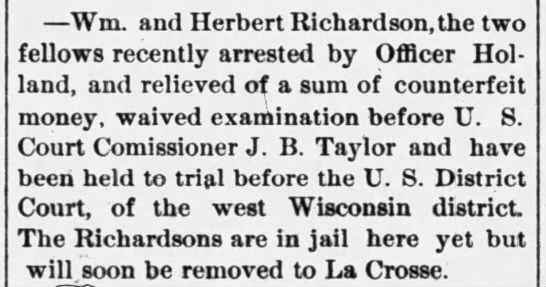
Herbert Richardson
waive examination,
Portage Daily
Register (Portage,
Wisconsin), 8 Aug
1888 (Wednesday),
page 3.
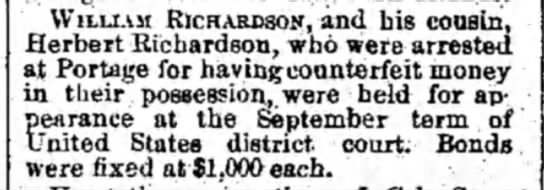
Herbert Richardson
held for September
court appearance,
The Weekly Wisconsin
(Milwaukee,
Wisconsin), 11 Aug
1888 (Saturday),
page 4.
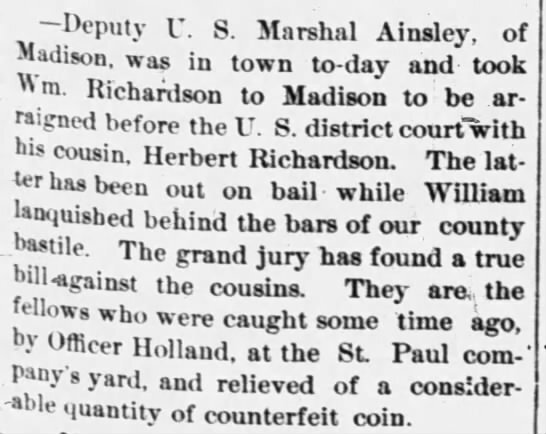
taken to Madison
to be arraigned,
Portage Daily
Register (Portage,
Wisconsin), 7 Sep
1888 (Friday),
page 3.
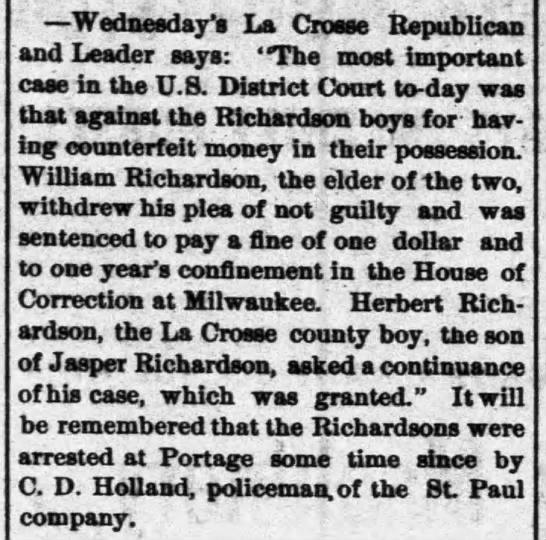
of William and
Herbert Richardson,
The Wisconsin State
Register (Portage,
Wisconsin), 22 Sep
1888 (Saturday),
page 3.
William Henry's 1893 New Mexico Conviction
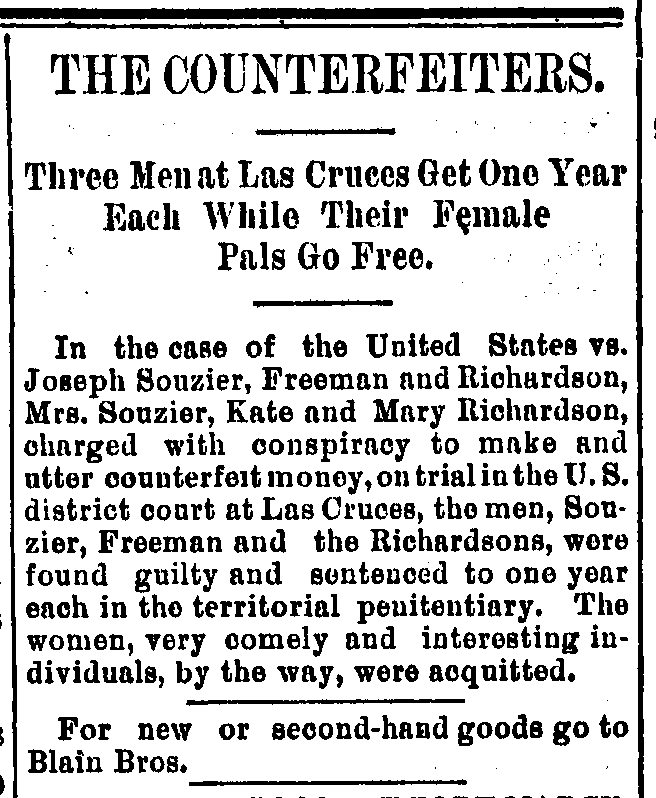
Santa Fe Daily New
Mexican (Santa Fe,
NM), 18 Sep 1893,p. 5.
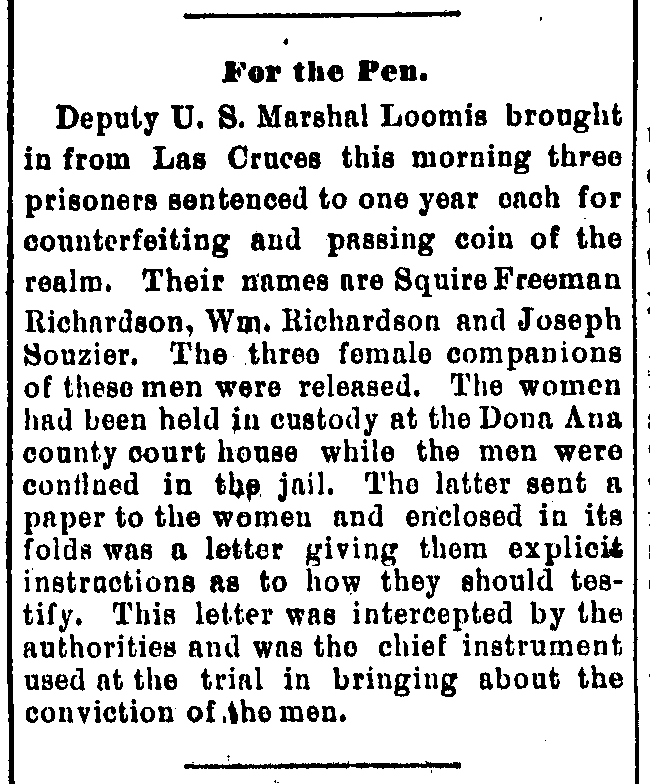
Fe Daily New
Mexican (Santa Fe,
NM), 25 Sep 1893,
p. 5.
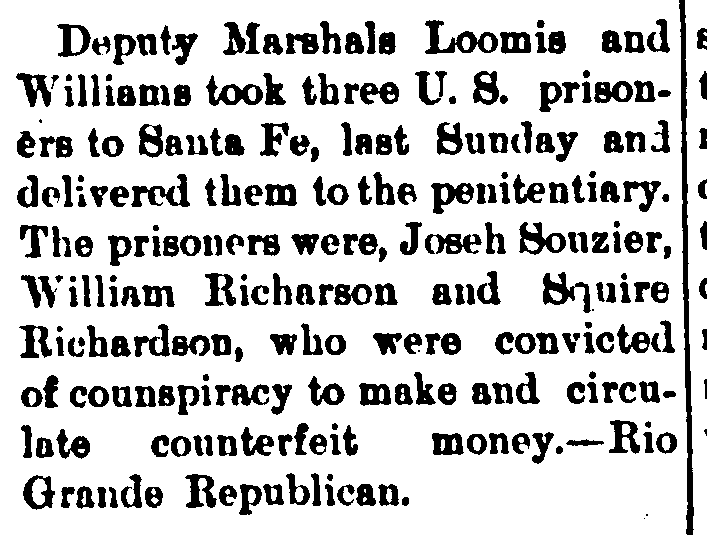
marshals delivering
the Richardsons and
Joseph Souzier to
the penitentiary,
Southwest Sentinel
(Silver City, NM),
10 Oct 1893, p. 5.
1894 Prison Escape and Recapture
(most likely William Henry; if not, then Squire)
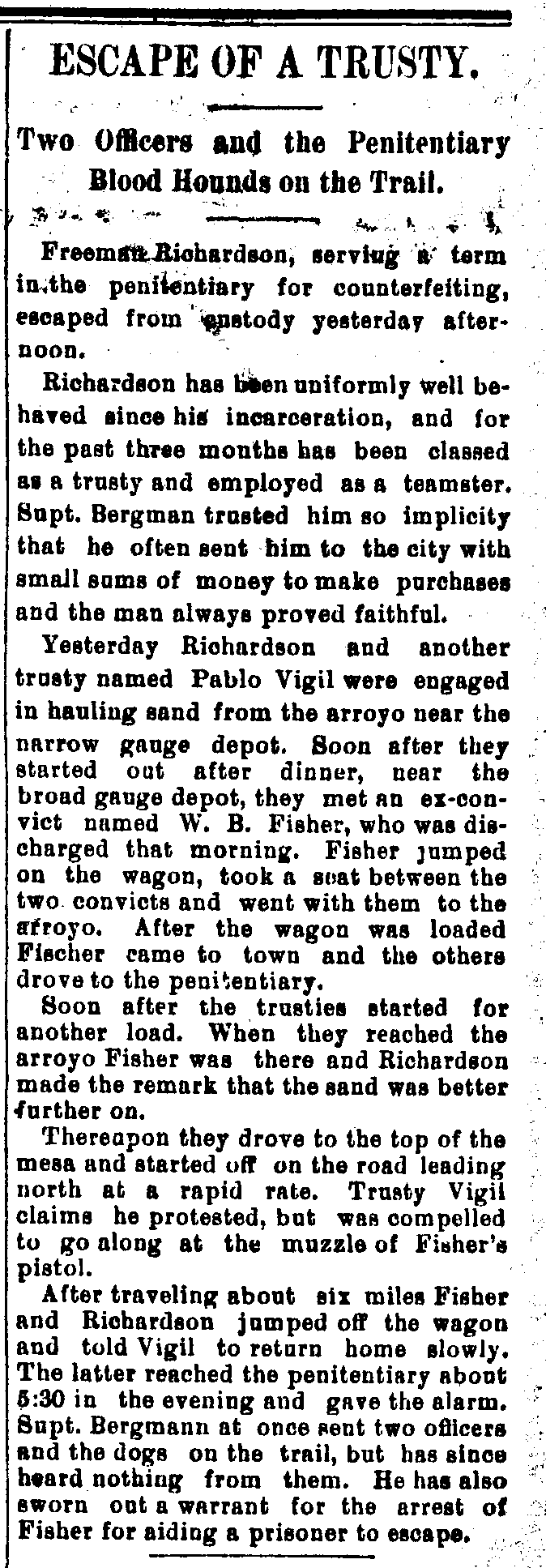
Santa Fe Daily New
Mexican, 31 Mar
1894, p. 2.

Independent
Democrat
(Las Cruces, NM),
4 Apr 1894, p. 4.
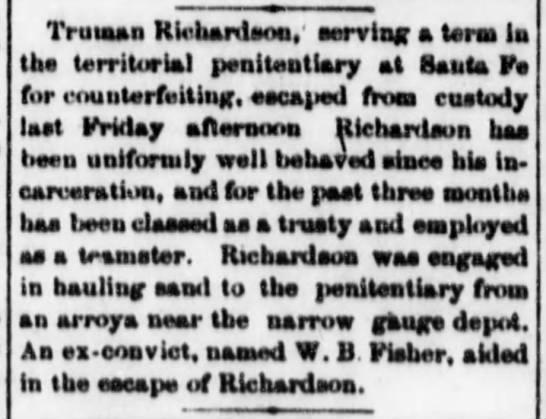
escape of Truman
Richardson,
Albuquerque
Weekly Citizen,
7 Apr 1894.
Note: The name
Truman seems to
be an error and
should read
Freeman or William.
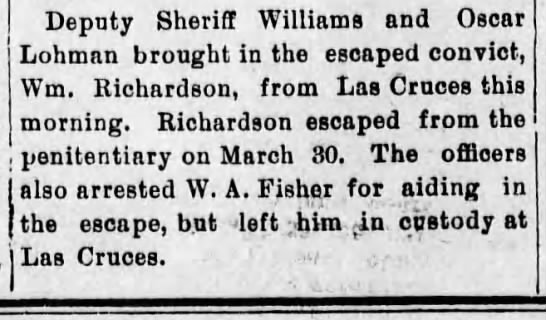
recapture of
William Richardson,
Santa Fe Daily New
Mexican, 10 Apr
1894.
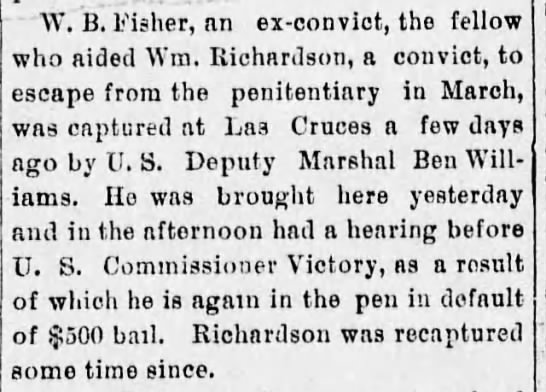
capture of W. B.
Fisher, Santa Fe
Daily New Mexican,
25 Apr 1894.
Misc. Articles from Arizona

watermelons,
Arizona Republic
(Phoenix, AZ),
Tuesday 8 Jul 1924.

Arizona Republic
(Phoenix, AZ),
Tuesday 5 Aug
1924.

Arizona Republic
(Phoenix, AZ),
Friday 18 Dec 1925.
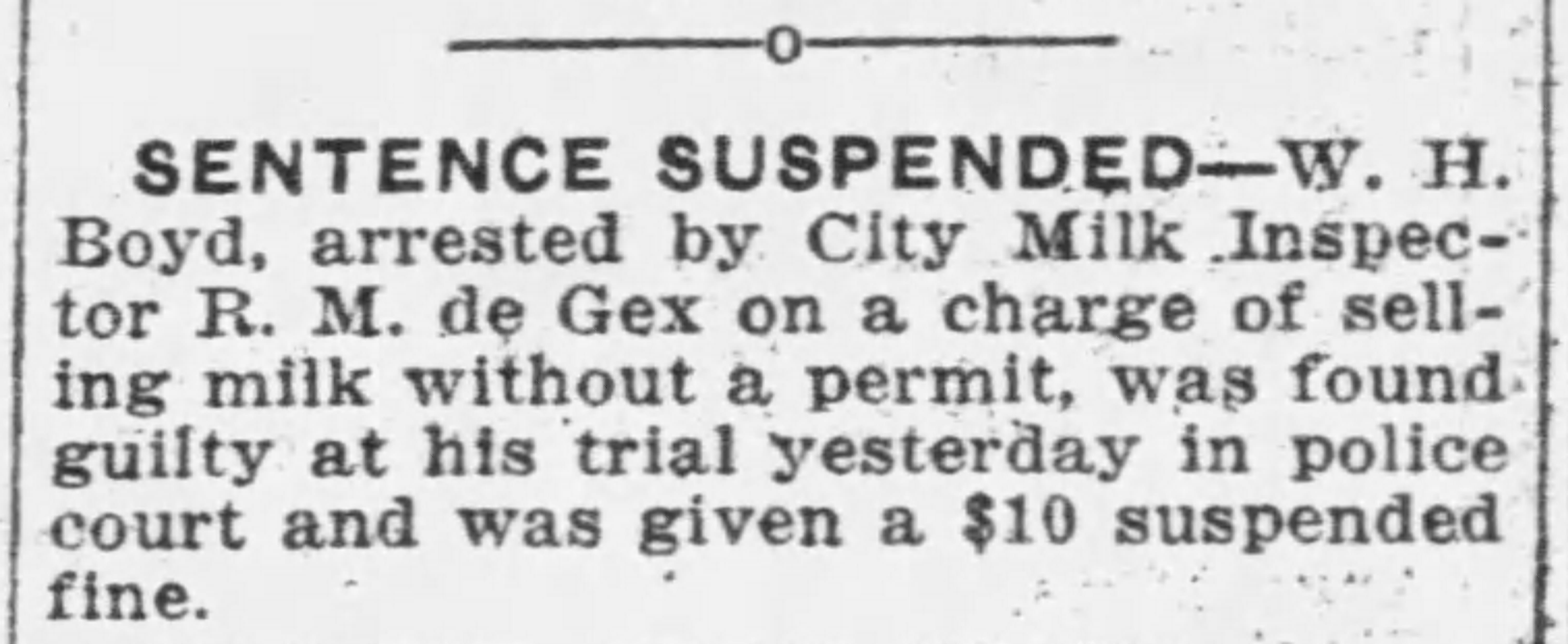
Suspended,"
Arizona Republic
(Phoenix, AZ),
Tuesday 24 Aug
1926.

items for Laveen,
Arizona Republic
(Phoenix, AZ), Thursday
13 Dec 1928.
Death of Ike and Ellen (Boyd) Thompson and child
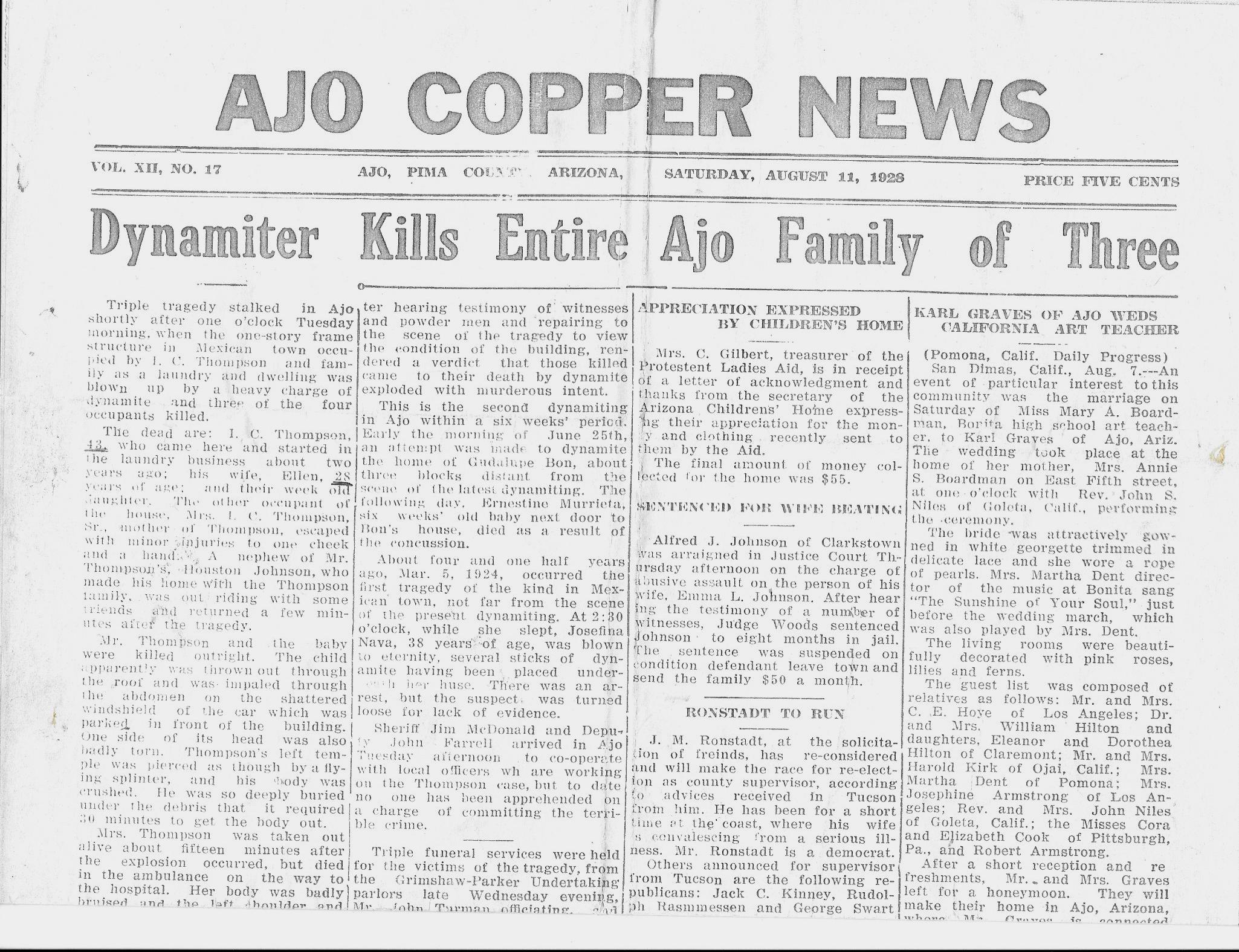
Entire Ajo Family of
Three”,
Ajo Copper News,
Vol. XII, No. 17,
Sat., 11 Aug 1928,
Ajo, Pima, AZ,
page 1.
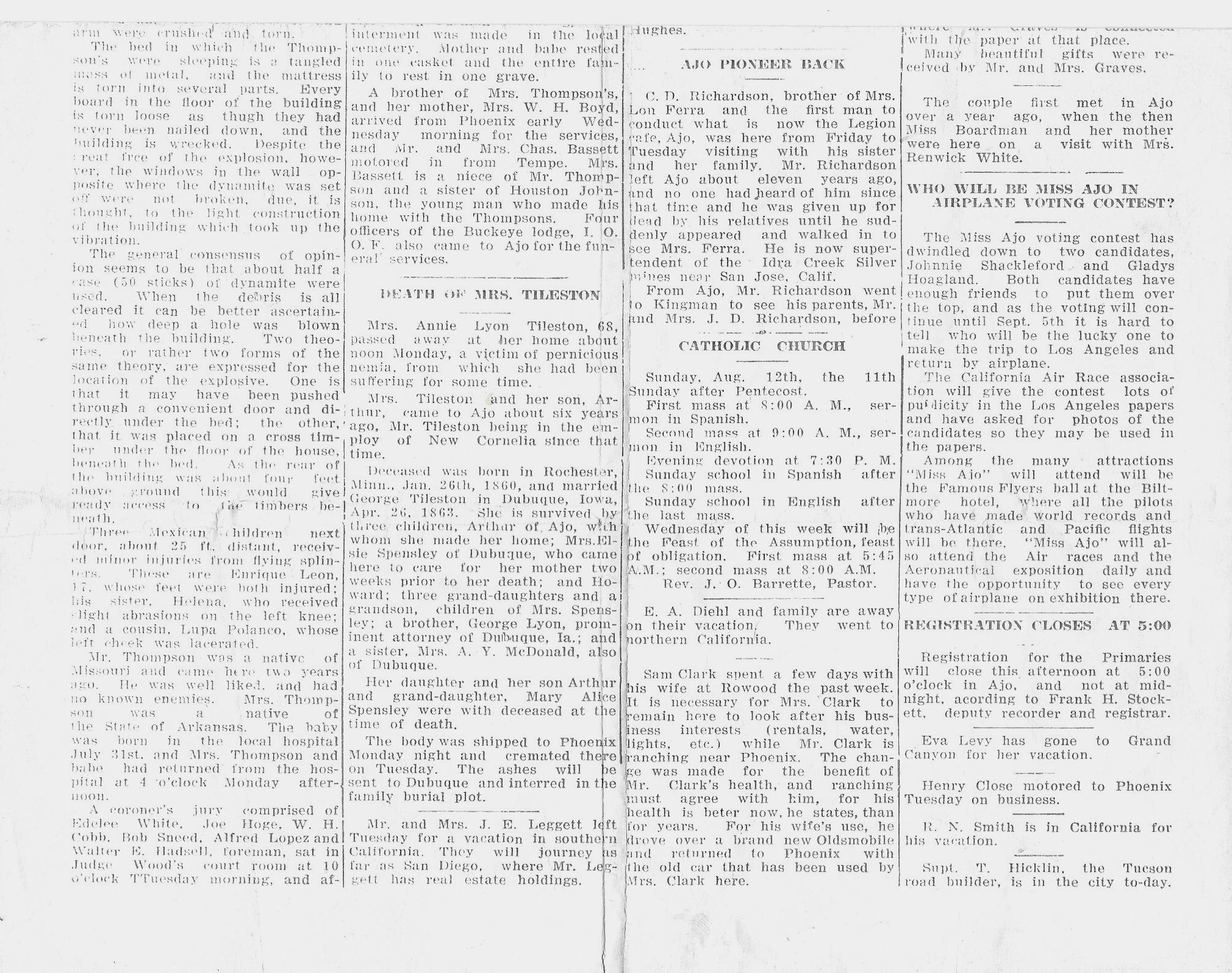
Entire Ajo Family of
Three”,
Ajo Copper News,
Vol. XII, No. 17,
Sat., 11 Aug 1928,
Ajo, Pima, AZ,
page 2.

Taken in Explosion,"
Arizona Republic
(Phoenix, AZ),
Wednesday 8 Aug 1928,
pgs. 1-2, page 1 of 2.
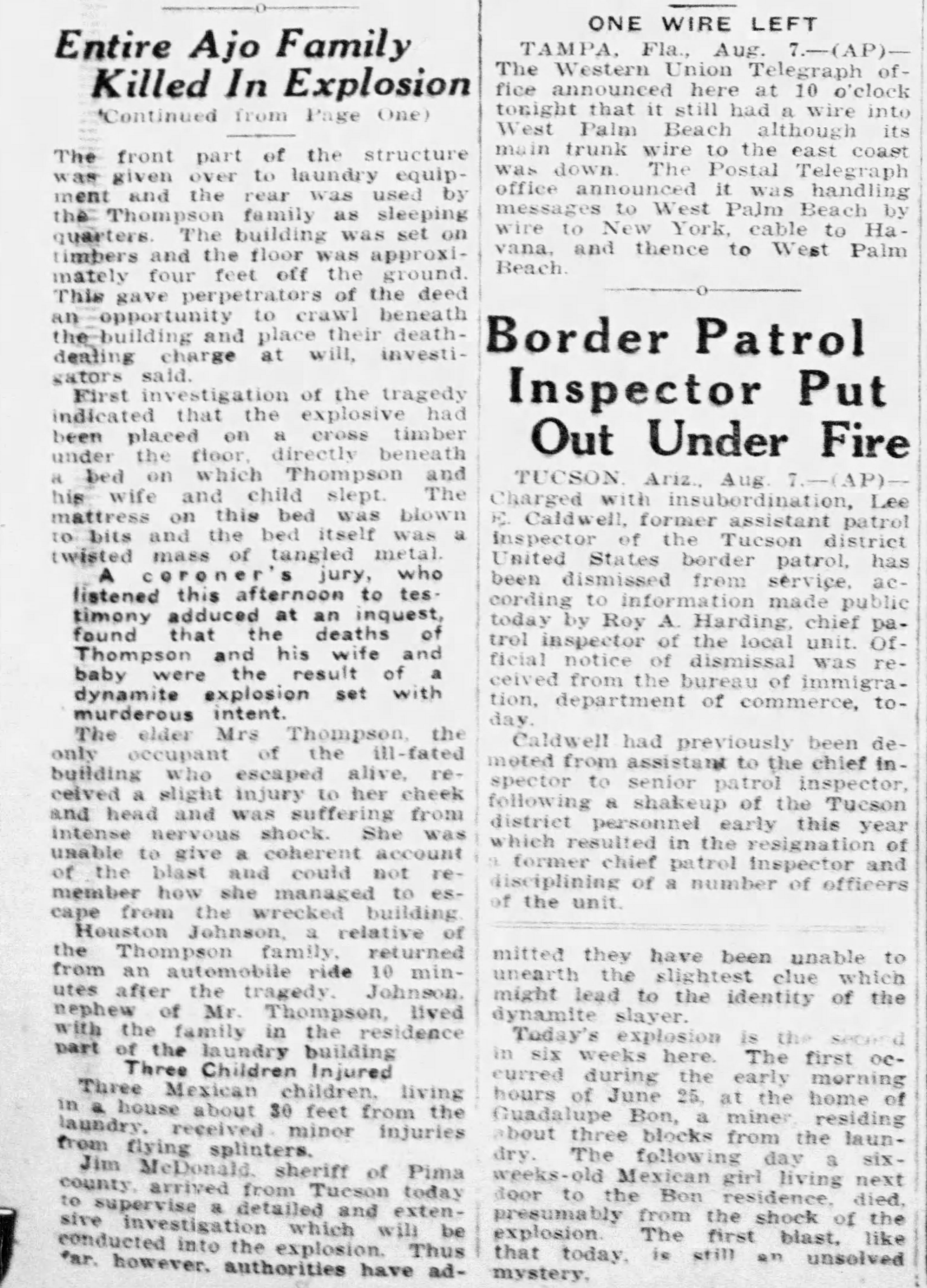
Taken in Explosion,"
Arizona Republic
(Phoenix, AZ),
Wednesday 8 Aug
1928, pgs. 1-2,
page 2 of 2.
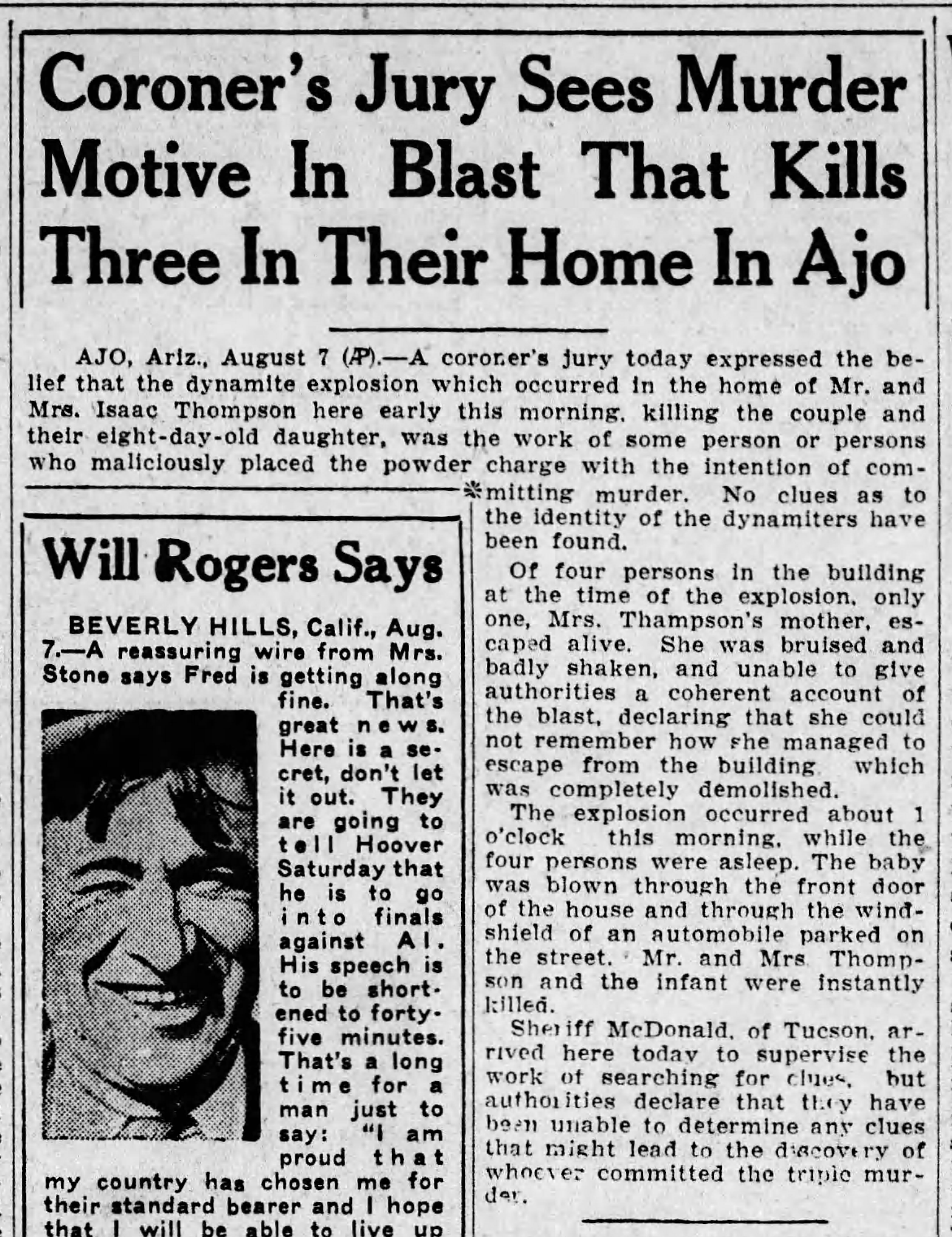
Murder Motive in
Blast That Kills Three
in Their Home in
Ajo," Arizona Daily
Star (Tucson, AZ),
Wednesday 8 Aug
1928, p. 1.
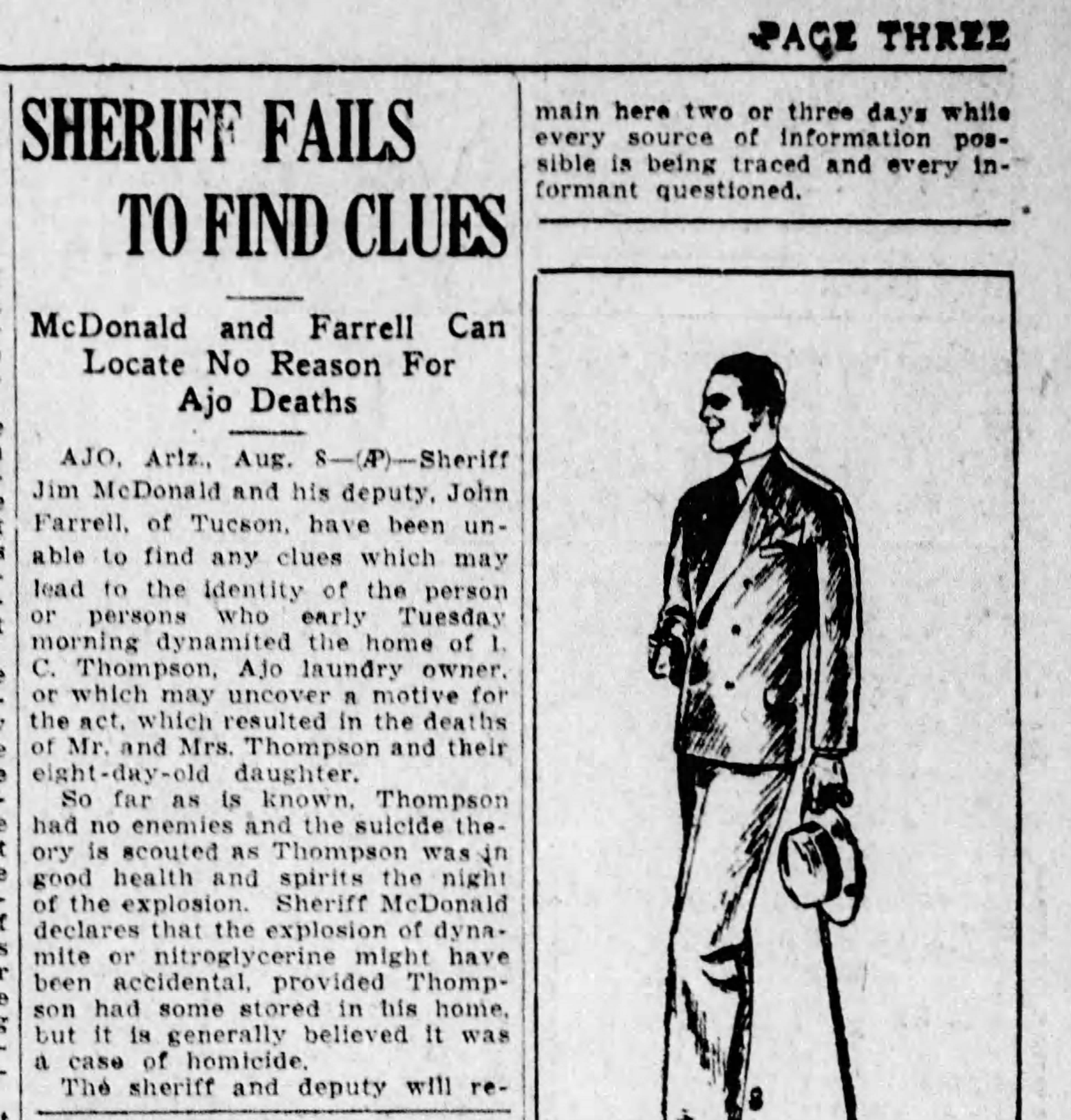
Arizona Daily Star
(Tucson, AZ),
Thursday 9 Aug
1928, p. 3.
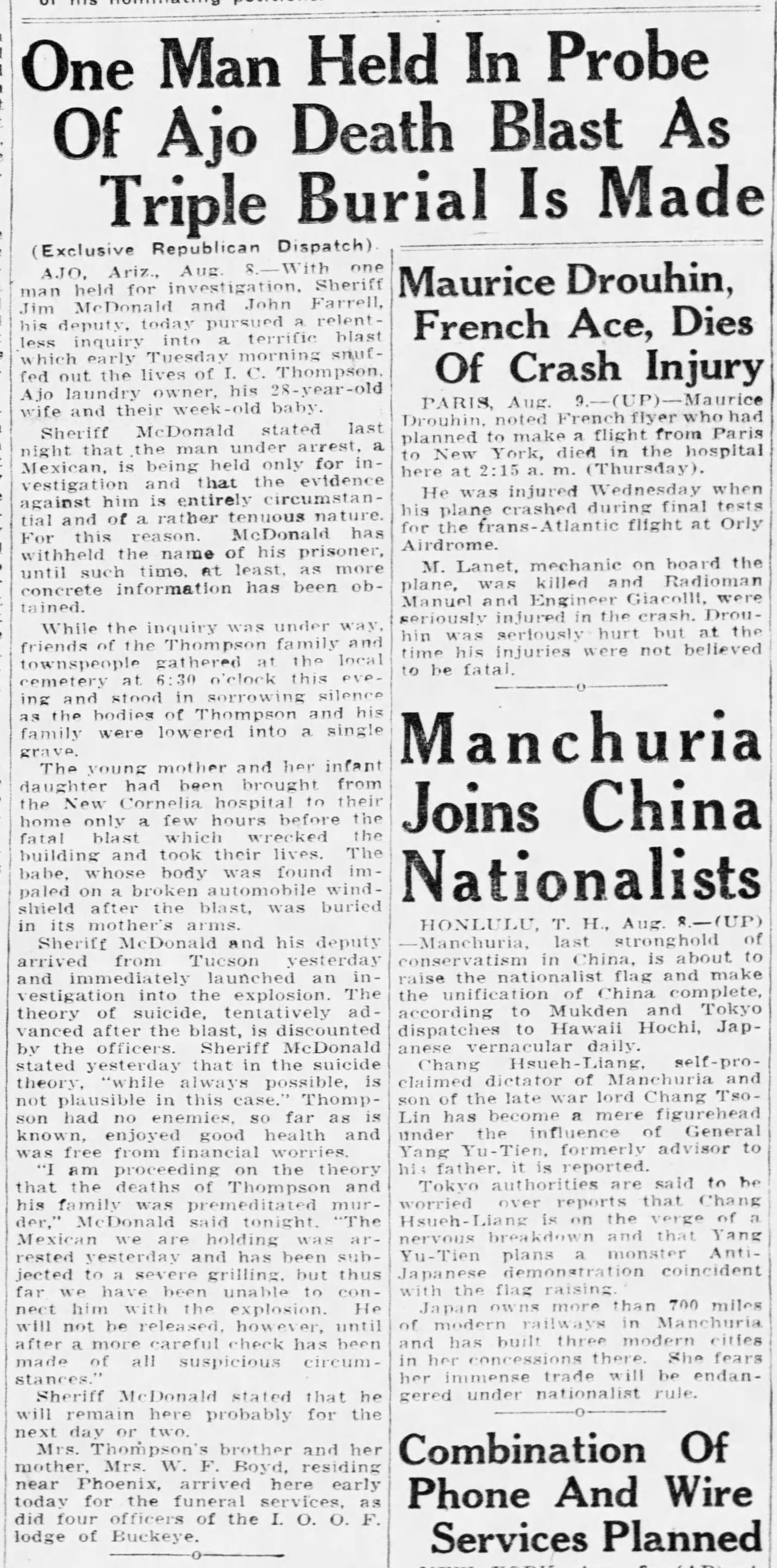
Probe of Ajo Death
Blast as Triple Burial
is Made,"
Arizona Republic
(Phoenix, AZ),
Thursday 9 Aug
1928, p. 1.

Explosion at Ajo,"
Arizona Daily Star
(Tucson, AZ),
Saturday 18 Aug
1928, p. 2.
1931 Arrest of Lloyd and Mary (Boyd) King

City Jail,"
Oakland Tribune,
25 Nov 1931.
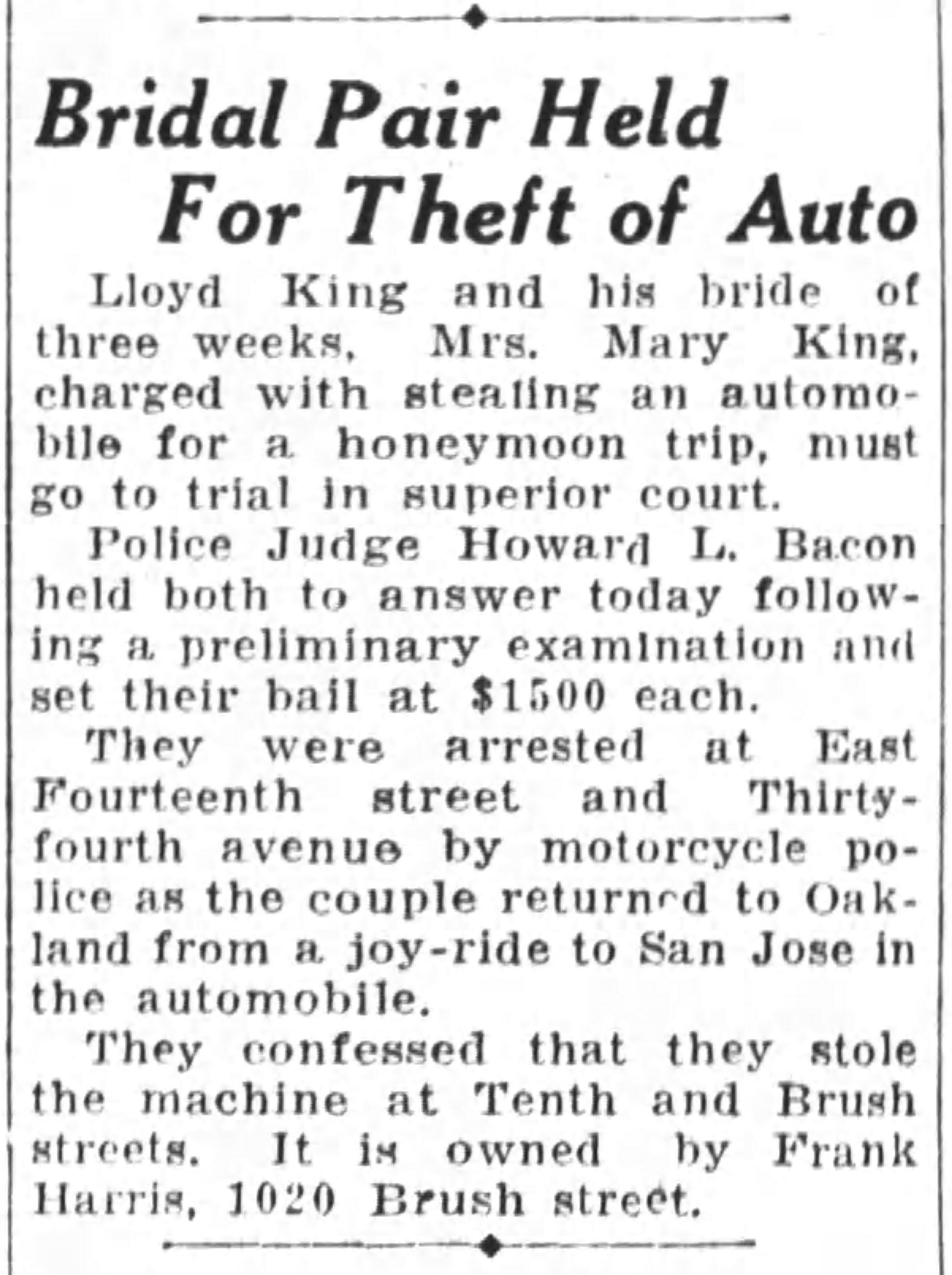
Theft of Auto,"
Oakland Tribune,
27 Nov 1931.
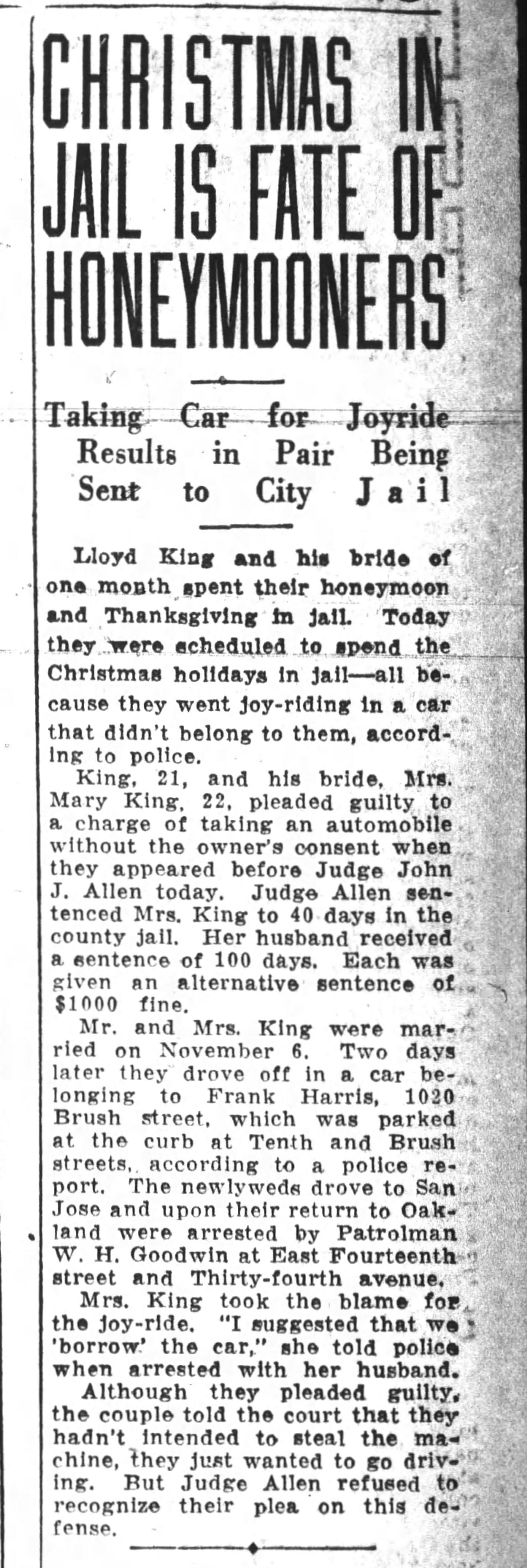
Fate of
Honeymooners,"
Oakland Tribune,
11 Dec 1931.
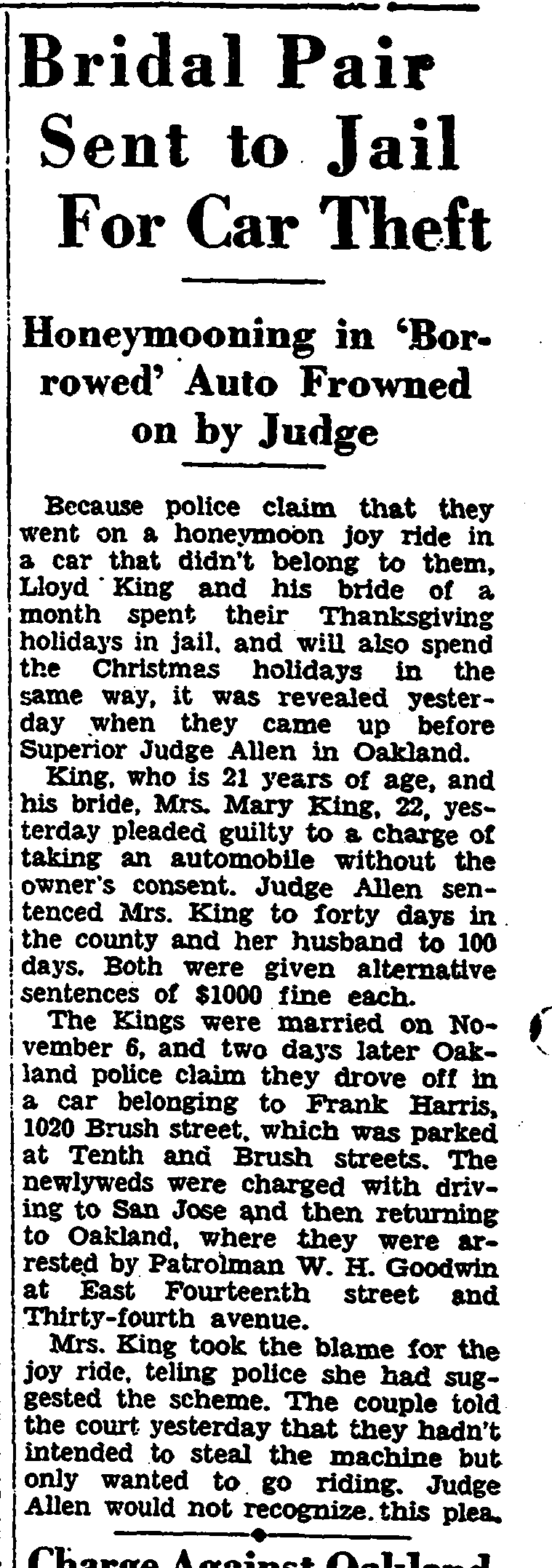
Jail for Car Theft,"
San Francisco
Chronicle,
11 Dec 1931, p. 34.
1931 Adoption of a Baby by Katie (Boyd) Willis
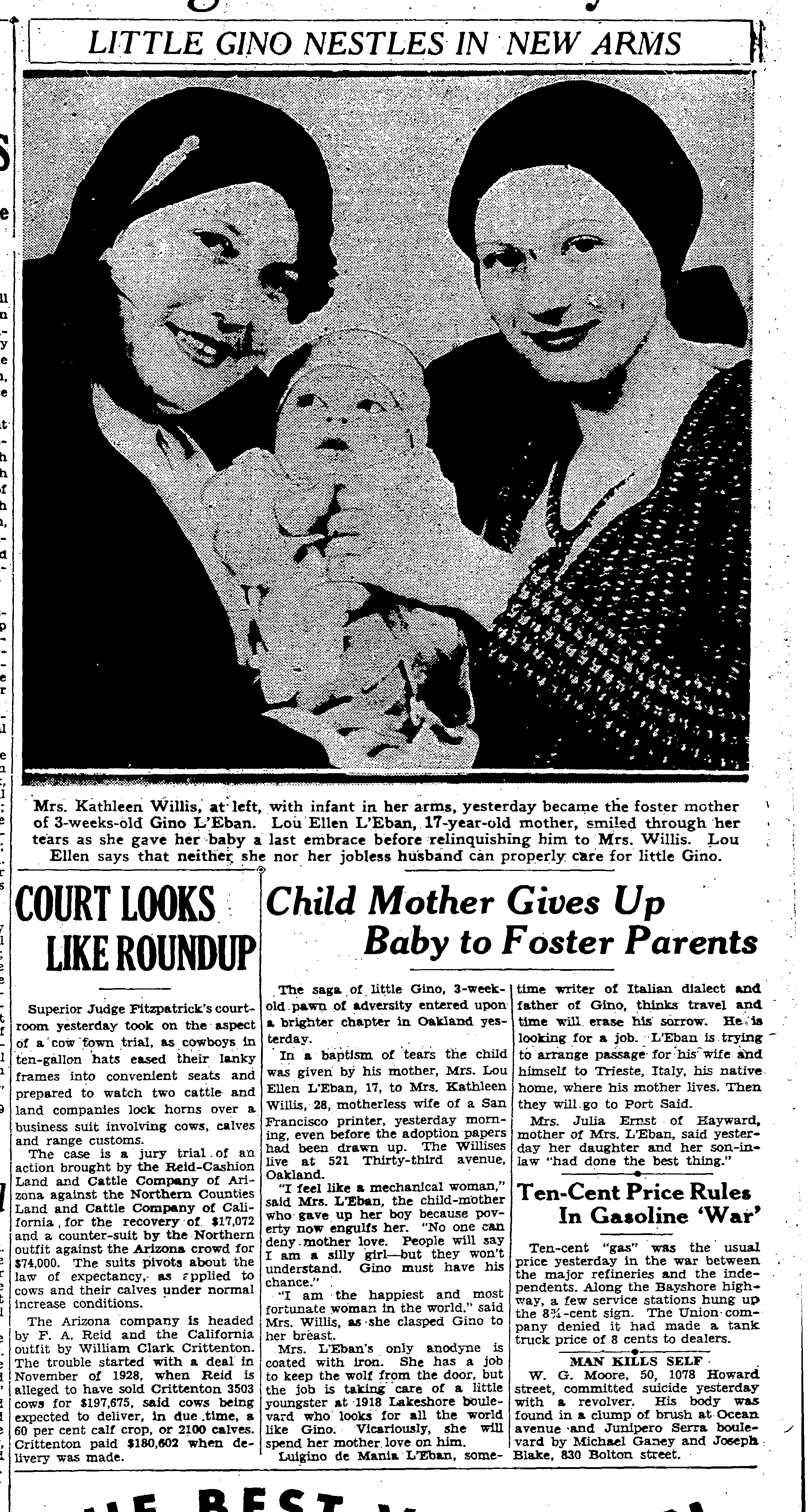
Up Baby to Foster
Parents,"
San Francisco
Chronicle
(San Francisco, CA),
Tuesday, 21 Apr 1931,
p. 13.

Saved from Suicide,"
The San Francisco
Examiner
(San Francisco, CA),
Thursday, 15 Feb
1934, p. 5.
1933 Arrest of William Henry Boyd, Lloyd King, and Mary (Boyd) King

Oakland Tribune
(Oakland, CA),
Saturday 18 Feb
1933.
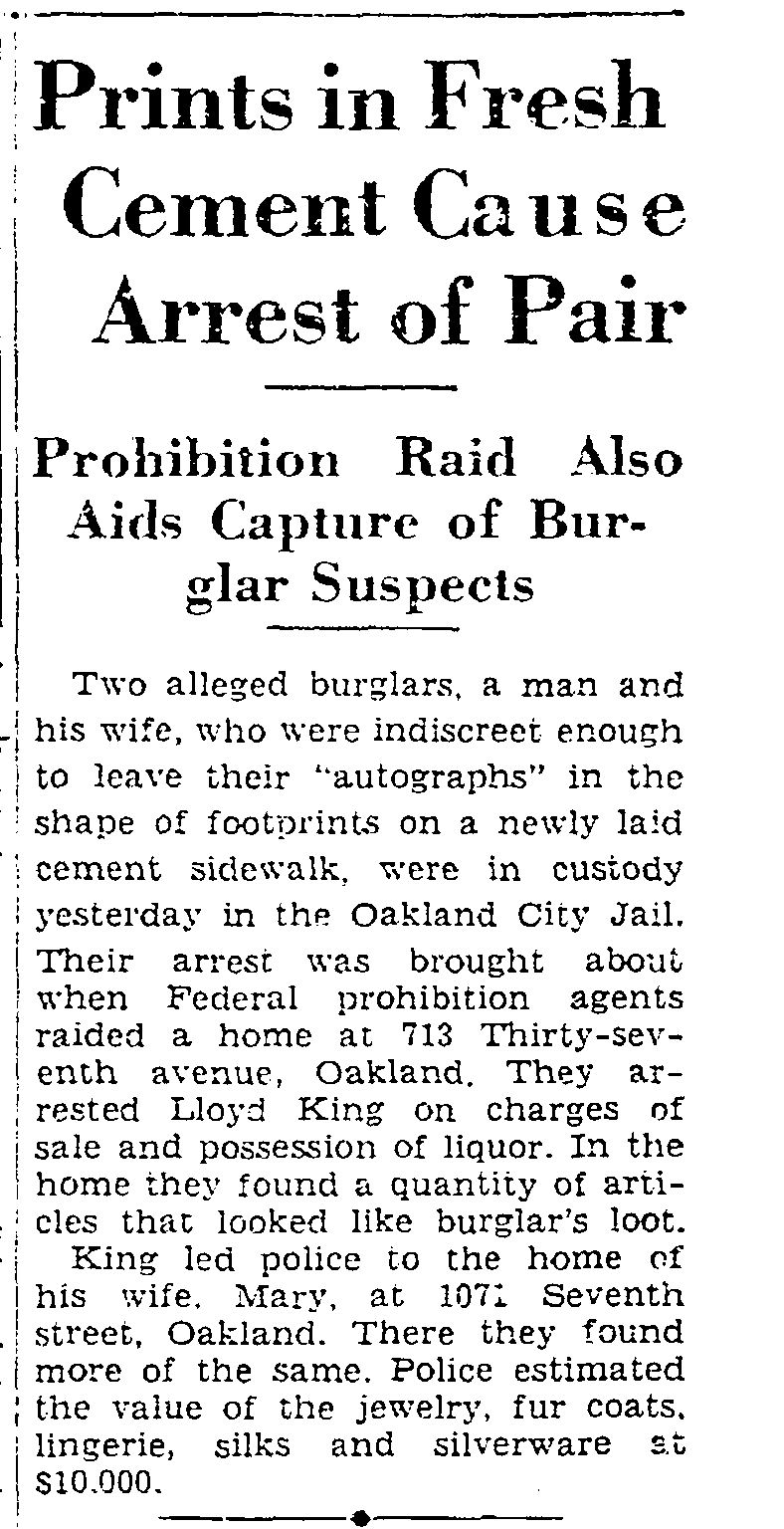
Cement Cause
Arrest of Pair,"
San Francisco
Chronicle (San
Francisco, CA),
Saturday, 18 Feb
1933, p. 15.
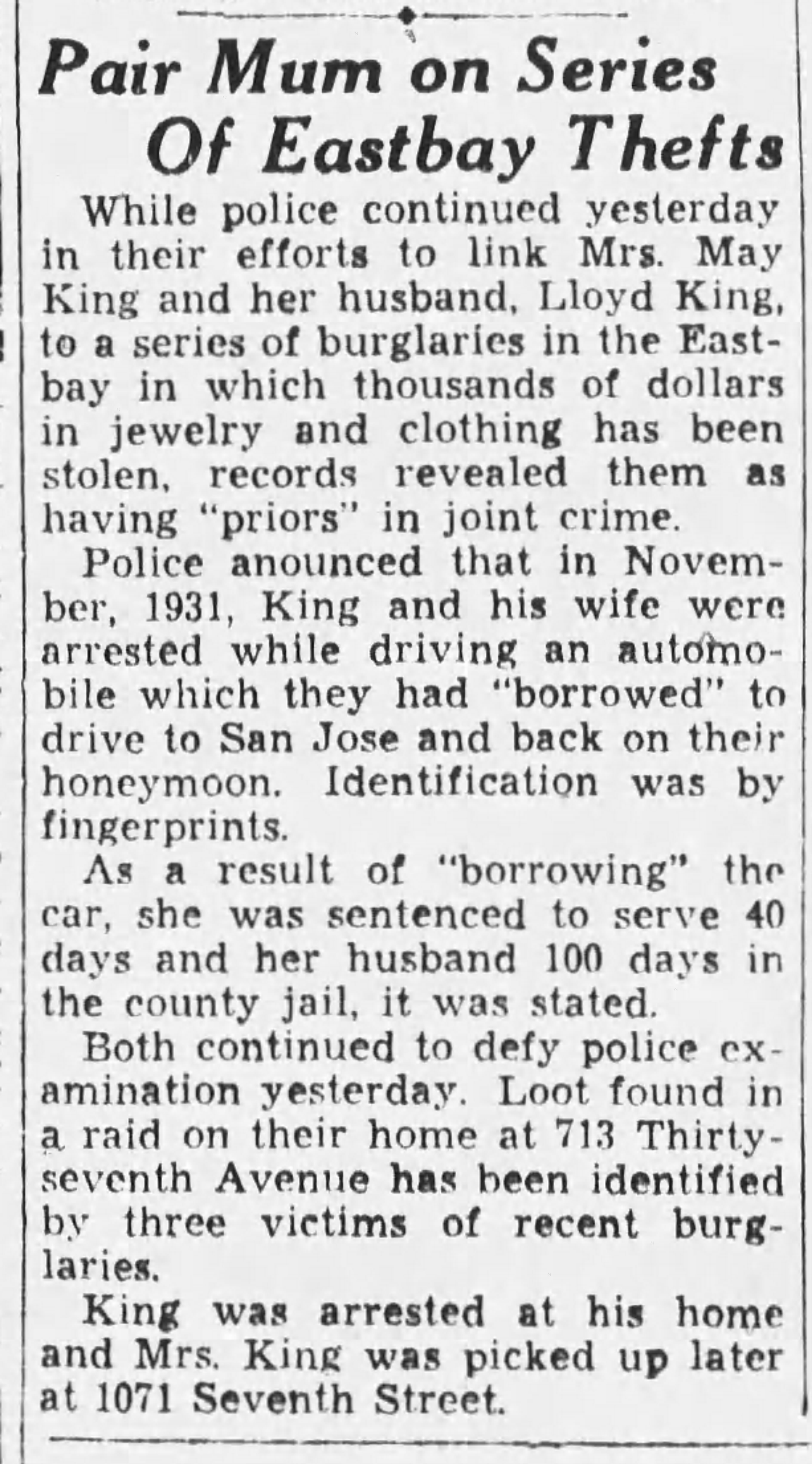
of Eastbay Thefts,"
Oakland Tribune
(Oakland, CA),
Sunday 19 Feb
1933.
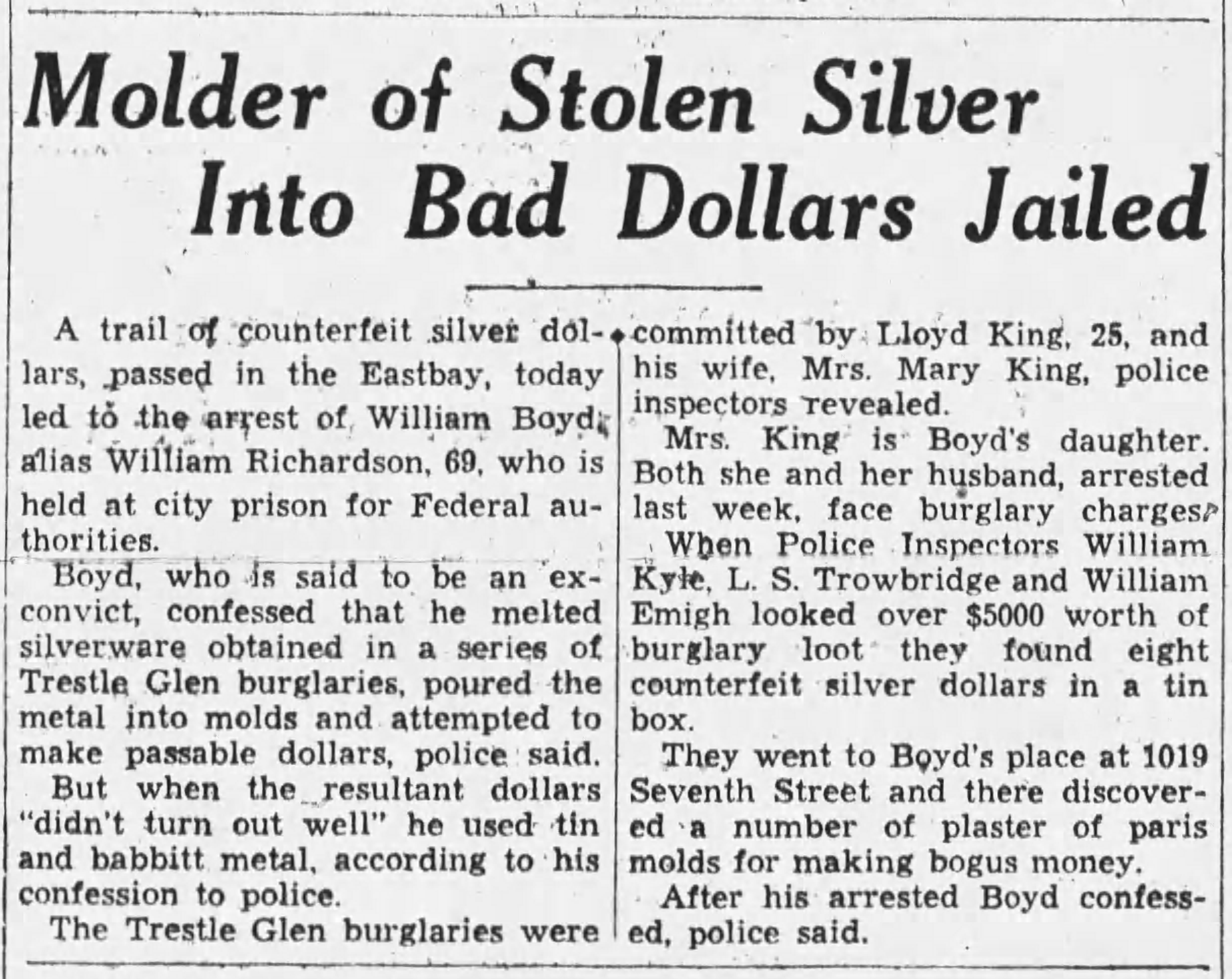
Silver into Bad
Dollars Jailed,"
Oakland Tribune
(Oakland, CA),
Monday 20 Feb
1933, p. 2.

as a Counterfeiter,"
The San Francisco Examiner
(San Francisco,
California),
20 Feb 1933
(Monday), page 4.
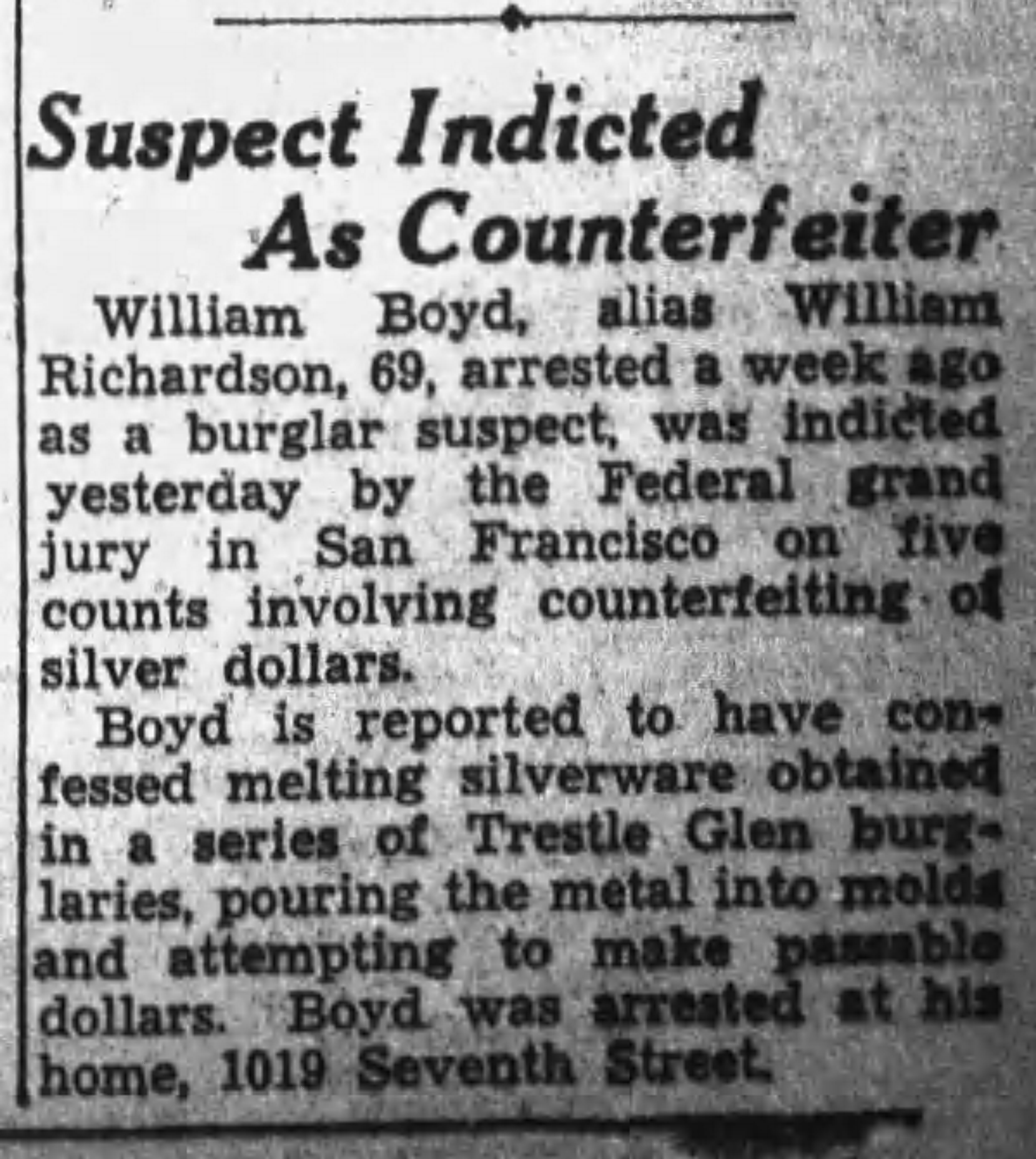
Counterfeiter,"
Oakland Tribune
(Oakland, CA),
Wednesday 1 Mar
1933, p. 30.
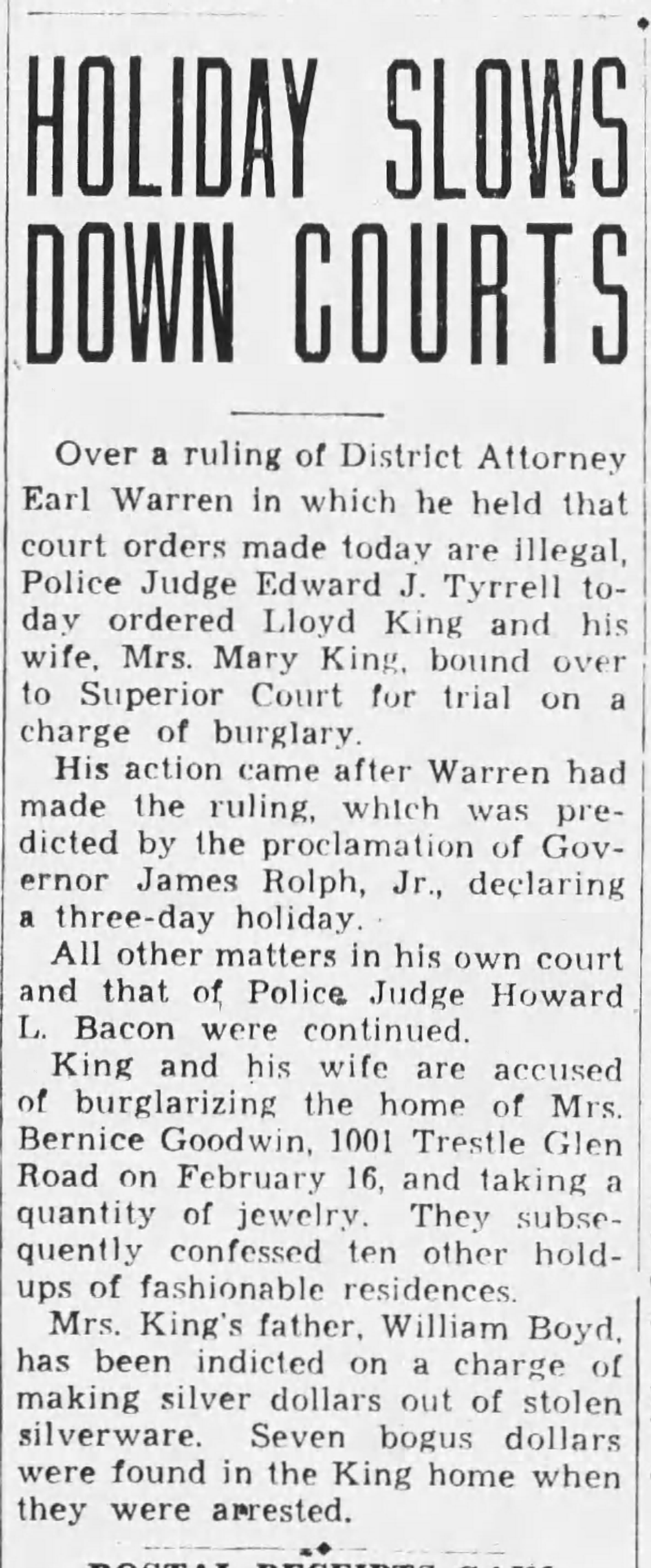
Courts,"
Oakland Tribune
(Oakland, CA),
Thursday 2 Mar 1933.
1941 and 1947 Arrest of Lloyd King
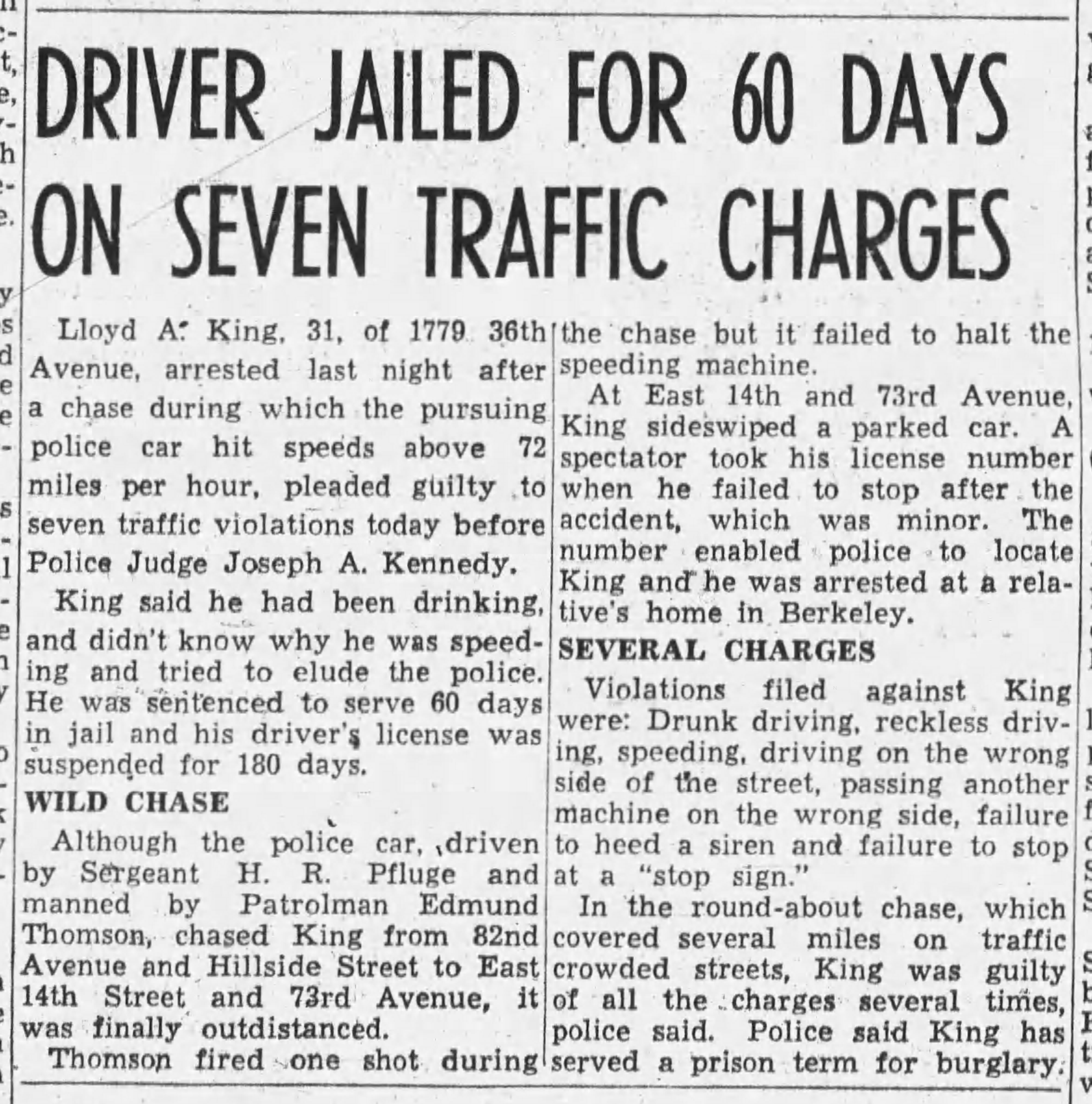
Days on Seven
Traffic Charges,"
Oakland Tribune
(Oakland, CA),
Saturday 2 Aug
1941.
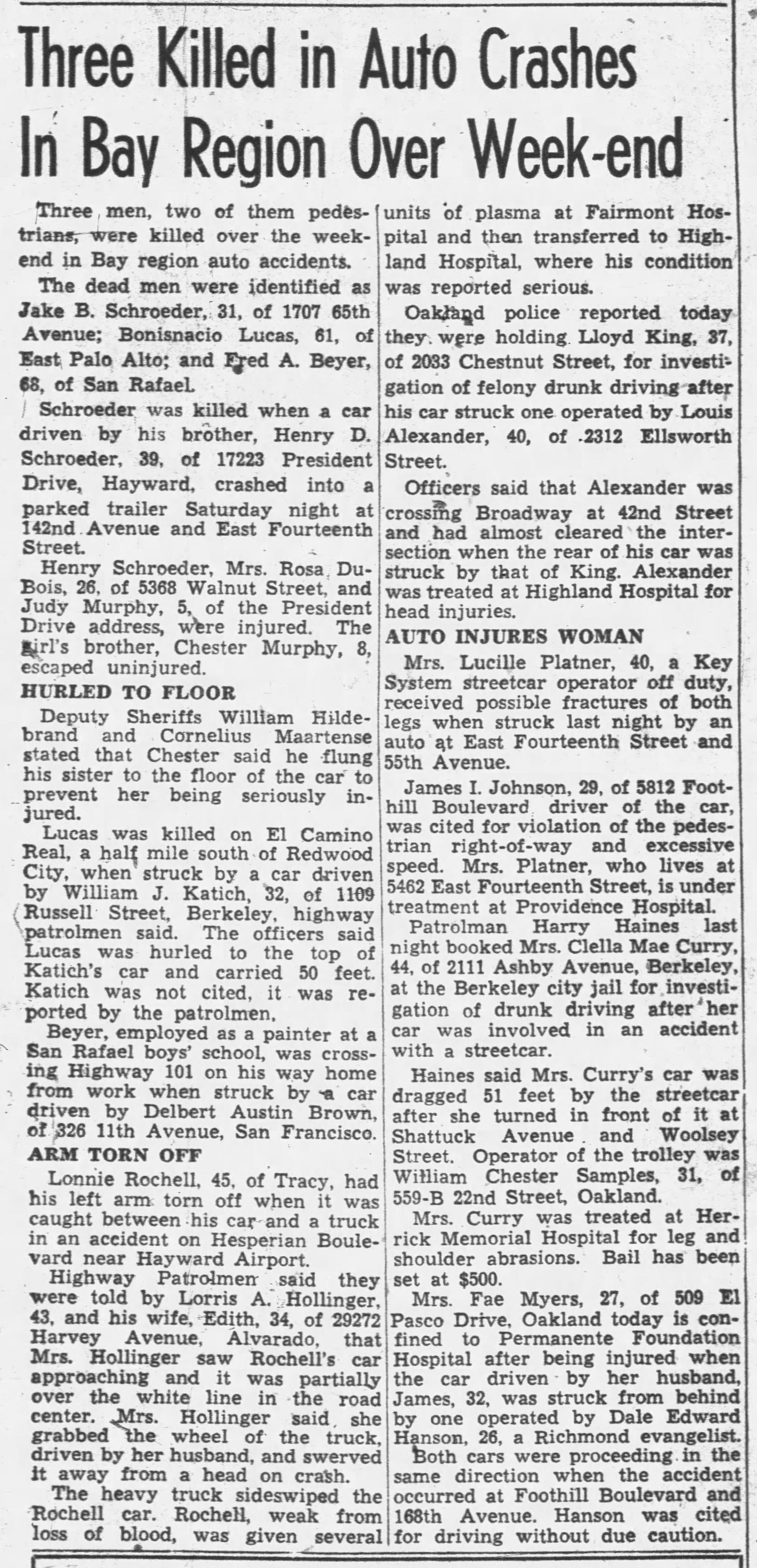
Crashes in Bay Region
Over Week-end,"
Oakland Tribune
(Oakland, CA),
Monday 24 Mar 1947.
Death of Mary (Boyd) (King) Fettig
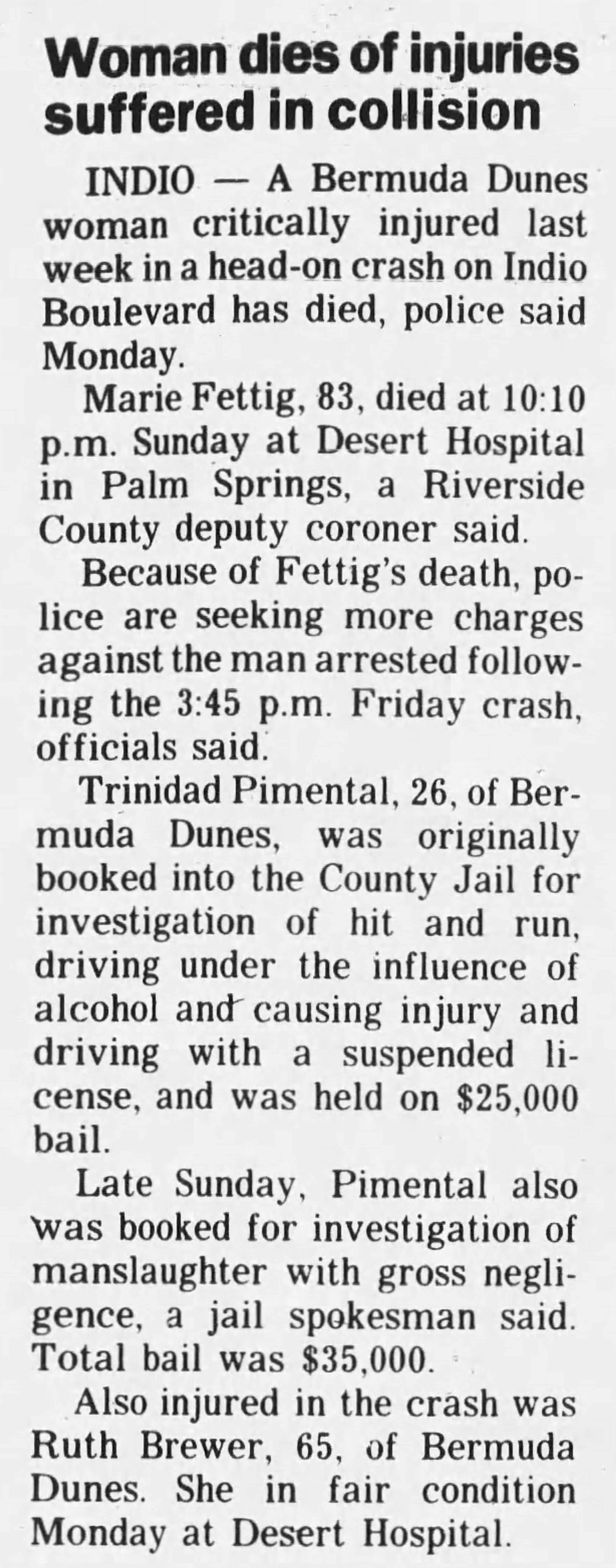
injuries suffered in
collision,"
The Desert Sun
(Palm Springs and
Coachella Valley, CA),
Tuesday 24 Mar 1994.
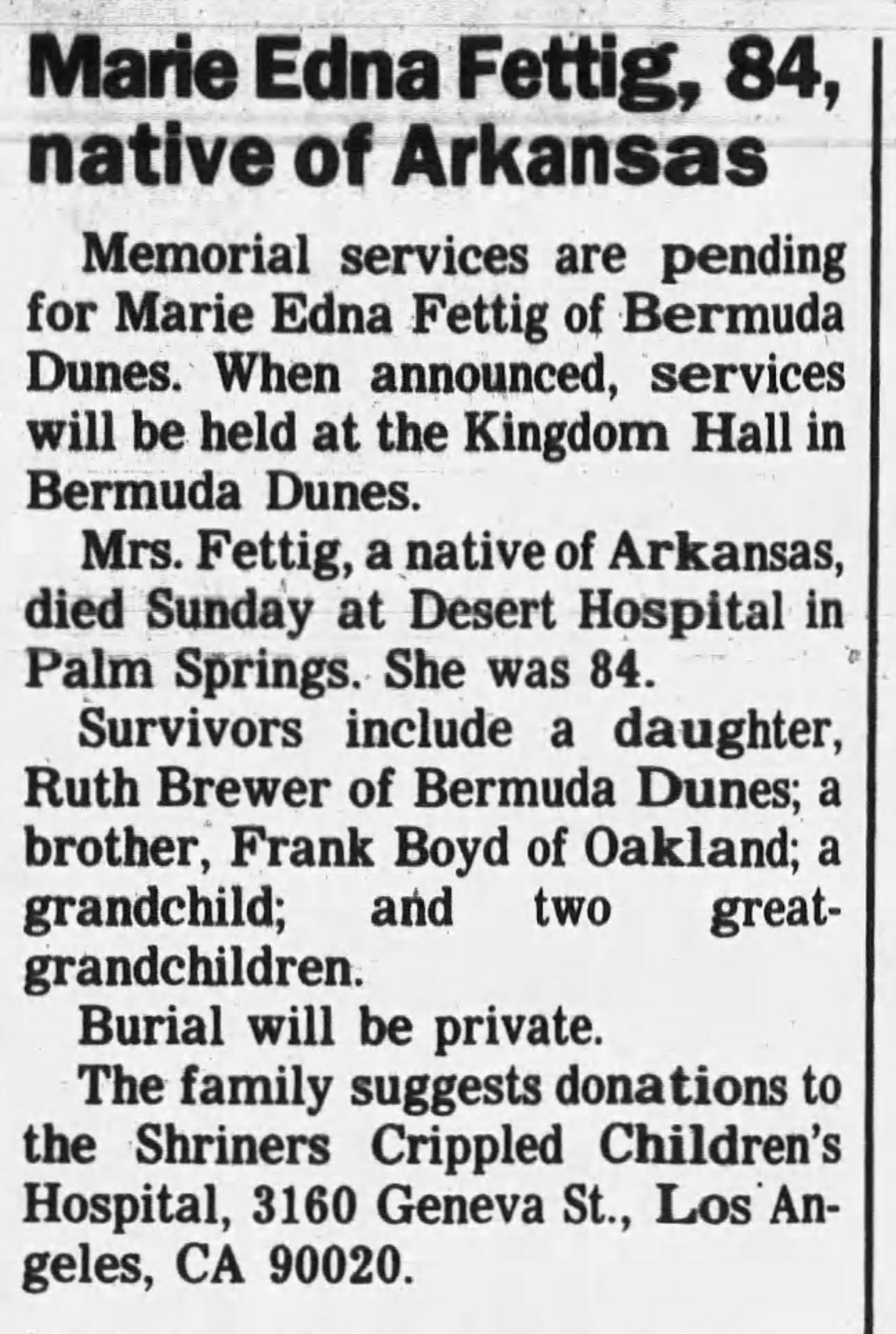
84, native of Arkansas,"
The Desert Sun
(Palm Springs and
Coachella Valley, CA),
Friday 27 Mar 1994.
Notices of Marriage Licenses

Issued,"
Oakland Tribune
(Oakland, CA),
Thursday 6 Aug 1931.
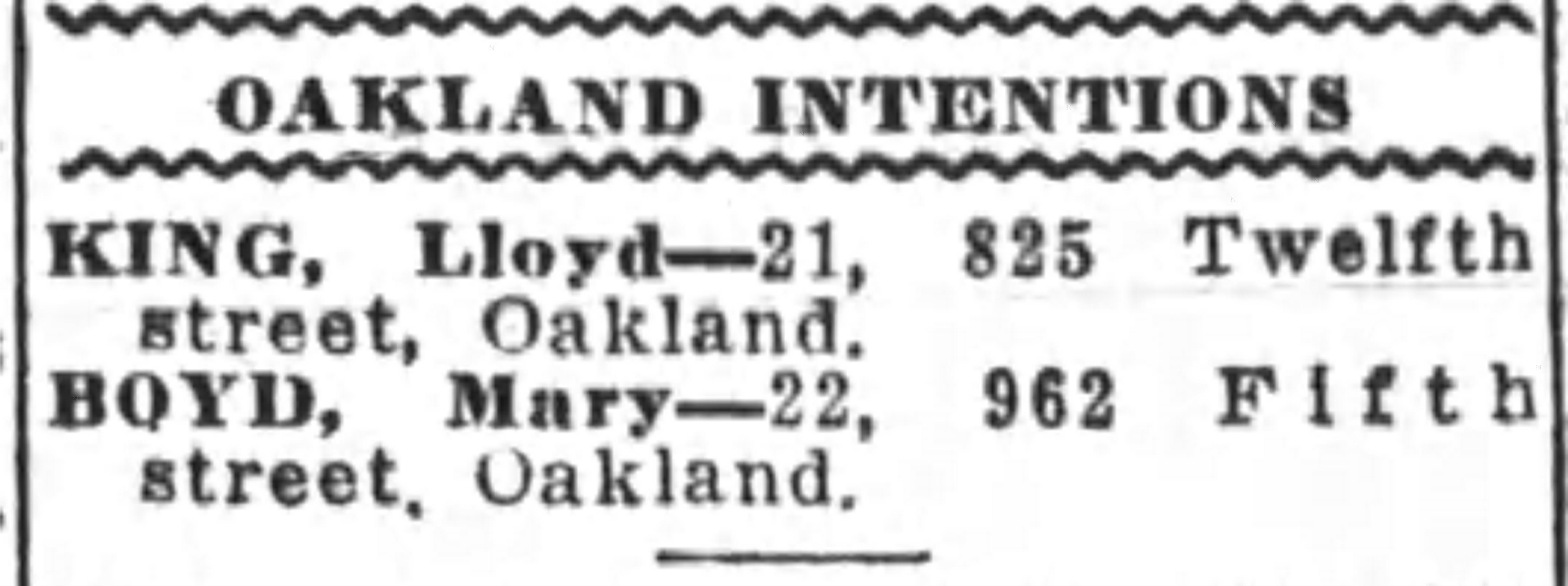
Oakland Tribune
(Oakland, CA),
Tuesday 3 Nov 1931.
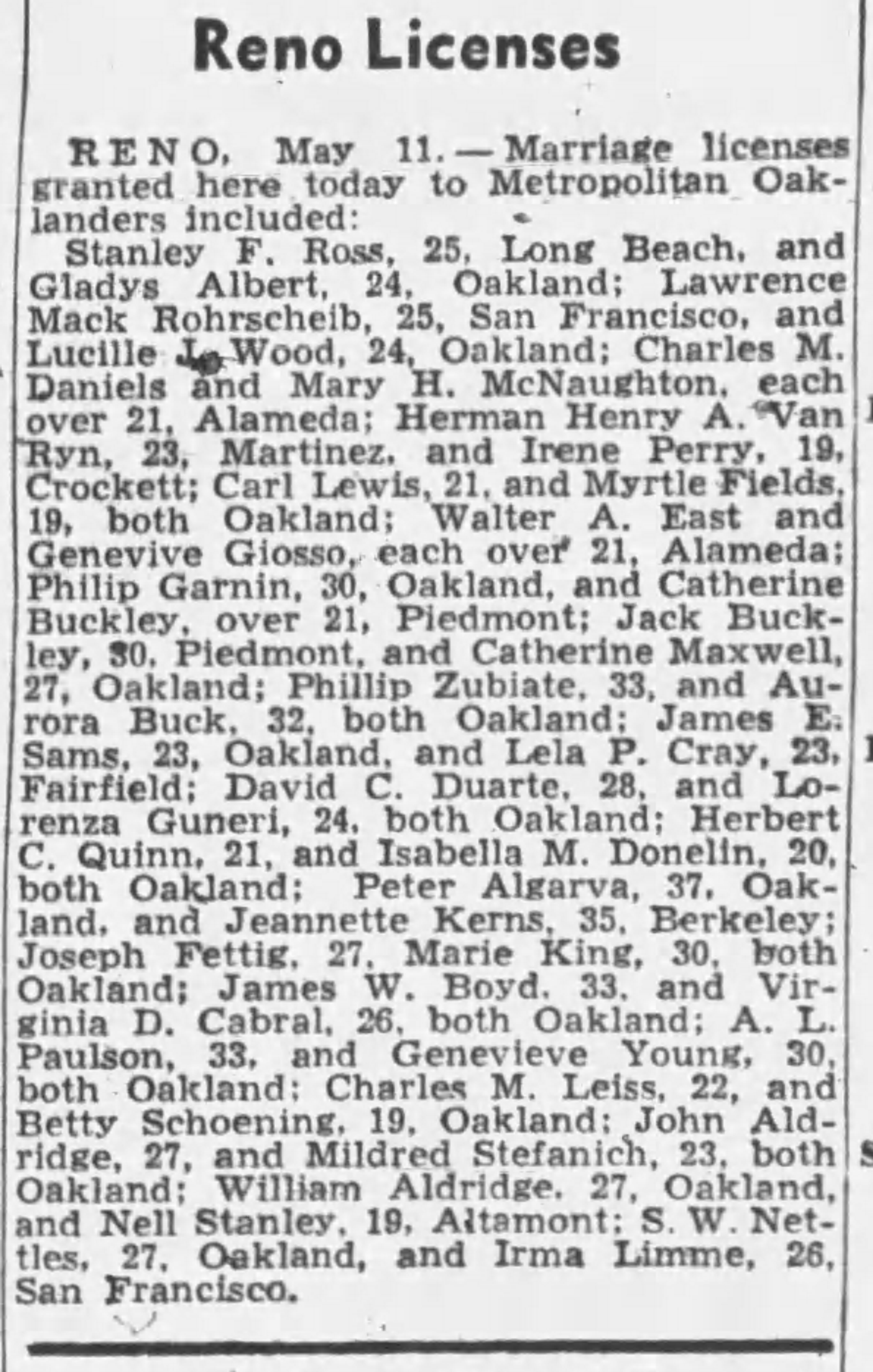
Oakland Tribune
(Oakland, CA),
Sunday 12 May 1940.
Obituaries
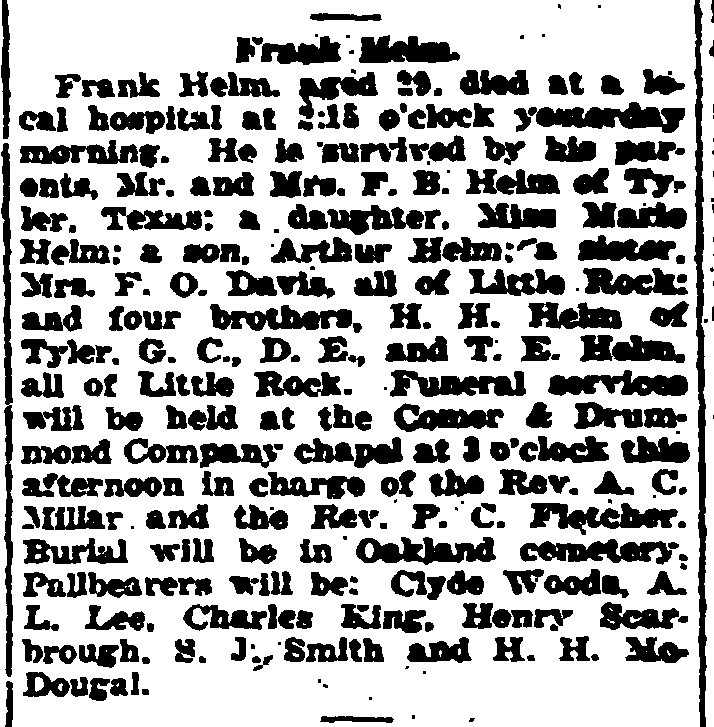
Helm,
Arkansas Gazette
(Little Rock, AR),
Wednesday, 7 Oct
1925, p. 10.
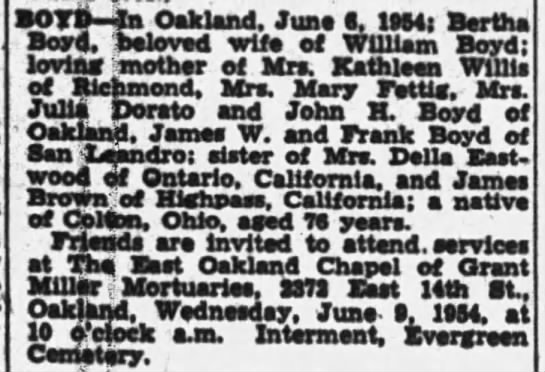
Boyd,
Oakland Tribune
(Oakland, California),
Monday, 7 Jun 1954,
p. 33.
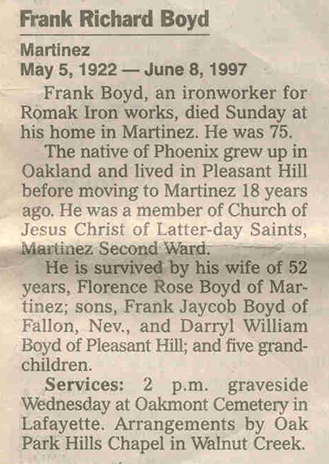
Richard Boyd,
Contra Costa Times
(Contra Costa
County, CA),
10 June 1997.
Copies of census records are shown below as thumbnails. Click on each thumbnail to view a larger version of the record in another tab.
1870
Campbell, La Crosse, Wisconsin
Source: 1870 U.S. census, population schedules. NARA microfilm publication M593, 1,761 rolls.
1880
Onalaska, La Crosse, Wisconsin
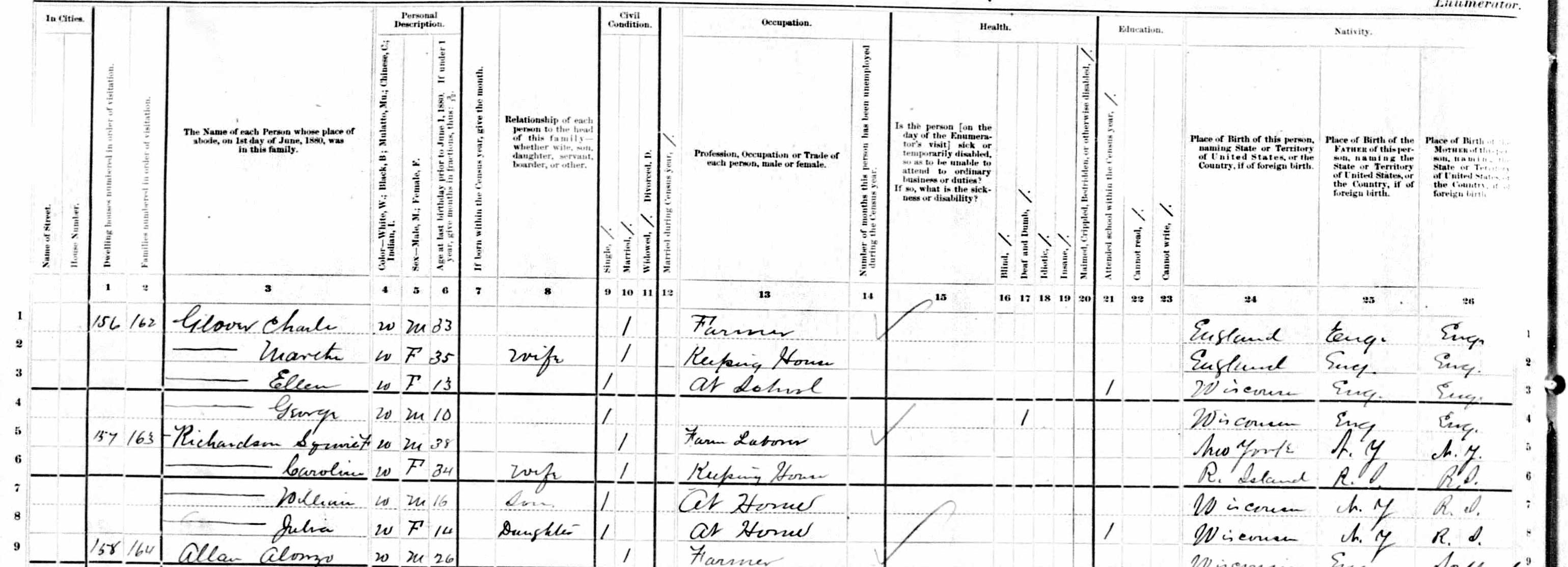
Squire F. Richardson;
Year: 1880;
Census Place:
Onalaska, La Crosse,
Wisconsin;
Roll: 1432;
Page: 428D;
Enumeration District:
051
Washington, Henry, Ohio

Alva P. Brown,
Orsmus
Brown;
Year: 1880;
Census Place:
Washington, Henry,
Ohio;
Roll: 1032;
Page: 59C;
Enumeration District:
110
Source: Tenth Census of the United States, 1880. (NARA microfilm publication T9, 1,454 rolls). Records of the Bureau of the Census, Record Group 29. National Archives, Washington, D.C.
1900
Justice Precinct 1, Smith, Texas

Frank Helm;
Year: 1900;
Census Place:
Justice Precinct 1,
Smith, Texas;
Page: 7;
Enumeration District:
0093;
FHL microfilm: 1241669
Bayou, Ozark, Missouri

Mary C. Thompson;
Year: 1900;
Census Place: Bayou,
Ozark, Missouri;
Page: 5;
Enumeration District:
0091;
FHL microfilm: 1240880
Source: United States of America, Bureau of the Census. Twelfth Census of the United States, 1900. Washington, D.C.: National Archives and Records Administration, 1900. T623, 1854 rolls.
1910
Pine Bluff Ward, Jefferson, Arkansas

William H. Boyd;
Street: Fifth Avenue;
Year: 1910;
Census Place: Pine
Bluff Ward 4, Jefferson,
Arkansas;
Roll: T624_54;
Page: 13A;
Enumeration District:
0121;
FHL microfilm: 1374067
Dekalb, Grant, Arkansas

Frank B. Helm;
Year: 1910;
Census Place: Dekalb,
Grant, Arkansas;
Roll: T624_51;
Page: 20A;
Enumeration District:
0078;
FHL microfilm: 1374064
Oakland, Alameda, California

John J. Silvera
(grandfather of Lloyd
King, called
Aloysious King here);
Street: Adeline St.;
Year: 1910;
Census Place:
Oakland Ward 2,
Alameda, California;
Roll: T624_70;
Page: 3A;
Enumeration District:
0088;
FHL microfilm: 1374083
Springville, Tulare, California

Louis Dorato;
Street: County road
between Tulare and
Woodsville;
Year: 1910;
Census Place:
Springville, Tulare,
California;
Roll: T624_111;
Page: 9A;
Enumeration District:
0201;
FHL microfilm: 1374124
Bayou, Ozark, Missouri

Cassie Thompson;
Year: 1910;
Census Place: Bayou,
Ozark, Missouri;
Roll: T624_804;
Page: 15A;
Enumeration District:
0132;
FHL microfilm: 1374817
Waterloo Ward, Black Hawk, Iowa

Harry C. Silker;
Street: Jackson Street;
Year: 1910;
Census Place:
Waterloo Ward 4,
Black Hawk, Iowa;
Roll: T624_392;
Page: 21B;
Enumeration District:
0027;
FHL microfilm: 1374405
Source: Thirteenth Census of the United States, 1910 (NARA microfilm publication T624, 1,178 rolls). Records of the Bureau of the Census, Record Group 29. National Archives, Washington, D.C.
1920
Clarkdale, Yavapai, Arizona

Bertha B. Boyd,
Frank F. Helm;
Street: 3rd Street
(both households);
Year: 1920;
Census Place:
Clarkdale, Yavapai,
Arizona;
Roll: T625_52;
Page: 8A;
Enumeration District:
102
Phoenix, Maricopa, Arizona

Carl H. Burros
(stepfather of Ruth
F. Meyers);
Street: E. Polk St.;
Year: 1920;
Census Place:
Phoenix, Maricopa,
Arizona;
Roll: T625_49;
Page: 18A;
Enumeration District:
64
Palo Verde, Maricopa, Arizona

Isaac C. Thompson;
Street: Palo Verde
Main;
Year: 1920;
Census Place: Palo
Verde, Maricopa,
Arizona;
Roll: T625_50;
Page: 2A;
Enumeration District:
49
Oakland, Alameda, California

Louis Dorato;
Street: 90 Ave.;
Year: 1920;
Census Place:
Oakland, Alameda,
California;
Roll: T625_91;
Page: 10A;
Enumeration District:
144

John Cabral;
Street: 29th Ave.;
Year: 1920;
Census Place:
Oakland, Alameda,
California;
Roll: T625_90;
Page: 24B;
Enumeration District:
113

Harry King;
Street: 35th Avenue;
Year: 1920;
Census Place:
Oakland, Alameda,
California;
Roll: T625_90;
Page: 17A;
Enumeration District:
127

Harry King;
Continuation of
previous record
Marion, Linn, Iowa

Harley Silker;
Street: 8th Avenue;
Year: 1920;
Census Place: Marion
Ward 4, Linn, Iowa;
Roll: T625_499;
Page: 10A;
Enumeration District:
106
Smoky Lake, McHenry, North Dakota

Anton Fettig;
Year: 1920;
Census Place: Smoky
Lake, McHenry,
North Dakota;
Roll: T625_1336;
Page: 1A;
Enumeration District:
166
Source: Fourteenth Census of the United States, 1920. (NARA microfilm publication T625, 2076 rolls). Records of the Bureau of the Census, Record Group 29. National Archives, Washington, D.C.
1930
Oakland, Alameda, California
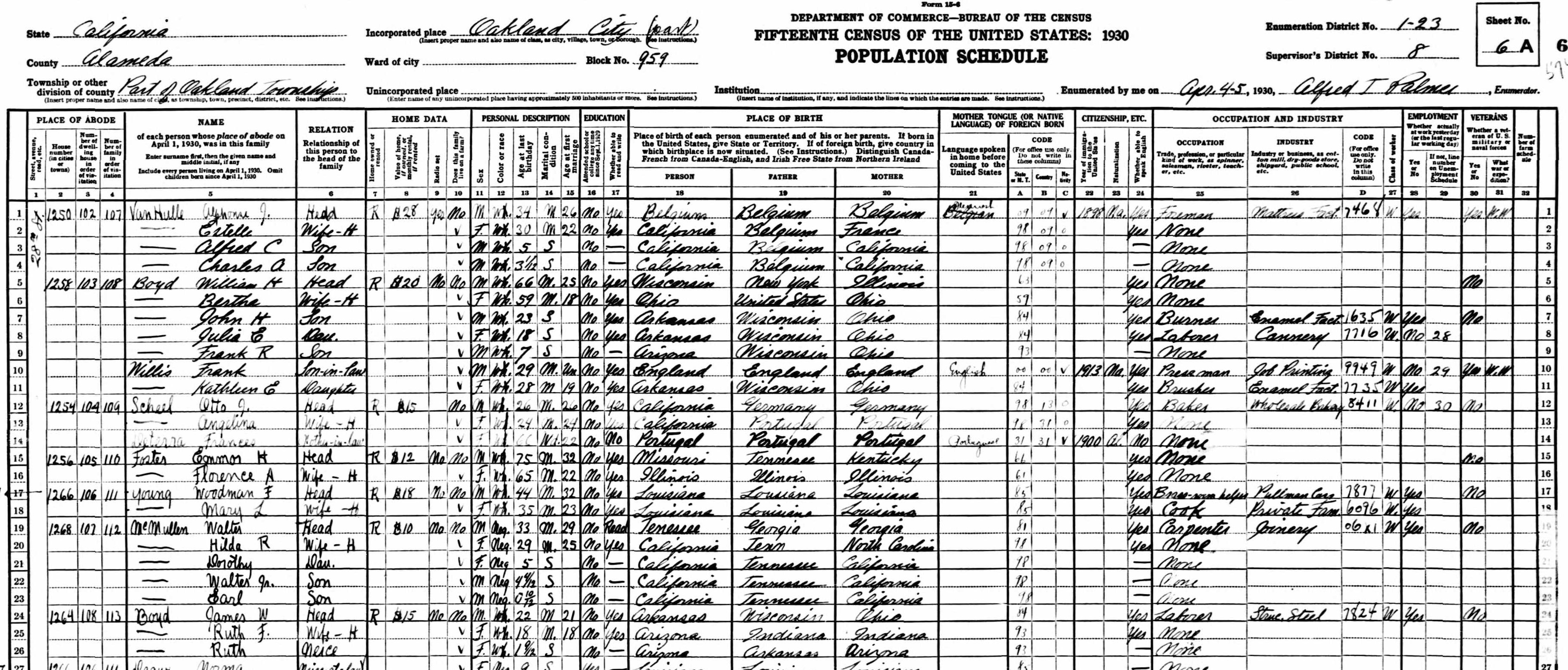
William H. Boyd,
Frank Willis,
James W. Boyd;
Street: 28th Street
(all three households);
Year: 1930;
Census Place: Oakland,
Alameda, California;
Page: 6A;
Enumeration District:
0023;
FHL microfilm: 2339837

John Cabral;
Street: 29 Avenue;
Year: 1930;
Census Place: Oakland,
Alameda, California;
Page: 19A;
Enumeration District:
0164;
FHL microfilm: 2339842

Josephine King;
Street: 39th;
Year: 1930;
Census Place:
Oakland, Alameda,
California;
Page: 16A;
Enumeration District:
0188;
FHL microfilm: 2339843
Marion, Linn, Iowa

Harley C. Silker;
Street: Seventh Avenue;
Year: 1930;
Census Place: Marion,
Linn, Iowa;
Page: 9B;
Enumeration District:
0026;
FHL microfilm: 2340399
Harvey, Wells, North Dakota

Anton P. Fettig;
Street: Lincoln Avenue;
Year: 1930;
Census Place: Harvey,
Wells, North Dakota;
Page: 3B;
Enumeration District:
0019;
FHL microfilm: 2341479
Precinct 3, Logan county, Colorado

Jacob Mahaler;
Year: 1930;
Census Place:
Precinct 3, Logan, Colorado;
Page: 7A;
Enumeration District: 0004;
FHL microfilm: 2339981.
District: 0004;
Description: PRECINCT 3,
ILIFF, EXCLUDING ILIFF TOWN
Source: United States of America, Bureau of the Census. Fifteenth Census of the United States, 1930. Washington, D.C.: National Archives and Records Administration, 1930. T626, 2,667 rolls.
1940
Oakland, Alameda, California

William Boyd;
Street: 17th St.;
Year: 1940;
Census Place: Oakland, Alameda,
California;
Roll: m-t0627-00442;
Page: 2A;
Enumeration District:
61-88

William Boyd;
Continuation of
previous record

Frank Willis;
Street: Peralta;
Year: 1940;
Census Place:
Oakland, Alameda,
California;
Roll: m-t0627-00443;
Page: 1B;
Enumeration District:
61-95

Frank Willis;
Continuation of
previous record

James Boyd (with
supplemental
questions for James
Boyd);
Street: 26th Street;
Year: 1940;
Census Place:
Oakland, Alameda,
California;
Roll: m-t0627-00442;
Page: 61A;
Enumeration District:
61-86

John Boyd;
Street: Kearney;
Year: 1940;
Census Place:
El Cerrito, Contra
Costa, California;
Roll: m-t0627-00196;
Page: 9B;
Enumeration District:
7-38

John Boyd;
Continuation of
previous record

questions:
Ted Boyd;
Continuation of
previous record

Danny Dorato;
Year: 1940;
Census Place:
Vacaville, Solano,
California;
Roll: m-t0627-00347;
Page: 61B;
Enumeration District:
48-28

Lloyd A. King;
Street: 36th Ave.;
Year: 1940;
Census Place:
Oakland, Alameda,
California;
Roll: m-t0627-00438;
Page: 9B;
Enumeration District:
61-232
Cedar Rapids, Linn, Iowa

Harold I. Silker;
Street: 8th St. N. E.;
Year: 1940;
Census Place:
Cedar Rapids, Linn,
Iowa;
Roll: m-t0627-01175;
Page: 10B;
Enumeration District:
57-41A
Denver, Denver, Colorado
Source: United States of America, Bureau of the Census. Sixteenth Census of the United States, 1940. Washington, D.C.: National Archives and Records Administration, 1940. T627, 4,643 rolls.
Copies of census records are shown below as thumbnails. Click on each thumbnail to view a larger version of the record in another tab.
1875
Stockton, Chautauqua, New York
Source: Ancestry.com. New York, U.S., State Census, 1875 [database on-line]. Provo, UT, USA: Ancestry.com Operations, Inc., 2013. Original data: Census of the state of New York, for 1875. Microfilm. New York State Archives, Albany, New York.
Images of portions of city directory pages are shown below as thumbnails. Click on each thumbnail to view a larger version of the record in another tab.
U.S. City Directories
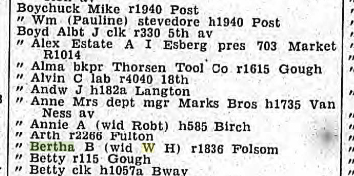
San Francisco,
California, City
Directory, 1933
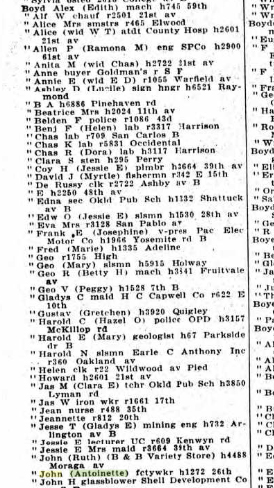
John and
Antoinette Boyd,
Oakland,
California, City
Directory, 1937

Mrs. Julia Dorato,
Oakland,
California, City
Directory, 1937
E. Willis,
Oakland,
California, City
Directory, 1939

Boyd,
Richmond, California,
City Directory, 1939
("El Cer" indicates that
they were actually living
in the neighboring city
of El Cerrito)
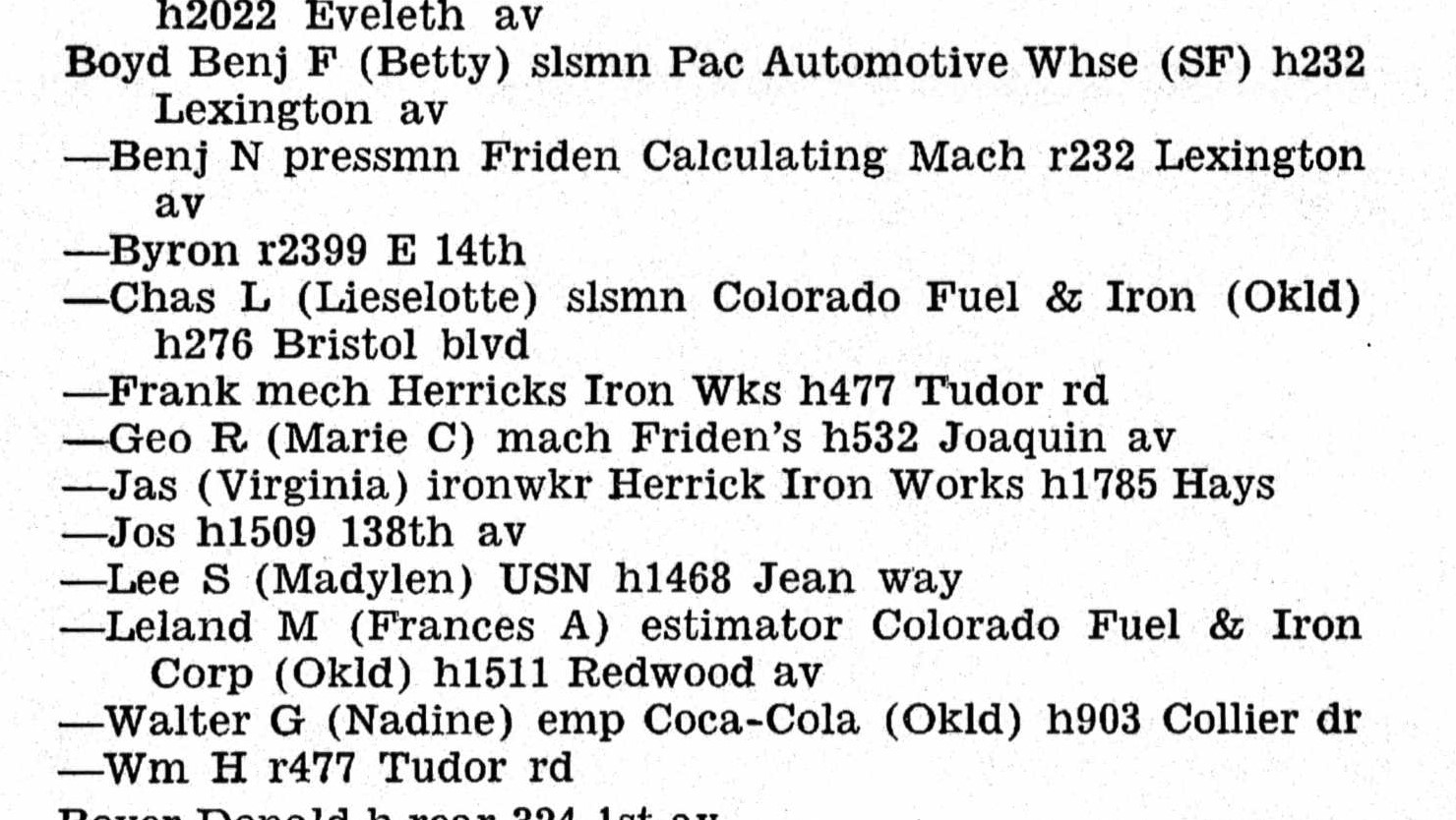
James and Virginia
Boyd, Wm. H. Boyd,
San Leandro,
California, City
Directory, 1955
(note that Wm. H. is
listed as living at the
same address as
Frank - Frank was
caring for his father
at the end of the
latter's life))

Jas. W. and Virginia Boyd,
John H. and Dolores Boyd,
San Leandro, California,
City Directory, 1956
Clinton, Iowa, City Directory, 1942
Silker Harold I (Rosella C) 2 constn lab Schick Hosp h 319 15th Av S
Source: Ancestry.com. U.S. City Directories, 1822-1995 [database
on-line]. Provo, UT, USA: Ancestry.com Operations, Inc., 2011.
Phoenix, Arizona City Directory, 1923
Source: Copy of a city directory page from the files of Darryl W. Boyd.
Images of the prison records are shown below as thumbnails. Click on each of the thumbnails to view a larger version of the record in another tab.
William Henry Boyd
Records of Prisoners, McNeil Island Penitentiary, Washington, 1933:
Source: NARA; Washington, DC; McNeil Island Penitentiary Records of Prisoners Received, 1887-1951; Microfilm Series: M1619; Microfilm Roll: 3 Source Information. Ancestry.com. McNeil Island, Washington, U.S. Penitentiary, Photos and Records of Prisoners Received, 1887-1939 [database on-line]. Provo, UT, USA: Ancestry.com Operations Inc, 2008.
Lloyd King
San Quention Inmate Photographs and Mug Books
Source: California State Archives; Sacramento, California; San Quentin 17 562394 to 55126; Ancestry.com. California, Prison and Correctional Records, 1851-1950 [database on-line]. Provo, UT, USA: Ancestry.com Operations, Inc., 2014. Original data: Department of Corrections. San Quentin State Prison Records, 1850–1950. ID #R135, California State Archives, Office of the Secretary of State, Sacramento, California.
San Quentin Prison Registers
Source: California State Archives; Sacramento, California; Secretary of State California State Archives San Quentin Prison Registers. Ancestry.com. California, Prison and Correctional Records, 1851-1950 [database on-line]. Provo, UT, USA: Ancestry.com Operations, Inc., 2014. Original data: Department of Corrections. San Quentin State Prison Records, 1850–1950. ID #R135, California State Archives, Office of the Secretary of State, Sacramento, California.
Source: California State Archives; Sacramento, California; San Quentin State Prison Inmate Identification Photograph Cards/Inmate 53781-55190; Source Information: Ancestry.com. California, Prison and Correctional Records, 1851-1950 [database on-line]. Provo, UT, USA: Ancestry.com Operations, Inc., 2014. Original data: Department of Corrections. San Quentin State Prison Records, 1850–1950. ID #R135, California State Archives, Office of the Secretary of State, Sacramento, California.
Images of the school records are shown below as thumbnails. Click on each of the thumbnails to view a larger version of the record in another tab.
1928 Marion High School, Marion, Iowa Yearbook
Source: "U.S., School Yearbooks, 1880-2012"; School Name: Marion High School; Year: 1928. Ancestry.com. U.S., School Yearbooks, 1900-1999 [database on-line]. Provo, UT, USA: Ancestry.com Operations, Inc., 2010.
Frank Boyd's Diplomas
Source: Copies of the junior high promotion certificate and high school diploma of Frank R. Boyd from the file of Darryl W. Boyd.
Arizona School Census Records
Name: Ruth Meyers
Age: 6
Birth Year: abt 1913
Date: 30 Jun 1919
Place: Maricopa, Arizona, USA
Parent 1: Melvin Meyers
District Number: 1
School: Phoenix
Source: Ancestry.com. Arizona, School Census Records, 1910-1917 [database on-line]. Provo, UT, USA: Ancestry.com Operations, Inc., 2016. This collection was indexed by Ancestry World Archives Project contributors. Original data: School Census Records. Arizona History and Archives Division, Phoenix, Arizona.
Images of the employment records are shown below as thumbnails. Click on each of the thumbnails to view a larger version of the record in another tab.
WPA Records
"The Works Progress Administration (renamed in 1939 as the Work
Projects Administration; WPA) was the largest and most ambitious
American New Deal agency, employing millions of unemployed people
(mostly unskilled men) to carry out public works projects,[1]
including the construction of public buildings and roads." (Wikipedia,
https://en.wikipedia.org/wiki/Works_Progress_Administration)
Note: Some of the following records are duplicates, where a portion of
the document scanned was blurred. Images appear in the order in which
they found in their respective folder.
Records in the WPA folder for William Henry Boyd:
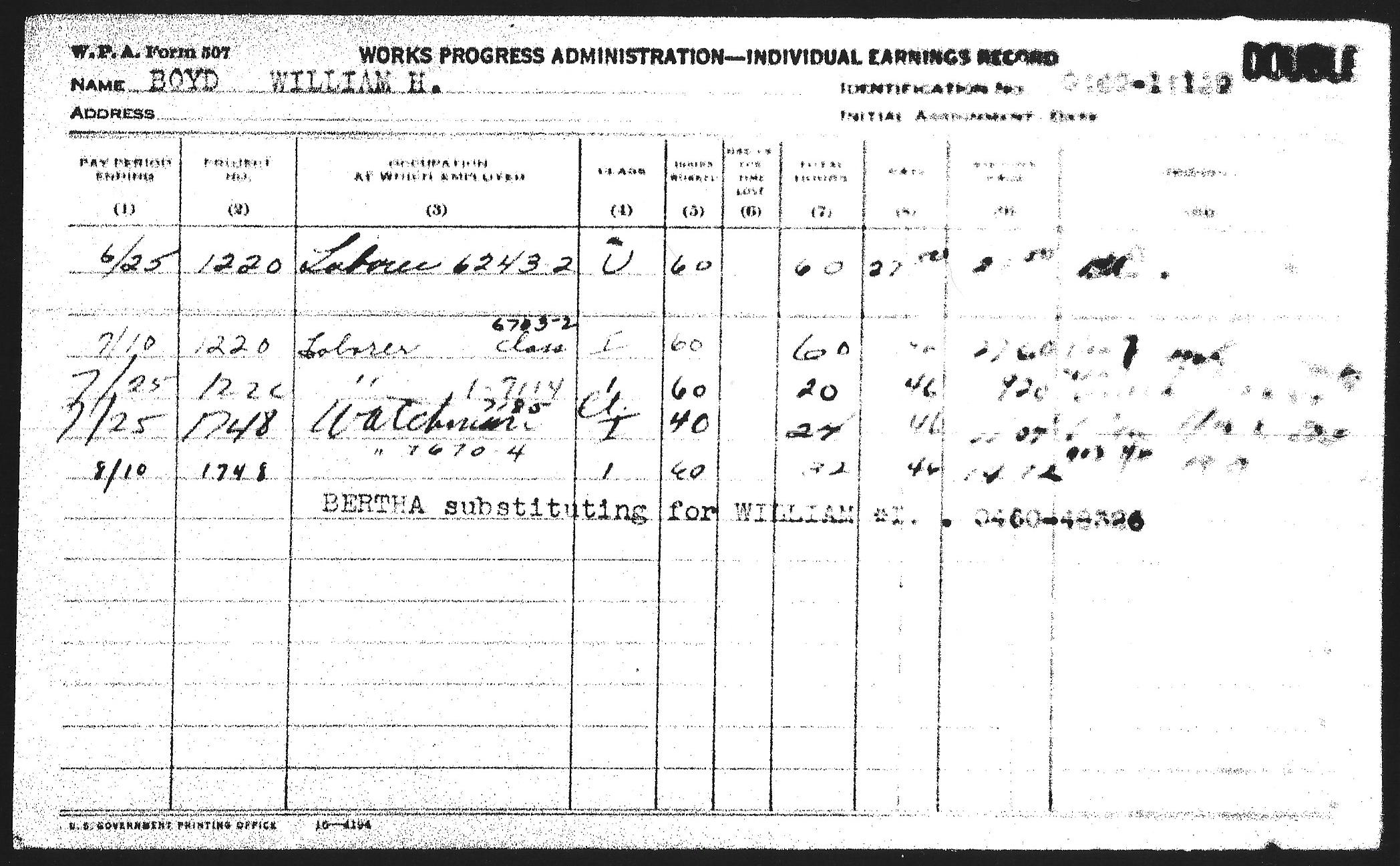
record, Copy 1

record, Copy 2
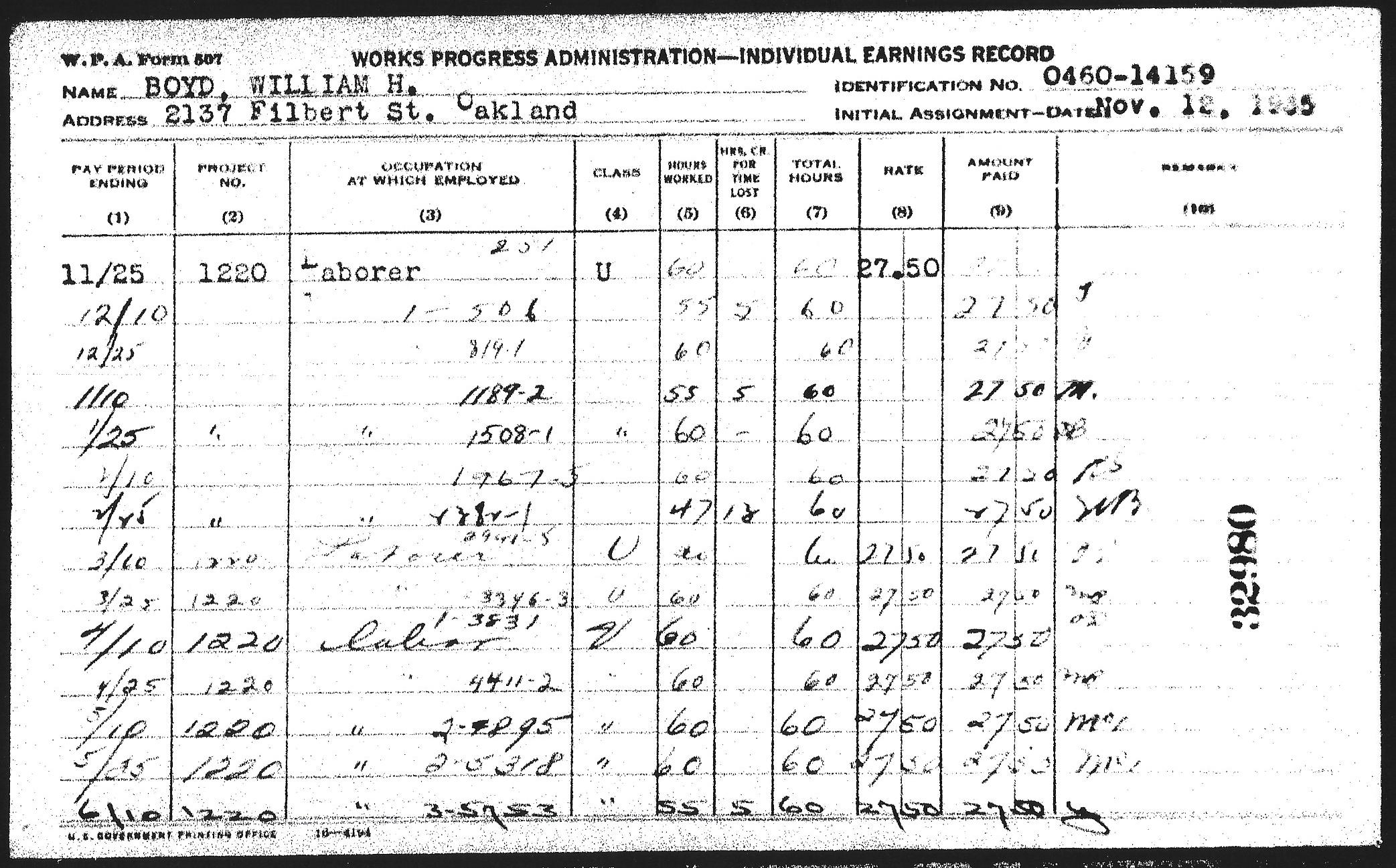
record
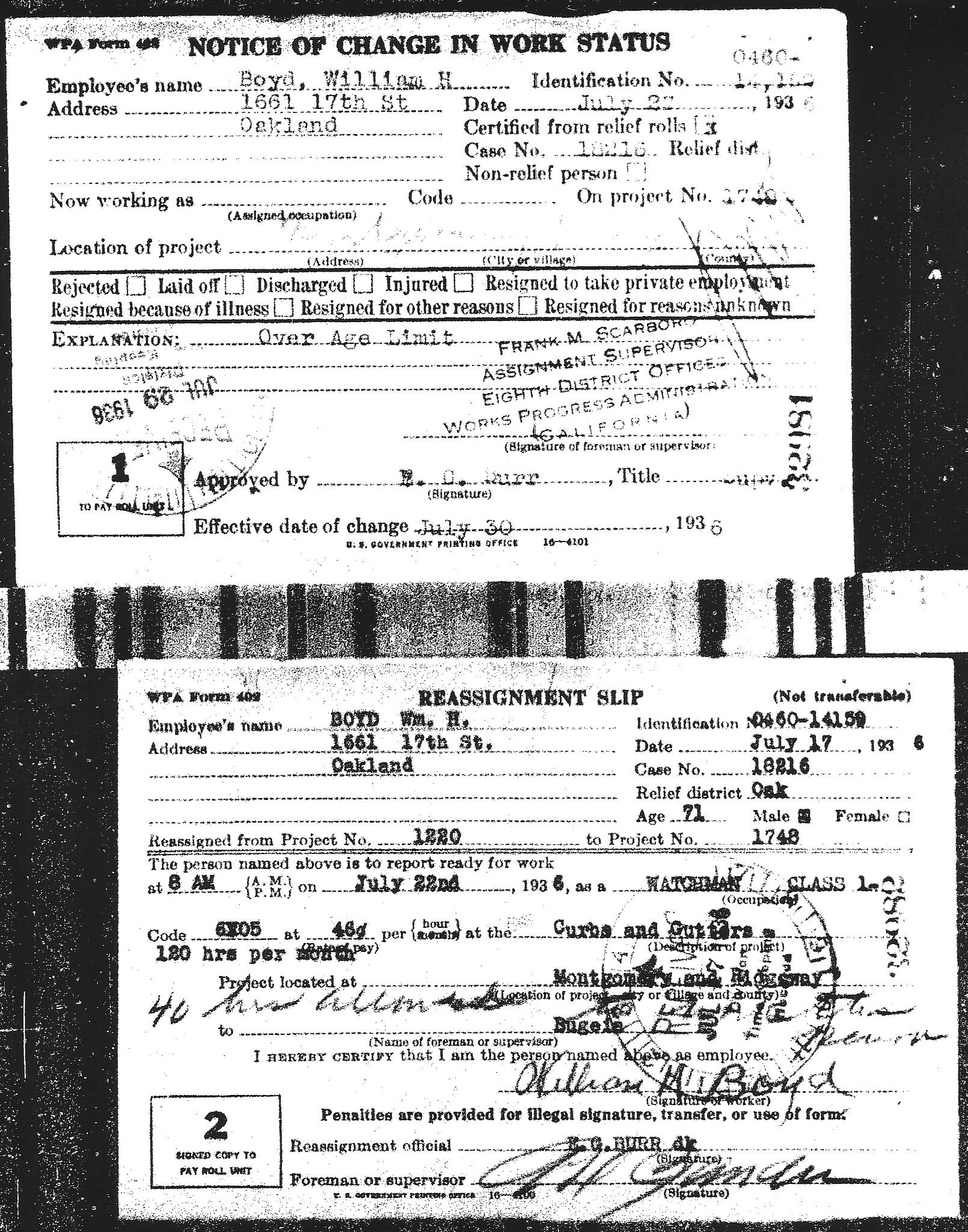
of work status and
reassignment slip,
July 1936
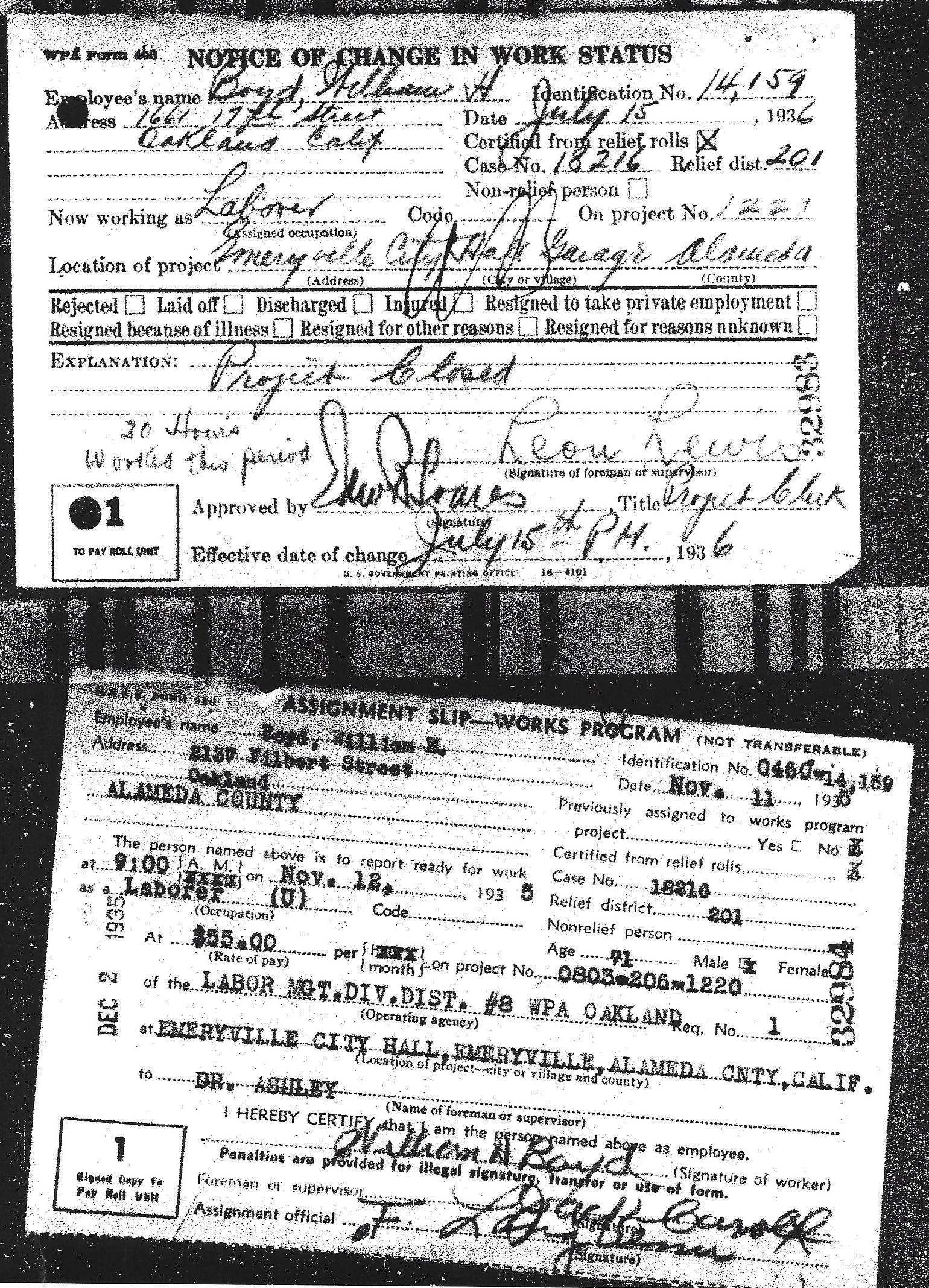
of work status,
July 1936,
Assignment slip,
Nov 1935
Records in the WPA folder for Bertha Boyd:
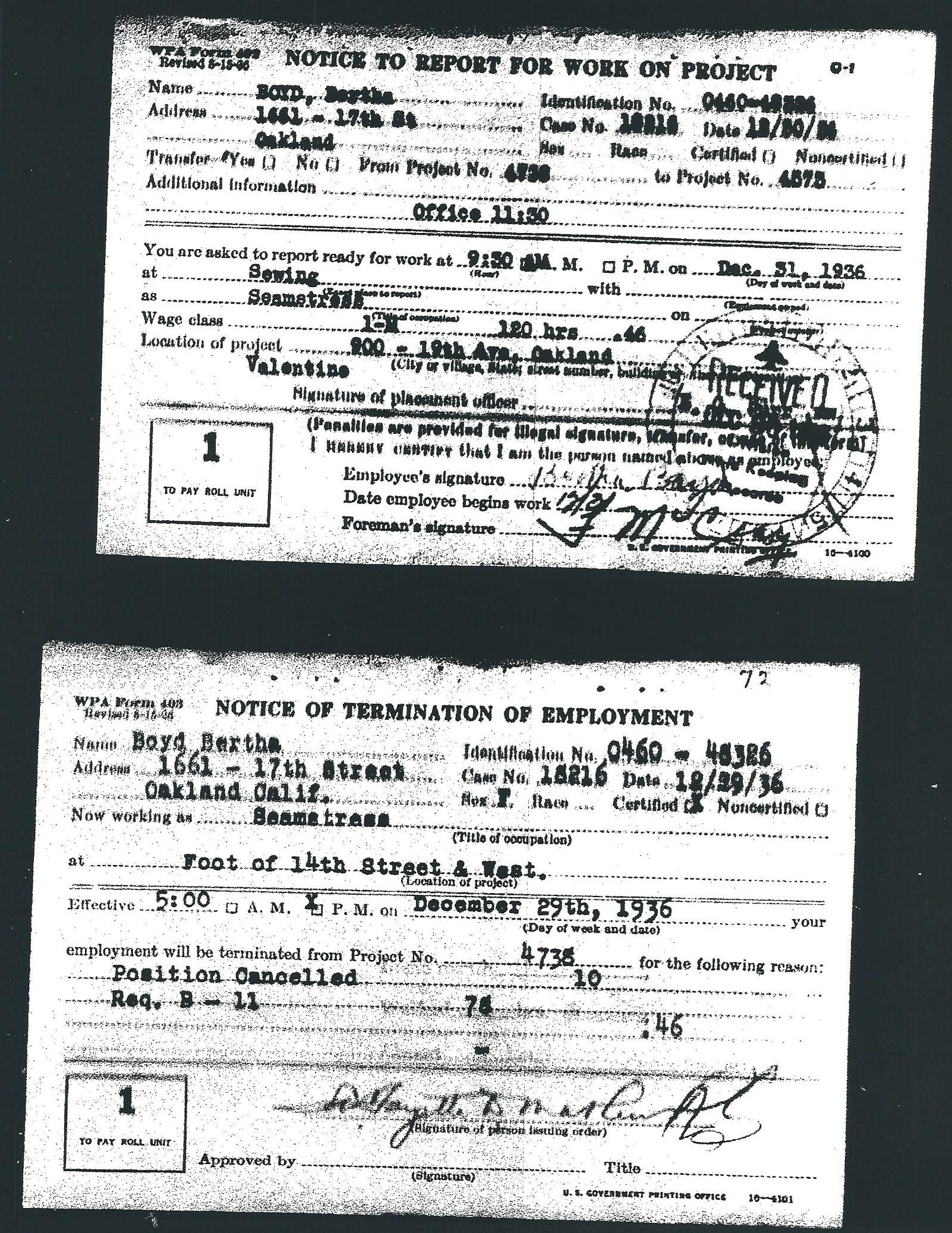
work on project,
31 Dec 1936,
Notice of
termination of
employment,
29 Dec 1936
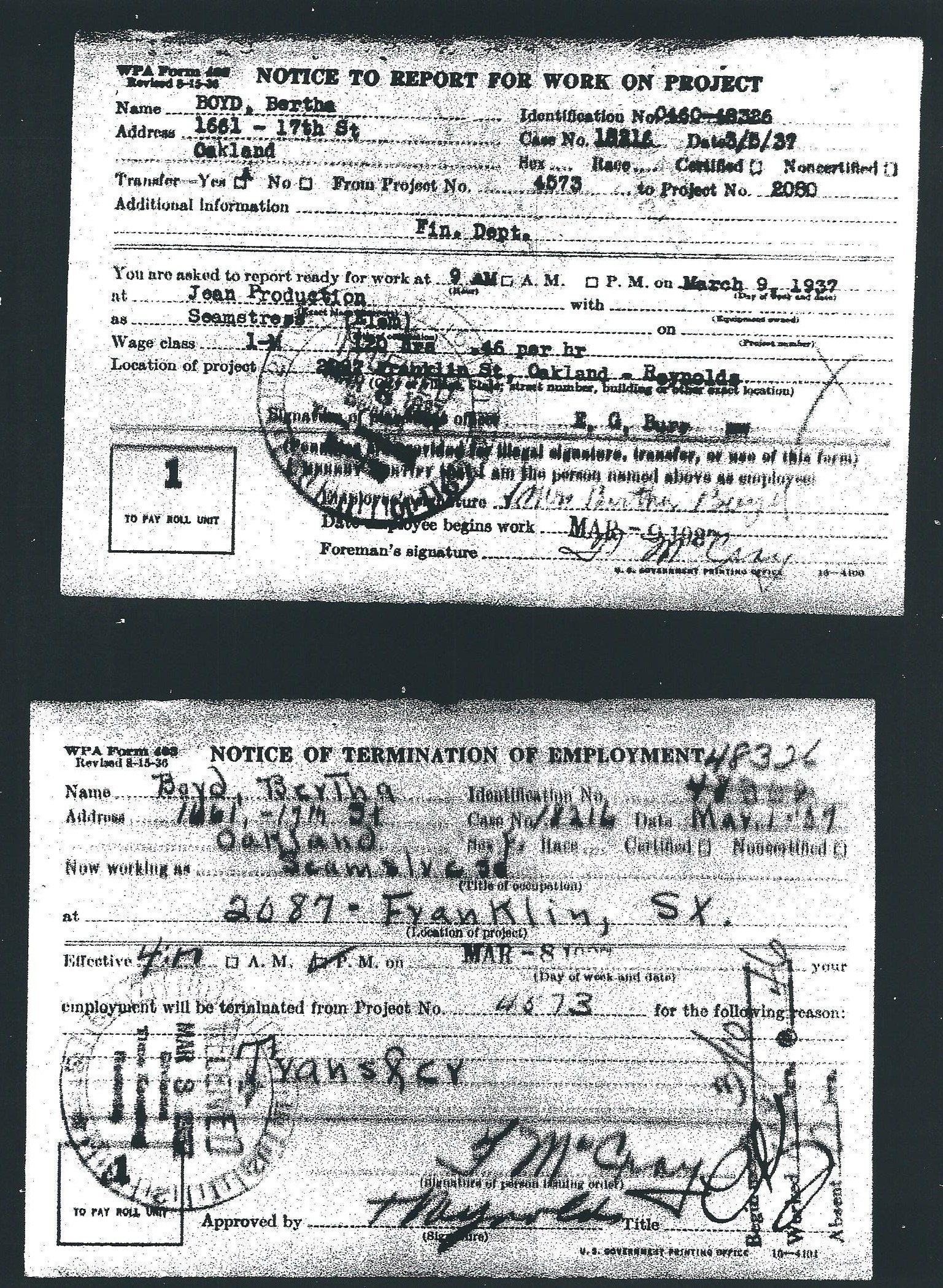
for work on project,
9 Mar 1937,
Notice of
termination of
employment,
May 193[?]
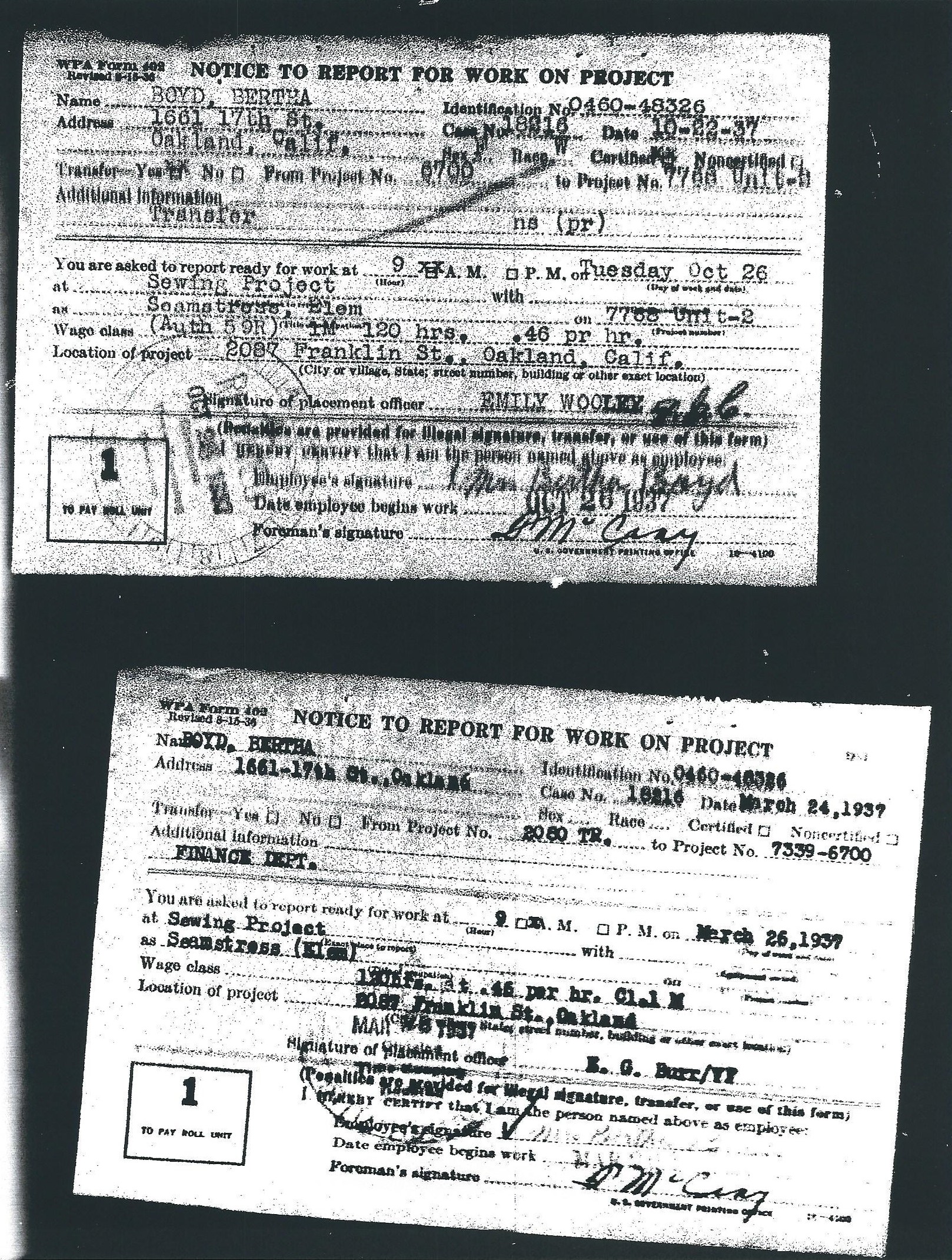
work on project,
26 Oct 1937,
Notice of
termination of
employment,
26 Mar 1937
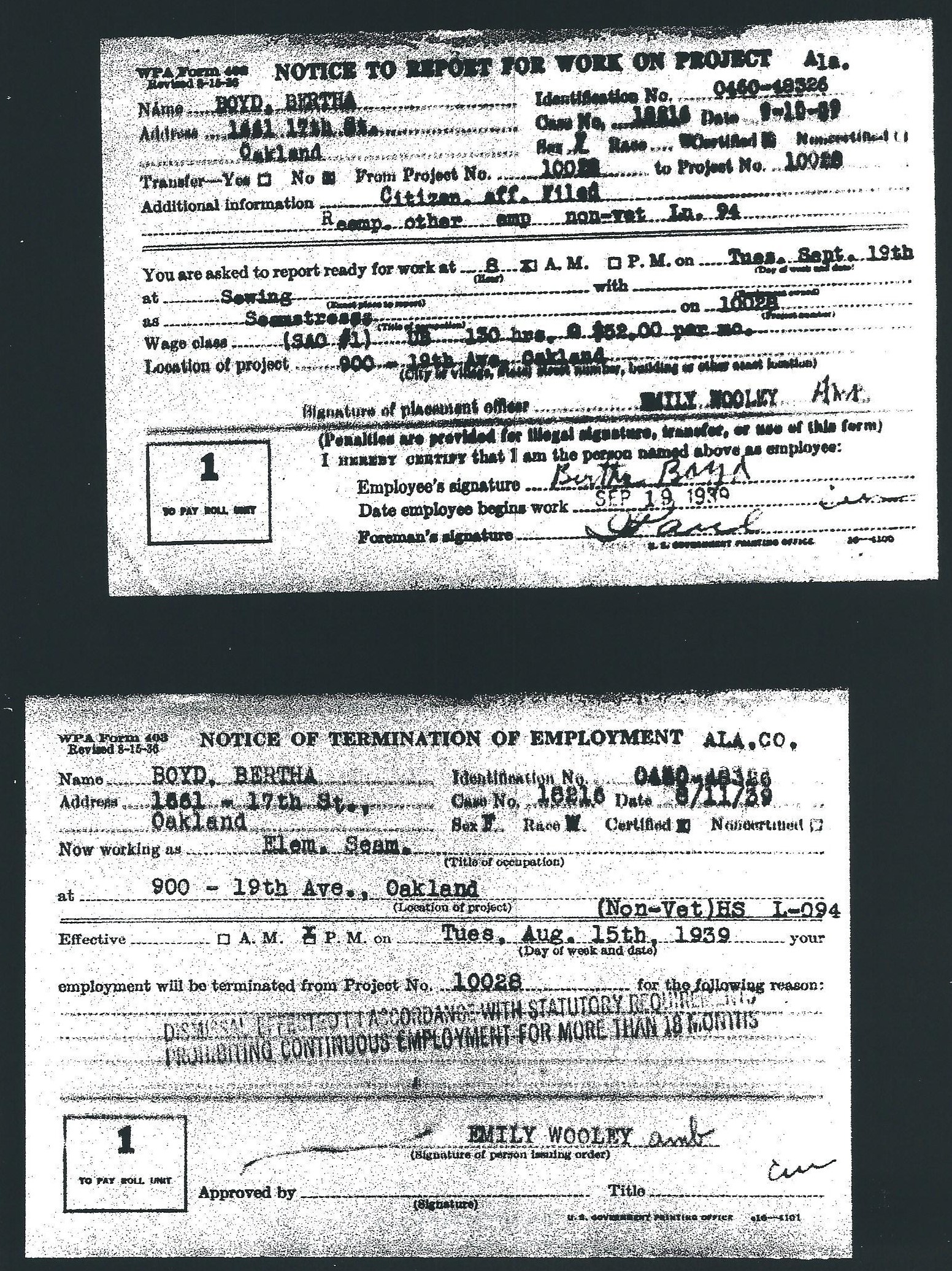
work on project,
19 Sep 1939,
Notice of
termination of
employment,
15 Aug 1939
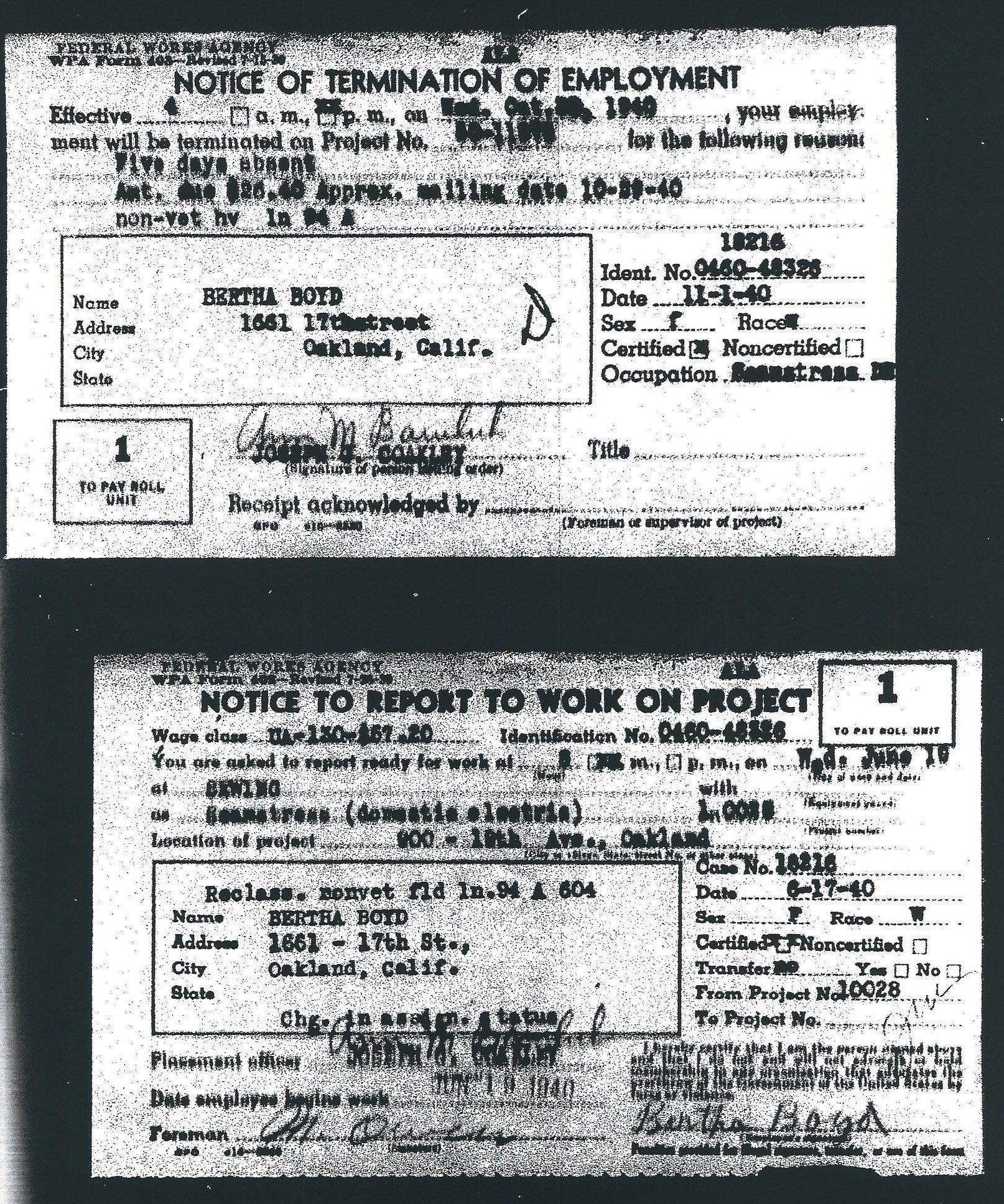
work on project,
[?] Oct 1940,
Notice of
termination of
employment,
17 Jun 1940

record
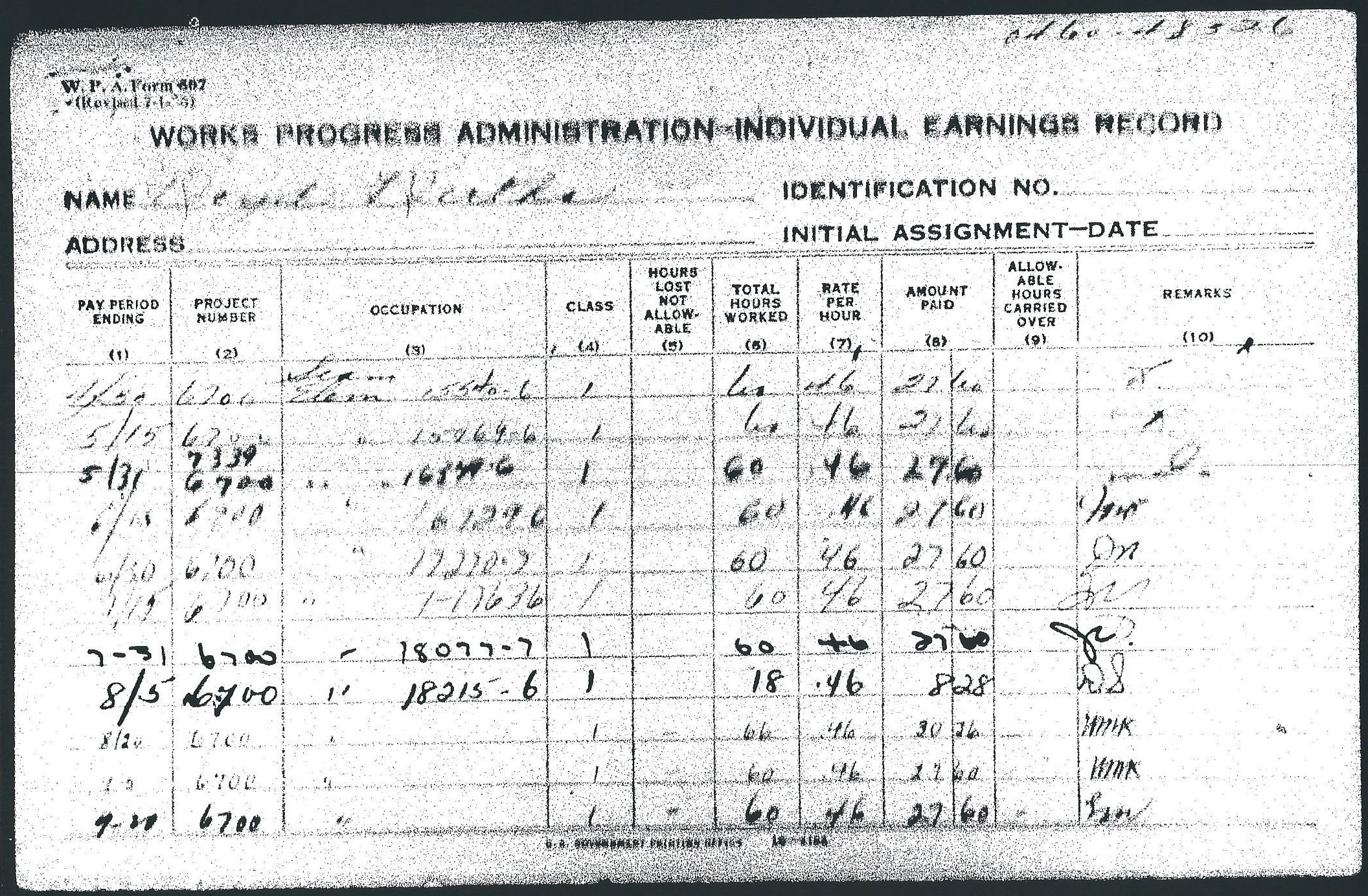
record
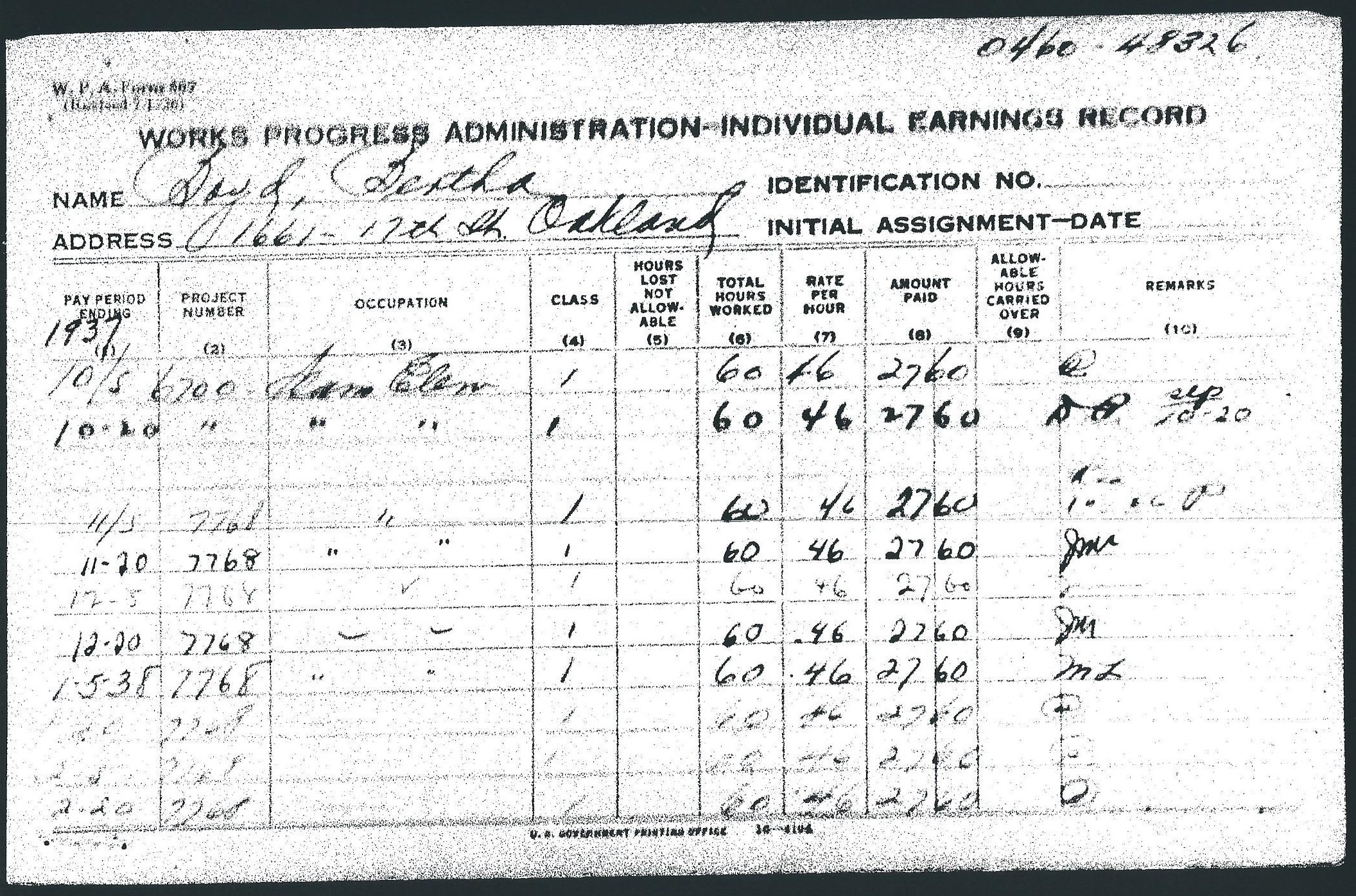
record
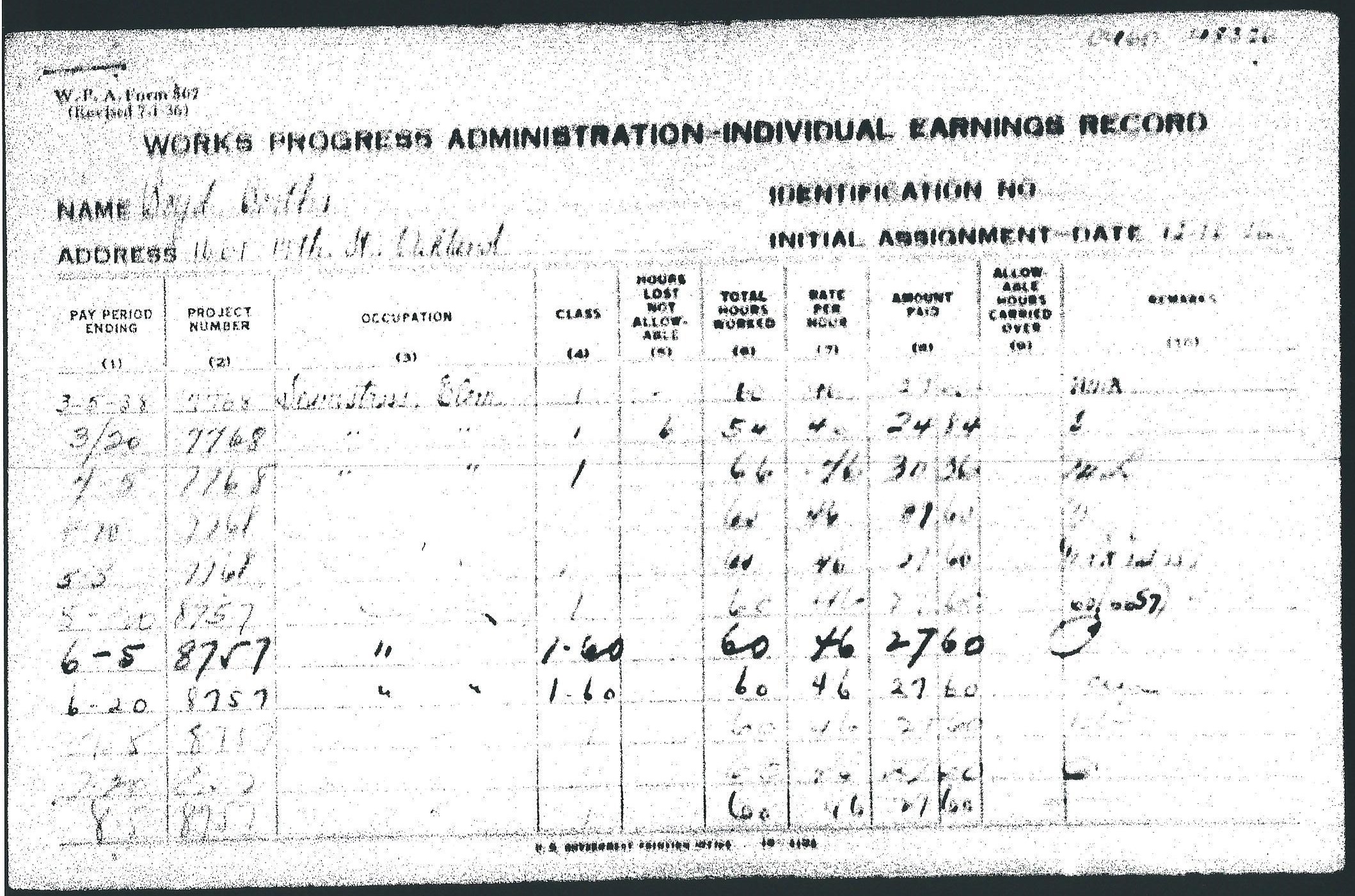
record
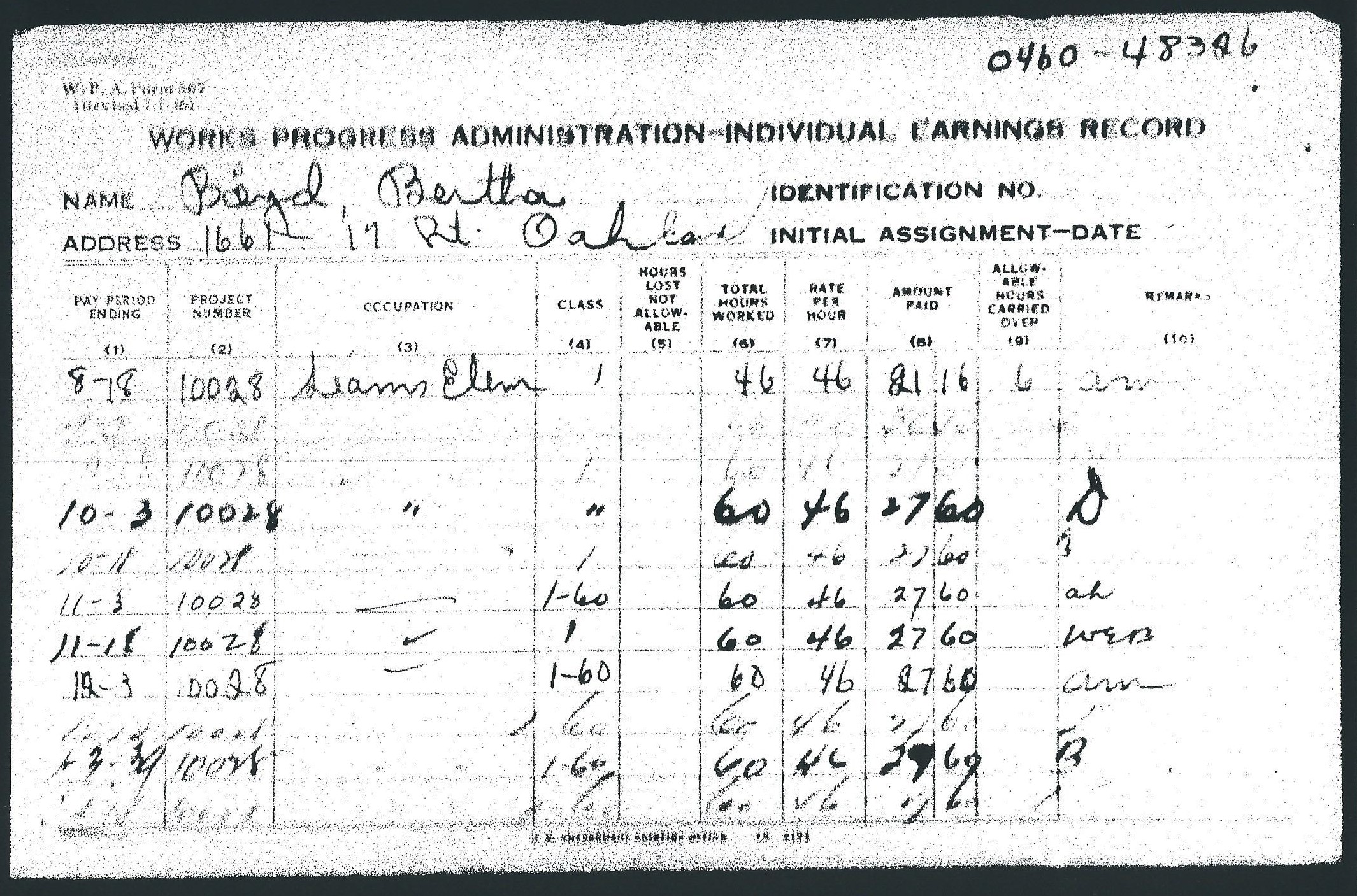
record
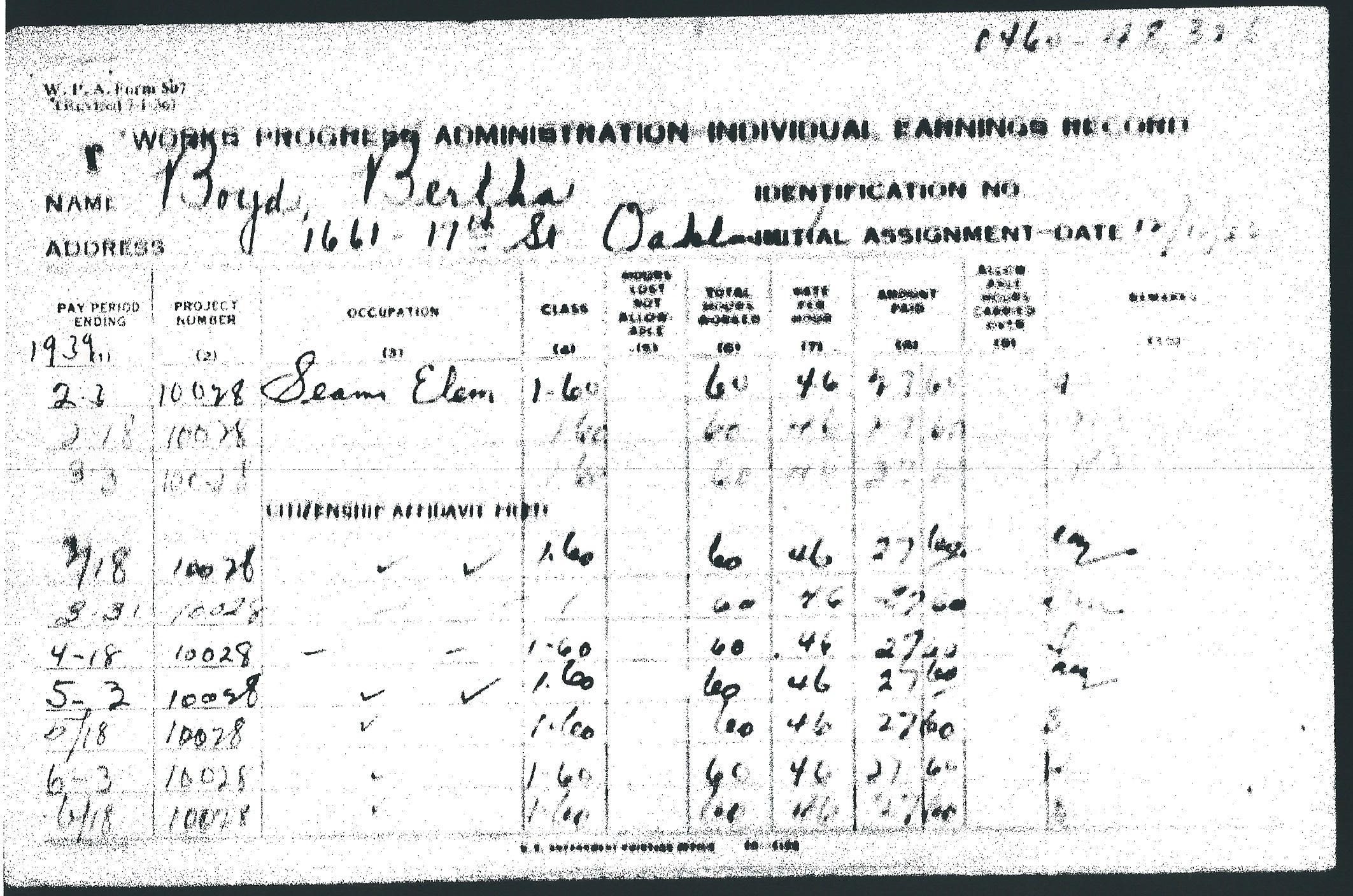
record
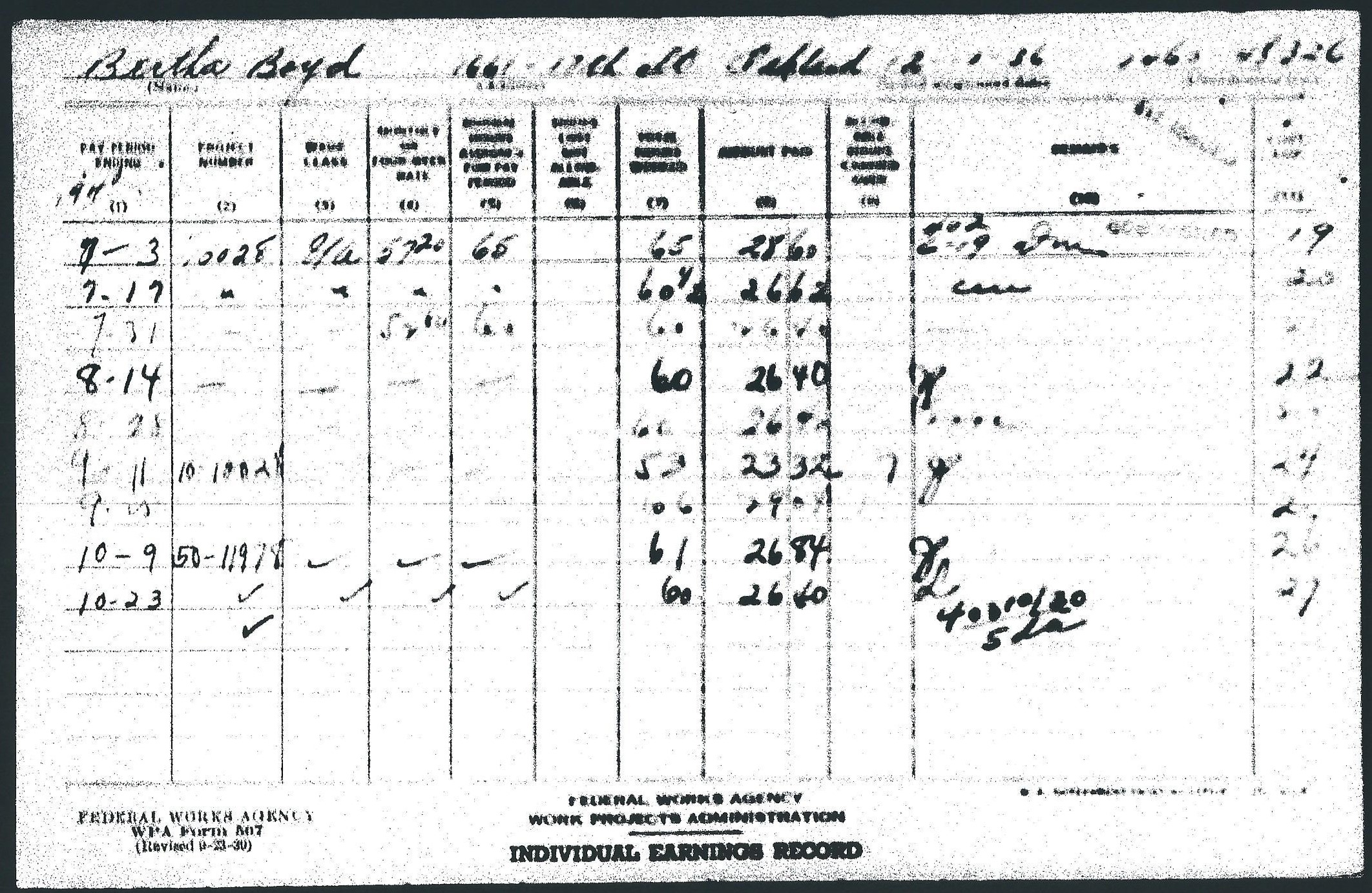
record

record
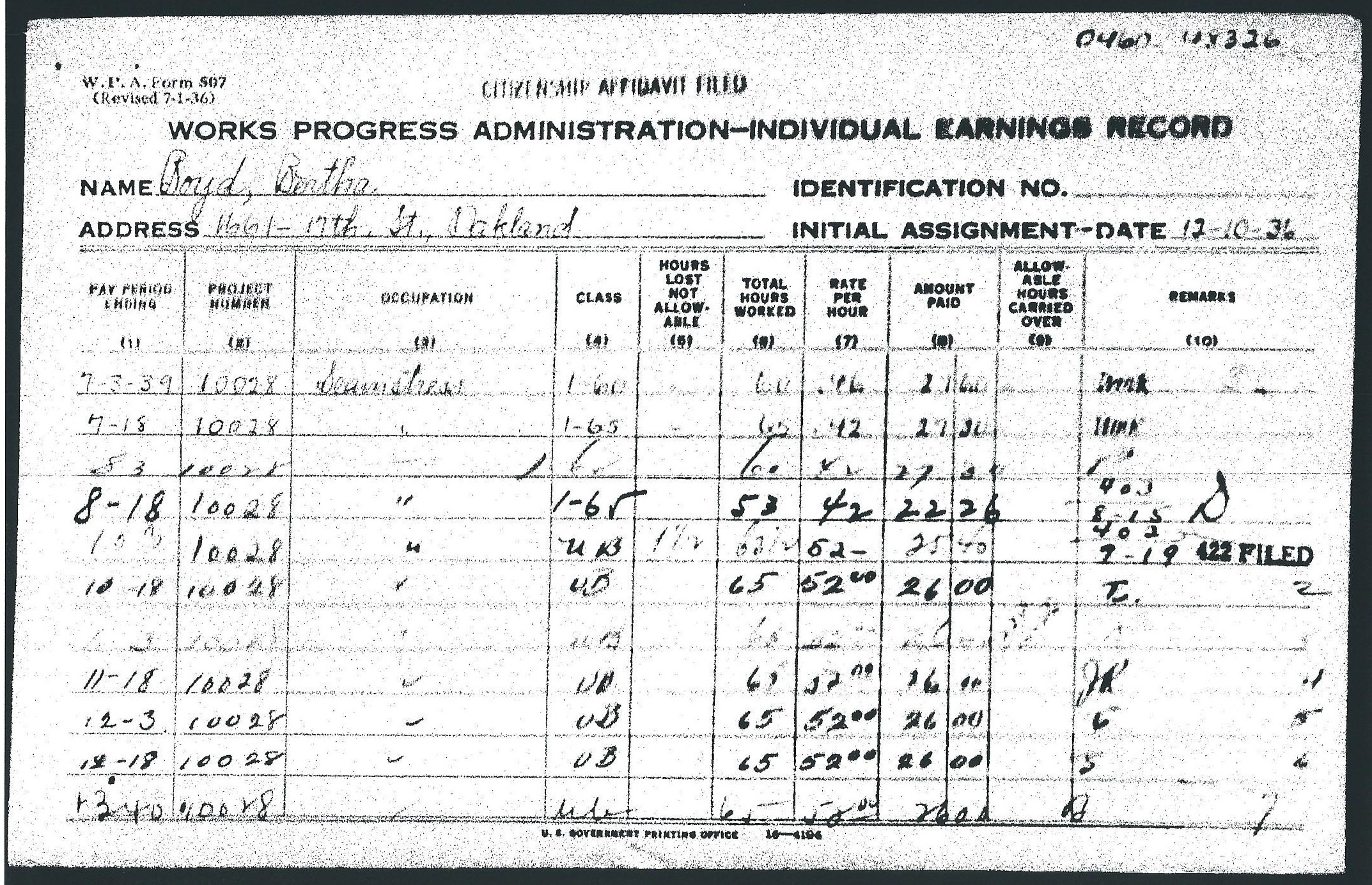
record
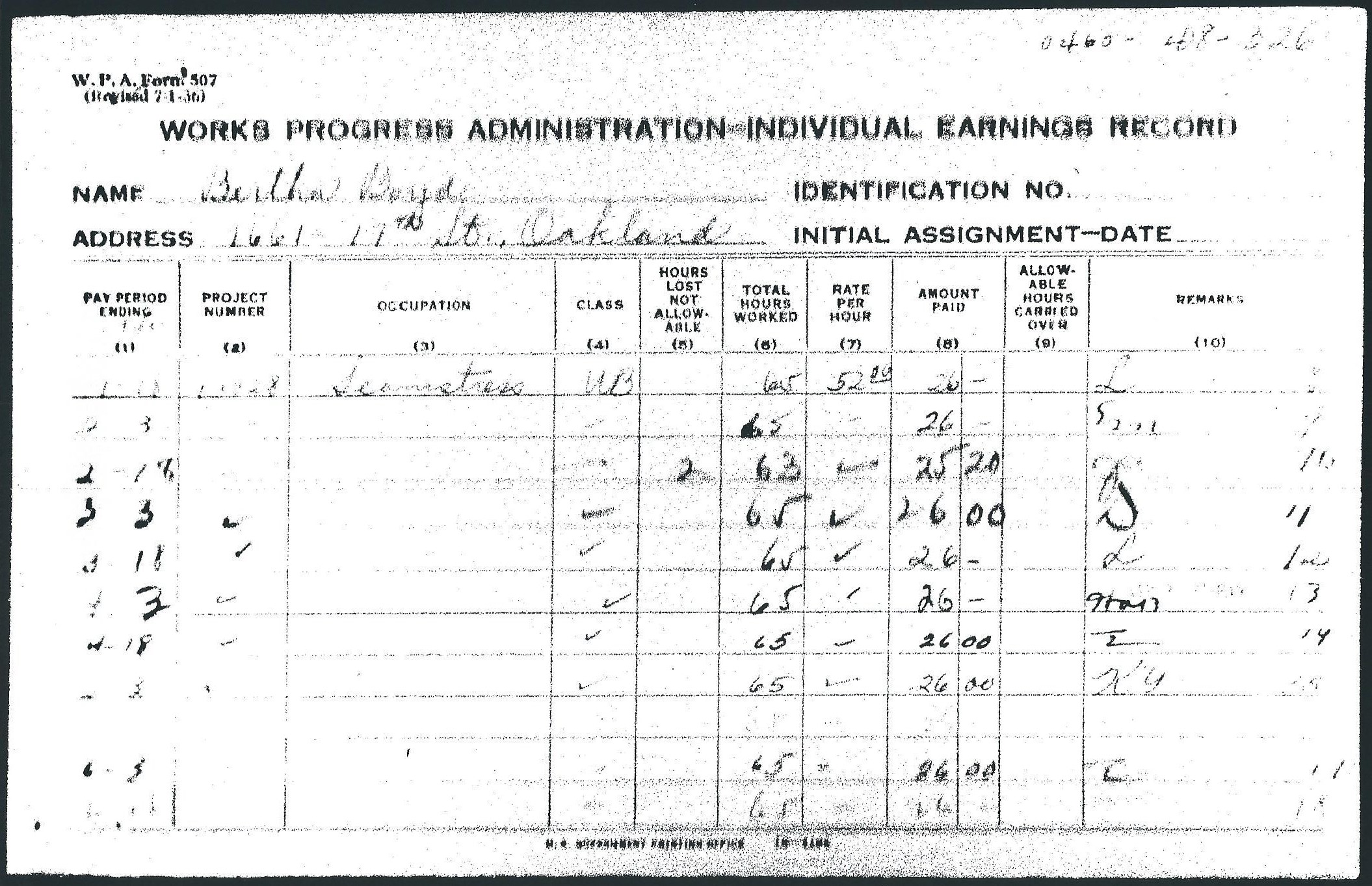
record
Source: Works Progress Administration folders for William Henry and Bertha Boyd, held at National Archives (National Personnel Records Center at St. Louis), photocopies obtained from the archives July 2016.
Railroad Employment Records
Source: Ancestry.com. U.S., Chicago and North Western Railroad Employment Records, 1935-1970 [database on-line]. Provo, UT, USA: Ancestry.com Operations, Inc., 2015.
Images of the military records are shown below as thumbnails. Click on each of the thumbnails to view a larger version of the record in another tab.
World War I Draft Registration Cards
Source: Ancestry.com. U.S., World War I Draft Registration Cards, 1917-1918 [database on-line]. Provo, UT, USA: Ancestry.com Operations Inc, 2005. Original data: United States, Selective Service System. World War I Selective Service System Draft Registration Cards, 1917-1918. Washington, D.C.: National Archives and Records Administration. M1509, 4,582 rolls. Imaged from Family History Library microfilm.
Honorable Discharge Papers of Frank R. Boyd, World War II
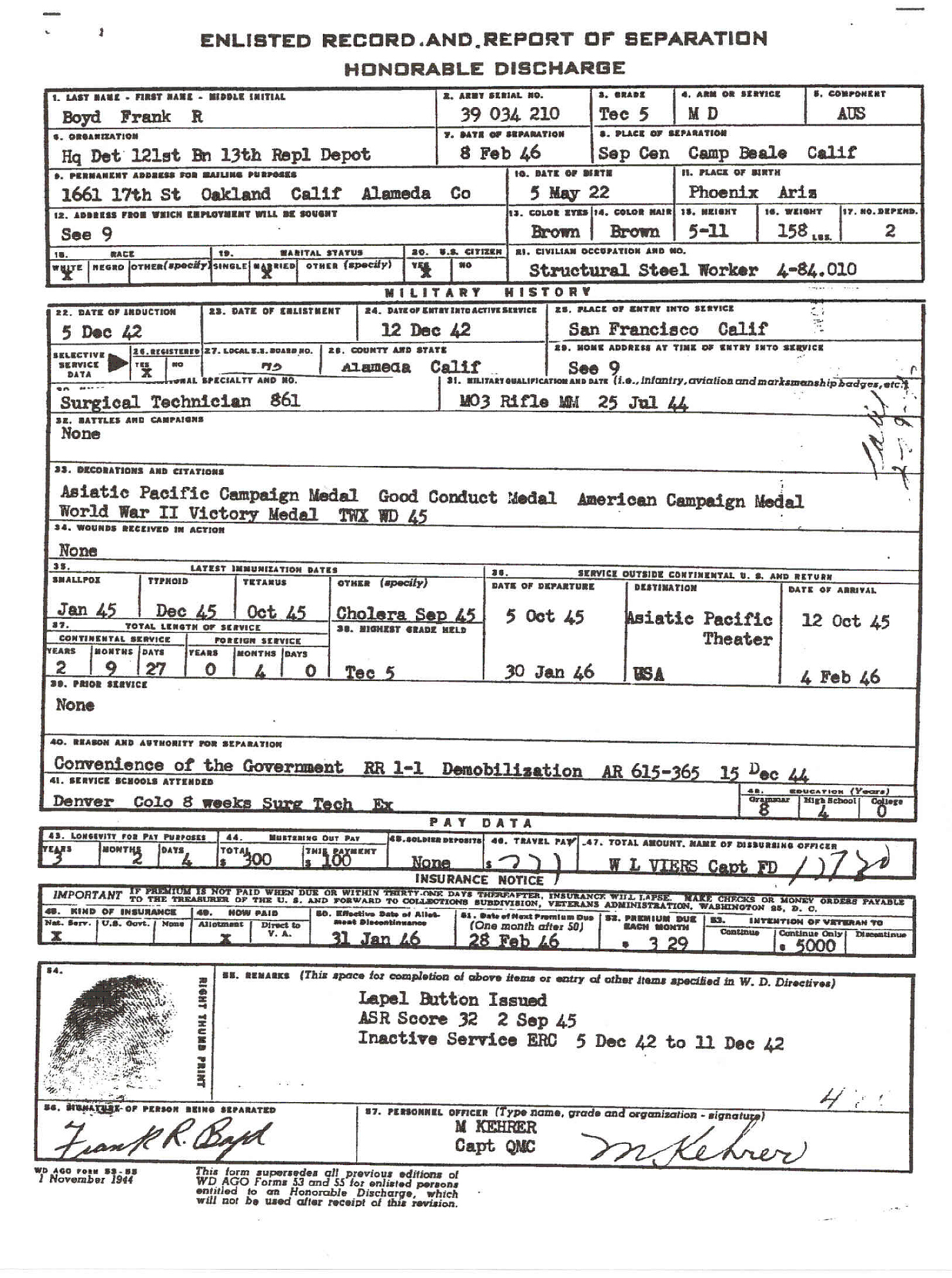
report of
separation
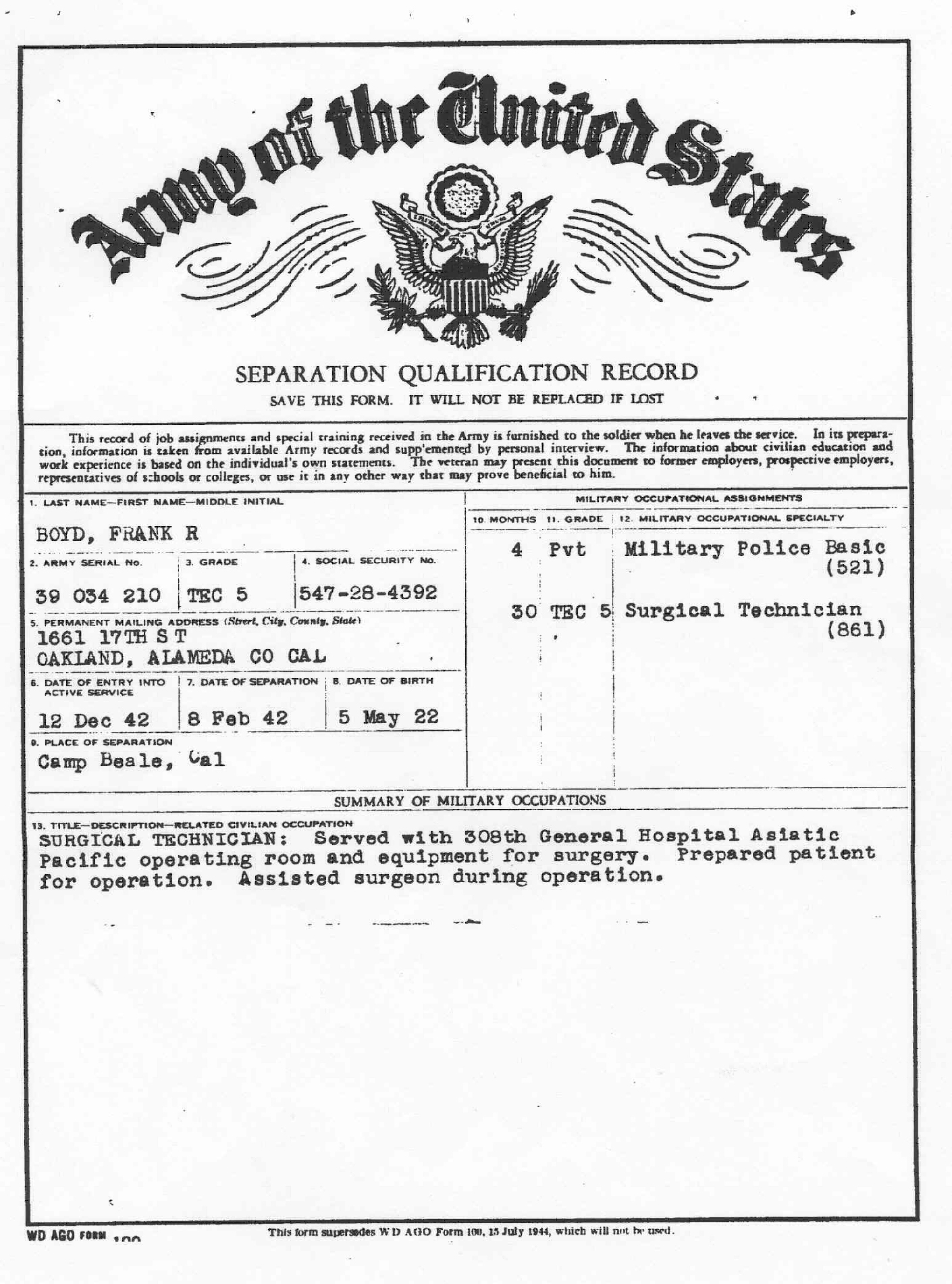
qualification record, page 1
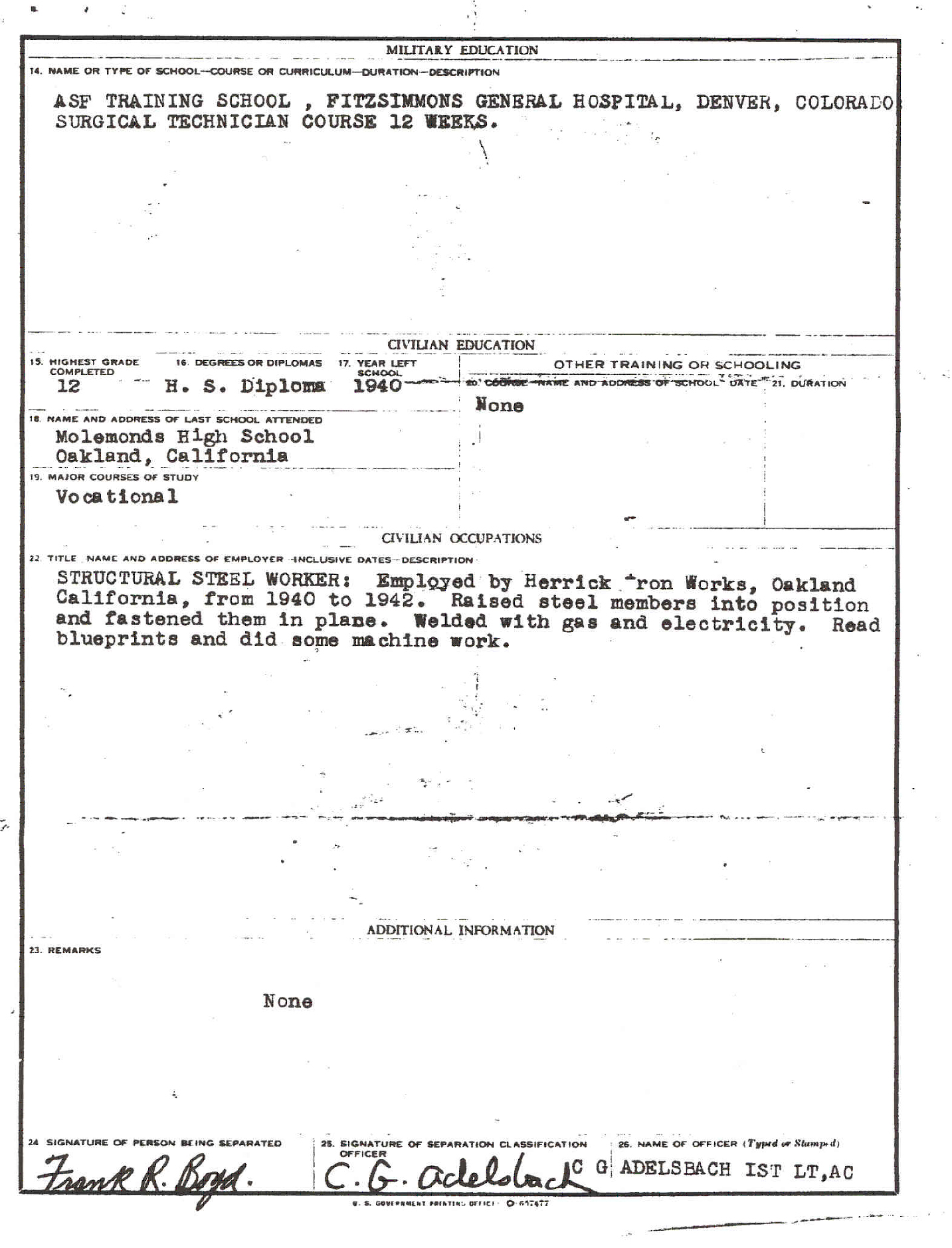
qualification
record, page 2
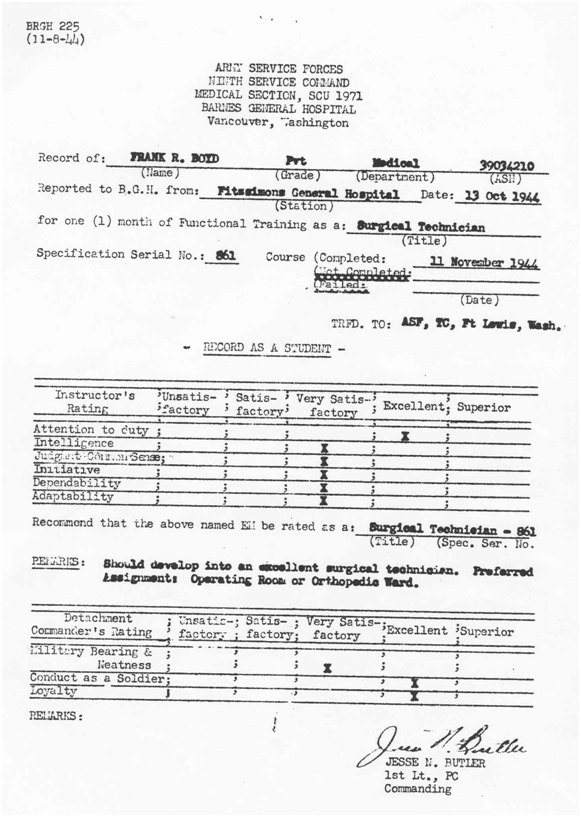
student
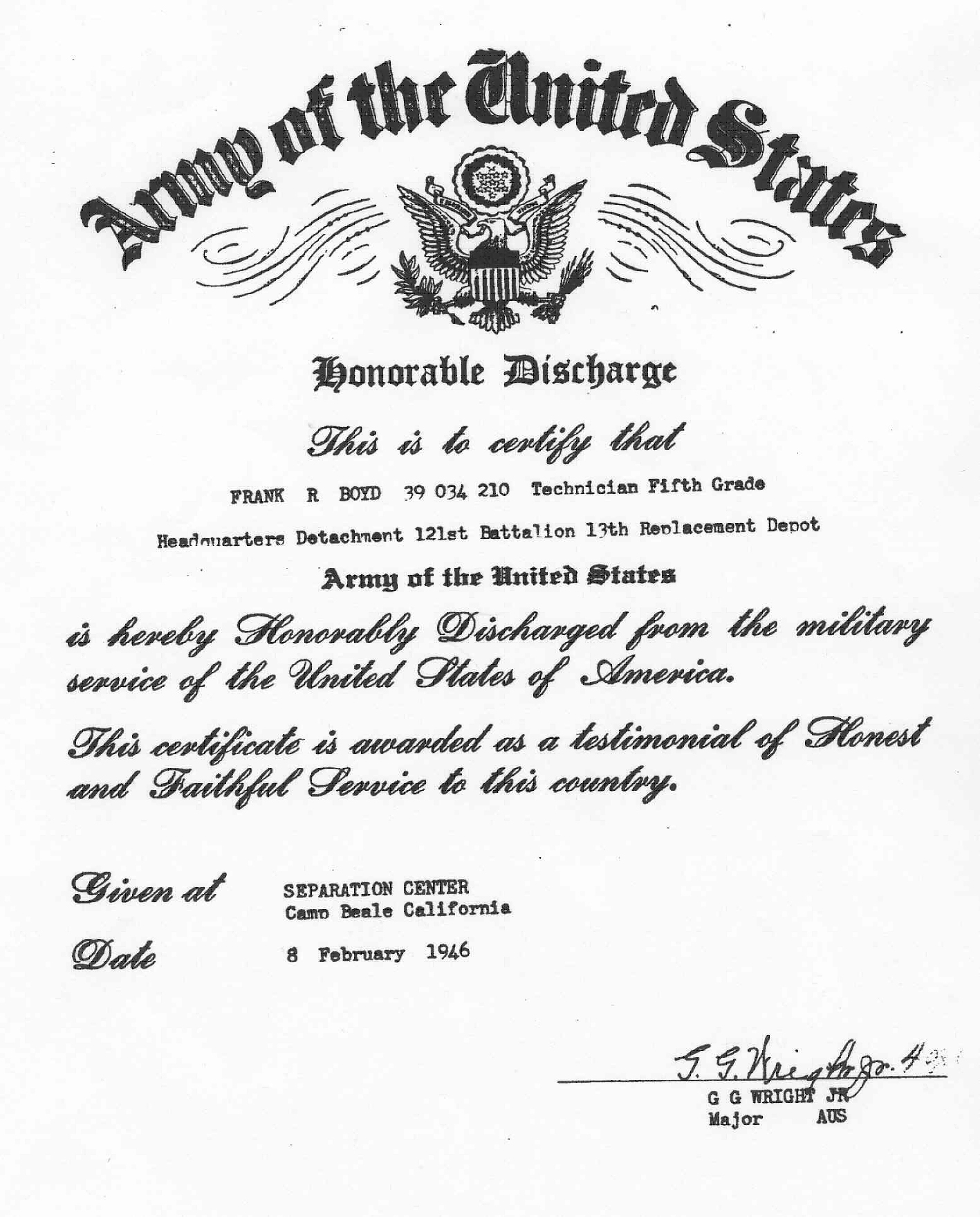
certificate
Source: Copy of military papers of Frank R. Boyd from the files of Darryl W. Boyd.
World War II Draft Registration Cards
Source: The National Archives at St. Louis; St. Louis, Missouri; Record Group Title: Records of the Selective Service System, 1926-1975; Record Group Number: 147. Ancestry.com. U.S., World War II Draft Registration Cards, 1942 [database on-line]. Lehi, UT, USA: Ancestry.com Operations, Inc., 2010. Original data: United States, Selective Service System. Selective Service Registration Cards, World War II: Fourth Registration. Records of the Selective Service System, Record Group Number 147. National Archives and Records Administration. Full Source Citation.
World War II US Army Enlistment Records
Name: Frank R Boyd
Birth Year: 1922
Race: White, citizen (White)
Nativity State or Country: Arizona
State of Residence: California
County or City: Alameda
Enlistment Date: 5 Dec 1942
Enlistment State: California
Enlistment City: San Francisco
Branch: Branch Immaterial - Warrant Officers, USA
Branch Code: Branch Immaterial - Warrant Officers,
USA
Grade: Private
Grade Code: Private
Term of Enlistment: Enlistment for the duration of
the War or other emergency, plus six months, subject to the discretion
of the President or otherwise according to law
Component: Selectees (Enlisted Men)
Source: Civil Life
Education: 4 years of high school
Civil Occupation: Semiskilled welders and flame
cutters
Marital Status: Married
Height: 70
Weight: 158
Source: National Archives and Records Administration. U.S. World War
II Army Enlistment Records, 1938-1946 [database on-line]. Provo, UT,
USA: Ancestry.com Operations Inc, 2005. Original data: Electronic Army
Serial Number Merged File, 1938-1946 [Archival Database]; ARC:
1263923. World War II Army Enlistment Records; Records of the National
Archives and Records Administration, Record Group 64; National
Archives at College Park. College Park, Maryland, U.S.A.
U.S. World War II Draft Cards, Young Men
Name: John Henry Boyd
Gender: Male
Race: White
Age: 35
Relationship to Draftee: Self (Head)
Birth Place: Pine Bluff, Arkansas, USA
Birth Date: 16 Oct 1905
Residence Place: Richmond, Contra Costa, California,
USA
Registration Date: 16 Oct 1940
Employer: Payne And Mahoney
Weight: 155
Complexion: Light
Eye Color: Gray
Hair Color: Blonde
Height: 5 10
Next of Kin: Antonette Boyd
Household Members:
Name
Relationship
John Henry Boyd Self (Head)
Antonette Boyd Wife
Box: 190
Name: Danny Dorato
Gender: Male
Race: White
Age: 40
Relationship to Draftee: Self (Head)
Birth Place: Oakland, California, USA
Birth Date: 21 Mar 1903
Registration Date: 27 Aug 1943
Employer: Southern Pacific Co
Weight: 142
Complexion: Light
Eye Color: Brown
Hair Color: Brown
Height: 5 4
Next of Kin: Julia Dorato
Household Members:
Name
Relationship
Danny Dorato Self (Head)
Box: 477
Name: Lloyd Aloyweshes King
Gender: Male
Race: White
Age: 30
Relationship to Draftee: Self (Head)
Birth Place: Oakland, California, USA
Birth Date: 25 Mar 1910
Residence Place: Oakland, Alameda, California, USA
Registration Date: 16 Oct 1940
Employer: Moore Shipyard
Weight: 172
Complexion: Light Brown
Eye Color: Hazel
Hair Color: Brown
Height: 5 10
Next of Kin: Josephine King
Household Members:
Name
Relationship
Lloyd Aloyweshes King Self (Head)
Josephine
King
Mother
Box: 964
Name: James Wm Boyd
Gender: Male
Race: White
Age: 33
Relationship to Draftee: Self (Head)
Birth Place: Pine Bluff, Arkansas, USA
Birth Date: 23 Aug 1907
Residence Place: Oakland, Alameda, California, USA
Registration Date: 16 Oct 1940
Employer: Herrick Iron Works
Weight: 220
Complexion: Ruddy
Eye Color: Gray
Hair Color: Brown
Height: 5 8
Next of Kin: Virginia Boyd
Household Members:
Name
Relationship
James Wm Boyd Self (Head)
Virginia Boyd
Wife
Box: 190
Name: Frank Richard Boyd
Gender: Male
Race: White
Age: 20
Relationship to Draftee: Self (Head)
Birth Place: Phoenix, Arizona, USA
Birth Date: 5 May 1922
Residence Place: Oakland, Alameda, California, USA
Registration Date: 30 Jun 1942
Employer: Richmond
Weight: 160
Complexion: Light
Eye Color: Brown
Hair Color: Brown
Height: 5 10
Next of Kin: Lavonne Boyd
Household Members:
Name Relationship
Frank Richard Boyd Self (Head)
Lavonne Boyd Wife
Box: 189
Name: Joseph Philip Fettig
Gender: Male
Race: White
Age: 28
Relationship to Draftee: Self (Head)
Birth Date: 16 Sep 1912
Birth Place: Orrin, North Dakota, USA
Residence Place: Oakland, Alameda, California, USA
Registration Date: 16 Oct 1940
Employer: Herrick Iron Works
Weight: 155
Complexion: Light Brown
Eye Color: Brown
Hair Color: Brown
Height: 5 9
Next of Kin: Marie Edna Fettig
Household Members:
Name Relationship
Joseph Philip Fettig Self (Head)
Marie Edna Fettig Wife
Source: Ancestry.com. U.S. WWII Draft Cards Young Men, 1940-1947
[database on-line]. Lehi, UT, USA: Ancestry.com Operations, Inc.,
2011. Original data: The National Archives in St. Louis, Missouri; St.
Louis, Missouri; Record Group: Records of the Selective Service
System.
Images of voting records are shown below as thumbnails. Click on each thumbnail to view a larger version of the record in another tab.
Great Register of Voters (California)
1928,
Supplement -
Oakland Precinct
No. 441,
Roll 028
November 3, 1936,
Oakland Precinct
No. 462,
Roll 041

November 5, 1940,
Oakland Precinct
No. 705,
Roll 052

Frank Richard Boyd,
William H. Boyd,
November 7, 1944,
Index of Affidavits
of Registration,
Precinct - Oakland
754,
Roll 062
Source: California State Library; Sacramento, California; Great Register of Voters, 1900-1968; Ancestry.com. California, Voter Registrations, 1900-1968 [database on-line]. Provo, UT, USA: Ancestry.com Operations Inc, 2017. Original data: State of California, United States. Great Register of Voters. Sacramento, California: California State Library.
Images of immigration records are shown below as thumbnails. Click on each thumbnail to view a larger version of the record in another tab.
Passenger Lists
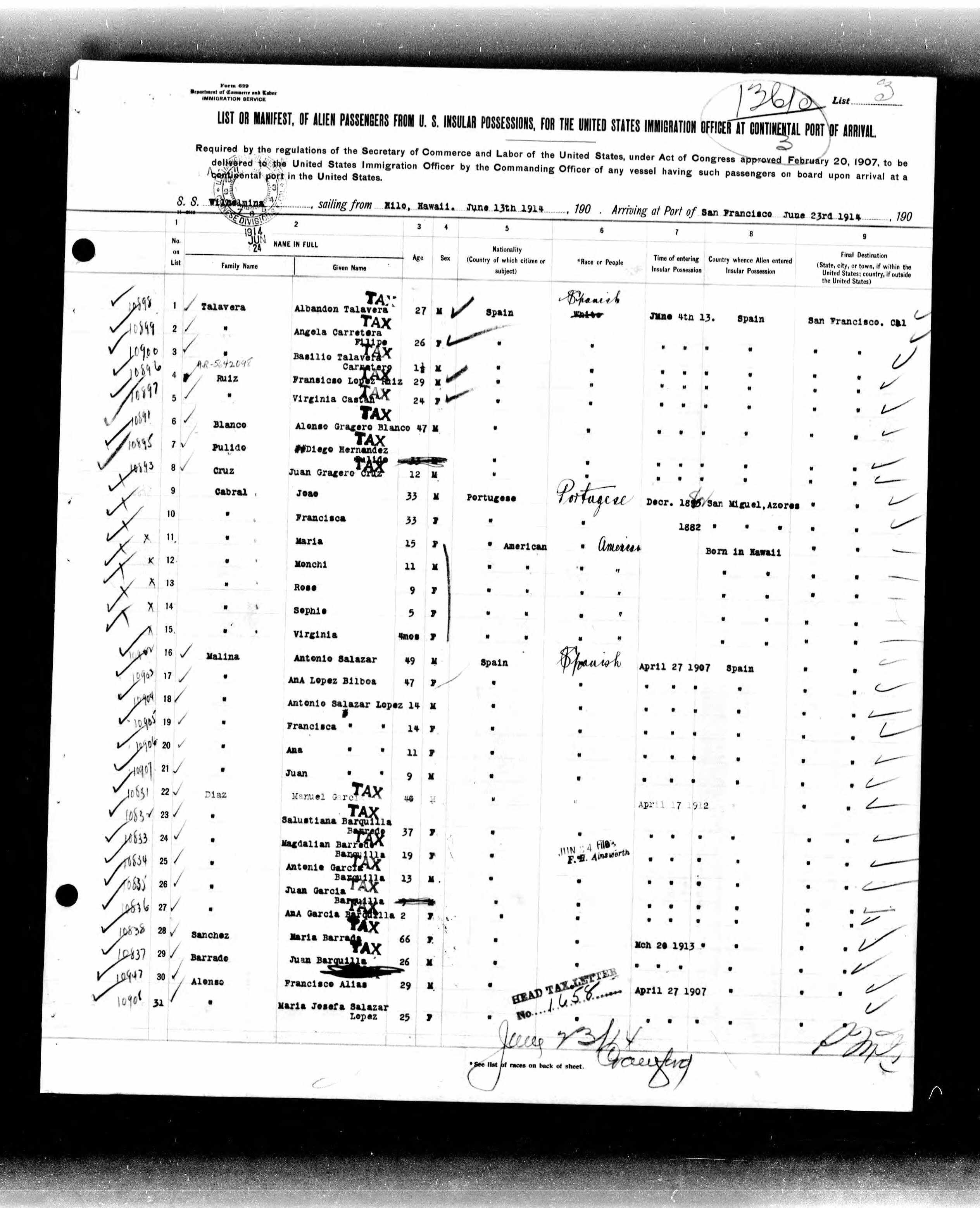
aboard the SS
Wilhelmina from
Hilo, Hawaii to San
Francisco,
California
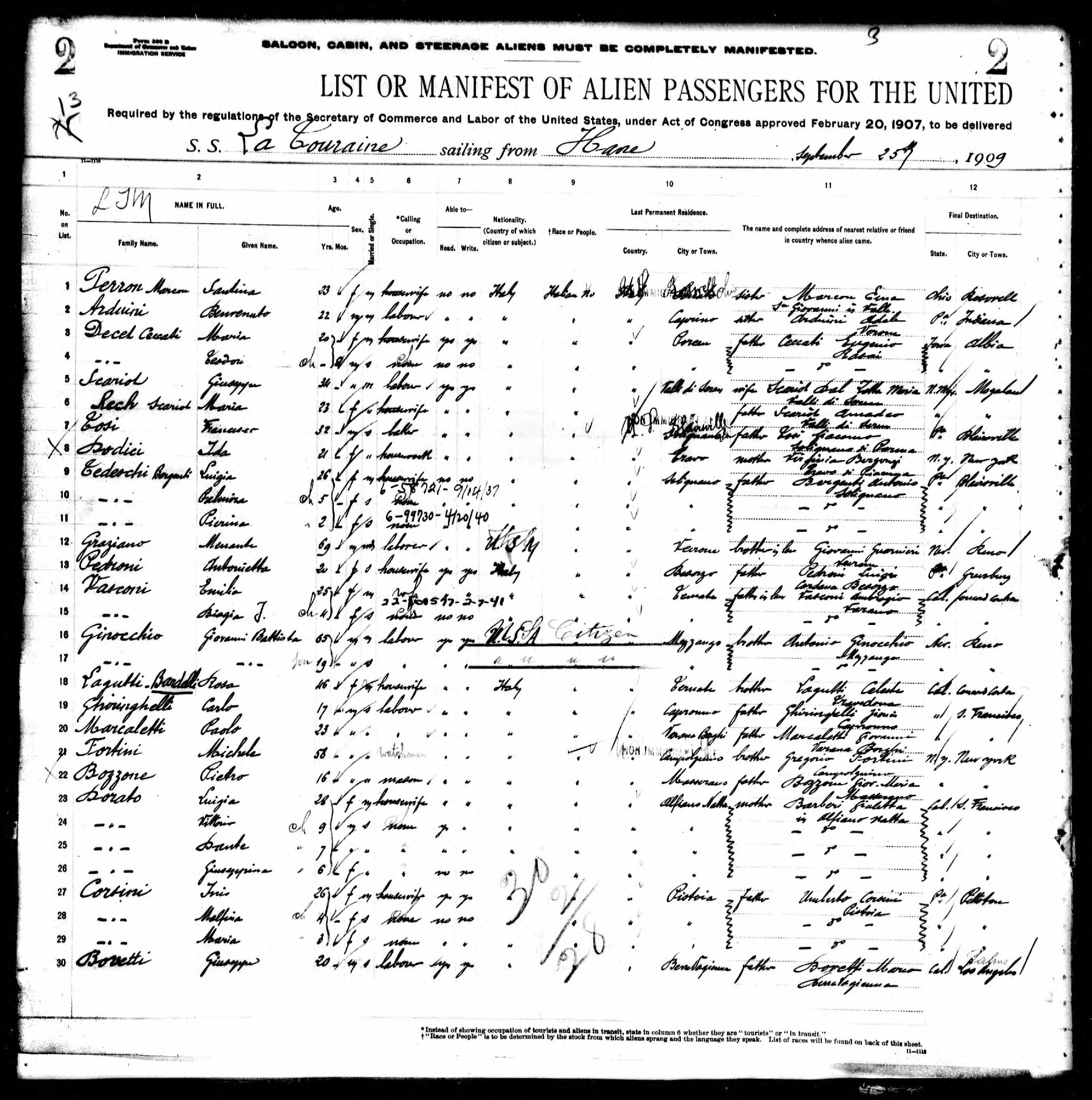
aboard the SS
La Touraine from
Le Havre, France
to New York, New
York
Source: Ancestry.com. California, Passenger and Crew Lists, 1882-1959 [database on-line]. Provo, UT, USA: Ancestry.com Operations Inc, 2008. Original data: Selected Passenger and Crew Lists and Manifests. National Archives, Washington, D.C.
James William Boyd
Source: Funeral program of James William Boyd from the files of Darryl W. Boyd.
Social Security Death Index
Name:
Marie E. Cate
SSN:
431-22-4772
Last Residence:
32068 Middleburg, Clay, Florida, USA
BORN:
14 Jan 1918
Last Benefit: 72118, North Little Rock, Pulaski, Arkansas,
United States of America
Died:
20 Apr 1998
State (Year) SSN issued: Arkansas (Before 1951)
Name:
Arthur H. Helm
SSN:
432-30-2176
Last Residence:
72103 Mabelvale, Pulaski, Arkansas, USA
BORN:
22 Apr 1920
Died:
4 Dec 2004
State (Year) SSN issued: Arkansas (Before 1951)
Name:
Harold I. Silker
SSN:
485-03-9675
BORN:
10 Jan 1909
Died:
21 Mar 1991
State (Year) SSN issued: Iowa (Before 1951)
Name: Wally
Willis
SSN:
560-34-9595
BORN: 26
Jan 1931
Died:
Nov 1971
State (Year) SSN issued: California (Before 1951)
Name: John Boyd
SSN:
565-09-1405
BORN: 16
Oct 1906
Died:
Oct 1963
State (Year) SSN issued: California (Before 1951)
Name: Ted H.
Boyd
SSN:
560-34-9641
Last Residence:
94544 Hayward, Alameda, California, USA
BORN: 6
Jul 1931
Died:
10 Jan 1999
State (Year) SSN issued: California (Before 1951)
Name: James
Boyd
SSN:
573-16-0468
Last Residence:
95935 Dobbins, Yuba, California, USA
BORN: 23
Aug 1907
Died:
Sep 1985
State (Year) SSN issued: California (Before 1951)
Name: Ruth F.
Schader
SSN:
565-05-6434
Last Residence:
92686 Yorba Linda, Orange, California, USA
BORN: 21
Jul 1913
Died:
Jan 1993
State (Year) SSN issued: California (Before 1951)
Name: Virginia
Boyd
SSN:
572-16-2772
Last Residence:
95935 Dobbins, Yuba, California, USA
BORN: 10
Sep 1913
Died:
12 Mar 1998
State (Year) SSN issued: California (Before 1951)
Name:
Mary E. Fettig
SSN:
565-07-8449
Last Residence:
92201 Indio, Riverside, California, USA
BORN:
14 Oct 1909
Died:
22 May 1994
State (Year) SSN issued: California (Before 1951)
Name: Lloyd A. King
SSN: 567-16-6733
Last Residence:
94577 San Leandro, Alameda, California, USA
BORN: 25 Mar 1910
Died: 9 Mar 1992
State (Year) SSN issued: California (Before 1951)
Name:
Joseph Fettig
SSN:
556-18-0527
Last Residence:
95935 Dobbins, Yuba, California, USA
BORN:
16 Sep 1912
Died:
Sep 1983
State (Year) SSN issued: California (Before 1951)
Name:
Frank R. Boyd
SSN:
547-28-4392
Last Residence:
94553 Martinez, Contra Costa, California, USA
BORN:
5 May 1922
Died:
8 Jun 1997
State (Year) SSN issued: California (Before 1951)
Name:
Florence Rosie Boyd
Last Residence:
94518 Concord, Contra Costa, California, USA
BORN:
14 May 1927
Died:
17 Mar 2010
State (Year) SSN issued: Colorado (Before 1951)
Source: Ancestry.com. U.S., Social Security Death Index, 1935-2014 [database on-line]. Provo, UT, USA: Ancestry.com Operations Inc, 2011.
Social Security Applications and Claims Index
Name:
William Henry Boyd
SSN:
557182367
Gender: Male
Race:
White
Birth Date: 12 Feb 1864
Birth Place: Lacrosse, Wisconsin
Father:
Squire F Boyd
Mother: Caroline
Denoll
Type of Claim: Original SSN.
Notes: Dec 1938: Name listed as WILLIAM HENRY BOYD
Name:
Bertha Ennes Boyd
[Bertha Ennes Brown]
SSN:
548187504
Gender: Female
Race:
White
Birth Date: 13 Jan 1879
Birth Place: Colton, Ohio
Father:
Alvey P Brown
Mother: Martha J Ennes
Type of Claim: Original SSN.
Notes: Jan 1938: Name listed as BERTHA ENNES BOYD
Name:
Marie Ellenhelm Cate
[Marie E Brown]
[Marie Cate]
[Marie Ellenhelm Helm]
SSN:
431224772
Gender: Female
Race:
White
Birth Date: 14 Jan 1918
Birth Place: Pine Bluff J, Arkansas
[Pine Bluff, Arkansas]
Death Date: 20 Apr 1998
Father:
Frank B Helm
Mother: Ellen M
Boyd
Type of Claim: Original SSN.
Notes: Dec 1940: Name listed as MARIE ELLENHELM
CATE; Oct 1944: Name listed as MARIE E BROWN; Nov 1962: Name listed as
MARIE ELL CATE; 25 Apr 1998: Name listed as MARIE E CATE
Name:
Arthur Homer Helm
[Arthur H Helm]
SSN:
432302176
Gender: Male
Race:
White
Birth Date: 22 Apr 1920
Birth Place: Pheonix, Arizona
Death Date: 4 Dec 2004
Father:
Frank B Helm
Mother:
Ellen Boyd
Type of Claim: Original SSN.
Notes: Apr 1942: Name listed as ARTHUR HOMER HELM;
08 Dec 2004: Name listed as ARTHUR H HELM
Name:
Ted Henry Boyd
[Ted H Boyd]
SSN:
560349641
Gender:
Male
Race:
White
Birth Date: 6 Jul 1931
Birth Place: Oakland, California
[Oakland|]
Death Date: 10 Jan 1999
Father:
John Boyd
Mother:
Antonette Garcia
Claim Date: 27 Nov 1973
Type of Claim: Original SSN.
Notes: Jun 1944: Name listed as TED HENRY BOYD; 26
Nov 1973: Name listed as TED H BOYD
Name:
Frank Richard Boyd
[Frank R Boyd]
SSN:
547284392
Gender:
Male
Race:
White
Birth Date: 5 May 1922
Birth Place: Phinox, Arkansas
Death Date: 8 Jun 1997
Father:
William H Boyd
Mother:
Bertha Brown
Type of Claim: Original SSN.
Notes: Jun 1939: Name listed as FRANK RICHARD BOYD;
17 Jun 1997: Name listed as FRANK R BOYD
Name: Virginia Boyd
Gender: Female
Birth Date: 10 Sep 1913
Death Date: 12 Mar 1998
Claim Date: 9 Jul 1975
SSN: 572162772
Name: John H Boyd
[John Boyd]
Gender: Male
Birth Date: 16 Oct 1906
Death Date: Oct 1963
Claim Date: 21 Nov 1963
SSN: 565091405
Name: Frank Willis
Birth Date: 21 Mar 1895
Death Date: 15 May 1961
Claim Date: 22 May 1961
SSN: 557053315
Notes: 22 May 1961: Name listed as FRANK WILLIS
Source: Ancestry.com. U.S., Social Security Applications and Claims Index, 1936-2007 [database on-line]. Provo, UT, USA: Ancestry.com Operations, Inc., 2015. Original data: Social Security Applications and Claims, 1936-2007.
Deed for Alice Mable Boyd's burial plot
Source: Cemetery deed to W.H. Boyd, 23 November 1905, Bellwood Cemetery, Pine Bluff, Arkansas (North Half, Lot No. 2, Block No. 258 in New Addn.).
Answer to a letter of inquiry about the Thompson family's burial location
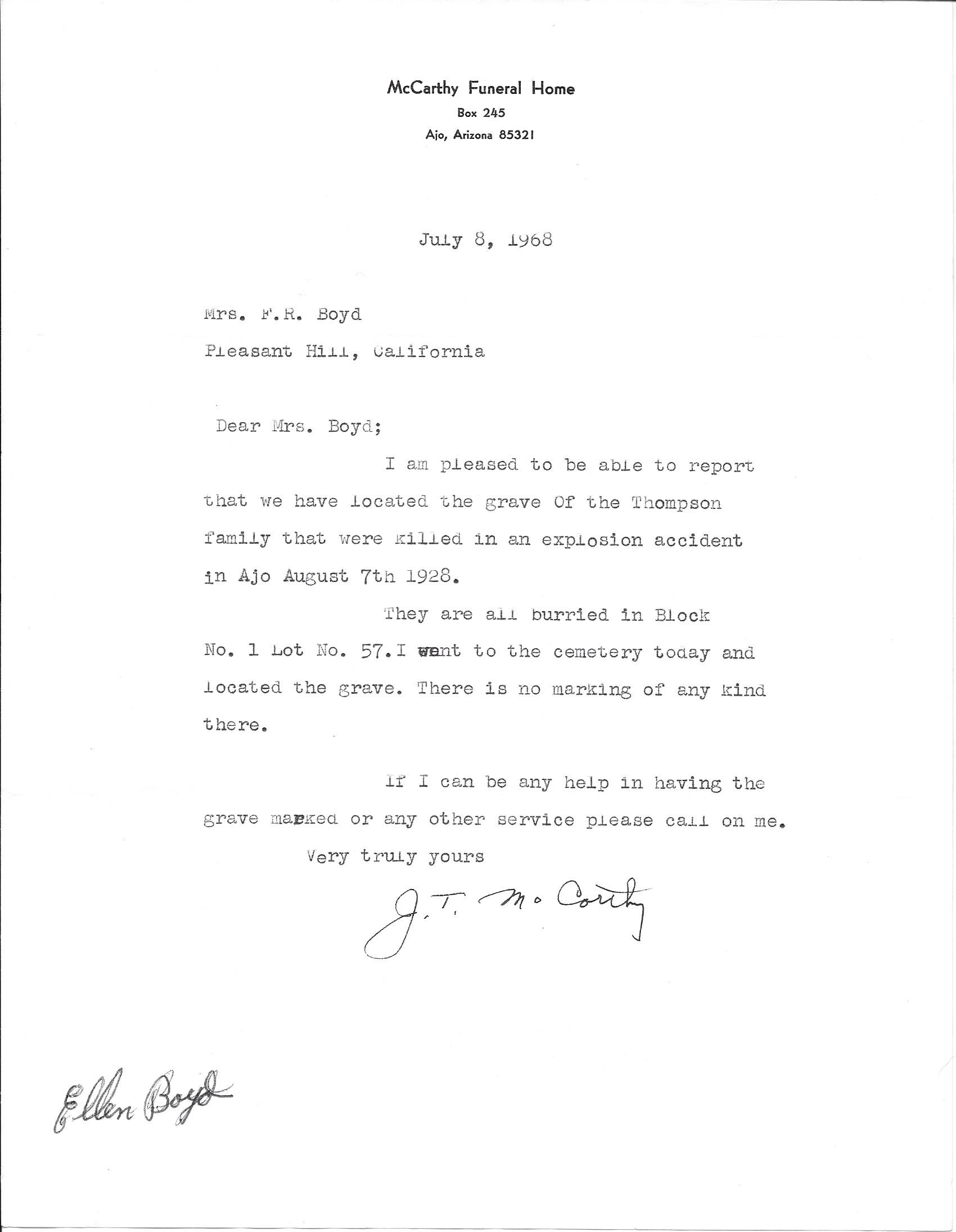
(Mahler) Boyd
about the location
of Ike Thompson,
Ellen (Boyd)
Thompson, and their
daughter Mary
Katherine Thompson's
burial location
Source: Letter, 8 July 1968, J. T. McCarthy (McCarthy Funeral Home) to Mrs. F. R. Boyd, from the files of Darryl W. Boyd.
Photos are shown below as thumbnails. Click on each thumbnail to view a larger version of the photo in another tab.
Evergreen Cemetery, Oakland, Alameda, California
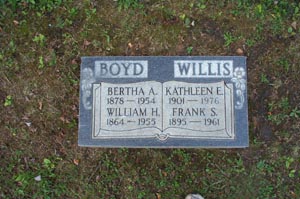
William H. Boyd,
Kathleen E. Willis,
Frank S. Willis
Photo credit: Darryl
W. Boyd
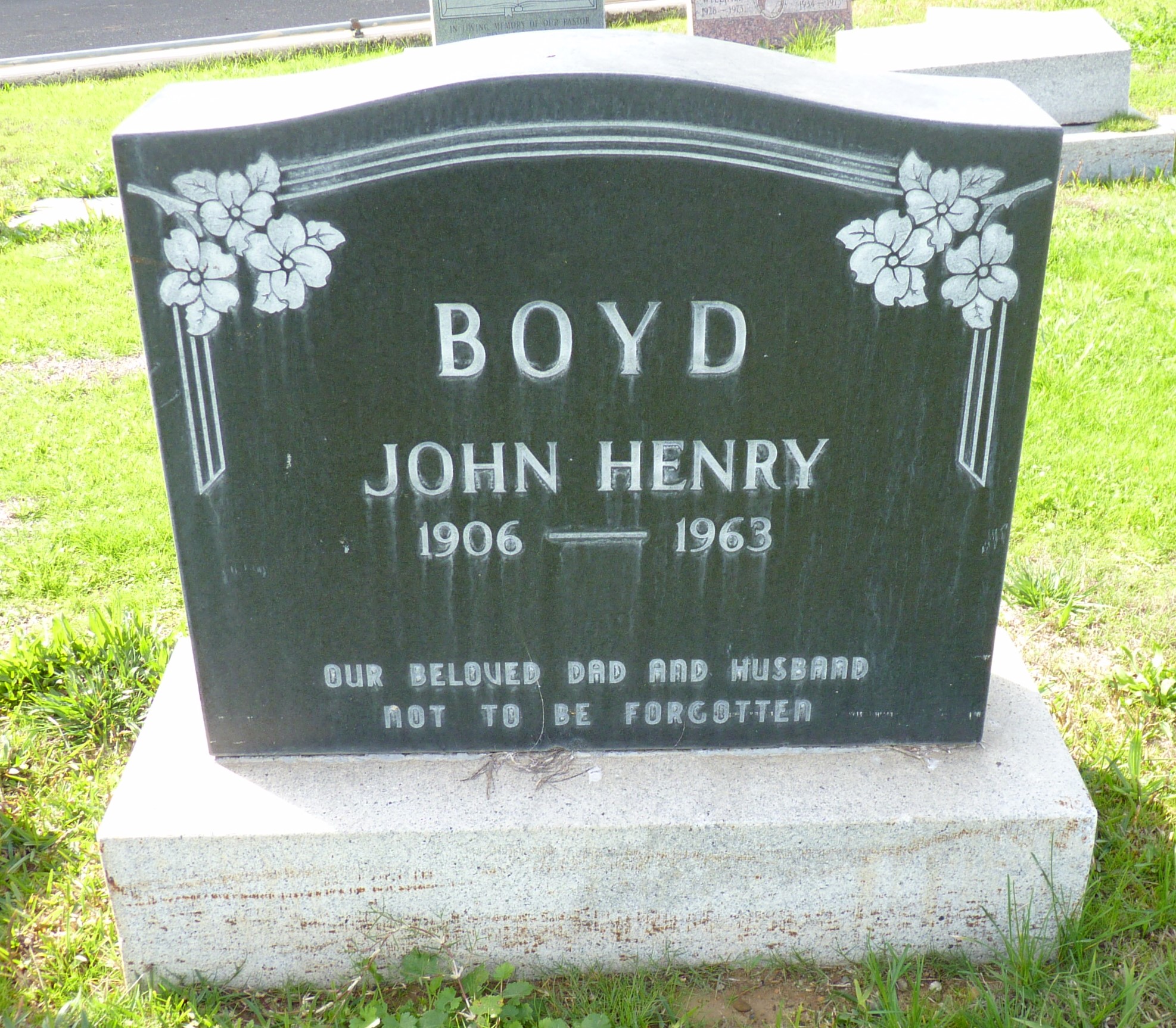
Photo credit:
B J,
findagrave.com
Oak Shade Cemetery, Marion, Linn, Iowa
Peoria Memorial Park, Browns Valley, Yuba, California
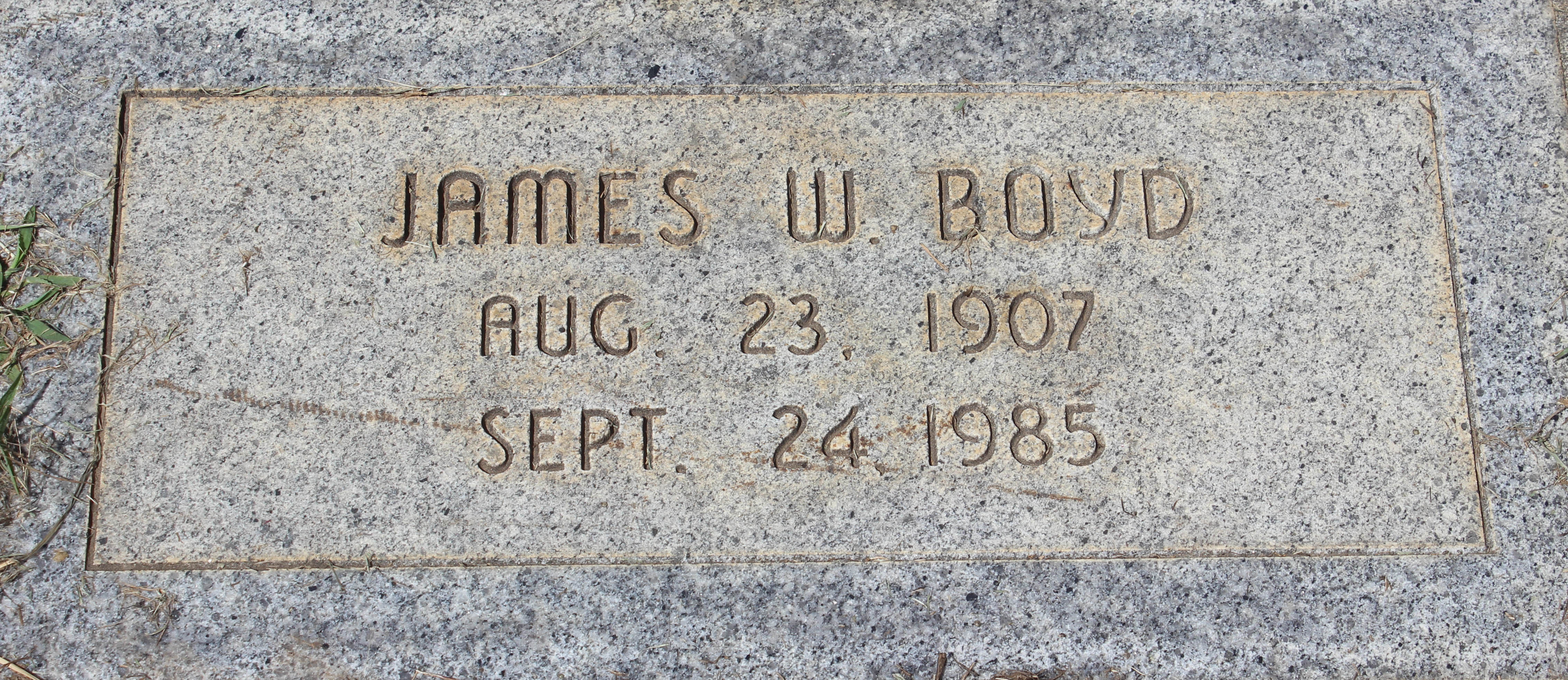
Photo credit: Tim
Hammill, Findagrave
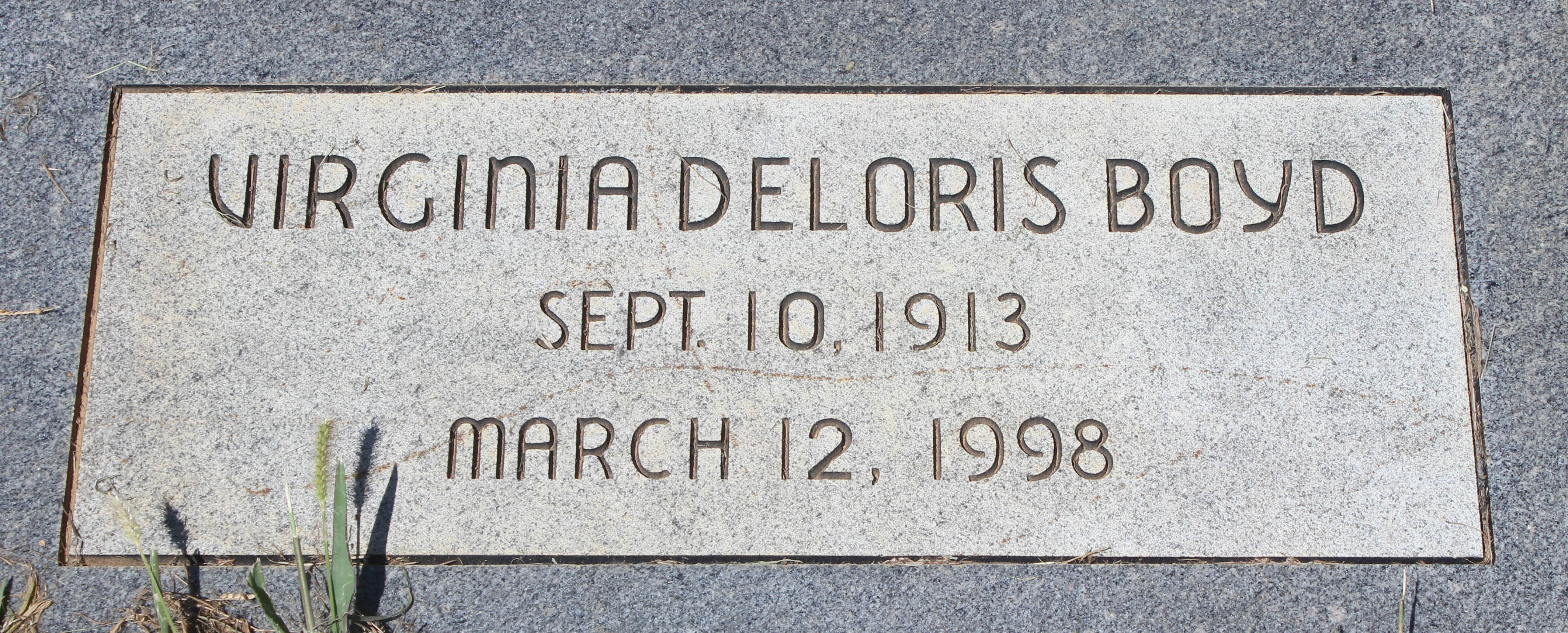
Photo credit: Tim
Hammill, Findagrave
Oakmont Cemetery, Lafayette, Contra Costa, California
Oak Hill Cemetery, Red Bluff, Tehama, California
| Last | First | Birth | Death | Location | Inscription/Notes |
| Dorato | Dante | Mar 21 1903 | Jan 21 1992 | G of Cross | s/w Julia E. Dorato |
| Dorato | Julia E. | Feb 10 1912 | Sep 8 1987 | G of Cross | s/w Dante Dorato |
Source: Larne, Phoebe, Oak Hill Cemetery, Red Bluff, Tehama County,
California, D-E burials,
http://tcghsoc.org/Tehama_Co/Cemeteries/Oak_Hill_Cemetery/oakhill-d-e.pdf,
updated Sep 2015, from the Tehama County Genealogical and Historical
Society Cemeteries and Graves page, accessed 18 Apr 2016.
US Veterans Gravesites
Name: Ted Boyd
Service Info.: PFC US MARINE CORPS
Birth Date: 6 Jul 1931
Death Date: 10 Jan 1999
Cemetery: Chapel Of The Chimes Cemetery
Cemetery Address: 32992 Mission Blvd Hayward, CA
94544
Source: National Cemetery Administration. U.S. Veterans Gravesites,
ca.1775-2006 [database on-line]. Provo, UT, USA: Ancestry.com
Operations Inc, 2006.
Return: Home > Ancestry of Frank Richard Boyd > Boyd Family Tree
Author: Michelle A. Boyd
Email
Last updated 13 September 2021
